


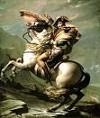

















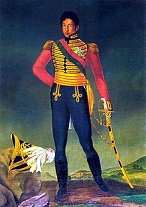
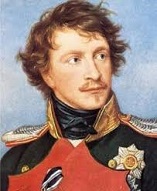

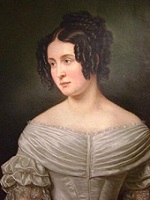





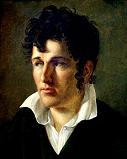









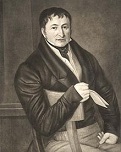






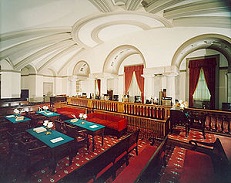
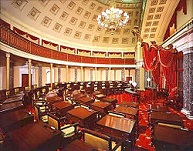
1810 The Third (3rd) U.S. Census reports the total pop. as 7,239,881 in a land area of 1,681,828 sq. mi. (4.3 per sq. mi.); black 1.378M; free black 186K; New York City: 97K; Mich.: 4,762. In 1810 there are 132 breweries in the U.S. (pop. 7M), producing a total of 185K barrels/year (per capita consumption 1 gal./year), with Penn. #1 at 48 (71,273 barrels/year), N.Y. #2 at 42 (66,896 barrels/year), and Mass. (13) at #3 (22,400 barrels/year); breweries are all small-scale. The economic recession deepens in Europe just as Napoleon I reaches his zenith and closes the North Sea to British Trade; German and Dutch banks fail, causing Parisian bankers to call in their loans; the unemployment rate in Paris soars to 40%. In this decade the Spanish empire in America becomes kaput after revolts in Mexico, led by Father Miguel Hidalgo (1751-1811), Venezuela, and New Granada (Colombia, Ecuador, and Panama), led by Simon Bolivar (Simón Bolívar) (1783-1830) and Francisco de Miranda (1756-1816), and Argentina, Chile, and Peru, led by Jose de San Martin (1778-1850) and Jose Miguel Carrera Verdugo (1785-1821). On Jan. 5 the town of Warrenton, Va. in N Va. E of the Blue Ridge Mts. is incorporated, named for Am. Rev. hero Gen. Joseph Warren, with Richard Henry Lee donating land for the county seat; U.S. Chief Justice John Marshall was born in Germantown (modern-day Midland), Va., 10 mi. to the S. On Jan. 14 the Church Court of Paris annuls the marriage between Napoleon I and Josephine, exempting her from the law setting a maximum age for divorce. On Jan. 19-21 the French army forces the passes of the Sierra Morena and invade Andalusia, Spain. On Jan. 24 Seville revolts against the Junta Supreme Central, and on Jan. 29 a regency council is installed in Cadiz. On Jan. 28 the British invade French-held Guadeloupe Island in the Caribbean Sea, and capture it on Feb. 6. On Jan. 31 70K French troops under marshal Nicolas Jean de Dieu Soult (1769-1851) capture Seville, Spain, after which they siege Cadiz in S Spain on Feb. 5 (until Aug. 24, 1812), which is defended by only 2K Spanish troops, who are later reinforced by 10K Spanish, British, and Portuguese troops. On Feb. 8 Napoleon I creates six military govts. in N Spain, stripping his bro' Joseph Bonaparte of much of his authority - mom liked me best? On Feb. 20 Austrian Tyrolean freedom fighter Andreas Hofer (b. 1767) is executed in Mantua. On Mar. 16 the U.S. Supreme (Marshall) Court rules 4-1 in Fletcher v. Peck to overturn the recission by the Ga. legislature of the Yazoo Land Fraud grant, upholding the law of property and contracts from legislative interference, a nd resulting in corporations being shielded from state regulations for the rest of the cent., becoming the first time the U.S. Supreme Court rules a state law unconstitutional, hinting that Native Ams. don't told title to their own lands; in 1814 Congress awards the lucky speculators $4.2M; meanwhile British-born neoclassical architect Benjamin Henry Boneval Latrobe (1764-1820) builds a 2nd U.S. Senate chamber on top of the first, allowing the U.S. Supreme Court to move into the lower half of the 1st chamber in the North Wing of the U.S. Capitol, called the Old Supreme Court Chamber until 1812-9, when it vacates Washington, D.C. because of the British invasion, then returns until 1860, when it moves to the Old Senate Chamber (until 1935); Latrobe goes on to become U.S. Capitol architect #2 in 1815-17, and design the White House porticos. On Mar. 21 the French siege Astorga, Spain, and capture it on Apr. 22. On Mar. 22 the British siege French-held Santa Maura (Levkas), and capture it on Apr. 16. Napoleon I plays the U.S. off against Britain, not knowing what's going to happen in Mother Russia next year? On Mar. 23 Napoleon I issues the Decree of Rambouillet (retroactive to May 20, 1809), treating all U.S. ships as smugglers, causing the U.S. to back down some, replacing the 1809 Nonintercourse Act on May 1 with Macon's Bill No. 2 (Bill No. 1, which attacked British shipping being defeated), reported by Dem.-Repub. House Speaker #6 (1801-7) Nathaniel Macon (1758-1837) of N.C. (a lifelong foe of a strong federal govt., who chairs the foreign relations committee and is not the author and opposes them but gets the credit as chmn.), which forbids British and French warships from entering U.S. waters, and promises Britain and France that if either quits interdicting U.S. trade, the U.S. will reimpose sanctions against the other; this doesn't stop rumors of a U.S. war against France from circulating in Paris in July, causing the U.S. ambassador in France gen. John Armstrong Jr. (1758-1843) to receive on Aug. 4 the Cadore Letter, a note from French foreign affairs minister (since 1807) Jean Baptiste de Nompere (Nompère) de Champagny, 1st Duc de Cadore (1756-1834) (written by Napoleon) promising to revoke the Berlin and Milan decrees if the U.S. resumes its non-intercourse policy with Britain or if Britain revokes its orders in council, with Nappy uttering the soundbyte "American cannon will talk" if England doesn't give in; despite the U.S. repealing its 1809 Non-Intercourse Act, however, France continues to seize U.S. ships and goods, and on Aug. 5 Napoleon ups the ante, issuing the Trianon Tariff on 21 colonial items (cotton, sugar, coffee, spices et al.), with duty increases of 6x on raw sugar and 15x on raw cotton, keeping the blockade going by economic means; to rub it in, on Oct. 18 the Decree of Fontainebleau imposes harsh new penalties for smugglers, incl. 10-year sentences, branding for offenders, and confiscation and public burning of seized goods, plus sale of seized ships, causing U.S. pres. James Madison (who only wanted France to revoke its restrictions?) to reinstate U.S. restrictions on Britain late in the year, while "War Hawks" Henry Clay and John Caldwell Calhoun press him for war with Britain. On Mar. 29 the French finally occupy Oveido, Spain after being thwarted by guerrillas. Are you having any fun, whatcha gettin' out of living? On Apr. 1 after Austrian foreign minister Prince Klemens von Metternich arranges it in order to forestall Russian plans to marry him to a Russian grand duchess, Emperor Napoleon I (b. 1769) marries Austrian Hapbsburg archduchess Marie Louise (1791-1847), daughter of Emperor Francis (Franz) I of Austria in Paris, and annexes German lands in Hanover, Bremen, Hamburg, Lauenberg and Lubeck, humiliating Austrian emperor Alexander I and his Hapsburg aristocracy, but saving Austria from being sandwiched in a 2-front war with France and Russia via a detente with France; too bad, after failing to talk Pius VII to help him, Metternich fails to use the new detente to get Nappy to annul the terms of the humiliating 1809 Treaty of Schonbrunn, and Nappy only throws him a bone by removing the limitation on Austrian armaments and issuing a lame apology for executing Andreas Hofer, but won't budge on restoring Austrian access to the Adriatic or allow them to exchange the Illyrian provinces for Galicia to get the pesky Russians out of the Danube; by now Nappy Lion has reached the height of his grate powah, having conquered 720K sq. mi., and his empire now incl. France, Belgium, Holland, Germany, Poland, Switzerland, and Spain; having a little breathing room, he gets busy and his wife bears a son next Mar. 20. On Apr. 13 the French siege Lerida, Spain, and capture it on May 14. On Apr. 15 the French defeat the Spanish at the Battle of Zalamea. On Apr. 19 a coup in Venezuela achieves de facto independence from Spain, establishing the Supreme Junta of Caracas and deposing Capt. Gen. Vincente Emparan and his colonial administrators, launching the Venezuelan War of Independence (ends 1823); in early June Caracas, Venezuela-born Gen. Simon Bolivar (Simón Bolívar) (Simón José Antonio de la Santísima Trinidad Bolívar Palacios Ponte y Blanco) (1783-1830) and Caracas, Venezuela-born big brain Andres de Jesus Maria y Jose Bello Lopez (1781-1865) (#1 intellectual figure of 19th cent. Latin Am.) travel to England to seek recognition and aid, landing in Portsmouth, England in July, and talking Francisco de Miranda (Sebastian Francisco de Miranda y Rodríguez de Espinoza) (1750-1816) ("the first Universal Venezuelan") ("the Great Universal American") into returning; meawhile Simon Bolivar's brother Vicente Bolivar Palacias et al. visit the U.S. and obtain token support. On Apr. 22 the Battle of Margalef is a V for the French over a Spanish army attempting to relieve Lerida. On Apr. 26 42K French troops under Marshal Michel Ney siege 5.5K men under Marshal Don Andres Perz de Herrasti in Ciudad Rodrigo, Spain, and capture it on July 9. On May 3 Lord Byron and Lt. Ekenhead of HMS Salsette swim the Hellespont, which Byron later commemorates in canto 2 of Don Juan. On May 15 16K French troops under Gen. Louis Gabriel Suchet siege a 1K-man garrison under Col. Carbon in Mequinenza, Spain in Aragon at the confluence of the Ebro and Segre Rivers 130 mi. W of Barcelona, and capture it on June 8 - your torilla soup smells so good and I do have a sick kid at home? On June 23-24 the First Battle of Shumla (Sumen) is a V for the Turks against the Russians. In June flooding kills large portions of the mulberry leaf crop in France, hurting the silk industry. On July 1 after some of his demands are resisted, Napoleon sends troops to Holland and annexes it to France, suppressing Dutch commerce with Britain and the Americas, causing his brother Louis Bonaparte to resign as king (since 1806) of Holland on July 2 in protest and flee to Bohemia, eventually settling in Rome under the title Comte de Saint-Leu, devoting himself to clit, er, lit.; the annexation is official on July 13 - do you think I'm fool enough to stand there with a fiddle in my hand while the oboe plays the only part? On July 7 the Brits invade French-held Reunion Island, and the garrison surrenders on July 10. On July 20 Colombia declares independence from Spain. On July 21 after Nice, Italy-born French marshal Andre (Andrea) Massena (1758-1817), "the dear child of Victory" (greatest gen. in France after Napoleon) is transferred to Spain (taking his mistress with him dressed as a dragoon), and takes over the 65K-man French army, he invades Portugal - another sock hop? On July 23 the Battle of Kargali Dere between the Russians and Turks is a push. On July 24 the French drive the British rearguard over the Coa River near Almeida, Portugal. On Aug. 8 the Second Battle of Shumla (Sumen) is a revenge V for the Russians over the Turks, after which they capture the fortresses of Rustchuck (Ruse), Nicopolis, and Giurgevo. On Aug. 11 the Battle of Villagarcia is another French V over the Spanish. On Aug. 20-27 the naval Battle of Grand-Port (Ile de la Passe) in Mauritius (Mahebourg) sees a British fleet of four frigates under Capt. Sir Samuel Pym (1778-1855) try to ambush an anchored French fleet of three frigates and two captured Indiamen under Commodore Guy-Victor Duperre (Duperré) (1775-1846) and get their butts kicked, after which Pym is taken POW along with the whole garrison of Ile de la Passe, becoming the first and only D of a British squadron by Napoleonic France; in Dec. the Brits under adm. Sir Albemarle Bertie, 1st Baronet (1755-1824) recapture Ile de la Passe and release Pym, who is court-martialled and later found innocent of being a ninny, going on to be promoted go full adm. in 1851. On Aug. 27 the French under marshal Andre Massena capture the Portuguese fortress of Almeida. On Sept. 13 a plot in Queretaro (Querétaro) (160 mi. NW of Mexico City) by Josepha (Josefa) Ortiz de Dominguez (1768-1829) (AKA La Corregidora) (wife of the corregidor or magistrate of Queretaro) for Mexican independence starting on Dec. 8 is discovered by the Spanish govt., and after they lock her in her room so they can capture the other plotters, she makes a loud noise with her heels to cover the sounds of fellow plotter Don Ignacio Perez as he takes off to ride to San Miguel de Allende to warn the others, launching the revolt early; on Sept. 16 (Mexican Independence Day) (early morning) Roman Catholic Father Miguel Hidalgo y Costilla (1753-1811), priest since 1779 of Dolores parish in Guanajuato 170 mi. NW of Mexico City, who the year before joined a patriotic society allegedly devoted to Mexican loyalty to the Spanish crown but really the opposite delivers his Grito de Dolores (Cry of Dolores), beginning the multi-ethnic Mexican Revolt (War of Independence) from Spain (ends Sept. 27, 1821), leading hundreds of parishioners in a successful attack on the local prison to free prisoners while carrying a banner of Our Lady of Guadalupe, patron saint of Mexico; he then forms an army of 80K and captures Guanajuato and Guadalajara, then marches on Mexico City, winning the first battle, then bogging down after being excommunicated and seeing his troops split, causing him to retreat. On Sept. 14 the Spanish under Henry O'Donnell supported by a British naval squadron under Francis William Fane win a small V at the Battle of La Bisbal. On Sept. 17-18 the French unsuccessfully attempt to invade Sicily. On Sept. 18 the Chilean War of Independence from Spain begins (ends 1821/1826); on Nov. 16 gen. Jose Miguel Carrera Verdugo (1785-1821) becomes pres. #1 of the first Chilean governing council (until Oct. 2, 1814; on July 4, 1812 the Chilean Flag starts out blue-white-yellow, switches on May 26, 1817 to blue-white-red, then settles on Oct. 18, 1817 with white-red with a blue square in the upper left with a white star in it. On Sept. 19 a UFO is sighted over the River Meuse near Brezeau (?), according to the London Times of Oct. 29. On Sept. 24 the Spanish Cortes convenes in Cadiz. On Sept. 25 the 90%-Muslim city of Bandung (Bandoeng) in W Java, Indonesia (founded in 1488) is consolidate (modern-day pop. 2.5M/8.5M). On Sept. 26 after capturing Fort San Carlos in Baton Rouge, La., an uprising of white Yankees against Spanish rule in Fla. results in the proclamation of the Repub. of West Florida, the first lone star repub.; on Oct. 27 Pres. Madison orders its annexation into the Lousiana Territory, after which the U.S. army takes St. Francisville on Dec. 6, and Baton Route on Dec. 10, ending the upstart repub. There's a place called Hidden Valley? Keep Santa smiling and waving? On Sept. 27 after French marshal Andre Massena chases the outnumbered British-Portuguese army (25K of each) led by Sir Arthur Wellesley (1769-1852) (later 1st Duke of Wellington) towards Portugal, he is unexpectedly defeated at the Battle of Bussaco (4.5K French vs. 1.25K Anglo-Portuguese casualties) after the Connaught Rangers (Devil's Own) (founded 1793) save the day; after the French regroup, they chase the Brits to a few mi. from Lisbon, where they hide behind the secretly-built (since Nov. 1809) Lines of Torres Vedras (built to defend Lisbon), and the French reach their zenith in Portugal; too bad, they can't breach the lines, and the onset of winter causes them to begin starving. In Sept. Russia devalues its currency. On Oct. 15 the Battle of Fuengirola on the Costa del Sol in Andalusia, S Spain sees a 300-man garrison from the 4th Regiment of the Duchy of Warsaw holed-up in the medieval Moorish fortress of Sohail hold off a 4.5K-man Spanish-British force of the famous British 89th (Princess Victoria's) Regiment of Foot under lt. gen. Andrew Thomas Blayney, 11th Baron Blayney (1770-1834) of County Monaghan in Ireland, cmdr. of the 85th Foot Regiment AKA Blayney's Bloodhounds, who is captured, causing Napoleon to award several of the Polish officers the French Legion of Honor. On Oct. 26 the Battle of Vidin sees the Russians under gen. Count Nikolai Mikhailovich Kamensky (1776-1811) defeat 40K Ottomans under Osman Pasha, with 1.5K Russians vs. 10K Ottomans KIA. In Oct. the 2-week beer-guzzling crowd-pleasing Oktoberfest is invented by Munich brewers as a celebration of the Oct. 12 wedding of young prince (king in 1825-48) Ludwig I of Bavaria (1786-1868) to Therese Charlotte Luise of Saxe-Hildburghausen (1792-1854); Ludwig I goes on to become a patron of the arts, turning Munich into the "Athens on the Isar River". On Nov. 4 the French defeat the Spanish at the Battle of Baza. On Nov. 24 after being enticed into signing an agreement, South African-born 4'10" Sara(h) "Sartje" Baartman (1789-1815) is exhibited in London as the "Hottentot Venus", with white men and women closely ogling her gigantic buttocks while pretending to scientifically study her; in Sept. 14 she is sold to animal trainer S. Reaux in Paris, France, who exhibits her for 15 mo. at the Palais Royal; on Dec. 29, 1815 she dies, and her body cast and skeleton are put on display until 1974-6, after which a movement gets her remains repatriated to her homeland on May 6, 2002. On Nov. 29 the British invade Martinique, capturing the French garrison on Dec. 3. In Nov. English king George III's madness increasingly incapacitates him, and he ceases to reign; by next year he goes irrevocably mad, roaming the palace in a purple dressing gown, blind and deaf, with wild Lear-like white hair and beard, playing to himself on his harpsichord and talking to himself continually of people long since dead; meanwhile his ninny sons, "the damnest millstones about the neck of any government that can be imagined" (Duke of Wellington) wait in the wings? Britain seizes the French colonies at Guadeloupe (last French colony in West Indies), Ile de Bourbon, Java, and Ile de France (Mauritius) (500 mi. E of Madagascar); meanwhile King (since 1787) Andrianampoinimerina of Imerina (b. 1745) dies, and his son Radama I (the Great) (1793-1828) becomes king #1 of Malagasy-run Madagascar (until July 27, 1828) (capital Antananarivo) (the C plateau of the island) (known for introducing the spade in rice fields, then declaring "the sea is the boundary of my rice field), then playing the new big boy British and old beaten dog French off against each other, signing a treaty with the Brits in 1817 which gives him support in exchange for ending the slave trade, then going on to conquer the island, modernize it, devise a written form of the Malagasy language, invite British Protestant missionaries in, and marry 12 Great Wives, one of whom, bad news Ranavalona he adopts as his sister. On Dec. 16 the French under marshal Louis Gabriel Suchet, 1st Duke of Albufera (1770-1826) siege Tortosa, Spain. After Napoleon conquers Spain, Argentina sets up its own govt. in the name of the Spanish king under the name United Provinces of the Rio de la Plata, with capital at Buenos Aires. The Partido Liberale is formed in Spain to push parliamentarian govt., coining the term "liberal". The Wahhabis under Muhamman ibn Sa'ud desecrate the Grave of Prophet Muhammad in Medina and plunder its treasures, then cut the Qaabah in Mecca to pieces; their fanaticism later causes them to reject seatbelts? A French penal code requires all beggars to be put in poorhouses. France reestablishes its govt. monopoly on tobacco. Miners in Durham, England go on strike. The Pacific Fur Co. of America's first millionaire John Jacob Astor (1763-1848) finances the Astor Expedition (ends 1812) overland to the W from St. Louis, founding Ft. Astoria next Apr. on the Columbia River as a fur trading post, becoming the first white settlement in Ore.; in Nov. 1812 expedition member Robert Stuart discovers the 20-mi.-wide South Pass through the Rocky Mountains, becoming the basis of the Oregon Trail; too bad, the British capture Astor's trading posts during the War of 1812, renaming Ft. Astoria to Ft. George and shutting his fur biz down. U.S. military man Zachary Taylor (b. 1784) (since 1808) marries Margaret Mackall Smith (1788-1852); they have 1 son and 5 daughters. Tristan da Cunha, discovered in 1506 is first settled by a group of Americans, who name it the Isle of Refreshment. Goats are introduced to St. Helena Island, going on to eventually eliminate 22 of the 33 endemic plants. U.S. Sen. Henry Clay gets a bill passed requiring the U.S. Navy to purchase U.S. hemp products rather than imported ones, thus establishing hemp as the foremost cash crop of Kentucky until the Civil War. Count Johann Philipp von Stadion (1763-1824) introduces reforms in Austria, while Archduke Charles reorganizes the army. The summer resort city of Bournemouth in Hampshire, England on Poole Bay (110 mi. SW of London) is founded, complete with a 6-mi. beach. The first Chinese tea plants are introduced in Taiwan. The Romantic Era in Western Music begins (ends 1910). Sir Henry Rowley Bishop (1786-1855) becomes music dir. at the Covent Garden Theater in London (until 1824). Hey baby, how'd you like to have a little fun? 15-y.-o. Diego de la Vega is sent to live in Barcelona, Spain to receive a European education, and meets his girlfriend Juliana de Romeu while learning to fence from master Manuel Escalante, later joining the La Justicia movement and developing his masked alter-ego of Zorro, named after his spirit guide, a fox. :) Romantic but lame Lord Byron (1788-1824) swims the Dardanelles in honor of Leander and Hero - but my hero ain't a she? Vienna-born choir boy Franz Peter Schubert (1797-1828) composes the first of 700 lieder (songs). German painter Johann Friedrich Overbeck (1789-1869) moves to Rome, gets religion, and founds the anti-academic society of Pre-Raphaelite German Roman Catholic painters known as the Nazarene Brotherhood (Nazarenes), incl. Julius Schnorr von Carolsfeld (1794-1872), who live in an abandoned monastery in Rome, living like monks, studying early Christian art and producing frescoes for Casa Bartholdi (in Rome), Villa Massini et al. (until 1830). The Cumberland Presbytery of Ky. is excluded from the Presbyterian Church for opposing admission into the ministry of men who have not received enough classical theological training; by the 1960s they have 80K members - no likee bourbon as holy water? Joseph Diaz Gergonne (1771-1859) founds Annales de Mathematiques (Gergonne) (until 1832). The Agricultural Museum the first regular farm periodical in the U.S. begins pub. on July 4 in Georgetown, Washington, D.C. The first public billiard rooms in England are opened at the Piazza in Covent Garden, London. The Hartford Fire Insurance Co. in Conn. is founded. In this decade fur hats become fashionable in Europe, starting with the Wellington in 1812, the Paris Beau in 1815, the D'Orsay in 1820, the Regent in 1825, and culminating in the fur army hat in 1837. Sports: In Oct. the first official thoroughbred horse race in Australia is held at Hyde Park in Sydney. Inventions: German-born London printer Rudolph Ackermann (1764-1834) invents the Ackermann Steering Geometry for horse-drawn carriages to solve the problem of wheels on the inside and outside of turns needing to trace out circles of different radii. Nicolas Francois Appert (1749-1841) invents techniques for canning food in sealed boiled glass jars, and wins an award from the French govt. - Spam is just around the corner? Abraham Louis Breguet (1747-1823) of France makes the first wristwatch for Queen Caroline Murat of Naples, sister of Napoleon I. Peter Durance of England patents the use of metal containers for food canning. German inventor (in London) Friedrich Gottlob Koenig (1774-1833) patents a high-speed steam-powered printing press that prints on both sides of the paper; on Nov. 29, 184 the London Times begins to be printed on Koenig's steam-operated press, increasing the speed of printing by 5x. The first patent for artificially-carbonated mineral waters is issued in the U.S. Science: Augustin Jean Fresnel discovers the ammonia-soda reaction. French chemist Pierre-Jean Robiquet (1780-1840) determines the chemical structure of cantharidin. Nonfiction: Robert Brown (1773-1858), Prodromus Florae Novae Hollandiae et Insulae Van Diemen; first systematic account of Australian flora. Lazare Carnot (1753-1823), De la Defense des Places Fortes. Francois-Rene de Chateaubriand (1768-1848), Journey from Paris to Jerusalem and Back; bestseller describing Arabs as "civilised man fallen again into a savage state", who "have the air of soldiers without a leader, citizens without legislators, and a family without a father", while Islam preaches "neither hatred of tyranny or love of liberty" and the Quran has "neither a principle for civilization nor a mandate that can elevate character". Gall and Spurzheim, Anatomie et Physiologie du Systeme Nerveux. Samuel Christian Friedrich Hahnemann (1755-1843), Organon of Therapeutics; the quack medical science of homeopathy, which he began developing in 1792, which starts out with the common sense observation that a lot of medicines make you sick, then goes off the deep end with the idea that some of them can still work if they are diluted to nothing first, but not those medicines, his medicines; "That which can produce a set of symptoms in a healthy individual, can treat a sick individual who is manifesting a similar set of symptoms". Friedrich Ludwig Jahn (1778-1852), Deutsches Volksthum. Karl Christian Friedrich Krause, System der Sittenlehre. Joseph de Maistre (1754-1821), Essay on the Generation of Political Constitutions (Essai sur le Principe Generateur des Constitutions Politiques). Zebulon Montgomery Pike (1779-1813), Exploratory Travels Through the Western Territories of North America (1805-7); first description of the trans-Mississippi West available to easterners. Robert Southey (1874-1943), History of Brazil (3 vols.) (1810-19). Madame de Stael (1766-1817), De l'Allemagne (On Germany); praises German culture so much that Napoleon orders her exiled from France. Isaiah Thomas (1749-1831), The History of Printing in America, with a Biography of Printers, and an Account of Newspapers (2 vols.) (Aug. 14) (Worcester, Mass.); becomes a std. work; 2nd ed. 1874. George White (1764-), A Brief Account of the Life, Experience, Travels and Gospel Labours of George White, an African; first African-Am. to write the story of his own enslavement? William Wordsworth (1770-1850), A Description of the Scenery of the Lakes in the North of England; enlarged ed. pub. 1822. Music: Ludwig van Beethoven (1770-1827), Bagatelle No. 25 in A minor ("Für Elise"); not pub. until 1867; becomes one of his most popular piano compositions; Music to Goethe's "Egmont", Op. 84 (June 15) (Vienna); for Goethe's 1787 play about Lamoral, Count of Egmont (1522-68). R.H. Cromek and Allan Cunningham (1784-1842), Remains of Nithsdale and Galloway Song; modern popular songs by cunning linguist Cunningham palmed-off as ancient Scottish ballads. Alessandro Manzoni (1785-1873), Inni Sacri (Sacred Hymns); Catholic religious lyrics. Gioacchino Rossini (1792-1868), La Cenerentola (Cinderella) (opera); La Cambiale di Matrimonio (opera) (Venice); Rossini has the corner on the opera market in Italy by now, and excuses his baldness by saying that every composer gets it by age 30? Franz Schubert (1797-1828), Der Vatermorder; Hagars Klage. Art: Johann Heinrich von Dannecker (1758-1841), Ariadne on the Panther (sculpture). Theodore Gericault (1791-1824), Fighting Horses. Francisco de Goya (1746-1828), Disasters of War (Los Desastres de la Guerra) (80 etchings) (1810-20); the Peninsular Wars between French and Spanish (1808-14); 1-47 tell of the guerrilla war; 48-65 are about the 1811-12 Madrid famine; 66-80 are the "Caprichos Enfaticos" (emphatic caprices), spoofing the peace that follows; both French and Spanish are portrayed as aggressors; so honest and brutal that he chooses not to have them printed in Ferdinand VII's Spain, and they aren't printed until 1863 for fear of govt. reprisals. Baron Antoine-Jean Gros (1771-1835), Madrid; Napoleon at the Pyramids. Plays: Friedrich de la Motte Fouque (1777-1834), Der Held des Nordens. Zacharias Werner, Der Vierundzwangzigste Februar (the 24th of February (1-act play). Poetry: Willem Bilderdijk (1756-1831), De Ondergang der Eerste Wereld; Afscheid. George Crabbe (1754-1832), The Borough. James Hogg (1770-1835), Forest Minstrel. Thomas Love Peacock (1785-1866), The Genius of the Thames. Percy Bysshe Shelley (1792-1822), Zastrozzi. Robert Southey (1774-1843), The Curse of Kehama; his masterpiece?; an evil priest gains demonic powers and tries to become a god, until his son is killed by Ladurlad after trying to rape peasant girl Kailyal, causing him to curse Ladurlad, which only gives him superhuman strength, which he uses to work with Yamen, god of death and other Hindu gods to defeat him. Novels: Jane Porter (1776-1850), The Scottish Chiefs; about Sir William Wallace (1272-1305); banned by Napoleon. Sir Walter Scott (1771-1832), The Lady of the Lake (Romantic verse novel); AKA Fairy Vivienne, Vivien, or Nemue, who abducted infant Lancelot and kept him on an island. Births: Am. artist Alfred Jacob Miller (d. 1874) on Jan. 2 in Baltimore, Md.; likes to paint scenes in the NW U.S. German Lutheran missionary (in East Africa) Johann Ludwig Krapf (d. 1881) on Jan. 11 in Tubingen; educated at the U. of Tubingen. Sicilian Bourbon king #4 (1830-59) Ferdinand II (d. 1859) on Jan. 12 in Palermo; son of Francis I (1777-1830) and Maria Isabella of Spain (1789-1848); father of Francis II (1836-94). Am. inventor Joseph Rogers Brown (d. 1876) on Jan. 26 in Warren, R.I. German mathematician Ernst Eduard Kummer (d. 1893) on Jan. 29. French chef (in England) (first celebrity chef?) Alexis Benoist Soyer (d. 1858) on Feb. 4 in Meaux-en-Brie; emigrates to England in 1830; husband (1837-) of Elizabeth Emma Soyer Jones (1813-42). Scottish Sanskrit scholar John Muir (d. 1882) on Feb. 5 in Glasgow; brother of William Muir (1819-1905). French "Transcendental Magic" writer-magician (not Jewish) Eliphas Levi (Alphonse Louise Constant) (d. 1875) on Feb. 8 in Paris; husband of Marie-Noemi Cadiot (1832-88). French biologist Jean Louis Armand de Quatrefages de Breau (Bréau) (d. 1892) on Feb. 10 in Berhezene, Valleraugue (Gard); educated at the U. of Strasbourg. French #1 "History of France" historian Bon Louis Henri Martin (d. 1883) on Feb. 20 in Saint-Quentin, Aisne. Polish Romantic composer-pianist ("the Poet of the Piano") Frederic Francois (Fryderyk Franciszek) Chopin (d. 1849) on Mar. 1 (Feb. 22?) in Zelazowa Wola (near Warsaw); French father, Polish mother; child prodigy pianist; moves to France in 1831 and becomes French citizen, although he remains a Polish patriot; only grows sideburns on the side facing the audience; has affair with George Sand (1804-76) in 1837-47. Italian pope #256 (1878-1903) ("Pope of the Working Man") ("The Social Pope") Leo XIII (Vincenzo Gioacchino Raffaele Luigi Pecci) (d. 1903) on Mar. 2 in Carpieto Romano (near Rome). Irish poet-artist-lawyer Sir Samuel Ferguson (d. 1886) on Mar. 10 in Belfast; educated at Trinity College, Dublin. Am. Roman Catholic archbishop of New York City (1864-) John Cardinal McCloskey (d. 1885) on Mar. 10 in Brooklyn, N.Y.; educated at Mount St. Mary's College. French historian Comte Charles Forbes Rene de Montalembert (d. 1870) on Mar. 18 in London; founder with Abbe Felicte de Lamennais of the liberal French Roman Catholic movement. German Young Germany satirist-humorist (Protestant) Adolf Glassbrenner (d. 1876) on Mar. 27 in Berlin; husband (1840-) of Adele Peroni (1813-95). English "Omphalos" naturalist (aquarium pioneer) Philip Henry Gosse (d. 1888) on Apr. 6 in Worcester; father of Edmund William Gosse (1849-1928). Am. Repub. legislator Justin Smith Morrill (d. 1898) on Apr. 14 in Strafford, Orange County, Vt. Austrian brewer ("the King of Brewers") Anton Dreher (d. 1863) on May 7 in Schwechat (near Vienna). Am. "Woman in the Nineteenth Century", "The Dial" Transcendentalist feminist journalist-writer-ed. (abolitionist) (most important woman of the 19th cent.?) Sarah Margaret Fuller, Marchioness Ossoli (d. 1850) on May 23 in Cambridgeport, Mass.; daughter of Margaret Crane and 4-term Repub. U.S. rep. Timothy Fuller; first full-time female book reviewer in the U.S.; first woman allowed to use the Harvard College library; first female correspondent for the New York Tribune; inspires the 1848 Seneca Falls Convention. German Jewish reform rabbi-theologian Abraham Geiger (d. 1874) on May 24 in Frankfurt-am-Main. Am. Salt Lake Tabernacle architect (official architect of the Church of Jesus Christ of Latter-Day Saints) Truman Osborn Angell (d. 1887) on June 5 in Providence, R.I.; brother-in-law of Brigham Young. German Romantic composer Robert Alexander Schumann (d. 1856) on June 8 in Zwickau (East Germany); husband (1840-) of Clara Schumann (1819-96). German "Die Lustigen Weiber von Windsor" composer (founder of the Vienna Philharmonic) Carl Otto Ehrenfried Nicolai (d. 1849) on June 9 in Konigsberg, Prussia. U.S. Sen. (D-Fla.) (1845-51, 1851-61) (Jewish) (first Jewish U.S. Sen.) David Levy Yulee (d. 1886) on June 12 in Charlotte Amalie, St. Thomas, Virgin Islands; son of Moroccan Sephardic lumberman Moses Elias Levy (1st cousin of Philip Benjamin, father of Judah P. Benjamin) and a Sephardic mother. U.S. Supreme Court justice #42 (1872-82) Ward Hunt (d. 1886) on June 14 in Utica, N.Y.; educated at Union College. German Young Germany poet-activist Ferdinand Freiligrath (d. 1876) on June 17 in Detmold, Lippe. Austrian ballerina Fanny Elssler (d. 1884) on June 23 in Vienna. Am. showman-huckster-circus promoter (teetotaler) ("patron saint of promoters" - Life mag.) P.T. (Phineas Taylor) Barnum (d. 1891) on July 5 in Bethel, Conn. English "Proverbial Philosophy" writer-poet Martin Farquhar Tupper (d. 1889) on July 17 in London; educated at Christ Church, Oxford U. Russian artist Ivan Konstantinovich Aivazovsky (d. 1900) on July 29 in Feodosiya, Crimea; Armenian parents named Aivazian; known for his seascapes. Italian PM #1 (1861) ("architect of a unified Italy") Camillo (Camille) Paolo Filippo Giulio Benso, Count of Cavour, Isolabella and Leri (d. 1861) on Aug. 10 in Turin; of the House of Savoy. English psychiatrist Forbes Benignus Winslow (d. 1874) on Aug. 10 in Pentonville; 9th son of Thomas Winslow (172-1815) (descendant of Edward Winslow of Mayflower fame) and Mary Forbes (1774-1854); educated at Univ. College London, and U. of Aberdeen; husband (1841-) of Susannah Holt (1811-83); father of Rev. Forbes Edward Winslow, Lyttleton Stewart Forbes Winslow (1844-1913), Susanna Frances Winslow, and Constance Winslow (1850-1925). German journalist-politician August Ludwig von Rochau (d. 1873) on Aug. 20 in Wolfenbuttel, Sacony; educated at the U. of Jena, and U. of Gottingen; originator of the term Realpolitik (1853). Am. Unitarian Transcendentalist Unitarian clergyman-reformer-abolitionist Theodore Parker (d. 1860) on Aug. 24 in Lexington, Mass.; educated at Harvard U; coiner of the phrase "Of all the people, by all the people, for all the people" (1850). German (Prussian) economist Hermann Heinrich Gossen (d. 1858) on Sept. 7 in Duren. French poet-novelist Louise Colet (nee Revoil) (d. 1876) on Sept. 15 in Aix; mistress and close confidante of several famous French men of letters incl. Alfred de Musset and Gustave Flaubert. English Conservative statesman Sidney Herbert, 1st Baron Herbert of Lea (d. 1861) on Sept. 16; friend of Florence Nightingale. Canadian steamship line magnate Sir Hugh Allan (d. 1882) on Sept. 29 in Salcoats, Scotland; father of Sir Montagu Allan (1860-1951) ; emigrates to Canada in 1831; knighted in 1871. English novelist Elizabeth Cleghorn Gaskell (nee Stevenson) (d. 1865) on Sept. 29 in Chelsea, London; educated at Stratford-upon-Avon; friend of Charles Dickens (1812-70). U.S. First Lady #22 (1865-9) Eliza McCardle Johnson (d. 1876) on Oct. 4 in Greeneville, Tenn.; wife (1827-) of pres. Andrew Johnson; youngest First Lady to marry (16) (until ?). Am. antislavery leader (Repub. Party co-founder) ("the Lion of White Hall) Cassius "Cash" Marcellus Clay (d. 1903) on Oct. 19 in Madison County, Ky.; son of Indian fighter Gen. Green Clay (1757-1828); 2nd cousin of Henry Clay (1777-1852); namesake of boxer Muhammad Ali; educated at Transylvania U., and Yale U. Persian Qajar shah #3 (1834-48) Mohammad Shah Qajar (d. 1848) on Oct. 23 in Tabriz; son of Abbas Mirza (1789-1833); father of Nasser ed-Din (1831-96). U.S. Repub. atty. gen. #35 (1876-7) and war secy. #31 (1876) Alphonso Taft (d. 1891) on Nov. 5 in Townshend, Vt.; father of Charles Phelps Taft (1843-1929) and U.S. pres. William Howard Taft (1857-1930); educated at Yale U (co-founder of Skull & Bones). Hungarian "Himnusz" composer ("Father of Hungarian Grand Opera") Ferenc (Franz) Erkel (d. 1893) on Nov. 7 in Gyula; composes the first opera with a Hungarian text, "Bathory Maria". German Plattdeutsch (Low German) novelist-poet Fritz Reuter (d. 1874) on Nov. 7 in Stavenhagen, Mecklenburg-Schwerin; educated at the U. of Rostock, and U. of Jena. French marshal (1856-) Pierre Jean Francois Bosquet (d. 1861) on Nov. 8 in Monte-de-Marsan, Landes. Am. iron manufacturer (builder of the USS Monitor) John Flack Winslow (d. 1892) on Nov. 10 in Bennington, Vt.; descendent of Kenelm Winslow, brother of Edward Winslow of Mayflower fame; pres. #5 of Rensselaer Polytechnic Inst. Czech "Maj" Romantic poet Karel Hynek Macha (d. 1836) on Nov. 16 in Prague. Am. #1 botanist Asa Gray (d. 1888) on Nov. 18 in Sauquoit (near Paris), N.Y.; curator of the New York Lyceum of Nat. History (1835-); prof. of natural history at Harvard U. (1842-); early supporter of Darwinian evolution. Mexican gen. Andres (Andrés) Pico (d. 1876) on Nov. 18 in San Diego, Calif.; brother of Pio Pico (1801-94). U.S. Civil War Union gen. Johann August Ernst von Willich (d. 1878) on Nov. 19 in Braunsberg, East Prussia; starts out promoting Marxism in Germany before moving to London in 1849, and the U.S. in 1852. English industrialist (armaments manufacturer) (inventor of modern artillery) Sir William George Armstrong, 1st Baron Armstrong (d. 1900) on Nov. 26 in Newcastle upon Tyne; knighted in 1859. English Froude Number naval engineer William Froude (d. 1879) on Nov. 28 in Devon; brother of Richard Hurrell Froude (1803-36) and James Anthony Froude (1818-94); educated at Westminster School, and Oriel College, Oxford U. Am. Winchester Repeating Rifle gunmaker Oliver Fisher Winchester (d. 1880) on Nov. 30 in Boston, Mass.; son of Samuel Winchester and Hannah Bates; father of Ann Rebecca Winchester (1835-64), William Wirt Winchester (1837-81), and Hannah Jane Winchester. Am. businessman (in Hawaii) Amos Starr Cooke (d. 1871) on Dec. 1 in Danbury, Conn. German biologist-physiologist (physiologist-histologist) ("Father of Histology") Theodor Schwann (d. 1882) on Dec. 7 in Neuss; originator of the cell theory in biology; discoverer of the digestive enzyme pepsin in animal stomachs - paints his trucks mustard yellow? French "The Confession of a Child of the Century" poet-dramatist-novelist (alcoholic) Alfred de Musset (Alfred Louis Charles de Musset-Pathay) (d. 1857) on Dec. 11 in Paris. Am. sculptor Clarke Mills (d. 1883) in Onondaga County, N.Y.; known for equestrian statues of Andrew Jackson and George Washington. Am. "Undine Rising from the Waters" sculptor Chauncy Bradley Ives (d. 1894) on Dec. 13 in Hamden, Conn.; moves to Rome in 1851. Norwegian historian Peter Andreas Munch (d. 1863) in Dec. 15 in Christiania (Oslo); educated at the Royal Frederick U.; extols the virtues of Norway before its union with Denmark. Spanish PM (1868-70) Marshal Don Francisco Serrano Dominiguez Cuenca y Perez de Vargas, 1st Duke of la Torre, Grandee of Spain, Count of San Antonio (d. 1885) on Dec. 17 in Isla de Leon. English zoologist Edward Blyth (d. 1873) on Dec. 23 in London. German (Prussian) archeologist (founder of modern Egyptology) Karl (Carl) Richard Lepsius (d. 1884) on Dec. 23 in Naumburg an der Saale, Saxony; educated at the U. of Leipzig, U. of Gottingen, and U. of Berlin; coiner of the term "Book of the Dead" (Totenbuch). French naturalist Francois Louis Nompar de Caumont La Force (Laporte), Comte de Castelnau (d. 1880) on Dec. 25 in London, England. Am. pirate Billy Bowlegs (Bolek) (Sem. "Halpuda Mikko" = Alligator Chief) (d. 1859) in Cuscowilla (Micanopy, Fla.); son of Secoffee; nephew of Micanopy. Am. atty.-tradesman (Presbyerian) John Neely Bryan (d. 1877) on Dec. 24 in Fayetteville, Tenn.; founder of Dallas, Tex. Am. Houston, Tex. co-founder John Kirby Allen (d. 1838) in Canaseraga Village (modern-day Sullivan), N.Y.; brother of Augustus Chapman Allen (1806-64). Am. Northern Cheyenne chief Dull Knife (Morning Star) (d. 1883). Am. Southern Arapaho chief Little Raven (Crow) (Hosa) (Oh-has-tee) (d. 1889) in Neb. Australian architect (in Perth) Richard Roach Jewell (d. 1891) in Barnstaple, Devon, England; emigrates to Australia in 1852. English archeologist-epigraphist-diplomat ("the Father of Assyriology") Sir Henry Creswicke Rawlinson (d. 1895) in Chadlington, Oxfordshire; brother of George Rawlinson (1812-1902). English music publisher Joseph Alfred Novello (d. 1896) in 1810; son of Vincent Novello (1782-1861). Deaths: French transvestive diplomat Chevalier D'Eon (b. 1728) on May 21 in London; mortuary attendants finally confirm that he has a penis. German statesman-educator Franz Friedrich Wilhelm von Furstenberg (b. 1729) on Sept. 16 in Munster. English scientist Henry Cavendish (b. 1731) on Feb. 24 in London. U.S. Supreme Court justice (1789-1810) William Cushing (b. 1732) on Sept. 13 in Scituate, Mass.; last of the original justices. Am. Rev. War gen. Benjamin Lincoln (b. 1733) on May 9 in Hingham, Mass. German painter Johann Zoffany (b. 1733) on Nov. 11 in Strand-on-the-Green. Austrian field marshal Joseph Alvinczi von Borberek (b. 1735) on Sept. 25 in Buda. French painter Jean-Jacques de Boissieu (b. 1736). French pioneer balloonist Joseph Michel Montgolfier (b. 1740). English children's writer Sarah Trimmer (b. 1741) on Dec. 15 in Brentford. Am. Shawnee chief Blue Jacket (b. 1743); in 1877 a story is circulated that he was really a white man named Marmaduke Van Swearingen. English writer Mary Anne Radcliffe (b. 1746). German philosopher-historian Christoph Meiners (b. 1747) on May 1 in Gottingen; becomes a favorite of the Nazis. British adm. Cuthbert Collingwood, 1st Baron Collingwood (b. 1748) on Mar. 7 off Port Mahon (cancer). U.S. pres. #10 (last under the Articles of Confederation) (1788) Cyrus Griffin (b. 1749) on Dec. 14 in Yorktown, Va. French gen. Jacques-Francois de Menou (b. 1750) on Aug. 13 in Mestre, Veneto, Italy. Am. Rev. War. officer William Washington (b. 1752) on Mar. 6. English antiquarian William Cunnington (b. 1754) on Dec. 31 Swedish soldier-diplomat-statesman Count Axel von Fersen the Younger (b. 1755) on June 20 in Stockholm. U.S. Supreme Court justice #12 (1800-04) Alfred Moore (b. 1755) on Oct. 15 in Bladen County, N.C. English painter John Hoppner (b. 1758) on Jan. 23. Tyrolean hero Andreas Hofer (b. 1767) on Feb. 20 in Mantua (executed). Am. "Wieland" novelist Charles Brockden Brown (b. 1771) on Feb. 22. Prussian Queen Louise (b. 1776) ("My beautiful enemy" - Napoleon) on July 17. German chemist Johann Wilhelm Ritter (b. 1776) on Jan. 23 in Munich; killed himself with his experiments? German painter Philipp Otto Runge (b. 1777) on Dec. 2 in Hamburg; leaves the unfinished Die Tageszeiten (The Times of Day), which makes a posth. star. British princess Amelia (b. 1783) on Nov. 2 in Augusta Lodge, Windsor; George III's favorite. Irish horse-whisperer #1 Daniel Sullivan (b. ?); inspires writer William J. Powell (d. 1848).














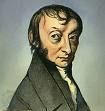










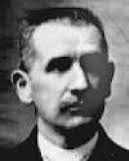



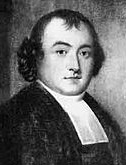








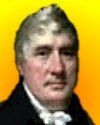



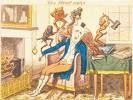

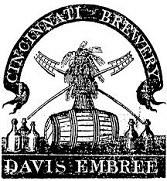
1811 On Jan. 19 Napoleon I decrees the creation of tours (towers), revolving doors at foundling hospitals enabling mothers to leave children in them anonymously, where they are supported by the state until age 12. In Jan. the army of Father Miguel Hidalgo (b. 1753) is routed near Guadalajara by a small Spanish army, causing him to flee to the N, where he is captured on Mar. 21, then taken to Chihuahua, defrocked, excommunicated and shot on July 30, his head publicly displayed until the end of the Mexican War of Independence (1821), after which in 1824 he becomes a nat. saint, and his town of Dolores is renamed Dolores Hidalgo (plus the town of Guadalupe Hidalgo), and Sept. 16 becomes Mexican Independence Day. On Feb. 5 his hereditary porphyria getting worse, Parliament declares George III insane, and his chunky, garrulous, often ridiculous fop son George Augustus Frederick (1762-1830), the prince of Wales (future George IV) is installed as prince regent (until 1820), growing so fat he becomes known as the prince of Whales; Welsh Capt. Rees Howell Gronow (1794-1865) of the elite First Foot Guards, who parties every night and often sees the Bag of Royal Blubber, "singularly imbued with petty pride" and his sometime friend Beau Brummell (1778-1840), begins a Journal (until 1830), detailing the preoccupation with social status, dress, and hedonism that the prince brings to English society, incl. how the Duke of Wellington is ejected from social events for wearing trousers of the wrong color. On Feb. 10 the Russians seize Belgrade from the Ottomans. On Mar. 1 at the request of Ottoman sultan Mahmud II, Macedonian-born Albanian-speaking Egyptian pasha (since May 17, 1805) Mehmet (Mohammed) Ali (1769-1849) destroys the greater part of the rebellious Mamluk Beys when he invites 470 of them to a banquet in honor of his son Tusin at the Citadel in Cairo, then massacres them, sending his troops to rout their forces; the Mamlukes (Mamelukes), who have been powerful in Egypt since 1250 are kaput; Mehmet Ali goes on to modernize and Westernize Egypt, nationalize and steal land from peasants, and set up armament factories and a navy, uttering the soundbyte: "I am well aware that the Ottoman Empire is heading by the day toward destruction... On her ruins I will build a vast kingdom... up to the Euphrates and the Tigris." On Mar. 2 the Junta Suprema de Caracas (formed last Apr.) dissolves itself after calling for a congress of the Venezuelan provinces and setting up a triumvirate; on July 5 (after missing the target date of July 4 to show admiration for the Yanks) the rev. govt. proclaims the First Venezuelan Repub. (ends July 25, 1812), modeled after the U.S. by Simon Bolivar, who visited the U.S. in 1809 and became an enthusiastic admirer, followed by a new constitution on Dec. 21, with Miranda's tricolor as the new flag; meanwhile on Aug. 11 Miranda takes Valencia; too bad, the loss of the Spanish market for cocoa exports causes the economy to tank and the pop. to lose enthusiasm. On Mar. 4 the French begin retreating from Santarem for the Spanish frontier; on Mar. 5 the Cadiz breakout Battle of Barrosa (Chiclana) near Cadiz, Spain is a push after a single British div. defeats two French divs. and captures their regimental eagle, causing them to reoccupy their siege lines. On Mar. 14 after calculating their chances should Napoleon conquer Russia and leave them isolated, the Austrians sign a treaty of alliance with France, agreeing to send 30K men to help him via Galicia; a cagey fox, Metternich secretly informs the Russians that his troops will only be used defensively, and only if Russia forces them. An heir at last? On Mar. 20 Marie Louise Bonaparte bears Napoleon I his only son, Napoleon Francois Joseph Charles Bonaparte (Napoleon II), Duc de Reichstadt, L'Aiglon ("the eagle") (1811-32), who later becomes the king of Rome; famous German astronomer Heinrich Olbers is deputed to assist at his baptism; too bad, the punk doesn't live long enough to fulfill all his daddy's aspirations; meanwhile French poet Casimir Delavigne (1793-1843) composes the poem Dithyrambe sur la Naissance du Roi de Rome, getting him a cushy govt. sinecure that allows him to compose some serious poetry. On Mar. 22 after leaving New York City last Sept., rounding Cape Horn on Dec. 25, and reaching Hawaii (Sandwich Islands) on Feb. 12, a 54-man expedition for John Jacob Astor's Pacific Fur Co. sailing on the 290-ton Tonquin, led by Alexander MacKay arrives in Clayoquot Sound at the mouth of the Columbia River in North Am., running into an Indian ambush which kills 17, incl. MacKay. On Mar. 28 after his term as pres. of Haiti (begun Feb. 17, 1807) expires, Henri Christophe overthrows S Haitian pres. (since Mar. 9, 1806) Alexandre Sabes Petion (Sabès Pétion) (1770-1818), and is proclaimed king Henri I (1767-1820), promulgating the Code Henri in imitation of the Code Napoleon, and building Sans Souci Palace in N Haiti near Cap Haitien; Petion goes into exile, then returns, giving sanctuary to Simon Bolivar in 1815, and proclaiming himself pres. for life on Oct. 9, 1816, suspending the legislature in 1818, going on to seize commercial plantations and redistribute the land to the poor, earning him the nickname Papa Bon-Coeur (good-hearted father); too bad, with no more exports, the economy sinks into bare subsistence. In the spring the economy of France begins to recover, but storms around Paris and a drought in the south leads to a poor harvest. On Apr. 3 the British defeat the starving French at the Battle of Sabugal. On Apr. 7 the Brits under Wellington blockade French-held Almeida, Spain; on Apr. 10 the Spanish seize Figueras, causing the French to siege them there on Apr. 17. On Apr. 6 after becoming gov. #16 of Va. on Jan. 16 and resigning, James Monroe (1758-1831) becomes U.S. secy. of state #7 (until Mar. 4, 1817), successfully promoting legislation in 1815 to foster the development of firearms technology at the federal armories in Springfield, Mass. and Harpers Ferry, Va., causing the Conn. River Valley to become a ceter of mass-produced firearms manufacture. On Apr. 11 Spanish gen. Jose Gervasio Artigas (1764-1850) issues the Mercedes Proclamation, leading a revolt against Spain in Uruguay (ends 1814), joining patriots from Buenos Aires and defeating the Spanish on May 18 in the Battle of Las Piedras, then sieging Montevideo. On Apr. 12 the first U.S. colonists on the Pacific coast arrive at Cape Dissapointment, Washington. On May 3-5 the Battle of Fuentes de Onoro sees the British-Portuguese army under Gen. Arthur Wellesley defeat the French under Gen. Massena, causing the Peninsular War to decisively turn against them, and the French invasion of Portugal to begin turning into a rout; on May 6 Wellesley sieges Badajoz; on May 8 Suchet sieges Tarragona; on May 10 the French garrison breaks out of Badajoz, causing the Brits to raze their siege on May 12; on May 16 the Battle of Albuhera (Albuera) is a V (push?) for the French and their Vistula Uhlan Regiment against the combined forces of Britain, Spain, and Portugal (a sobering lesson to Napoleon about his forces' limitations?), after which Wellesley resumes his siege of Badjoz on May 25, then begins retreating into Portugal on June 27; meanwhile in July French gen. Auguste Marmont (1774-1852) is hastily summoned to replace Gen. Massena in N Spain. On May 14 Paraguay, a country (pop. 120K) of small farmers and ranchers with military skills, mostly Guarani-speaking Indians (plus a tiny minority of whites and creoles) proclaims independence from Spain; Buenos Aires refuses to recognize it; meanwhile Creoles, commoners of Spanish descent who are sick and tired of being kicked around by Spanish aristocrats begin a continent-wide independence movement. On June 23 the Battle of Orbigo River is a V for the Spaniards over the French. On Aug. 3 13,642 ft. (4,158m) Mount Jungfrau ("virgin") in the Bernese Alps is scaled by the Meyer brothers of Arau and two chamois hunters from Valais; in 1865 a more direct route on the N side is opened. On Aug. 4 the British invade Java, and capture it on Sept. 18. On Aug. 10 the Battle of La Vertientes is a V for the French over the Spanish. On Aug. 11 the Brits under Wellington blockade Ciudad Rodrigo. On Aug. 15 Sophie Blanchard makes a balloon ascent in Milan to mark Napleon's 42nd birthday. On Aug. 19 the French capture Figueras. In Aug. after being kicked out of Oxford U. for writing the pamphlet "The Necessity of Atheism", wealthy poet Percy Bysshe Shelley (1792-1832) elopes with 16-y.-o. Harriet Westbrook (1795-1816), daughter of a former London coffeehouse owner, but finds her incompatible and abandons her in 1814, becoming a disciple of liberal Romantic movement founder (father of philosophical anarchism) William Godwin (1756-1836), father of Mary Wollstonecraft Godwin (1797-1851), who he decides is his real babe, esp. since she edits and promotes his works, and after Harriet commits suicide by drowning in Serpentine Lake in London in 1816, they elope to France, having three children, two of whom die in infancy; in 1816 they become friends with Lord Byron in Geneva. On Sept. 25 the Battle of El Bodon sees 2.5K French cavalry under gen. Montbrun surprise 1K infantry and 500 cavalry under British gen. Thomas Picton, after which they stage a fighting retreat. On Oct. 11 Little Juliana, the first steam-powered ferry boat, built in 1803 by Col. John Stevens III (1749-1838) begins operation between New York City and Hoboken, N.J.; meanwhile he works on steam-powered railroad engines. On Oct. 15 the U. of Berlin is founded in Berlin, Germany by Prussian educator Friedrich Wilhelm Christian Karl Ferdinand von Humboldt (1767-1835) as "the mother of all modern universities", located in the former palace of prince Henry of Prussia, brother of Frederick II on the Unter den Linden Ave.; in 1828 it becomes Friedrich-Wilhelm U. AKA Universitat unter den Linden; in 1949 it becomes Humboldt U. of Berlin. On Oct. 25 the Battle of Sanguntum in Spain a V for the French; too bad, on Oct. 28 the British defeat the French again at the Battle of Arroyos dos Molinos in W Estremadura. On Nov. 7 after Tecumseh's War (Rebellion) begins in Aug. 1810, Indiana territory gov. William Henry Harrison (1773-1841) attacks Prophet's Town in N Ind. at the Battle of Tippecanoe on the Tippecanoe (Algonq. "place of the buffalo fish") River (which flows SW into the Wabash River) with 700 militia, 90 cavalry, and 250 infantry, defeating 500-700 warriors and ending the threat of the Indian Confederation while boosting Harrison's political chances; Shawnee chief Tecumseh ("Shooting Star") ("Crouching Panther") (1768-1813) escapes to Canada along with his brother Tenskwatawa, allying with the British and Canadians and hoping to found the nation of "Amerindia"; Tenskwatawa had used his shine from predicting the June 16, 1806 solar eclipse to hornswaggle his warriors into throwing themselves against the white men's bullets, which he claimed could not hurt them, resulting in 25% being slaughtered. On Nov. 23 Gabriel Duvall (1752-1844) of Md. (until Jan. 14, 1835) and Joseph Story (1779-1845) (a Repub. Mass. rep. who became House Speaker this year) (until Sept. 10, 1845) (youngest until ?) become U.S. Supreme Court justices #17 and #18 to replace William Cushing (1789-1810) and Samuel Chase (1796-1811), keeping the number of members at lucky seven; no more changes for over a decade (1823); Duvall, who replaces fellow Marylander Chase goes on to become the "most insignificant U.S. Supreme Court justice", while Story goes on to a brilliant and storied career. On Dec. 5 Caesar Rodney resigns as U.S. atty. gen. after getting pissed-off for being passed over for a Supreme Court seat, and he is succeeded by Md.-born William Pinkney (1764-1822), who becomes U.S. atty. gen. #7 (until 1814). The Mississippi runs backwards? On Dec. 16 the 7.5-7.9 1811-12 New Madrid Earthquakes in the Mississippi River Valley on the North Am. Plate begin with a 7.2-8.2 earthquake and a 7.4 aftershock; rocking the bootheel region of Mo. centered in New Madrid, Mo., becoming known as the Great Shaking, decimating the region and reversing the course of the Mississippi River for a few hours; two more follow, on Jan. 23 and Feb. 7, the last reaching 8.3 (vs. 7.6 for the 1906 San Francisco quake), felt in one-third of the continental U.S., as far away as New York City and Canada, and becoming the worst in the contiguous U.S. E of the Rocky Mts. (until ?) (the Mar. 27, 1964 Alaskan Good Friday Earthquake is larger); the earthquakes uncover a scandalous murder and affect the War of 1812 after Tecumseh points to them as a sign from the Great Spirit that palefaces are doomed? On Dec. 20 the French siege Tarifa in Cadiz, Andalusia, Spain (ends Jan. 14). In Dec. DOI signer Benjamin Rush, a Philly physician mediates a reconcilation between the two alienated former U.S. presidents John Adams and Thomas Jefferson, and starting on New Year's Day they begin a genial 14-year correspondence consisting of 158 letters; Jefferson plants an acre of hemp (marijuana) at Monticello this year, and writes a pamphlet on hemp cultivation. The British occupy Java after retaking Malacca to use as a base (until 1818). Austria goes bankrupt, and a civil code is introduced. Napoleon I annexes Oldenburg. The Wahhabis hold Damascus for ransom, forcing the territory E of the Jordan to pay tribute, causing Mahmud II to send Egyptian viceroy Mehmet Ali and his son Tusun to restore Turkish authority in Arabia; too bad, they are repulsed, and prepare for a 2nd attack. Mass. Sen. Thomas Pickering is impeached for leaking documents about the Louisiana Purchase. N.J.-born James Scott Lawrence (1781-1883) is made capt. and given command of the USS Hornet, defeating the British vessel HMS Peacock. Ang Em becomes regent of Cambodia (until 1812), followed by Ang Snguon (until 1813). England suffers a severe trade depression, which causes many factories to close (ends 1813); meanwhile, Luddite riots in Nottinghamshire (stocking industry), Yorkshire (woolen industry), Lancashire (cotton industry) et al. in the English Midlands see workers protest loss of jobs by smashing newfangled machinery (shearing frames, power looms) on a large scale this year and next. Napoleon I flip-flops and removes the restrictions on Jews in France and all countries it rules. The charter of the Nat. Bank of Am. runs out, causing Nathan Mayer Rothschild (1777-1836) (son of Mayer Amschel Rothschild) to tell the U.S. govt. that if the charter isn't renewed, "the U.S. will find itself involved in a most diastrous war", causing him to instigate the War of 1812 in order to put the U.S. into so much war debt that it will be forced to recharter it? The port city of Astoria, Ore. near the Columbia River (modern-day pop. 9.5K) is founded by the Am. Fur Co. of John Jacob Astor as Ft. Astoria, becoming the first permanent U.S. settlement on the Pacific coast, and first to have a U.S. post office W of the Rocky Mts. Westminster, London, England-born Hudson's Bay Co. explorer and mapmaker ("the Stargazer") David Thompson (1770-1857) discovers Athabaska Pass over the Continental Divide in the Canadian Rockies from the Whirlpool River in Alberta to Wood River in British Columbia, which leads to the Columbia River and Pacific Ocean; he goes on to map 1.9M sq. mi. (4.9M sq. km) of North Am., becoming known as "the greatest land geographer who ever lived". Friedrich Ludwig Jahn (1778-1852) founds the first Turnplatz (open-air athletic field) in Berlin, conducting gymnastics classes to regenerate his compatriots who were down from what the French did to them during the Napoleonic Wars; he joins the Prussian army as a battalion cmdr. in 1813-15. Protestant missionaries from New England arrive in Hawaii and begin to convert the pop. through the chiefs. The Great Schism of Welsh Protestants, led by Rev. Thomas Charles (1755-1814) sees two-thirds leave the Anglican Church, leading to the founding of the Presbyterian (Calvinistic Methodist) Church of Wales in 1823 - God's been good to me? Views expressed at a French ecclesiastical council by Cardinal Fesch cause his nephew Napoleon I to send him back to his diocese of Lyons, then next year Nappy intercepts a letter by him to the pope complaining about him, causing them to become hostile to each other. The future U.S. states Oregon (Ore.) ("birch-bark dish") (native name of the Columbia River) and Washington (Wash.) are settled. Am. Rev. War col. Nathaniel Rochester (1752-1831) founds Rochester, N.Y. for settlers from the coast of Lake Ontario who want to move inland, and after successfully lobbying the state to build the Erie Canal on a route through it, the town booms - widemouth beer sounds better than fatass beer? French Lick in S Ind. is founded as a fortified ranger post and French trading post built near sulfur springs and a salt lick, originally called Salt Spring; the town is founded in 1857, becoming famous as a spa town, and later a casino town attracing Joe Louis, Irving Berlin, Al Capone et al.; it later becomes known for Pluto Water laxative, and as the hometown of NBA star Larry Bird. Napoleon fortifies the strategic seaport of Den Helder in North Holland on the Marsdiep (channel linking the Zuider Zee with the North Sea) 50 mi. NNW from Amsterdam at the terminus of the North Holland Canal, which has a 5-mi. dike that can be used to flood North Holland. A diet fad requires all food to be soaked in vinegar. New N.Y. lt. gov. (until 1813) DeWitt Clinton (1769-1828) goes to Congress to ask for funds for "the ditch" (Erie Canal), going on to become known as "the Father of the Erie Canal" - who can say no to a man with this pedigree? The Krupp Works in Essen, Germany are founded when Friedrich Krupp (1787-1826) establishes a small forge and experiments with cast steel, later adding eight smelting furnaces - is he koruppt? English caricaturist George Cruikshank (1792-1878) begins pub. cartoons in The Scourge, or Monthly Expositor of Imposture and Folly (ends 1816) and other satirical pubs, taking on everybody of all classes. English composer-conductor Vincent Novello (1781-1861) founds a music publishing house to pub. his own first work, a collection of sacred music. Young Edgar Allan Poe (b. 1809) moves in with his godfather John Allan. The U. of Christiania (Royal Frederick U.) in Christiania (modern-day Oslo), Norway is founded by king (1808-39) Frederick VI of Denmark and Norway (1768-1839) as the first univ. in the Danish-Norwegian Union, training high-ranking civil servants; for the first time Norwegian students don't have to attend the U. of Copenhagen; in 1905 the union with Sweden is dissolved; in 1946 it is renamed the U. of Oslo; in 1947-89 the Nobel Peace Prize is awarded yearly in its atrium. The Nat. U. of Nicaragua is founded. The Prague Conservatoire opens on Apr. 24. English-born Quaker Davis Embree founds the first brewery in Cincinnati, Ohio at 75 Water St. at the SE corner of Water and Elm Sts. on the Ohio River, using a horse treadmill to 5K barrels/year. Architecture: John Nash (1752-1835) begins designing elegant curved bldgs. for Regent Street in London. Construction of the Cumberland (Nat.) Road finally begins in Cumberland, Md.; Pres. Jackson later refuses to use federal funds for maintenance and repair, leaving it to the states through which it passes, and it runs out of funds in Vandalia, Ill. in 1839. Scottish engineer John Rennie the Elder (1761-1821) begins the granite Waterloo Bridge in London crossing the Thames River between Blackfriars Bridge and Hungerford Bridge (opens June 18, 1817), becoming known for the finest ground-level views in London; a new bridge is built in 1942-5. The 2-story Federal style New York City Hall is completed, complete with a copper roof. Inventions: On May 31 Albrecht Ludwig Berblinger (1770-1829), "the Flying Tailor of Ulm" in Germany unsuccessfully attempts to cross the Danube River on a semi-rigid hang-glider; after he crashes and is rescued by fishermen, he becomes the first heavier-than-air pilot to survive a water immersion accident. The Paragon, "a whole floating town" becomes Fulton's 3rd steamboat operating on the Hudson River. Alexander von Humboldt of Germany pub. the first subdivided bar graph. Albrecht Ludwig Berblinger (1770-1839), the "Flying Tailor of Ulm" in Germany attempts unsuccessfully to fly with his own hang glider. James Hume of England patents the first floor-sweeping machine, consisting of a box containing a brush that is turned by a pulley. Swiss mountaineer Johann Rudolf Meyer (1739-1813) climbs the Jungfrau, and hires mathematician Jean Henri Weiss (1758-1826) and carpenter Joachim Eugen Muller (1752-1833) to create the first terrain model of the Swiss Alps - get your mind out of the gutter? Nicholas J. Roosevelt (1767-1854) (grand-uncle of Pres. Theodore Roosevelt) builds the first steamboat on U.S. western waters (the Mississippi River), the New Orleans, a 300-ton side-wheeler based on Fulton's design in Pittsburgh, Penn.; The Paragon, "a whole floating town" becomes Fulton's 3rd steamboat operating on the Hudson River. Science: Turin-born Italian scientist Count Lorenzo Romano Amedeo Carlo Avogadro (1776-1856) proposes Avogadro's Principle (Law), that equal volumes of gases contain equal numbers of molecules (not atoms) at a given temperature and pressure; his ideas are neglected until 1858? After his father is put in debtors' prison in 1805, forcing him to manage his saltpeter business, French chemist Bernard (Barnard) Courtois (1777-1838) courteously discovers the metallic element Iodine (I) (#53) in seaweed ash. English chemist Humphry Davy discovers colorless poisonous heavy gas Phosgene (carbonyl chloride). French chemist-physicist Pierre Louis Dulong (1785-1838) discovers the double decomposition of salts. French astronomer Honore Flaugergues (Pierre-Gilles-Antoine-Honoré Flaugergues) (1755-1835) discovers the Great Comet of 1811 (C/1811 F1) in the constellation Argo Noves, causing wine of vintage 1811 to be called wine of the comet. French mathematician Adrien-Marie Legendre discovers and names the Gamma Function. Nonfiction: Charles Bell (1774-1842), New Idea of the Anatomy of the Brain; distinguishes sensory from motor nerves. K.A. Bottiger, Kunstmythologie. Maria, Lady Callcott (1785-1842), Journal of a Residence in India. Georges Cuvier (1769-1832) and Alexandre Brongniart (1770-1847), Essai sur la Geographie Mineralogique des Environs de Paris; contains a tertiary stratigraphic map. Jakob Friedrich Fries (1773-1843), System der Logik; new eds. in 1819 and 1837. Elias Hicks (1748-1830), Observations on Slavery. Karl Christian Friedrich Krause, Das Urbild der Menschheit. Louis-Gabriel Michaud (1773-1858) (ed.), Biographie universelle ancienne et moderne : histoire par ordre alphabétique de la vie publique et privée de tous les hommes (85 vols.) (1811-); 2nd. ed (45 vols.) in 1843-. Hannah More (1745-1833), Practical Piety. James Parkinson, Mad-houses; English insane asylums. Simeon Denis Poisson (1781-1840), Traite de Mecanique (1811-33). David Ramsay (1749-1815), A Chronological Table of the Principle Events Which Have Taken Place in the English Colonies, now United States, from 1607 til 1810. J.P.A. Recusat, Essai sur la Langue et la Litterature. David Ricardo (1772-1823), On the High Price of Bullion. Percy Bysshe Shelley (1792-1822), The Necessity of Atheism; gets "Mad Shelley" expelled from Oxford U. Music: Daniel Auber (1782-1871), Julie (comic opera). Ludwig van Beethoven (1770-1827), The Archduke Trio (Op. 97); in honor of his pupil and benefactor Archduke Rudolph, brother of Emperor Franz I. Jean-Francois Lesueur (1760-1837), Ruth and Naomi (oratorio); Ruth and Boaz (oratorio). C.M. von Weber, Abu Hassan (opera) (Munich). Art: Washington Alliston (1779-1843), Mediterannean Coastal Scene. Henry Bone (1755-1834), Bacchus and Ariadne; after Titian. Jean Auguste Dominique Ingres (1780-1867), Jupiter and Thetis. Sir Thomas Lawrence (1769-1830), Portrait of Benjamin West. Sally Miller, Memorial. Bertel Thorvaldsen (1770-1844), Procession of Alexander the Great (sculpture). Plays: Ugo Foscolo (1778-1827), Ricciarda; Aiace (tragedy); contains veiled allusions to Napoleon, causing the author to have to leave Padua for Florence, then Switzerland in 1815, and finally to London. Poetry: William Cullen Bryant (1794-1878), Thanatopsis; the first truly great U.S. poem, written by a 17-y.-o. law student and future ed. of the the New York Evening Post; at 13 he had written a well-known satire on Thomas Jefferson; "To him who in the love of Nature holds/ Communion with her visible forms, she speaks/ A various language". Johann Wolfgang von Goethe (1749-1832), Aus Meinem Leben: Dichtung und Wahrheit (From My Life: Poetry and Truth) (autobio.) (4 vols.) (1811-3). Josef Jungmann (1773-1847) (tr.), John Milton's Paradise Lost; a breakthrough for Czech lit., making it too cool for the Austrian-only club of the Hapsburgs to keep down? Novels: Jane Austen (1775-1817), Sense and Sensibility; set in Sussex in 1792-7; sisters Elinor Dashwood (sense) and Marianne Dashwood (sensibility); "The family of Dashwood had long been settled in Sussex." Friedrich de la Motte Fouque (1777-1843), Undine; water spirit Undine marries knight Huldebrand to gain a soul; his masterpiece?; inspires operas by E.T.A. Hoffmann (1814), Albert Lortzing (1845) and Alexei Lvov (1846). Xavier de Maistre (1763-1852), The Lepter from Aoste. Births: Am. portraitist William Page (d. 1885) on Jan. 3 in Albany, N.Y.; student of Samuel F.B. Morse (1791-1872); friend of Robert Browning and Elizabeth Barrett Browning. French #1 organ builder Aristide Cavaille-Coll (Cavaillé-Coll) (d. 1899) on Feb. 4 in Montepellier. Am. Roman Catholic bishop of Philadelphia (1852-60) (St.) John Nepomucene Neumann (d. 1860) on Mar. 28 in Prachatice, Bohemia; emigrates to the U.S. in 1836; first male U.S. saint (1977); feast day: Jan. 5. Am. Radical Repub. politician and U.S. Sen. (R-Mass.) (1851-74) Charles Sumner (d. 1874) on Jan. 6 in Boston, Mass.; educated at Harvard U.; known for his big beating in 1856. French writer-poet-jurist (Freemason) Edouard Rene Lefevre (Édouard René Lefèvre) de Laboulaye (d. 1883) on Jan. 18 in Paris; friend of Frederic-Auguste Bartholdi (1834-1904), who gets the idea of the Statue of Liberty from him. English poet Arthur Henry Hallam (d. 1833) on Feb. 1 in London; "Jeune homme fatal of his generation"; son of Henry Hallam (1777-1859); educated at Eton College (where he meets William Gladstone) and Trinity College, Cambridge U. (where he meets Alfred, Lord Tennyson and joins the Cambridge Apostles). Am. Shakespearean scholar Delia Salter Bacon (d. 1859) on Feb. 2 in Tallmadge, Ohio; born in a log cabin. Am. "Go West, young man" New York Tribune journalist-politician Horace Greeley (d. 1872) on Feb. 3 in Amherst, N.H. English "Liddell & Scott Greek-English Lexicon" scholar-educator Henry George Liddell (d. 1898) on Feb. 6; dean of Christ Church (1855-91); father of "Alice in Wonderland" Pleasance Liddell (1852-1934); educated at Charterhouse School, and Christ Church, Oxford U. French marshal (1864-88) Francois Achille Bazaine (d. 1888) on Feb. 13 in Versailles. French novelist Leonard Sylvain Julien "Jules" Sandeau (d. 1883) on Feb. 9 in Aubusson (Creuse); lover (1831) of George Sand. U.S. Sen. (R-Ind.) (1861-7) (abolitionist) Henry Smith Lane (d. 1881) on Feb. 24 near Sharpsburg, Ky. French Neptune-predicting mathematician Urbain Jean Joseph Le Verrier (d. 1877) on Mar. 11 in Saint-Lo; educated at Ecole Polytechnique. Am. Mormon leader William B. Smith (d. 1893) on Mar. 13 in Royalton, Vt.; 8th child of Joseph Smith Sr. (1771-1840) and Lucy Mack Smith (1775-1856); younger brother of Joseph Smith Jr. (1805-44). German "Zopf und Schwert" Young Germany novelist-dramatist Karl Ferdinand Gutzkow (d. 1878) on Mar. 17 in Berlin. French emperor (1814-15) ("L'Aiglon") ("the Eaglet") Francois Joseph Charles Bonaparte (Napoleon II), Duke of Reichstadt, King of Rome (d. 1832) on Mar. 20; son of Emperor Napoleon I (1769-1821) and 2nd wife Marie Louise of Austria (1791-1847). Japanese Western scholar Sakuma Shozan (Zozan) (Kunitada) (d. 1864) on Mar. 22 in Shinsu (modern-day Nagano Prefecture); born to a samurai family; coiner of the phrase "Eastern morality and Western technology". German chemist (spectroscope and bunsen burner inventor) Robert Wilhelm Eberhard Bunsen (d. 1899) on Mar. 31 in Gottingen; educated at the U. of Gottingen. Am. Scottish School of Common Sense philosopher Princeton U. pres. #11(1868-88) James McCosh (d. 1894) on Apr. 1 in Ayrshire, Scotland; educated at the U. of Glasgow, and U. of Edinburgh; emigrates to the U.S. in 1868. French Barbizon School gloomy-dramatic-tragic landscape painter Jules Dupre (Dupré) (d. 1889) on Apr. 5 in Nantes; his daddy manufacturers porcelain, and he starts out decorating the stuff, but an 1834 trip to England to study John Constable's paintings really fixes his style, which tends to the dramatic and tragic. Am. "History of the Conflict Between Religion and Scientist" chemist-historian-photographer John William Draper (d. 1882) on May 5 in St. Helens, Lancashire, England; educated at Univ. College, London; emigrates to the U.S. in 1832; father of Henry Draper (1837-82). Chinese celebs Chang and Eng Bunker (d. 1874) on May 11 in Siam; the original (xiphopagus) Siamese (Conjoined) Twins; showman Abel Coffin brings them to the U.S. in 1828, and they adopt the Am. name Bunker in 1844. U.S. Civil War Confed. Col. (quartermaster-gen.) (Jewish) Abraham Charles Myers (d. 1889) on May 14 in Georgetown, S.C.; descendant of Rabbi Moses Cohen; namesake of Ft. Myers, Fla. Russian lit. critic ("Father of the Russian Radical Intelligentsia") Vissarion Grigorievich "Furious" Belinski (Belinsky) (d. 1848) on May 30 (June 30 Old Style) in Sveaborg (Helsinki), Finland; educated at the U. of Moscow; collaborator of Nikolai Nekrasov (1821-78); hates Westernizing tendencies. Am. theologian Henry James Sr. (d. 1882) on June 3 in Albany, N.Y.; father of William James (1842-1910), Henry James (1843-1916), and Alice James (1848-92); educated at Princeton U. Scottish physician Sir James Young Simpson (d. 1870) on June 7 in Bathgate, West Lothian; educated at the U. of Edinburgh; first to be knighted for services to medicine. Am. 4'11" "Uncle Tom's Cabin" abolitionist writer ("Crusader in Crinoline") Harriet Elisabeth Beecher Stowe (d. 1896) on June 14 in Litchfield, Conn.; daughter of Rev. Lyman Beecher (1775-1863); sister of Catharine Esther Beecher (1800-78), Edward Beecher (1803-95), Henry Ward Beecher (1813-87), and Charles Beecher (1815-1900). Icelandic nationalist leader Jon Sigurdsson (d. 1879) on June 17 in Hrafnseyri; moves to Copenhagen in 1833; his birthday becomes the Icelandic nat. holiday. U.S. Supreme Court justce #33 (1853-61) John Archibald Campbell (d. 1889) on June 24 near Washington, Ga.; not to be confused with soup manufacturer Joseph Albert Campbell (1817-1900). English jurist-inventor Sir William Robert Grove (d. 1896) on July 11 in Swansea, South Wales; educated at Brasenose College, Oxford U.; inventor of the platinum-zinc cell (1839) and the fuel cell (1843). English "Vanity Fair" novelist William Makepeace Thackeray (d. 1863) on July 18 in Calcutta, India; educated at Charterhouse ("Slaughterhouse"), and Trinity College, Cambridge U. English diplomat James Bruce, 8th Earl of Elgin and 12th Earl of Kincardine (d. 1863) on July 20 in London; son of the 7th Earl of Elgin (1766-1841). Am. grain elevator inventor Elisha Graves Otis (d. 1861) on Aug. 3 in Halifax, Vt. Italian politician-diplomat gen. Enrico Cialdini, Duke of Gaeta (d. 1892) on Aug. 10 in Castelvetro, Modena; created duke in 1861. French "Mignon", "Hamlet" opera composer Charles Louis Ambroise Thomas (d. 1896) on Aug. 11 in Metz. Am. Confed. statesman-atty. (Jewish) ("Brains of the Confederacy") Judah Philip Benjamin (d. 1884) on Aug. 6 in St. Thomas, West Indies; English Jewish father, Portuguese Jewish mother; grows up in N.C. and S.C.; educated at Yale U.; his face is on the $2 Confederate bill. English historian Sir Henry Halford Vaughan (d. 1885) on Aug. 27 in London; son of Sir John Vaughan (1769-1839). French "Mademoissele de Maupin" Romantic poet-novelist-dramatist-critic -journalist Piere Jules Theophile (Théophile) Gautier (d. 1872) on Aug. 30 in Tarbes, Hautes-Pyrenees; writer of cool travel books; big man in the Parisian lit. set for 40 years, becoming a forerunner of Modernism, Symbolism, Decadence etc. Danish brewer-philanthropist Jacob Christian Jacobsen (d. 1887) on Sept. 2. Am. philosopher Francis Bowen (d. 1890) on Sept. 8 in Charlestown, Mass.; educated at Phillips Exeter Academy, and Harvard U. Am. "The Prostrate State" historian (Radical Repub.) James Shepherd Pike (d. 1882) on Sept. 8 in Calais, Maine. Hungarian New German School pianist-composer ("the Napoleon of the Piano") Franciscus (Ferenc) "Franz" Liszt (d. 1886) (Hung. "flour") on Oct. 22 [Libra] in Raiding, Burgenland; Beethoven kissed him on the forehead as a baby? - beet-kissed Liszt? French mathematician (discoverer of abstract algebra) Evariste (Évariste) Galois (d. 1832) on Oct. 25 in Bourg-la-Reine (near Paris). Am. theologian (Lutheran) C.F.W. (Carl Ferdinand Wilhelm) Walther (d. 1887) on Oct. 25 in Langenchursdorf, Saxony; educated at the U. of Leipzig; emigrates to the U.S. in Nov. 1838. Am. New York City police commissioner #1 George Washington Matsell (d. 1877) on Oct. 26 in New York City; English immigrant father from Norfolk. Am. sewing machine inventor (Jewish?) Isaac Merritt Singer (d. 1875) on Oct. 27 in Pittstown, N.Y.; father of Winnaretta Singer (1865-1943). French Socialist historian ("Father of State Socialism") Louis Jean Joseph Charles Blanc (d. 1882) on Oct. 29 in Madrid, Spain; educated in Paris; coins the soundbye "To each according to his needs, from each according to his abilities" - feel that cold all over your body? Czech "The Bouquet" poet-historian Karel Jaromir Erben (d. 1870) on Nov. 7 in Miletin u Jicina. French teacher Francois Delsarte (d. 1871) on Nov. 11 in Solesmes; originator of the Delsarte system of calisthenics combined with singing and dancing. Am. Civil War Confed. brig. gen. Benjamin "Ben" McCulloch (d. 1862) on Nov. 11 in Rutherford County, Tenn. English Radical-Liberal Quaker statesman-economist-orator John Bright (d. 1889) on Nov. 16 in Rochdale, Lancashire. Am. Civil War Union rear adm. John Ancrum Winslow (d. 1873) on Nov. 19 in Wilmington, N.C.; descendant of Mayflower passenger Mary Chilton (1607-79) and John Winslow, brother of Edward Winslow (1595-1655); first cousin of Francis Winslow (1818-62). Bavarian king (1848-64) Maximilian II (d. 1864) on Nov. 28 in Munich; son of Ludwig I (1786-1868) and Therese of Saxe-Hildburghausen (1792-1854); father of Ludwig II (1845-86). Am. abolitionist orator Wendell Phillips (d. 1884) on Nov. 29 in Boston, Mass.; son of John Phillips (1770-1823) (1st mayor of Boston); educated at Boston Latin School, and Harvard U. Am. Repub. politician (black) Lewis Hayden (d. 1889) on Dec. 2; born into slavery; escapes to freedom in 1844. English opera mgr. (Jewish) Benjamin Lumley (Levy) (d. 1875); son of Jewish merchant Louis Levy (-1875). English Bird's Custard manufacturer-chemist Alfred Bird (d. 1878) in Nympsfield, Gloucestershire. Am. educator and Unitarian minister William Greenleaf Eliot (d. 1887) in New Bedford, Mass.; grandfather of T.S. Eliot (1888-1965); educated at Harvard U.; founder of Washington U. in St. Louis, Mo. Am. businessman-politician (Universalist) (mayor #3 of Pasadena, Calif. in 1888-90) (founder of Caltech) Amos Gager Throop (d. 1894) in Chicago, Ill.; descendant of Col. Adrian Scrope (1601-60). Deaths: British adm. Sir Peter Parker (b. 1721). French explorer (discoverer of Tahiti) Louis de Bougainville (b. 1729) on Aug. 20 in Paris. English bishop-poet Thomas Percy (b. 1729) on Sept. 30. Am. Rev. leader (DOI signer) William Williams (b. 1731) on Aug. 2 in Conn. English dramatist-novelist Richard Cumberland (b. 1732) on May 7 in London. English astronomer royal (1765-1811) Nevill Maskelyne (b. 1732) on Feb. 9 in Greenwich. German writer Christoph Friedrich Nicolai (b. 1733) on Jan. 11 in Berlin. British PM (1768-70) Augustus FitzRoy, 3rd duke of Grafton (b. 1735) on Mar. 14 in Euston Hall, Suffolk. English adm. Sir John Acton, 6th baronet (b. 1736) on Aug. 12 in Palermo, Sicily. English-born U.S. postmaster gen. (1776-82) Richard Bache (b. 1737). French Arc de Trimphe architect Jean Chalgrin (b. 1739) on Jan. 21. U.S. Supreme Court justice #9 (1796-1811) Samuel Chase (b. 1741) on June 19 in Baltimore, Md. German naturalist Peter Simon Pallas (b. 1741) on Sept. 8 in Berlin. Am. statesman-jurist Francis Dana (b. 1743) on Apr. 25 in Cambridge, Mass. Hungarian dramatist-poet Gyorgy Bessenyei (b. 1747) on Feb. 24. Am. pioneer Ebenezer Zane (b. 1747) (jaundice); namesake of Zanesville, Ohio. Am. philanthropist James Bowdoin III (b. 1752) on Oct. 11 in Naushon Island, Buzzards Bay, Mass. Mexican rev. priest Miguel Hidalgo y Costilla (b. 1753) on July 30 in Chihuahua; defrocked, excommunicated and executed by firing squad; his head, along with those of fellow rebels Domingo Narciso de Allende, Juan de Aldama, and Jose Mariano Jimenez are displayed on the four corners of the Alhondiga de Granaditas in Guanajuato until 1821. English gen.-statesman Henry Edward Fox (b. 1755) on July 18. English artist Isaac Cruikshank (b. 1756). French dramatist Marie-Joseph de Chenier (b. 1764) on Jan. 10 in Paris. U.S. Gen. William Eaton (b. 1764) on June 1 in Brimfield, Mass. Am. Unitarian minister William Emerson (b. 1769) on May 12. Russian gen. Nikolai Kamensky (b. 1776) on May 4 in Odessa (fever). German poet Heinrich von Kleist (b. 1777) on Nov. 21 near Potsdam (double suicide with his babe Henriette Vogel); the Kleist Prize for German lit. is founded in 1912 - the good die young?




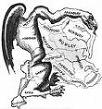













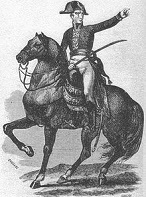







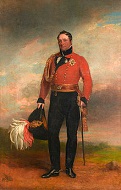
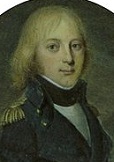
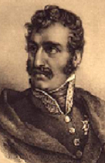
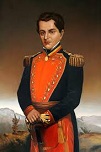









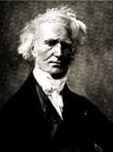








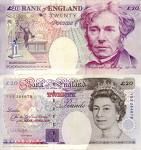
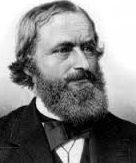




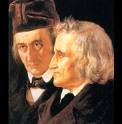
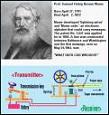
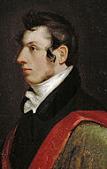
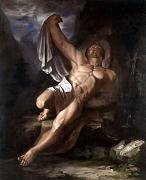

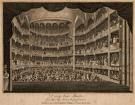

1812 On Jan. 8 the British under Arthur Wellesley siege Ciudad Rodrigo in Spain, capturing it on Jan. 19. On Jan. 9 the French under Marshal Louis Gabriel Suchet capture Valencia, Spain. On Jan. 19 the Battle of Villaseca is a V for the Spanish over the French. On Jan. 26 France annexes Catalonia. On Jan. 29 the Battle of Altafulla is a V for 8K French over 4,250 Spanish after Spanish Gen. Joaquin Ibanez (Joaquín Ibáñez), Baron de Eroles (1784-1825), who wiped out a French column on Jan. 18 in Col de Balaguer underestimates the enemy strength in a heavy fog and becomes a big tall fool. In Jan. Pres. Madison appoints Am. Rev. hero and former U.S. war secy. Henry Dearborn (1751-1829) as maj.-gen. in charge of the NE war sector from the Niagara River to the New England coast; too bad, he's turned into an incompetent old fart? On Feb. 2 the French capture Pensicola, Fla. On Feb. 11 Mass. Dem.-Repub. Gov. Elbridge Gerry (1744-1814) (pr. with hard G) signs a redistricting law carving Essex County up to favor his party, giving birth to the term "Gerrymandering" (pr. with soft G) after it assumes the shape of a salamander - that's why it's called messy chewits? On Feb. 13 the U.S. Supreme (Marshall) Court rules unanimously (6-0) in U.S. v. Hudson that in order for federal courts to render a criminal conviction for some activity, Congress must first enact a law criminalizing the activity, attach a penalty, then give the courts jurisdiction, barring them from trying and convicting defendants for common law crimes and introducing the principle of Nulla poena sine lege (Lat. "no penalty without a law"); courts retain implied powers to punish litigants for contempt of court and for defying court orders; Justice Bushrod Washington recuses himself. On Feb. 14, 1812 after the Ohio state legislature chooses the name, the city of Columbus, Ohio (after Christopher Columbus) at the confluence of the Scioto and Olentangy Rivers (modern-day pop. 787K/2.4M) is founded as the capital of Ohio after Ohio City is outvoted; it assumes the official functions in 1816. On Feb. 24 Prussia authorizes the French army to traverse its territory and provides them with 20K soldiers, and on Apr. 1 they reach the Oder River. On Feb. 27 Lord Byron addresses the House of Lords for the first time, about the Luddites. On Mar. 3 the U.S. Congress passes its first foreign aid bill. On Mar. 5 the Battle of La Roda in La Mancha, Castile is a V for the Spanish over the French. On Mar. 16 the British under Arthur Wellesley siege Badajoz, capturing it on Apr. 6. Why shaky superstitious South America is a bad place for a revolution? On Mar. 26 (Maundy Thur.) (2nd anniv. of the founding of the Caracas Junta) Caracas, Venezuela suffers a severe earthquake that kills 12K, doing most of the damage in repub. areas, causing the royalists to call it a punishment from God, further weakening the new Venezuelan Repub.; after the superstitious provinces bite bigtime, they switch to the royal side, and on July 4 the royalists stage a successful uprising in Barcelona, causing neighboring Cumana Province to defect. In the spring after the news of Alexander Mackenzie's explorations turns on Scottish philanthropist Lord Thomas Douglas, 5th Earl of Selkirk (1771-1820) to the Lake Winnipeg and Red River area in Manitoba as a place to help the poor start a new life, and he purchases the Selkirk Concession (a 300 sq. km tract in Manitoba, Minn. and N.D.), a party of 100 distressed Scottish crofters led by Capt. Miles Macdonnell arrives and establishes the Red River Colony, appeasing the Hudson's Bay Co. by agreeing not to threaten their monopoly; too bad, the rival North-West Co. stirs up trouble, and in 1815 a group of trappers and Metis drive the settlers out, which only pisses-off Selkirk, causing him to regain control with troops in 1817. In the spring Russia hastily makes peace with the Swedes and British, and breaks with France for fear that Napoleon wants to restore Poland under the grand duchy of Warsaw using his marriage alliance with the Austrians. In the spring retired ex-U.S. pres. Thomas Jefferson begins brewing beer at his Monticello estate in Va.; on May 12 he orders his slaves to bottle it. On Apr. 5 Russia signs a treaty of alliance with Sweden. On Apr. 20 U.S. vice-pres. #4 George Clinton (b. 1739) dies, becoming the first U.S. veep to die in office; his term isn't up until Mar. 3, 1813. On Apr. 30 "Pelican State" Louisiana (La.) is admitted as the 18th U.S. (slave) state, with former teritorial gov. (1804-12) William Charles Cole Claiborne (1775-1817) as gov. #1 (until 1816). On May 8 after Arthur Wellesley enters Madrid, and a nat. assembly is elected in Cadiz, Spain promulgates the new democratic 1812 Constitution; in July Wellesley begins a retreat to Portugal. On May 11 British Tory PM (since Oct. 4, 1809) Sir Spencer Perceval (b. 1762) is assassinated in the House of Commons by Liverpool businessman John Bellingham (b. 1769) (who is hanged on May 18), becoming the first British PM assassinated (next ?), and is succeeded on June 8 by freedom-of-speech stomper Tory Pittite Robert Banks Jenkinson, 2nd Earl of Livepool (1770-1828) (until Apr. 9, 1827). On May 14 after a triumphant entry into Caracas on Apr. 26 by Francisco Miranda, where he is appointed CIC of the army, he is defeated by a Spanish force under Juan Domingo de Monteverde y Rivas (1773-1832) (a frigate capt. who formed a large army of volunteers) at the Battle of La Victoria in La Victoria, Venezuela on June 20 and June 29 after treachery by Pedro Ponce, then retreats to Cabrera, decides it's hopeless and signs an armistice with Monteverde in Victoria on July 25 without authorization from the Caracas Junta, after which he attempts to flee on a British ship at La Guaira, and is arrested on July 30 in Laguayra as a traitor by the junta, who decide not to shoot him but hand him over to the Spanish, who sent him next year to Cadiz, where he dies in 1816 in the dungeons of the Spanish Inquisition; in June Monteverde becomes capt.-gen. of Venezuela (until Aug. 8, 1813); Simon Bolivar, who fought at Valencia and used Miranda as a bargaining chip for his own freedom flees to Cartagena, where on Dec. 15 he writes the Cartagena Manifesto, calling for a joint effort by Venezuela and New Granada to gain independence from Spain - attempted liberation is heresy? On May 18 the Battle of Silistria (Silistra) and the Battle of Vidin are Vs for Russia over Turkey despite the presence of Osman Pasha; on May 28 the Seventh Russo-Turkish War (begun 1806) ends with the Treaty of Bucharest; Russia gains the much-coveted province of Bessarabia (until 1917) and a position in the Balkans; Turkish influence in Romania weakens; the Turks are freed to take care of the pesky Serbs. On May 18-19 the Battle of Almaraz in Spain sees an Anglo-Portuguese army under British Lt. Gen. Rowland Hill (1772-1842) destroy a French pontoon bridge over the Tagus River, keeping French forces separated. On May 24 Napoleon I makes his final decision to invade Russia - talk about wishing to have a day back? In May the Repub. congressional caucus renominates Pres. Madison, along with Gov. Elbridge Gerry of Mass. for vice-pres.; 10 days later the Repubs. of N.Y. counter with the nomination of De Witt Clinton, late vice-pres. George Clinton's nephew, jealous that for 20 of the nation's 24 years a Virginian has held the presidency? On May 31 the Battle of Bornos in Bornos, Spain 40 mi. NE of Jerez de la Frontera is a V for the French under Gen. Nicolas Francois Conroux, Baron de Pepinville (Pépinville) (1770-1813) over the Spanish under Gen. Francisco Ballesteros (1770-1832) after they repel a surprise attack. In May price lids on grain are reinstated in France, but local prefects undermine them in competition with each other, and prices actually rise 50%-100%. On June 1 after France fails to close the leaks in their British blockade, causing a boom in British textiles in supplying Nappy's enemies, causing Napoleon to promise to repeal his blockade, followed by the Brits failing to revoke their restrictions on neutral trade with French-held Europe, pissing-off the U.S., Pres. Madison gives a speech, reciting a long list of British injuries (seizure of cargoes, impressment of seamen), which they had only responded to with "remonstrances and expostulations", then claims that there is "on the side of Great Britain a state of war against the United States, and on the side of the United States, a state of peace toward Great Britain"; even though the northeasterners vote against war, the "War Hawks" of the South and West, crying "free trade and seamen's rights", with their eyes on a possible takeover of Canada and pacification of Indian tribes in the NW railroad the U.S. House on June 4 into a war resolution by a 79-49 vote, followed on June 18 by a 19-13 vote in the Senate after Pres. Monroe becomes the first U.S. pres. to ask for a declaration of war, and the War of 1812 (Mr. Madison's War) (Second War of Independence) on Great Britain begins (ends Feb. 17, 1815); too late, on June 16 the British finally lift their restrictions on neutral trade without their knowledge; the U.S. Navy at first consists of only 16 seagoing vessels, vs. 1K+ for the British, and the war is very unpopular in New England, at first being ignored in favor of illegal trading and privateering, but when the fall of Napoleon allows the British to extend their blockade to New England and occupy Maine, it is considered a Southern plot to ruin them as ships rot in North Atlantic ports and goods pile upon the docks of Boston, Salem, and Marblehead; the Kickapoo, Wyandot, Shawnee (Northwest Indians), Sac and Fox, and other tribes fight with the British against the Americans (perhaps their last hurrah?); the Colonial Marines, formed in 1808 by the British from runaway black slaves who are promised their freedom if they fight serve from May 18, 1814-Aug. 20, 1816, mainly stationed at St. Augustine, Fla. and the Negro Fort (Fort Gadsden) on the Apalachicola River in NW Fla., pissing-off white slaveowners, who wait till they are disbanded then destroy their fort in the July 27, 1816 Battle of Negro Fort; Dem.-Repub. N.Y. Gov. (1807-13) Daniel D. Tompkins raises 40K militia using his personal fortune as security for equipment. On June 4 now that La. is a state, the Louisiana Territory is renamed the Missouri Territory. On June 15 the French evacuate Oviedo, Spain. On June 15 the Russians stop the French under Gen. Reynier at the Battle of Kobrin, becoming their first V over Napoleon. On June 16 the City Bank of New York opens; it later changes its name to Citibank. On June 17 the British under Gen. Arthur Wellesley siege Salamanca, Spain; on July 22 after several weeks facing each other off, the Battle of Salamanca (Battle of the Arapiles) is a V for the Brits and Portuguese under Wellesley over the French forces of Marshal Auguste Marmont, who is gravely wounded in the right arm and side and retires to France; meanwhile British Gen. Rowland Hill and his 18-man army protect Badajoz. 600K in, 30K out? On June 21 after raising taxes to pay for it, Napoleon declares war on Russia, and assembles his Grande Armee of 600K dead-men-walking (30K from Austria and 20K from Prussia, forming the right and left wings) (no overcoats) and marches them to Russia, with Prussia granting them free passage, invading Mother Russia on June 23, crossing the Niemen (Neman) River at Kovno 50 mi. NW of Vilna on June 26, then occupying Vilna (Vilnius) 700 mi. W of Moscow on June 28, while the Russians under gen. prince Michael Andreas (Mikhail Bogdanovich) Barclay de Tolly (1761-1818) (of Scottish descent) retreat without giving battle - my life always goes to the edge, my American Express card with me? On July 2 the Spanish siege French-held Astorga, Spain. On July 8 the French occupy Minsk, Russia. On July 20 Sicily proclaims a new 1812 Sicilian Constitution; the Sicilian Mafia is born as Sicily transitions out of feudalism and feudal barons sell their land to private citizens, causing private landowners to zoom from 2K in 1812 to 20K in 1861, recruiting armed guards to protect property rights. On July 21 the First Battle of Castalla is a V for the French over the Spanish. On July 23 the Battle of Saltanova S of Mogilev sees the Russians under gen. Nikolai Nikolaevich Raevsky (1771-1829) (whose 11-y.-o. son Nikolai and 16-y.-o. son Alexander fight with him) defeat the French then cross the Dnieper River to Smolensk, which he holds in a 24-hour battle on Aug. 4. On July 24 the French under Gen. MacDonald siege Riga, Latvia. On July 28 the French occupy Vitebsk, Russia. On July 30-Aug. 1 the Battle of Gorodetschna is a V for 25K Austrians and 13K Saxons over 31K Russians under Gen. Count Alexander Petrovich Tormasov (1752-1819), with 4K Russian casualties vs. 3K Austrian-Saxon casualties, after which the Russians withdraw and allow the Allies to occupy Kobrin on Aug. 3, causing Austrian Emperor Francis I to promote gen. Karl Philipp, Prince of Schwarzenberg (1771-1820) to field marshal. In July the Yankees fall all over themselves in their rush to invade and take over Canada, starting with a brief incursion into sparsely populated Upper Canada, but the reverses start early, and on Aug. 16 inept Gen. William Hull (1753-1825) surrenders Detroit to the British under Canadian leader Maj. Gen. Sir Isaac Brock (1769-1812), and is later court-martialed for it, while Brock becomes known as "the Hero of Upper Canada". On Aug. 7 a British-Sicilian force under Gen. Murray lands at Alicante, Spain; on Aug. 10 Spanish king (since 1808) Joseph Bonaparte (1768-1844) and his family abandon Madrid and flee to Valencia, where they hook up with Gen. Soult and retake Madrid in Nov., but Napoleon, returned from Russia soon recalls Soult with a large part of his army, allowing Wellesley to cut Joseph off. On Aug. 13 after hosting the banner "Free trade and sailos' rights" on July 2, the USS Essex, commanded by capt. (later commodore) David Porter (1780-1843) captures HMS Alert, becoming the first British warship captured in the War of 1812; too bad, after sailing around Cape Horn next year, on Mar. 28, 1814 Porter is forced to surrender off Valparaiso by the frigate HMS Phoebe and the sloop HMS Cherub. On Aug. 13 the Spanish capture Bilbao, Spain on the Bay of Biscay from the French. On Aug. 15 the Battle (Massacre) of Fort Dearborn in modern-day Chicago, Ill. is a V for the Potawatomi Indians, who burn the fort down and drive off the settlers, who soon return, rebuilding the fort in 1816. On Aug. 16 the 14,022 ft. (4,274m) Finsteraarhorn, highest mountain in the Bernese Alps of Switzerland is climbed by a team led by Aargau merchant Rudolph Meyer, incl. Joseph Bortes and Aloys Volker, who had been on the Jungfrau climb in 1811; Meyer becomes exhausted and stops at Meyer's Peak while the rest reach the summit; in 1913 John Percy Farrar claims that they only reached a shoulder 200m below the summit. On Aug. 16-18 the Battle of Smolensk 300 mi. W of Moscow (first major battle of the French invasion of Russia) sees Napoleon's 175K-man army defeat a 130K-man army under gen. Michael Andreas Barclay de Tolly, with 4.7K Russians KIA (incl. 5 gens.), 7K-8K wounded, and 2K taken POW, vs. 700 French KIA and 3K wounded; too bad, the French forget to save the food sources when they destroy Smolensk, biting them in the butt later. On Aug. 17-18 the First Battle of Polotsk 200 mi. W of the Polish border (150 mi. NW of Smolensk) is a V for the French under marshals Nicolas Charles Oudinot, 1st Comte Oudinot, 1st Duc de Reggio (1767-1848) and Laurent de Gouvion-Saint-Cyr, 1st Marquis de Gouvion-Saint-Cyr (1764-1830) ("the Owl") over the Russkies under field marshal prince Peter Christianovich Wittgenstein (1769-1843); before heading for Moscow, Napoleon leaves a contingent of French and German troops in Polosk to guard his N flank against Wittgenstein, which later becomes a major weak point. On Aug. 18 the Spanish capture Astorga in Leon from the French. On Aug. 19 the U.S. frigate USS Constitution ("Old Ironsides") under Capt. Isaac Hull (1773-1843) defeats the British frigate HMS Guerriere E of Nova Scotia, giving the U.S. public something to cheer about, and the arrogant British something to take the starch out of their wigs; in 1823 Hull is promoted to commodore. On Aug. 22 after learning Arabic and posing as a Muslim for safety, Swiss Orientalist and traveler Johann Ludwig (Jean Louis) Burckhardt (1784-1817) discovers the ancient Nabataean city of Petra in Jordan 50 mi. S of the Dead Sea, starting with Al-Khazneh (Arab. "The Treasury), going on to found Biblical Archeology. On Aug. 24 the French raise their siege of Cadiz (begun Feb. 5, 1810) and begin evacuating Andalusia; on Aug. 27 the Spanish storm Seville. On Aug. 31 after an insurrection in his native Nuevo Santander, Mexico was suppressed last year, causing him to travel to the U.S. to seek help for the remaining rebels, blacksmith Jose Bernardo Maximiliano Gutierrez de Lara places an ad in The Herald of Alexandria, La. calling for volunteers for the "Republicans of Nacogdoches", causing U.S. Lt. Augustus William Magee (McGee) (1789-1813) to recruit a force of 130 men in Nachitoches, La. for the Gutierrez-Magee Filibustering Expedition, meeting with La. Gov. William C.C. Clairborne and William Shaler in New Orleans before crossing the border in early Aug. 1812 and capturing Nacogdoches on Aug. 16, recruiting 200 more and taking Trinidad (Santisima Trinidad de Calcedo), Tex. on the E bank of the Trinity River on Sept. 13, followed by Presidio La Bahia in Goliad, where Magee dies of malaria or consumption (poisoned?), causing Am. adventurer Samuel Kemper (-1814) to take over as cmdr.; meanwhile on Dec. 10 de Lara meets with the U.S. House of Reps, who turn him down for fear of jeopardizing relations with Spain. Maybe that monkey figured out something I couldn't understand, who knows? Napleon's long run of hot luck turns not only cold but deadly hypothermic? On Sept. 5-7 after crossing the Viliya River, Napoleon wins the bloody Battle of Borodino 70 mi. WSW of Moscow against Russian field marshal Mikhail Ilarionovich Kutuzov (1745-1813) (the replacement for Tolly), who tries to halt Nappy with 121K men behind a line of earthworks across the highway at Borodino, causing Nappy (130K men) to maneuver the Russkies into massing in the center, then bombarding them with artillery, followed by a cavalry attack, breaking their lines and causing them to retreat under cover of darkness, leaving behind 45K KIA and wounded, incl. 22 gens., vs. 32K French KIA, incl. 31 gens., becoming the most bloody battle of the 19th cent.; Russian gen. Pyotr (Petr) Ivanovich Bagration (b. 1765) (who led the Russian left wing) is mortally wounded, and dies on Sept. 24, after which his remains are transferred back to the battlefield and a monument erected by Tsar Nicholas I in his honor; the grave is blown up during WWII. On Sept. 14 Napoleon attacks Moscow, but the retreating Russians burn it, and when he enters it on Sept. 15 he finds it nearly deserted and no place to be caught without supplies, and he finally retreats from Moscow on Oct. 19, his army disintegrating after crossing the Berezina River in Belarus on Nov. 26-28; marshals Oudinot and Michel Ney (1769-1815) lead 8.5K freezing Frogs to force the passage against 25K warm Russkies, and Napoleon leaves Joachim Murat in command of a fierce battle as he sets out for Paris, returning on Dec. 19 while his army is wasted by "General Winter" (the Russian winter) on the return march, only about 100K men straggling across the Niemen River, of which only about 30K return to France; the main reason for the deaths is typhus? - minus loose appendages? On Sept. 19-21 the Brits under Wellington siege Burgos, Spain; on Sept. 22 Wellington is offered command of the Spanish army, causing him to raze the siege on Oct. 21. In Sept. Federalists hold a Nat. Peace Convention in New York City, at which they agree to support DeWitt Clinton, who repays them by agreeing to straddle the war issue and play the crowd he's in front of, causing Pres. Madison to claim that this hampers his conduct of the war. On Oct. 1 Mass. pork packer Samuel Wilson (1766-1854) gives his nickname Uncle Sam to the U.S. govt. by mistaken interpretation of his "US" stamp on pork barrels shipped to feed the army. On Oct. 13 the Battle of Queenston Heights results when 6K Yankees under inexperienced Federalist political apointee Gen. Stephen Van Rensselaer III (1764-1839) and Gen. Alexander Smyth try to cross the Niagara River at Queenston Heights 7 mi. below Niagara Falls, and only 900 cross before surrendering, while the 1.5K Brits only lose 50 men, incl. Maj. Gen. Sir Isaac Brock (1769-1812), who insists on leading a charge and is picked off by U.S. sharpshooters. On Oct. 18 the French under gen. Murat are defeated by the Russians under Gen. Bennigsen at the Battle of Vinkovo (Tarutino) (Chernishnya) 8 mi. from Tarutino. On Oct. 18-20 the Second Battle of Polotsk (Smoliani) is V for the Russians under gen. Peter Wittgenstein over the French under marshal Laurent Gouvion Saint-Cyr, allowing the Russians to take Polotsk and then dismantle Napoleon's forces in Belarus, then join the other two Russian armies to go for Napoleon. On Oct. 31 the Battle of Aslanduz sees a Persian force of 20K under Prince Abbas Mirza (1789-1833) defeated by a Russian force of 2K-3K under Ukrainian Gen. Pyotr Stepanovich Kotlyarevsky (1782-1852), who go on to take Lenkoran - Persians get too much P to make good fighters? On Oct. 24 the Battle of Maloyaroslavets is a V for Napoleon's 20K troops over 25K Russians under Marshal Kutuzov, but he fails to follow up and march toward Kaluga and goes back to his pathetic retreat along the same road he came in on. On Oct. 25 Capt. Stephen ("Our Country Right or Wrong") Decatur Jr. (1779-1820) commands the U.S. frigate United States to a V over the British frigate Macedonian, earning him a promotion to karma chameleon commodore. On Oct. 29 French gen. Claude Francois de Malet (b. 1754) and several accomplices are executed in Paris for conspiring to install Louis XVIII during Napoleon I's return from Russia, announcing on Oct. 22 that he had died on Oct. 7 then attempting to seize Paris before he being found out and captured. On Oct. 31 the British evacuate Madrid. In Oct. an undisciplined U.S. militia on the Niagara River refuses to advance into Canada, followed by another at Plattsburg on Lake Champlain in Nov. In Oct. Lancaster, Penn. becomes the state capital. On Nov. 3 Napoleon is attacked at the village of Fyodorovskoy in Russia. On Nov. 9 a retreating French div. under gen. Louis Baraguay d'Hilliers (1764-1813) is captured outside Smolensk, and d'Hilliers ends up dying in disgrace next year in Berlin, leaving his 17-y.-o. son Louis-Achille Baraguey d'Hilliers (1795-1878), who ends up losing his left hand next year at Mockern. On Nov. 14-18 the Battle of Krasnoye (Krasny) (Krasnoi) is a pyrrhic V for Napoleon's remaining 42K regulars and 39K stragglers over 60K-80K Russkies under gen. Mikhail Kutuzov after Nappy stages a fake attack to cause Kutuzov to think twice, allowing him to escape destruction, although his Grande Armee suffers heavy losses, losing several individual defeats and abandoning most of its artillery and baggage train, losing 6K-13K French killed and 20K-26K captured vs. 5K Russian casualties; meanwhile the Russkies cut off French gen. Ney's forces, but they escape after a 3-day march, after which on Nov. 22 the Russkies cut the French line of march at the Berezina River, which the do-or-die French break through on Nov. 25-29; on Dec. 5 Napoleon abandons his dying Grand Armee, which retreats across the border into East Prussia on Dec. 14; meanwhile on Dec. 18 MacDonald's French army abandons its siege of Riga and heads back too. On Dec. 29 the U.S. frigate Constitution under Capt. William Bainbridge adds another V to its list over 38-gun the British frigate Java, but the British succeed in blockading most of the U.S. fleet. On Dec. 30 the Convention of Taurroggen (Taurage) declaring Prussia neutral is signed by Prussian field marshal Hans David Ludwig, Count Yorck (York) von Wartenburg (1759-1830) after he is talked into turning against the French (whom he had supported at Riga) in order to stop reprisals by the Russkies, who gain Koenigsberg; when he hears about it, Prussian king (since 1797) Frederick William III declares it void and orders his court-martial, causing Yorck to utter the soundbyte "The army desires war with France, the nation desires it, the king himself desires it, but his will is not free, therefore the army must make his will free", after which the bearer of his removal order is not allowed to pass through his lines, and he is absolved next year with the Treaty of Kalisch, causing Beethoven to name the jackboot-kicking Yorckscher Marsch (Yorck March) in his honor; the magic moment and turning point in Prussian history? In the winter U.S. Navy Capt. Oliver Hazard Perry builds a fleet of small boats on Lake Erie. Ft. Dearborn in Chicago is captured by the British. The Hong Kyong-nae Rebellion breaks out in N Korea, led by a disaffected "fallen" yangban (court official) in reaction to forced labor and oppressive taxation during a famine; they are finally quashed after several mo. The capital of Finland is moved from Turku to Helsinki to be closer to the Russian capital of Sunken Hell St. Petersburg; German architect Johann Carl Ludvig Engel (1778-1840) is hired to design the state bldgs. Kishinev is acquired from Moldavia by Russia. The charter of the Bank of the United States collapses, and Philly businessman Stephen Girard (1750-1831), who invested $1M in its shares in 1810 takes it over and continues it as the Bank of Stephen Girard, going on to become a big financial supporter of the War of 1812 and float 90% of a $5M war loan in 1814. I was framed by Her Majesty's Government? Wheat prices in Britain soar, banks stop payments in gold, and paper money is made legal tender, which in conjunction with a 10% income tax cuts spending power by 25%; starvation looms, and Luddite attacks on mills increase as weavers get nasty; the British Parliament passes the Frame-Breaking Act, making it a capital offense to break a machine (say that again?); after the Sheffield Riots and other Luddite attacks on machines and people, in Dec. Parliament passes an Anti-Luddite Bill mobilizing the Dragoons to assist local militias in capturing and hanging Luddites, soon crushing the movement. Mehmet Ali recaptures the Hejaz, along with the sacred Muslim cities Mecca, Medina and Jidda from the Sunni Arab Wahhabis, who continue a guerrilla war from C Arabia. The Stein-Hardenberg Reforms emancipate the Jews in Prussia. Irish-born British merchant ship capt. William Brown (1777-1857) moves to Buenos Aires, and is offered the command of the navy of the United Provinces, forming the first Argentine navy out of armored merchant ships, with fellow Irishman John Santiago King as his asst., commanding the Belfast et al. Henry Bell's 25-ton steamship Comet begins operation on the Clyde River in Scotland. British vice-adm. Sir William Henry Dillon (1779-1857) visits Algiers in the HMS Leopard, and observes Am. (incl. Jewish) slaves and how they are mistreated by the Muslim slave owners. The 14,026-ft. Finsteraarhorn in the Bernese Alps of Switzerland is scaled for the first time - only place left to escape the draft? North Dakota (N.D.) ("friend or ally" in Sioux) is settled by Scotch-Irish families at Pembina. Victor Marie du Pont (1767-1827) joins the Delaware Volunteers. The Baptist Union of Great Britain is formed. The Sisters of Loretto, named after Loreto in C Italy, where Jesus' house (Santa Casa) was allegedly flown by angels from Nazareth is founded in Loretto, Ky. (8 mi. NW of Lebanon), and goes on to found another house near Dublin in 1822. Presbyterian Princeton Theological Seminary is founded in Princeton, N.J., becoming known for Bible-thumping Calvinist Princeton Theology; in 1910 they issue a list of five dogmas deemed essential to defend the infallibility of the Bible, incl. inerrancy of scripture, the Virgin Birth of Christ, Christ's atonement for our sins on the cross, Christ's bodily resurrection, and the objective reality of Christ's miracles; the last one is later replaced by the doctrine of premillennialism, that Christ will physically return to Earth in the Second Coming to inaugrate the thousand-year golden age of peace AKA the Millennium; too bad, in 1929 after the theological liberals take over the school, the last Bible-thumping Princeton theologians leave to found Westminster Theological Seminary in Glenside, Penn. The Royal Yacht Squadron in England is formed. Goethe and Beethoven meet in Teplitz. Lady Caroline Lamb (nee Ponsonby) (1785-1828), wife of Whig leader William Lamb, 2nd Viscount Melbourne has a public affair with Lord Byron (1788-1824), calling him "mad, bad, and dangerous to know". Hamilton College in Clinton, N.Y. is founded. The Southern Am. college fraternity Kuklos Adelphon (Gr. "kuklos" = circle) (AKA Kappa Alpha, Alpha Society) is founded at the U. of N.C. (until 1866); origin of the name Ku Klux Klan? Mass. printer Isaiah Thomas founds the Am. Antiquarian Society. The Academy of Natural Sciences of Philadelphia in Penn. is founded. The Gesellschaft der Musikfreunde (Musikverein) in Vienna is founded. The Hampden Clubs for extending the franchise (vote) are formed in England by English Radical MP Maj. John Cartwright (1740-1824). The Westminster Gas Light and Coke Co. in London is chartered on Apr. 30 by German-born Frederick Albert Winsor (Winzer) (1763-1830), becoming the first co. to supply London with coal gas, operating Britain's first gas works. The Peugeot Co. is founded in France to make saws; clock springs, corset frames, and umbrella frames (1833); pepper mills (1842); coffee grinders (1879); bicycles (1885); gas-driven cars (1890). J.L. Burckhardt of Switzerland discovers the rock-hewn Great Temple of Abu Simbel in Thebes, Egypt. Robert Stuart first mentions the 400 ft. Courthouse and Jail Rocks (originally McFarlan's Castle, the Lonely Tower, the Castle, the Capitol) S of modern-day Bridgeport in the Neb. Panhandle in W Neb. at the E terminus of the Wildcat Hills overlooking the North Plate River Valley, becoming a landmark for pioneers. Architecture: Drury Lane Theatre in London is finished. San Carlo Opera House in Naples (begun 1810) is finished. Chateau de Meudon 3 mi. SW of Paris becomes the official residence of the king of Rome, Jerome Bonaparte; it burns down in 1871. Benjamin Franklin's grandson tears down a framework of white beams in Franklin Court that he and his wife Deborah had intended to be their dream home but never finished. Inventions: Bryan Donkin (1768-1855) of Northumberland, England, partner in John Hall's Dartford Iron Works opens the first British cannery based on Nicolas Appert's patents, but instead of glass jars he uses iron cans coated with tin; by 1818 he supplies 14 tons of canned meat to the British Admiralty, all of which are opened with a hammer and chisel; by the next decade the process is exported to the U.S., although mass production of tin cans doesn't go bigtime until the beginning of the 20th cent. Peter Gaillard of Lancaster, Penn. patents a horse-drawn mowing machine on Dec. 4. Eli Whitney finally perfects his mass production techniques, and turns out 15K guns for the U.S. govt. within two years. The U.S. Congress makes its first broad contract for the maintenance of lighthouses with Winslow Lewis (1770-1850) after purchasing his Reflecting and Magnifying Lantern patent. Cabinet maker William Monroe of Concord, Mass. invents a machine for making lead pencils encased in grooved cedar holders. Matthew Murray (1765-1826) of England builds the first commercially viable steam locomotive, the twin-cylinder Salamanca. French mechanic Philippe Henri Girard (1745-1845) invents a flax-spinning machine after Napoleon promises 1M francs as a prize, but he never collects. Dietrich Nikolaus Winkel (1780-1826) of Amsterdam, Holland invents the metronome; too bad, he fails to patent it, allowing Johann Nepomuk Malzel (Mälzel) (1772-1838) to steal it and patent the Malzel Metronome in 1816. Science: Am. naturalist John James Audubon (1785-1851) makes his famous breakthrough Drawing of a Whippoorwill in Flight. Jons Jacob Berzelius proposes that all chemical combinations are caused by electrostatic attractions. French mathematician-physicist-astronomer Jacques Philippe Marie Binet (1786-1856) discovers the rule for matrix multiplication, going on to lay the foundations of matrix algebra. French scientist Pierre Louis Dulong discovers sensitive unstable nitrogen trichloride, losing two fingers and an eye. In 1812 German-born Russian chemist Gottlieb Sigismund Constantin Kirchhoff (1764-1833) obtains glucose (Gr. for "sweet") (AKA corn syrup) by treating starch with sulfuric acid, becoming an early use of a catalyst. The original mad scientists start out as pop stars? English scientist pop star Humphry Davy (1778-1829) (the original Davy Jones?) is knighted and becomes Sir Humphry Davy; he permanently damages his eyes in a nitrogen chloride explosion this year, and his reckless experiments and love of sniffing laughing gas keep him an invalid to his death in 1829; his misfortune is the luck of Michael Faraday (1791-1867) (the original Robin?), as the eye injury causes Davy to hire him as his secy. and lab asst. next year, where he matures into his protege and rival ("his best discovery"), and invents (with William Whewell) the cool new nomenclature for electric junkies, such as electrode, electrolysis, electrolyte, anion (electrode toward which anions move), cation and ion; unfortunately Faraday also injures his eyes in a nitrogen chloride explosion, and goes on to suffer from chronic chemical poisoning. James Parkinson becomes the first physician to recognize perforation of the peritoneum as the cause of death in appendicitis. A German thesis pub. the first medical description of colored hearing (synesthesia), and is later confirmed by Gustav Fechner in 1871 and Francis Galton in the 1880s. Nonfiction: Dominique Jean Larrey (1766-1842), Memoirs of Military Surgery and Campaigns (3 vols.) (Paris). Barthold Georg Niebuhr (1776-1831), The History of Rome (Romische Geschichte) (2 vols.) (English trans. pub. in 1827) (vol. 3 down to the end of the First Punic War pub. posth. in 1832, ed. by Johannes Claussen); the first scientific study of ancient Rome, emphasizing groups and their social traits, tendencies and institutions in preference to individuals, pioneering the writing of history in the absence of original records, founding modern scholarly historiography; a year spent in England and Scotland in 1798 to study agriculture and physics "gave me one important key to Roman history. It is necessary to know civil life by personal observation in order to understand such states as those of antiquity. I never could have understood a number of things in the history of Rome without having observed England." Maria, Lady Callcott , Letters on India. Georges Cuvier (1769-1832), Recherches sur les Ossements Fossiles de Quadrupedes (Researches on Quadruped Fossil Bones); issues his "rash dictum" that it is unlikely that any large animal remained undiscovered. Sir Humphry Davy (1778-1829), Elements of Chemical Philosophy (London); first texbook of physical chemistry? Wilhelm Gesenius (1786-1842), Dictionary of Hebrew and Chaldaic Language; throws the languages open to scientific study by goyim? Sir Richard Hoare (1758-1838), Ancient History of North and South Wiltshire (1812-19). Isaac D'Israeli (1766-1848), The Calamities and Quarrels of Authors with Some Inquiries Respecting Their Normal Moral and Literary Characters (1812-3). Jove knows that I love, but whom, lips do not move, no man must know? Hegel's dialectic launches Euro philosophers into a tizzy for the rest of the cent., spawning Marxist dialectical materialism and state worship? Georg Wilhelm Friedrich Hegel (1770-1831), The Science of Logic (Wissenschaft der Logic) (Die Objektive Logik) (3 vols.) (1812, 1813, 1816); rev. 1831; how history is a progressive process from Pure Being (China) to the Absolute Idea (Prussia) (pure thought thinking about pure thought), based on the dialectic (thesis + antithesis = synthesis); "This unity is consequently the absolute and all truth, the Idea which thinks itself"; "The history of the world is the discipline of the uncontrolled natural will, bringing it into obedience to a universal principle and conferring subjective freedom. The East knew, and to the present day knows, that 'one' is free; the Greek and Roman world, that 'some' are free; the German world knows that 'all' are free", therefore America is the land of the future, and the Absolute will reveal itself one day, perhaps in a contest between North and South America", with war being necessary, along with class structures and the state; his 1811 marriage makes him get serious, and this work gets him a job as prof. of philosophy at the U. of Heidelberg in 1816, followed by prof. of philosophy at the U. of Berlin in 1818-31. Pierre-Simon de Laplace (1749-1827), Theorie Analytique. John Nichols (1745-1826), Literary Anecdotes of the 18th Century (1812-15). Benjamin Rush (1746-1813), Medical Inquiries and Observations upon Diseases of the Mind (4 vols.); first Am. textbook on psychiatry, advocating humane treatment of the mentally ill. Percy Bysshe Shelley (1792-1822), Declaration of Rights. Music: Ernst Moritz Arndt (1769-1860), Wast Is des Deutschen Vaterland?; composed in exile in Russia. Francois-Adrien Boieldieu (1775-1834), Jean de Paris (comic opera) (Paris). James Sanderson (1769-1841), Hail to the Chief; lyrics from Sir Walter Scott's poem "The Lady of the Lake". Art: Jacques-Louis David (1748-1825), Emperor Napoleon in His Study; starts the trend of portraying Little Boney with his right hand in his shirt. John Flaxman (1755-1826), Lord Cornwallis (sculpture) (Prince of Wales Island). Theodore Gericault (1791-1824), The Charging Chasseur; an officer of the Hussars charging on horseback; his first major work, exhibited at the Paris Salon. Francisco de Goya (1746-1828), The Duke of Wellington. Baron Antoine-Jean Gros (1771-1835), Francis I; Charles V. Samuel F.B. Morse (1791-1872), Self-Portrait; The Dying Hercules; 6' x 8'; his masterpiece; a commentary on the War of 1812; "My great picture also has not only been received at the Royal Academy, but has one of the finest places in the rooms. It has been spoken of in the papers, which you must know is considered a great compliment." Poetry: William Cullen Bryant (1794-1878), To a Waterfowl; "There is a Power whose care/ Teaches thy way along that pathless coast,--/ The desert and illimitable air,--/ Lone wandering, but not lost." Lord Byron (1788-1824), Childe Harold's Pilgrimage (4 parts) (1812-18); childe is a medieval term for a candidate for knighthood; his 2-year tour of Europe romanticized; makes him a star; dedicated to Ianthe; criticizes Lord Elgin's actions regarding the Acropolis, "The walls defaced, the moldering shrines removed by British hands", causing Elgin in 1820 to pub. the reply Memorandum on the Subject of the Earl of Elgin's Pursuits in Greece, telling why it's such a great idea; when the Turks destroy Athenian monuments in 1826-7 during the Greek war of independence, the criticism stops. George Colman the Younger (1762-1836), Poetical Vagaries. Jan Frederik Helmers (1767-1813), De Hollandsche Natie (The Dutch Nation); anti-French; big hit. Louis-Jean Nepomucene Lemercier (1771-1840), L'Atlantiade ou la Theogonie Newtonienne. Thomas Moore (1779-1852), The Two-Penny Post-Bag. Christopher North (1785-1854), Isle of Palms. Thomas Love Peacock (1785-1866), The Philosophy of Melancholy. Births: Austrian architect Eduard van der Null (Nüll) (d. 1868) on Jan. 12 in Vienna; educated at the Vienna Polytechnical Inst. Serbian PM (1861-7) Ilija Garasanin (d. 1874) on Jan. 28 in Garasi. Ukrainian "Dark Eyes", "Little Russian Fables" Romantic writer-poet Yevhen Hrebinka (d. 1848) on Feb. 2 in Ubizhyshche, Poltava Gubernia. French military officer Georges-Charles de Heeckeren d'Anthes (d'Anthès) (d. 1895) on Feb. 5 in Colmar; killer of Alexander Pushkin. English "David Copperfield", "Great Expectations" novelist ("Boz") Charles John Huffam Dickens (d. 1870) on Feb. 7 in Portsea, Portsmouth; born poor, works in a dye warehouse at age 11 while his father spends over a year in debtor's prison, then receives a legacy setting daddy free and allowing him to attend school in 1824-6; clerks for two years and learns shorthand; combs his hair hundreds of times a day; dictates his novels to an asst.; writes and sleeps facing north to align with the poles?; known for wife-beating, anti-Semitism, xenophobia, and white supremacy. Am. Confederate vice-pres. (1861-5) Alexander Hamilton "Little Elick" Stephens (d. 1883) on Feb. 11 in Crawfordville, Taliaferro County, Ga.; adds the middle name Hamilton after his benefactor, Presbyterian minister Alexander Hamilton Webster. U.S. Repub. vice-pres. #18 (1873-5) Henry Wilson (Jeremiah Jones Colbath) (d. 1875) on Feb. 16 in Farmington, N.H. Polish Romantic poet Count Zygmunt Napoleon Krasinski (d. 1859) on Feb. 19 in Paris. English Victorian Gothic Revival architect-archeologist Augustus Welby Northmore Pugin (d. 1852) on Mar. 1 in London; son of Augustus Charles Pugin (1762-1832); father of Edward Welby Pugin (1834-75) and Peter Paul Pugin (1851-1904); goes Roman Catholic in 1834 after studying ecclesiastical architecture, then fights to push medieval architecture over pagan, restoring many Catholic churches. German "Economics of the Present and Future" economist Bruno Hildebrand (d. 1878) on Mar. 6; father of Adolf von Hildebrand (1847-1921); grandfather of Dietrich von Hildebrand (1889-1977). Mexican pres. (1855-7) Ignacio Gregorio Comonfort de los Rios (d. 1863) on Mar. 12 in Puebla. Russian pro-Western abolitionist writer ("Father of Russian Socialism") Alexander Ivanovich Herzen (Hertzen) (d. 1870) on Apr. 6 (Mar. 25 Old Style) in Moscow. U.S. Army Gen. Randolph Barnes Marcy (d. 1887) on Apr. 9 in Greenwich, Mass. German "Martha" opera composer Friedrich von Flotow (d. 1883) on Apr. 12 in Teutendorf, Mecklenburg. English journalist-historian John Forster (d. 1876) on Apr. 12 in Newcastle; ed. of the London Examiner (1847-55). French Barbizon School landscape painter Pierre Etienne Theodore Rousseau (d. 1867) on Apr. 15 in Paris. British statesman and gov.-gen. of India (1848-1956) James Andrew Broun-Ramsay, Marquis and 10th Earl of Dalhousie (d. 1860) on Apr. 22 in Dalhousie Castle, Midlothian, Scotland; son of the 9th Earl of Dalhousie (1770-1838); educated at Harrow School, and Christ Church, Oxford U. French match inventor Marc Charles Sauria (d. 1895) on Apr. 25 in Poligny, Jura. German munitions magnate ("the Cannon King") Alfred Krupp (d. 1887) on Apr. 26 in Essen; son of Friedrich Krupp (1787-1826). English "The Owl and the Pussycat" artist, musician, and nonsense poet (epileptic) Edward Lear (d. 1888) on May 12 in Highgate, London; a 20th child; raised by his elder sister; his patron is the 13th earl of Derby, causing a rumor that the earl is the real author of the nonsense since lear is an anagram of earl. English "Pippa Passes", "Pied Piper of Hamelin" poet-playwright Robert Browning (d. 1889) on May 7 in Camberwell, London; father is a prosperous bank clerk with a 6K-vol. library, mother is a devout Nonconformist; educated by tutors before attending the U. of London; known for his dramatic monologues; husband (1846-61) of Elizabeth Barrett Browning (1806-61). Am. soldier-physician (black) (Freemason) (abolitionist) (black nationalist?) Maj. Martin Robinson Delany (Delaney) (d. 1885) on May 6 in Charleston, Va.; first black field officer in the U.S. Army; mother takes them to Chambersburg, Penn. when it is discovered she's teaching him to read. Am. Civil War Union brig. gen. John McClernand (d. 1900) on May 12 in Hardingsburg, Ky. English Mormon leader George Darling Watt (d. 1881) on May 12 in Manchester; first Mormon convert in the British Isles (July 30, 1837). German astronomer Johann Gottfried Galle (d. 1910) on June 9 in Radis; first to view the planet Neptune (Sept. 23, 1846). U.S. Rep. (D-N.Y.) (1841-3, 1863-5, 1867-81) and N.Y. mayor (1855-7, 1860-62) Fernando Wood (d. 1881) on June 14 in Philadelphia, Penn.; named after the Gothic novel "The Three Spaniards" (1800) by George Walker. Russian "Oblomov" novelist Ivan Alexandrovich Goncharov (d. 1891) on June 18 (June 6 Old Style) in Simbirsk (Ulyanovsk); educated at Moscow U. German Marxist-Socialist writer (Jewish) (founder of Labor Zionism) Moses (Moshe) Hess (d. 1875) on June 21 in Bonn; coiner of the saying "religion is the opiate of the people"? Polish novelist Joseph Ignatius Kraszewski (d. 1887) on July 28 in Warsaw. German prince Carl (Karl) of Solms-Braunfels (d. 1875) on July 12 in Neustrelitz. Am. rear adm. John Rodgers Jr. (d. 1882) on Aug. 8 near Havre de Grace, Md.; son of John Rodgers Sr. (1772-1838). Am. winemaker ("the Father of Calif. Viticulture") Agoston Haraszthy (d. 1869) on Aug. 30 in Pest, Hungary; first Hungarian to settle in the U.S. (1840). Am. Mormon Mountain Meadows Massacre scapegoat John Doyle Lee (d. 1877) on Sept. 6 in Kaskaskia, Ill. Russian celeb Natalia Nikolayevna Pushkina (Pushkina-Lanskaya) (nee Goncharova) (d. 1863) on Sept. 8 in Karian, Tambov; wife (1831-7) of Alexander Pushkin (1799-1837) and (1944-63) Maj. Gen. Petr Petrovich Lanskoy (1799-1877). English historian-jurist Edward Shepherd Creasy (d. 1878) on Sept. 12 in Bexley, Kent; educated at Eton College, and King's College, Cambridge U.; knighted in 1860. Am. inventor Richard March Hoe (d. 1886) on Sept. 12 in New York City; son of Robert Hoe (1784-1833); uncle of Robert Hoe (1839-1909); inventor of the rotary press. Italian chemist dAscanio Sobrero (d. 1870) on Oct. 12 in Casale Monferrato; inventor of nitroglycerine (1847); teacher of Alfred Nobel. Chinese Qin Dynasty statesman-gen. Zuo Zongtang (Tsuo Tsung-t'ang) (d. 1885) on Nov. 10 in Wenjialong, Hunan; namesake of Gen. Tso's Chicken. English historian-Orientalist George Rawlinson (d. 1902) on Nov. 23 in Chadlington, Oxfordshire; brother of Sir Henry Creswicke Rawlinson (1810-95); educated at Trinity College, Oxford U. English "London Labour and the London Poor" journalist and reformer (co-founder of Punch) Henry Mayhew (d. 1887) on Nov. 25 in London; one of 17 children; educated at Westminster School. French adm. Pierre-Gustave Roze (d. 1883) on Nov. 26 in Toulon. English Rinso soap inventor (Congregationalist) Robert Spear Hudson (d. 1884) on Dec. 6 in West Bromwich, Staffordshire; educated at Trinity College, Dublin. Am. Standard & Poor's co-founder Henry Varnum Poor (d. 1905) on Dec. 8 in Andover, Maine; educated at Bowdoin College. British gov.-gen. #21 of India (1856-62) Charles John Canning, 1st Earl Canning (d. 1862) on Dec. 14 in Brompton, London; youngest child of George Canning and Joan, Viscountess Canning, daughter of Maj.-Gen. John Scott; educated at Christ Church College, Oxford U.; created earl in May 1859. Scottish self-help book writer Samuel Smiles (d. 1904) on Dec. 23 in Haddington, East Lothian; educated at the U. of Edinburgh. German Marxist leader Karl Schapper (d. 1870) on Dec. 30 in Weinbach. German chemist Ludwig Ferdinand Wilhelmy (d. 1865). Am. realistic portraitist Charles Loring Elliott (d. 1868) in Auburn, N.Y.; pupil of John Trumbull and John Quidor (1801-81). Korean p'ansori opera composer Sin Chae-hyo (d. 1884). Norwegian poet-folklorist Peter Christen Asbjornsen (d. 1885). Dutch Romantic novelist (Protestant) Anna Louise Geertruida Bosboom-Toussaint (d. 1886) in Alkmaar. Dutch novelist Pieter Hasebroeck (AKA Jonathan) (d. 1896). Deaths: Am. pastor Martin Boehm (b. 1725) on Mar. 23. English piano maker John Broadwood (b. 1732) on July 17 in London. Irish playwright-librettist Isaac Bickerstaffe (b. 1733). Am. Rev. War. gen. James Clinton (b. 1733) on Dec. 12 in Little Britain, N.Y. (brother of George Clinton). U.S. vice-pres. #4 (1805-12) George Clinton (b. 1739) on Apr. 20 in Washington, D.C. (brother of James Clinton). German Jewish banking house patriarch Meyer Amschel Rothschild (b. 1744) on Sept. 19 in Frankfurt-am-Main; orders his sons to only marry their first cousins?: "Give me control of a nation's money and I care not who makes its laws." Dutch surgeon-scholar-trader Isaac Titsingh (b. 1745) on Feb. 2 in Paris. Irish-born Am. printer John Dunlap (b. 1747) on Nov. 27 in Philadelphia, Penn. German painter Johann Friedrich August Tischbein (b. 1750) on June 21 in Heidelberg. Am. diplomat-poet Joel Barlow (b. 1754) on Dec. 24 in Zarnowiec, Poland; dies of exposure while retreating with the French army. French Gen. Claude Francois de Malet (b. 1754) on Oct. 29 in Paris (executed). Bohemian composer Johann Ludwig Dussek (b. 1760) on Mar. 20 in St.-Germain-en-Laye. British PM (1809-12) Sir Spencer Perceval (b. 1762) on May 11 in London (assassinated in the House of Commons); last words: "I am murdered". Russian gen. Prince Pyotr Ivanovich Bagration (b. 1765) on Sept. 24 (Sept. 12 Old Style) in Simi (mortally wounded in the Battle of Borodino on Sept. 7). British maj. gen. John Le Marchant (b. 1766) on July 22 in Salamanca, Spain (KIA in cavalry charge). British maj. gen. Sir Isaac Brock (b. 1769) on Oct. 13 in Queenston, Upper Canada (KIA); last words: "Surgite" (press on). French physicist Etienne-Louis Malus (b. 1775) on Feb. 24. English Christian missionary Henry Martyn (b. 1781) on Oct. 16 in Tokat, modern-day Turkey (plague). Am. clergyman Joseph Stevens Buckminster (b. 1784). German painter Franz Pforr (b. 1788) on June 16 in Albano Laziale, Rome, Italy (TB). Am. Indian guide Sacagawea (b. 1788) on Dec. 20 in Ft. Lisa, N.D.






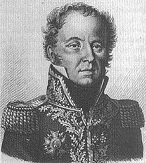
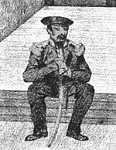












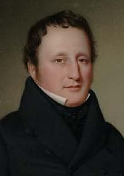

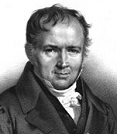



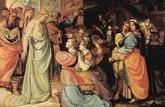
1813 On Jan. 2/3 Aaron Burr's beloved daughter Theodosia Burr Alston (b. 1783) mysteriously dies at sea while en route to meet him in New York City, where he had returned last July from Europe, going by the alias Adolphus Arnot; lured onto the Carolina Banks by pirates and murdered?; found on the Gulf Coast at the mouth of the San Bernard River by a Karankawa Indian chief in a wrecked ship chained naked to a bulkhead, giving him a gold locket before dying? On Jan. 18-23 the British under Col. Henry Patrick Procter (Proctor) (1763-1822) defeat a detachment of Am. troops from Ky. under brig. gen. James Winchester (1752-1826) at the Battle of Frenchtown near Frenchtown (modern-day Monroe), Mich., then renege on a pledge of protection, allowing their Indian contingent to slaughter 68 wounded Am. soldiers at the Battle (Massacre) of Raisin River; Winchester is taken POW and released after 1 year, commanding the district of Mobile, Ala.; the Americans don't drive the British from Mich. until Sept. In Jan. the electoral votes are counted, and Madison defeats George Clinton by 128-89; Madison carries all S and W states except Md. and Del.; Clinton carries all New England and Middle Atlantic states except Penn. and Vermont. On Feb. 19 after a 1.5K-man royalist army under Lt. Col. Francisco Ignacio Elizondo Villarreal (1766-1813) pursues them, the Repub. Army of the North under Samuel Kemper, U.S. Col. Henry A. Perry, and Bernardo Gutierrez de Lara retreat to San Antonio de Bexar, and get ambushed on Mar. 29 while searching for food on Rosillo (Salado) Creek in SE Bexar County, Tex., leading on Mar. 29 to the Battle of Rosillo Creek (Rosalis) 9mi. SE of San Anontio de Bexar near the confluence with Salado Creek, with 100-330 royalist troops vs. six repub. troops KIA, and most of the royalists' arms and ammo captured, causing them to retreat to San Antonio and sign a truce on Apr. 1, after which on Apr. 6 de Lara declares Texas independent from Spain, proclaiming its first constitution, with himself as pres. #1 of the First Repub. of Tex.; on June 20 the 2-hour Battle of Alazan Creek in modern-day Bexar County, Tex. W of San Antonio de Bejar sees the 800-man Repub. army under de Lara and Perry surround the 1K-man army of Col. Ignacio Elizondo at dawn and surprise them during breakfast, wiping them out and inviting Indian allies to scalp them, capturing massive supplies incl. 2K horses and mules, 300 guns and muskets, 5K lbs. of gunpowder, and mucho food; too bad, de Lara is replaced by U.S.-backed Gen. Jose Alvarez de Toledo y Dubois (1779-1858), who leads the men to capture San Antonion on aug. 1, but alienates them with racism, causing them to be defeated on Aug. 18 by Jose Joaquin de Arredondo y Miono (José Joaquín de Arredondo y Mioño) (1776-1837) at the Battle of Medina 20 mi. S of San Antonio, losing 1.3K KIA (vs. only 55 royalists), causing Toledo to flee to La., attempt another invasion in 1814, then flop and reconcile with Spain in 1816, becoming an adviser to Fernandi VII; meanwhile the royalists execute all the captured U.S. citizens, ending hope of U.S. aid. On Feb. 28 the Treaty of Kalisch establishes an alliance between Russia and Prussia, and invites Austria and Britain to join them in liberating Europe from Bad Kid Nappy Lion; big hero Count Yorck von Wartenburg makes a triumphal entry into Berlin on Mar. 17, and the same day the king declares war on Napoleon; Yorck's troops later form the nucleus of the army of East Prussia that is inherited by Hitler. On Mar. 4 U.S. pres. #4 James Madison is inaugurated for a second term in the 7th U.S. Pres. Inauguration; Elbridge Gerry (1744-1814) becomes the 5th U.S. vice-pres. On Mar. 10 the old Teutonic Order (1219) Iron Cross is founded in Breslau, Germany by Prussian king Friedrich Wilhelm III as an award for fighting Napoleon. On Mar. 26 a royalist expedition led by Gen. Parja lands in Chile, and Bernardo O'Higgins (1780-1846) joins with pres.-dictator Jose Miguel Carrera in Conception, and are defeated on Oct. 17 at the Battle of El Roble on the Itala River, with O'Higgins saving the army from a total rout; Carrera is deposed, and O'Higgins becomes new pres. On Mar. 27 the Russians and Prussians occupy Dresden, but Nappy isn't done for yet, and he heads to intercept them (May 2). On Mar. 29 (his 23rd birthday) John Tyler (b. 1790) marries Letitia Christian (1790-1842) (good plantation mgr.); they have 3 sons and 4 daughters. On Apr. 13 the Second Battle of Castalla is a V for an Anglo-Spanish force under Lt. Gen. Sir John Murray over a French force under Marshal Louis Gabriel Suchet. On Apr. 16 the first mass production factory opens in the U.S., producing pistols. On Apr. 27 after Maj. Gen. Henry Dearborn talks U.S. war secy. John Armstrong out of capturing Kingston on the E end of Lake Ontario, he raids York (later Toronto), capital of Upper Canada at the NW end, protected by the U.S. fleet under Capt. Isaac Chauncey (1779-1840), and sacks it, burning a number of public bldgs., then takes Ft. St. George on May 27, all with heavy losses while allowing the British army to escape and almost capture the U.S. base in Sackett's Harbor on the E end of the lake; luckily Dud Dearborn takes ill, and is replaced as CIC of the NE sector of the war by Gen. Morgan Lewis officially on July 6; too bad, he ends up in New York City presiding over the court-martial of Gen. William Hull for losing Detroit, only to prove it was due to his own incompetence, and he is dishonorably discharged from the army on June 15, 1815, losing an appointment as war secy. - are you ready for another Yankee smack or what? In Apr. U.S. maj. gen. (who was court martialed in 1811 and found not guilty, then promoted?) James Wilkinson (1757-1825) seizes Mot Bay in West Florida in Spanish territory, the small garrison giving up without a fight, then occupies Mobile, Ala. On May 2 Napoleon intercepts the Russians and Prussians at the indecisive Battle of Lutzen, then again on May 20-21 at the indecisive Battle of Bautzen, but with heavy casualties, allowing Metternich (who is waiting in the wings) to mediate a peace while completing Austria's armaments; meanwhile the other allies increase their strength more than the French by the time Austria joins the war against them. In May Simon Bolivar begins a campaign against the royalists in Venezuela, taking earthquake-rocked Caracas (his home town) on Aug. 4, gaining the title of El Libertador, taking dictatorial powers, and on Aug. 7 proclaiming the Second Venezuelan Repub. (ends July 16, 1814); Jose Tomas Rodriguez Boves (1782-1814) starts a guerrilla war on behalf of the Spanish crown, in which atrocities get committed by both sides. On June 1 the 38-gun 3-masted U.S. heavy frigate Chesapeake under Capt. James Lawrence (1781-1813) ventures out of blockaded Boston harbor to accept a British challenge, and is defeated and captured by the British frigate HMS Shannon after mortally-wounded Lawrence issues the immortal soundbyte "Don't give up the ship" while being taken below decks. On June 4 after Metternich talks him into it, the Armistice of Plieswitz (Poischwitz) is signed with the Russians and Prussians by Napoleon, effective until June 26. On June 14-15 the First Treaty of Reichenbach (Dzierzoniow) is signed by Britain, Russia, and Prussia, in which Britain agrees to send subsidies to Prussia and Russia, who agree not to make a separate peace with Napoleon - stick with the home team - this is good? On June 21 82K allies under the Arthur Wellesley, 1st marquess of Wellington decisively defeat 60K French troops under Gen. Jourdan at the naval Battle of Vittoria (Vitoria) in Spain, then on July 7-Sept. 8 9,750 British and Portuguese troops under Thomas Graham siege San Sebastian in N Spain, defended by 3,380 troops under French Gen. Louis Emmanuel Rey (1768-1846), sacking and burning the town before invading S France, causing Joseph Bonaparte to return to his estate in France without resigning; meanwhile French marshal Suchet is driven out of Valencia and Barcelona. On June 22 after learning about a planned Am. attack in the Niagara Peninsula, Canadian loyalist Laura Secord (1775-1868) walks 21 mi. out of Am.-occupied territory to warn British forces under Lt. James FitzGibbon, allowing the British and Mohawks to repel them on June 24 at the Battle of Beaver Dams, capturing 500 POWs incl. the cmdr. On June 26 Metternich meets with Napoleon in Dresden and pulls off a Machiavellian coup when he swindles the "small" man Napoleon, who used to own him but is now caught in a jam, into extending the armistice until Aug. 10 (10 weeks total), while he baits him with favorable terms which he knows he will refuse, and in case he accepts, he knows he can maneuver him into breaching the terms; meanwhile he has the draft of the Second Treaty of Reichenbach (Dzierzoniow) between Austria, Russia, and Prussia in his pocket, which is signed on June 27, with Austria promising to field 50K men if Napoleon rejects their ultimatum, and also not to make a separate peace with the bum, creating the Sixth Coalition against Napoleon; during the power play interview Nappy drops his hat, and Metternich refuses to stoop to pick it up?; after it's over, and Nappy rejects the offer, Bettermach has signal beacons lit telling the Austrian army in Silesia that war is on; German historian Barthold Georg Niebuhr leaves the U. of Berlin to join the German Landwehr after being denied admission into the regular army, going on to edit the patriot journal Prussian Correspondent, becoming ambassador to Rome in 1816, resigning in 1823 and spending the rest of his life in Bonn writing history. On July 5-Aug. 11 the Congress of Prague is a dud when Napoleon declines all terms offered, causing Austria to declare war on France in alliance with Russia, Britain, Prussia, Spain, and Sweden (in return for recognizing their annexation of Norway); the allies adopt a policy of avoiding battles in which Napoleon is personally present; meanwhile Nappy frantically strengthens his army and braces for the counterattack. On July 9 Zig Ziglar, er, Napoleon writes to his gen. Count Yves Lemarois: "You write, 'it is impossible': that is not French." On Aug. 11 Henry James Pye (b. 1744) dies, and Robert Southey (1774-1843) becomes poet laureate of England after Sir Walter Scott declines the position and Southey goes from liberal Republican to staunch Conservative. On Aug. 23 after Napoleon sends a French army under Gens. Nicolas Charles Oudinot and Jean Louis Ebenezer Reynier (1771-1814) to capture Berlin, and they get bogged down in the swamps S of the city, they are defeated by a Prussian-Swedish army under Crown Prince Charles John (former marshal of France Jean Baptiste Bernadotte) (future king Charles XIV of Sweden-Norway in 1818) at the Battle of Grossbeeren. On Aug. 26 the French under Gen. MacDonald are defeated by the Prussians under CIC of the Prussian-Russian Silesian army Gebhard Leberecht von Blucher (Blücher) (1742-1819) at the Battle of Wahlstatt (Ger. "battlefield") (Katzbach) (Kaczawa) (Legnickie Pole) on the Katzbach River in Lower Silesia (SW Poland), for which Blucher is made field marshal, followed next year by prince of Wahlstatt. On Aug. 26-27 Napoleon shows that he's still the man as he defeats the allies under marshal Karl Philipp, prince of Schwarzenberg at the Battle of Dresden (Nappy's last V on German soil), beginning the the German Campaign of 1813 (Ger. "Befreiungskriege" = Wars of Liberation) to liberate the German states from French control (ends 1814). On Aug. 29-30 the retreating (from Dresden) French under top drawer Gen. Dominique Joseph Rene Vandamme (1770-1830) are defeated at the Battle of Kulm (Chulmec) in N Bohemia, and Vandamme is captured; after being accused of looting by Tsar Alexander I, he utters the soundbyte "At least I have never been accused of killing my father". On Aug. 30 after being put up to it by the British, the Creeks attack Ft. Mims in Ala. and massacre the 265 defenders. On Sept. 4 Andrew Jackson gets into a near-fatal duel with the Benton brothers. On Sept. 6 the French under Marshal Michel Ney are defeated by the Prussians and Russians under Gen. Friedrich von Bulow and Crown Prince Charles John at the Battle of Dennewitz. On Sept. 9 the Treaty of Teplitz pledges unity among Russia, Prussia, and Austria, plus (in secret) the restoration of Prussia and Austria to their 1805 boundaries. On Sept. 10 after blockading the 6-ship British fleet at the W end of Lake Erie with his 9-ship fleet incl. two 20-gun ships and six small 1-2-gun schooners, the U.S. under Commodore Oliver Hazard Perry (1785-1819) wins the naval Battle of Lake Erie (Put-in-Bay) after his flagship USS Lawrence is destroyed and he rows 1/2 mi. through heavy gunfire to transfer command to the USS Niagara while carrying Capt. James Lawrence's battle flag "Don't Give Up the Ship", then uttering the soundbyte: "We have met the enemy and they are ours: two ships, two brigs, one schooner, and one sloop"; the V undermines the British position at Detroit, protecting the Ohio Valley while opening Canada to possible invasion, forcing the Brits to hastily retreat into Canada and the U.S. to reoccupy it; Tecumseh and 600 Shawnees are among the British forces pursued by 3K U.S. troops for several days. On Oct. 5 after they stop retreating and make a stand, the Brits under inept inexperienced "by the book" Irish-born Maj. Gen. Henry Patrick Procter (Proctor) (1763-1822) get their clocks cleaned in the Battle of the Thames River (Moraviantown) near Moraviantown on the Thames River in Kent County near Chatham, Ont. by the U.S. Army of the Northwest under Gen. William Henry Harrison (1773-1841); Tecumseh falls in the battle, and dies in Ontario on Oct. 13 after leaving the Zero Year Presidential Curse on U.S. presidents; Tecumseh's confederacy is smashed, ending their alliance with the British, who vacate the NW; Proctor is court-martialed, reprimanded, and suspended; future (1837) vice-pres. Col. Richard M. Johnson allegedly is the lucky plucker who killed Tecumseh, and he goes on to becomes a U.S. Sen. from Ky. from 1819-29, and a U.S. Rep. until 1837. On Oct. 7 the Serbian Uprising of 1804 is brutally crushed by the Ottomans. On Oct. 12 the Paraguayan nat. council names Catholic priest-trained Dr. Jose Gaspar Rodriguez de Francia (José Gaspar Rodríguez de Francia) (1766-1840) as the first-ever consul of Paraguay, with absolute power for three years (until Feb. 12, 1814); guess what he does?; you guessed it, he seizes power permanently on June 12, 1814 (untl Sept. 20, 1840); On Oct. 16-19 after the allies combine forces, the climactic 3-day Battle of the Nations (Leipzig) in Leipzig becomes the biggest of the Napoleonic Wars (100K KIA), and the greatest battle until WWI; the Saxon troops of Gen. Jean Louis Reynier switch sides, causing him to get trapped and taken POW, and the French get their butts kicked and retreat across the Rhine with Gen. Blucher leading the Prussians after them, liberating Germany from French rule; the Prussians expel the French from Arnhem. On Oct. 24 the Treaty of Gulstan between Russia and Persia ends the First Russo-Persian War (begun 1804), giving Azerbaijan, Daghestan, and E Georgia to Russia, beginning the Great Game (Tournament of Shadows) between the Russian and British Empires for supremacy in C Asia (ends 1907); the name Great Game is coined by British Indian intel officer Arthur Conolly (1807-42). On Oct. 26 after U.S. gens. James Wilkinson and Wade Hampton lead a 2-pronged attack toward Montreal on Lake Champlain, they are turned back at the Battle of Chateauguay River, followed on Nov. 11 by the Battle of Crysler's Farm (near Montreal), causing them to abandon their Saint Lawrence Campaign, becoming "the Battle that Saved Canada" - is that like when Ford saved Chrysler? On Oct. 29 Battle of the Thames veteran brig gen. Lewis Cass (1782-1866) is appointed gov. of Mich. Territory by Pres. James Madison (until 1831). In Oct. after his voice breaks, 16-y.-o. Franz Schubert (1797-1828) leaves the Stadtkonvikt music school in Vienna (entered in Oct. 1808). On Nov. 10 after 80K British, Portuguese, and Spanish troops (incl. 20K green Spanish troops) under Arthur Wellesley and Sir John Hamilton chase 60K French troops under Marshal Nicolas Jean de Dieu-Soult from San Sebastian, the Battle of Nivelle on the Nivelle River in France is a V for the Allies under Arthur Wellesley and Sir John Hamilton over the French under Gen. Nicolas Jean de Dieu-Soult, with 2,2450 British vs. 4,351 French casualties. In Nov. the British propose peace negotiations to the Yankee Doodle Americans. In Nov. the remaining members of the Confederation of the Rhine join the allies against Napoleon, and on Nov. 9 the allies offer him a peace, which is declined, causing them on Dec. 1 to adopt a resolution to prosecute the war vigorously and invade France - nothing is the same without you bro'? On Nov. 15 the Dutch rise against the French and expel French officials, permitting Prince William Frederick of Orange to return. On Dec. 5 (a.m.) the Battle of Araure in Venezuela sees 3.5K-5K Spanish royalists under Gen. Domingo de Monteverde defeated by 3K patriotic forces of Simon Bolivar, who gives a speech with the soundbyte: "Your valor has earned yesterday a name for your corps, and through the midst of the fighting, when I saw you succeed, I named you the Victorious Battalion of Araure. You removed the enemy's flags in the moment of your victory. You have earned the famous, invincible call of Numantia." On Dec. 8 Ludwig van Beethoven's Seventh (7th) Symphony in A major, Op. 92 (written in the Bohemian spa town of Teplice and dedicated to Count Moritz von Fries) debuts in Vienna, confirming his status as the world's greatest composer - and Germans as the new master race compared to yesterday's news the French? On Dec. 11 former king (1808) Ferdinand VII (1784-1833) is restored to the throne of Spain (until Sept. 29, 1833), and proves to be a reactionary absolutist, backed by the Persians (conservative deputies), soon double-crossing the liberals and abolishing the liberal constitution on May 4, then arresting the liberal leaders on May 10, all of which increases underground radicalism, incl. Masons; Joseph Bonaparte refuses to abdicate even after his little brother Napoleon I recognizes Ferdinand VII, but finally gives up; Ferdinand VII proves "in many ways the basest king in Spanish history" (Stanley Payne). In Dec. the British cross the Niagara River, burn Newark (Niagara-on-the-Lake), and seize Ft. Niagara, then burn Buffalo, allowing their Indian allies to whoop it up and ravage the countryside. British ships ("freedom's swift-winged angels" arrive at Chesapeake Bay, causing hundreds of happy Am. slaves ("an internal enemy") to paddle out and seek protection, going on to become guides, pilots, sailors, and marines, using their knowledge of the countryside to transform the war, helping the British stage onshore attacks, capture Washington, D.C., etc. Blaxland, Wentworth, and Lawson open up the interior of New South Wales in Australia. Its 20-year charter up once again for renewal by Parliament, the East India Co. loses its monopoly of trade with the exception of China. Ang Chan becomes king of Cambodia for the 2nd time (until 1834). Nebraska (Neb.) is settled by fur trader Manuel Lisa. Philly-born Jew Mordecai Manuel Noah (1785-1851) is appointed by Pres. James Madison as U.S. consul to Tunis, rescuing U.S. citizens from Muslim slavery, only to be removed in 1815 by U.S. secy. of state James Monroe for his Jewish religion, pissing him off and causing him to raise a stink about church-state separation, receiving support from Madison, John Adams, and Thomas Jefferson. U.S. Navy capt. David Porter (1780-1843) builds a fort on Nuka Hiva in the Marquesa Islands to protect three captured British ships, pissing-off the natives, who kill four soldiers over the next year, resulting in enslavement to exploit them economically; too bad, after the Americans stink themselves up, the native pop. shrinks from 100K this year to 4,865 in 1882. The waltz becomes the rage in European ballrooms. James McHenry of Baltimore, Md. circulates a letter to solicit funds for a Bible society in Baltimore, writing "Bibles are strong entrenchments. Where they abound, men cannot pursue wicked courses and at the same time enjoy quiet conscience." William Wordsworth obtains a sinecure as distributor of stamps for Cumberland and Westmorland, and moves with his family and sister to Rydal Mount near Dove Cottage, where he remains for life. The last gold guinea (21 shilling) coins are minted in England. Prince Edward Island mints an ill-fated Holey Dollar. The Demologos, the first steam-powered warship is launched in New York City. The capital of Indiana Territory is moves from Vincennes to Corydon, Ind.; in 1825 it is moved to Indianapolis. Spanish jack-of-all-trades Don Francisco de Paula Marin (Marín) Grassi (1774-1837) (aide to King Kamehameha I, who helped him get Euro military weapons for his V in 1795, and was rewarded with land near modern-day Pearl Harbor, and later acts as the king's royal physician on his deathbed) cultivates Hawaii's first pineapple crop and imports arabica coffee trees to the Hawaiian island of Oahu, planting Hawaii's first grapeyard in 1815 and producing its first wine and brandy, going on to plant the first cotton, mangoes, and oranges, distill sugar cane into rum, and brew beer, also raising some of Hawaii's first horses and cattle; in 1828 coffee plants are transplanted to the 60-mi. Kona District of W Hawaii along Mauna Loa and Hualalai volcanoes. Thomas Lord of Yorkshire moves the White Conduit Club to St. John's Wood in London. The Methodist Missionary Society is founded. The London Philharmonic Society is founded, becoming the first use of the word "philharmonic". Colby College is founded on Mayflower Hill in Waterville, Maine. Montreal, Canada fur trader James McGill (b. 1744) dies, leaving a bequest which results in McGill U. in 1821. Scottish-born brothers David Bruce (1770-1857) and George Bruce (1781-1866) found the Bruce Type Foundry in New York City, going on to become the first to standardize type sizes in the U.S. Seth Thomas (1785-1859) founds the Seth Thomas Co. to mass-produce affordable clocks. J.A. Ingres (b. 1780) meets his first wife, milliner Madeline Chapelle (1782-1849) in Rome and marries her after 3 mo. Sports: The 13,661 ft. (4,164m) Breithorn ("broad horn") in the Pennine Alps on the Swiss-Italian border is first climbed by a party led by Henry Maynard. Inventions: Irish physician W. Reid Clanny (1776-1850) invents the Clanny Coal Miner's Safety Lamp in Sunderland, England, consisting of a candle in a closed metal case fed air via a bellows through water. English chemist Edward Charles Howard (1774-1816) invents a closed kettle method of refining sugar. Swiss inventor Jean-Samuel Pauly invents the gun cartridge - mass extermination on the battlefield can't be far away? British engineer Samuel Clegg (1781-1861) invents a gas meter. Science: Iodine is discovered in seaweed, causing Swiss physician ? Coindet to connect this with the folk treatment of goiter with seaweed and begin giving his goiter patients iodide spirits, noting many succcessful cures by 1821; it takes until 1917-1921 for a large-scale scientific experiment to cause the theory to be accepted. French mathematician Simeon (Siméon) Denis Poisson (1781-1840) pub. Poisson's Equation, a generalization of Laplace's equation. Nonfiction: William Barton, Memoirs of the Life of David Rittenhouse; by his nephew; Pres. Jefferson orders six copies. David Cox, Treatise on Landscape Painting and Effect in Water Colours. Georges Cuvier (1769-1832), Essay on the Theory of the Earth; 2nd ed. pub. 1815; 3rd ed. pub. 1817; 4th ed. pub. 1822; 5th ed. pub. 1827; advances the theory of catastrophism in geology, claiming that new species were created after periodic catastrophic floods after establishing the fact of past extinction; names the Pterodactyl and descries the aquatic Mosasauros, becoming one of the first to suggest that the Earth was once dominated by reptiles. Johann Friedrich Herbart, Introduction to Philosophy. Sir John Cam Hobhouse (1786-1869), A Journey through Albania. Thomas Hodgskin (1787-1869), An Essay on Naval Discipline Shewing Part of Its Evil Effects on the Minds of Its Officers, on the Minds of the Men, and on the Community, with an Amended System by Which Pressing May Be Immediately Abolished; blows the whistle after his 1812 court martial. Thomas Jefferson (1743-1826), The Jefferson Bible; takes scissors to the Gospels and edits them down to a "wee little book" of 46 pages after eliminating miracles and perceived inconsistencies, resulting in "the most sublime and benevolent code of morals which has ever been offered to man"; "To the corruption of Christanity I am indeed opposed, but not to the genuine precepts of Jesus himself" (letter to Benjamin Rush). Christoph Meiners (1747-1810), Researches on the Variations in Human Nature (Untersuchungen über die Verschiedenheiten der Menschennaturen ) (4 vols.) (posth.); claims that blacks are oversexed and unable to control their sex drives, while white Euros have complete control. Hannah More (1745-1833), Christian Morals. Robert Owen (1771-1858), A New View of Society; Or, Essays on the Principle of the Formation of the Human Character, and the Application of the Principle to Practice; new social units where people cooperate in production are needed? Arthur Schopenhauer (1788-1860), Uber die Vierfache Wurzel des Satzes vom Zureichenden Grunde (thesis). Robert Southey (1774-1843), The Life of Horatio, Lord Viscount Nelson; a big hit. Music: Sir Henry Rowley Bishop (1786-1855), The Miller and His Men (opera). Luigi Cherubini (1760-1842), Les Abencerages (Abencérages) (opera); the last days of the Moorish kingdom of Granada (1491); a flop, causing him to switch to church music; incl. Suspendez a Ces Murs. Gioacchino Rossini (1792-1868), L'Italiana in Algeri (opera) (Venice). Franz Schubert (1797-1828), Trio for His Father's Nameday, D80; First Symphony in D, D82. Art: Peter von Cornelius (1784-1867), The Wise and Foolish Virgins. J.M.W. Turner (1775-1851), Frosty Morning. Plays: Samuel Taylor Coleridge (1772-1834), Remorse (Osorio). Heinrich von Kleist, Der Zerbrochene Krug (comedy). Poetry: Lord Byron (1788-1824), The Bride of Abydos; The Giaour: A Fragment of a Turkish Tale; the Turkish word for kafir (infidel); Leila, a member of Hassan't harem commits adultery with a you know what and is thrown into the sea wrapped in a sack, causing the giaour to kill him and enter a monastery in penance; big hit, cementing his rep., causing Byron to crank out "The Corsair" (1814), and "Lara" (1814). George Crabbe (1754-1832), Tales in Verse. James Hogg (1770-1835), The Queen's Wake. Alessandro Manzoni (1785-1873), Inni Sacri. Thomas Moore (1779-1852), Intercepted Letters: The Twopenny Post Bag. Percy Bysshe Shelley (1792-1822), Queen Mab: A Philosophical Poem; revolutionary poem attacking political tyranny and Christianity. Novels: Jane Austen (1775-1817), Pride and Prejudice (original title "First Impressions"); the Bennet sisters Jane, Elizabeth (pride), Mary, Lydia, and Kitty in Meryton (near London), Hertfordshire; status-conscious Mr. Darcy (pride) and his friend Mr. Bingley; Lady Catherine De Bourgh; "It is a truth universally acknowledged, that a single man in possession of a good fortune, must be in want of a wife" (opening line). Willem Bilderdijk (1756-1831), A Short Account of a Remarkable Aerial Voyage and Discovery of a New Planet; pioneering burning-at-the-stake-free science fiction (sci-fi). Friedrich de la Motte Fouque (1777-1834), Der Zuberring. Jacob Grimm (1785-1863) and Wilhelm Grimm (1786-1859), Grimm's Fairy Tales (Children's and Household Tales) (2 vols.) (1812, 1815) (86 stories, 70 stories); 2nd. ed in 1819 and 1822 (170 stories); 7th ed. in 1857 (211 stories); originally for adults, they are watered-down for children in an 1825 "small edition" of 50 stories, which goes through 10 eds. by 1858. Ivan Krylov (1769-1844), Crow and Fowl and Other Fables; pumps it up to 197 fables by Dec. 1843. Charles Robert Maturin (1782-1824), The Milesian Chief; Gothic romance pub. under alias Dennis Jasper Murphy. Jean Paul (1763-1825), Life of Fibel. James Kirke Paulding (1778-1860), The Diverting History of John Bull and Brother Jonathan. Johann David Wyss (1743-1818), The Swiss Family Robinson; internat. bestseller inspired by Daniel Defoe's "Robinson Crusoe" (1719), about a Swiss family who get shipwrecked in the East Indies en route to Port Jackson, Australia; written as an educational book for children about family values, Christians morals, nature, and husbandry; makes a fan of Jules Verne, even though the flora and fauna on the small island are geographically impossible?; ed. by Johann Rudolf Wyss, author of the Swiss nat. anthem; illustrations by Johann Emmanuel Wyss; English trans. pub. in 1814. Births: English phoneticist (vegetarian) (inventor of Pitman Shorthand and postage stamps) Sir Isaac Pitman (d. 1897) on Jan. 4 in Trowbridge, Wiltshire; brother of Benn Pitman (1822-1910); grandfather of Sir James Pitman (1901-85); knighted in 1894. Am. Abraham Lincoln's fiancee Ann Rutledge (d. 1835) on Jan. 7 near Henderson, Ky. French Roman Catholic archbishop of Paris Georges Darboy (d. 1871) on Jan. 16 in Fayl-Billot, Haute-Marne. English inventor Sir Henry Bessemer (d. 1898) on Jan. 19 in Charlton, Hertfordshire; self-educated; his 1873 meeting with Andrew Carnegie launches the latter's rise to wealth. Am. Repub. politician-explorer-gen. ("The [Great] Pathfinder") John Charles Fremont (OG "protector of freedom") (d. 1890) on Jan. 21 in Savannah, Ga.; illegitimate son of Charles and Anne Fremont; husband (1841-) of Jessie Benton Fremont (1824-1902); first Repub. pres. candidate (1856). Australian poet Charles Harpur (d. 1868) on Jan. 23 in Windsor, N.S.W.; first Australian-born poet of consequence? Am. physician-surgeon (co-founder of gynecology) James Marion Sims (d. 1883) on Jan. 25 in Lancasterville, S.C.; educated at Jefferson Medical College. German Bavarian Neuschwanstein Castle architect Eduard Riedel (d. 1885) on Feb. 1 in Bayreuth. Am. "Incidents in the Life of a Slave Girl" writer (black) Harriet Ann Jacobs (d. 1897) on Feb. 11 in Edonton, N.C.; born a slave, her white master sexually abuses her, causing her to hide for seven years in her grandmother's house before escaping with her chillun to the North in 1842 - don't be alarmed, when I get nervous I swell up like this? Am. "Manual of Mineralogy" geologist-mineralogist James Dwight Dana (d. 1895) on Feb. 12 in Utica, N.Y.; educated at Yale U. Tahitian queen (1827-77) Pomare IV Aimata ("eye-eater") (d. 1877) on Feb. 13. German "Between Sky and Earth" realist dramatist-novelist-critic Otto Ludwig (d. 1865) on Feb. 11 in Eisfeld, Thuringia. Russian "Russalka", "Baba Yaga", "The Stone Guest", "Dance of the Mummers" realist composer Alexander Sergeevich Dargomyzhski (Dargomijski) (d. 1869) on Feb. 14 in Tula; educated in St. Petersburg; pioneers realism and nationalism in Russian music. English "Enosis" Transcendentalist poet-artist Christopher Pearse Cranch (d. 1892) on Mar. 8 in Washington, D.C.; educated at Harvard U. U.S. Supreme Court justice #41 (1870-92) Joseph Philo Bradley (d. 1892) on Mar. 14 in Berne, N.Y.; educated at Rutgers U. English #1 physician John Snow (d. 1858) on Mar. 16 in York. German "Maria Magdalene" poet-dramatist Christian Friedrich Hebbel (d. 1863) on Mar. 18 in Wesselburen, Ditmarschen, Holstein. Scottish "Stanley, I presume" missionary explorer Dr. David Livingstone (d. 1873) on Mar. 19 in Blantyre Works, Lanarkshire; first Euro to explore the African interior - and not be eaten long enough to tell about it? Am. Mormon leader James Jesse Strang (d. 1856) on Mar. 21 in Scipio, N.Y. Am. Dem. politician-orator ("the Little Giant") Stephen Arnold Douglas (d. 1861) on Apr. 23 in Brandon, Vt.; debates with Lincoln in the 1858 Ill. senatorial campaign. Danish "Fear and Trembling" philosopher-theologian (hunchback) ("Father of Existentialism") Soren (Sören) Aabye Kierkegaard (d. 1855) on May 5 in Copenhagen - sore neck about the churchyard? U.S. Repub. postmaster-gen. #20 (1861-4) Montgomery Blair (d. 1883) on May 10 in Franklin County, Ky.; son of Francis Preston Blair (1791-1876). English "Smith's Bible Dictionary" lexicographer Sir William Smith (d. 1893) on May 20 in Enfield; Nonconformist parents; educated at Univ. College London; knighted in 1892. German "Ring of the Nibelungs" composer Wilhelm Richard Wagner (d. 1883) on May 22 in Leipzig; developer of the leitmotif (leitmotiv) (guiding theme); introducer of the tuba into the orchestra. U.S. navy adm. David Dixon Porter (d. 1891) on June 8 in Chester, Penn.; son of David Porter (1780-1843). Am. liberal Congregationalist clergyman-lecturer Henry Ward Beecher (d. 1887) on June 24 in Litchfield, Conn.; son of Rev. Lyman Beecher (1775-1863); brother of Catharine Esther Beecher (1800-78), Edward Beecher (1803-95), Harriet Beecher Stowe (1811-96), and Charles Beecher (1815-1900); educated at Amherst College. Am. Mormon hitman (bodyguard of Joseph Smith Jr. and Brigham Young) ("the Destroying Angel of Mormonism") Orrin Porter "Old Port" Rockwell (d. 1878) on June 28 (June 15, 1815?) in Belchertown, Mass. Egyptian ruler (1848-9) Abbas I Said (d. 1854) on July 1 in Jeddah, Arabia; son of Tusun Pasha (1794-1816); grandson of Muhammad Ali (1769-1849). Am. celeb Emily Sarah Tennyson (nee Sellwood) (d. 1896) on July 9 in Horncastle, Lincolnshire; sister of Sir John Franklin (1786-1847) and Sir Willingham Franklin; wife (1850-) of Alfred, Lord Tennyson; mother of Hallam Tennyson (1852-1928). French physiologist (coiner of the term milieu interieur or homeostasis) Claude Bernard (d. 1878) on July 13 in Saint-Julien (near Villefranche-sur-Saone). Am. sanitation engineer Ellis Sylvester Chesbrough (d. 1886) on July 16 in Baltimore, Md. Am. women's abolitionist-suffragist activist Paulina Kellogg Wright Davis (d. 1876) on Aug. 7 in Bloomfield, N.Y. Hawaiian king #3 (1825-54) Kamehameha III (Kauikeaouli) ("placed in the dark clouds") (d. 1854) on Aug. 11 in Keauhou Bay, Hawaii Island; 2nd son of Kamehameha II and Keopuolani. Am. Mormon bandleader William Hill Pitt (d. 1873) on Aug. 16 in Dymock, England; emigrates to the U.S. in 1842. Bavarian brewer (inventer of Pilsner beer) Josef Groll (d. 1887) on Aug. 21 in Vilshofen an der Donau. Belgian scientist Jean Servais Stas (d. 1891) on Aug. 21 in Leuven; educated at the Ecole Polytechnique. French journalist-banker (Jewish) Moise (Moses) Polydore Millaud (d. 1871) on Aug. 27 in Bordeaux. English "will-less existence" Transcendentalist essayist-poet Jones Very (d. 1880) on Aug. 28 in Salem, Mass.; educated at Harvard U.; friend of Nathaniel Hawthorne and Ralph Waldo Emerson. French "The Three Musketeers", "The Count of Monte Cristo" novelist Auguste Maquet (d. 1888) on Sept. 13 in Paris; collaborator of Alexandre Dumas pere. English photographer John Jabez Edwin Mayall (Meal) (d. 1901) on Sept. 17 near Oldham, Lancashire; lives in Philadelphia, Penn. (1842-6). Am. steam shovel inventor William Smith Otis (d. 1839) on Sept. 20 in Pelham, Mass.; cousin of Elisa Otis. Am. Colo. gov. #1 (1861-2) (Quaker) William Gilpin (d. 1894) on Oct. 4 near Wilmington, Del.; educated at the U. of Penn., and West Point. Italian "Aida", "Rigoletto" #1 opera composer Giuseppe Fortunino Francesco Verdi (d. 1901) on Oct. 9 in Le Roncole (near Busseto), Parma. U.S. Sen. (R-Ill.) (1855-73) (co-author of the 13th Amendment) Lyman Trumbull (d. 1896) on Oct. 12 in Colchester, Conn. Spanish rum magnate Don Facundo Bacardi (Facundo Bacardí Masó) (d. 1886) on Oct. 13 in Sitges (near Barcelona), Spain; emigrates to Cuba in 1828. German "Wozzek" Young Germany dramatist Karl Georg Buchner (Büchner) (d. 1837) on Oct. 17 in Goddelau (near Darmstadt), Hesse-Darmstadt; brother of Ludwig Buchner (1824-99). Am. Pres. Fillmore's 2nd wife (1858-) Caroline Carmichael McIntosh Fillmore (d. 1881) on Oct. 21 in Morristown, N.J. Montenegran (Orthodox Serbian) prince-bishop (1830-51) and poet Peter II Petrovic-Njegos (d. 1851) on Nov. 13 (Nov. 1 Old Style) in Njegusi; nephew of Peter I; first notable writer from Montenegro. Am. "The World's Sixteen Crucified Saviors" atheist-freethinker writer-lecturer (abolitionist) Kersey Graves (d. 1883) on Nov. 21 in Brownsville, Penn.; Quaker parents. French poet Louise-Victorine Ackermann (nee Choquet) (d. 1890) on Nov. 30 in Paris. Finnish philologist Matthias Alexander Castren (Castrén) (d. 1852) on Dec. 2 in Tervola. Austrian architect August Sicard von Sicardsburg (d. 1868) on Dec. 6 in Buda; educated at the Vienna U. of Tech.; student of Peter von Nobile; teacher of Karl Freiherr von Hasenauer. Am. banking tycoon (Jewish) ("King of Fifth Avenue") August Belmont (Fr. "beautiful mountain") (Schoenberg) Sr. (d. 1890) (b. 1826?) on Dec. 8 in Alzey, Hesse, Germany; emigrates to the U.S. in 1837, and becomes rep. of the Rothschild banking house in Frankfurt; father of August Belmont Jr. (1851-1924). Am. Dem. gov. of Wisc. #1 (1848-52) Nelson Dewey (d. 1889) on Dec. 19 in Lebanon, Conn. Italian Purist painter Luigi Mussini (d. 1888) on Dec. 19 in Berlin, Germany. Czech journalist Karel Sabina (d. 1877) (AKA Arian Zelinsky, Leo Blass) on Dec. 29. English metallurgist (celluloid inventor) Alexander Parkes (d. 1890) on Dec. 29. Am. blackface performer William M. "Billy" Whitlock (d. 1878) (Virginia Minstrels) in New York City. Norwegian Romantic poet-folklorist-theologian Jorgen Ingebretson Moe (d. 1882). Hungarian composer Stephen Heller (d. 1888). German zoologist Peter Friedrich Ludwig Tischbein (d. 1883). Deaths: Italian engraver Francesco Bartolozzi (b. 1725) in Lisbon. German-born Am. clergyman Philip William Otterbein (b. 1726) on Nov. 7. Am. Rev. War loyalist printer Samuel Loudon (b. 1727). English physician Charles White (b. 1728) on Feb. 20 in Sale. Am. royal N.J. gov. (Ben Franklin's son) William Franklin (b. 1731). German author Christoph Martin Wieland (b. 1733) on Jan. 20. French essayist Jean de Crevecoeur (b. 1735). English abolitionist Granville Sharp (b. 1735) on July 6 in Fulham; memorial erected in Westminster Abbey. Swiss portraitist Anton Graff (b. 1736) on June 22 in Dresden; leaves 2K+ works, incl. portraits of Friedrich Schiller, Christoph Willibald Gluch, Frederick II the Great, and Heinrich von Kleist. Italian-French mathematician Joseph-Louis Lagrange (b. 1736) on Apr. 10 in Paris. French potato pusher Antoine-Augustin Parmentier (b. 1737) on Dec. 13. Italian printer Giambattista Bodoni (b. 1740); leaves The Lord's Prayer in 155 Languages. Belgian-born French composer Andre Gretry (b. 1741) on Sept. 24 in Montmorency; dies in the Hermitage, former residence of Jean Jacques Rousseau; it takes 15 years to get his heart transferred to his birthplace of Liege, after which a bronze statue is erected in 1842. Japanese Yamato emperor #117 (1762-71) Go-Sakuramachi (b. 1740) on Dec. 24. Scottish-born Canadian businessman James McGill (b. 1744) on Dec. 19 in Montreal, Quebec. English poet laureate (1790-1813) Henry James Pye (b. 1744) on Aug. 11 in Pinner, Middlesex. Russian field marshal Mikhail Ilarionovich Kutuzov (b. 1745). Am. Rev. leader (DOI signer) Dr. Benjamin Rush (b. 1745) on Apr. 19. Am. statesman (DOI signer) Robert R. Livingston (b. 1746) on Feb. 26 in Clermont, N.Y. Dutch-born Am. composer Johann Friedrich Peter (b. 1746) on July 13 in Bethlehem, Penn. English architect James Wyatt (b. 1746) on Sept. 4 in Marlborough Downs (carriage accident); buried in Westmnster Abbey. Am. Rev. leader and statesman (first U.S. atty. gen.) Edmund Jennings Randolph (b. 1753) on Sept. 12 in Millwood, Va. Prussian gen. Gerhard von Scharnhorst (b. 1755) on June 28 in Prague. German physician Johann Christian Reil (b. 1759) on Nov. 22; dies of typhus contracted while treating wounded in the Battle of Leipzig. English composer-pianist Maria Hester Park (b. 1760) on June 7 in Hampstead. French gen. Jean Victor Moreau (b. 1763) on Sept. 2 in Dresden, Germany (KIA); buried in St. Petersburg, Russia. French gen. Louis Baraguey d'Hilliers (b. 1764) on Jan. 6 in Berlin. Spanish royalist officer Ignacio Elizondo (b. 1766) on Sept 2 in San Marcos, Tex. Scottish-born Am. ornithologist Alexander Wilson (b. 1766). Dutch poet Jan Frederik Helmers (b. 1767) on Feb. 26. Shawnee chief Tecumseh (b. 1768) on Oct. 5 near Chatham-Kent, Ont. (KIA in the Battle of Thames); Richard Mentor Johnson claims credit, helping him get elected as U.S. vice-pres. in 1836. French gen. Nicolas Francois Conroux, baron de Pepinville (b. 1770) on Nov. 11 in Bayonne (KIA in the Battle of Nivelle). French gen. Jean-Andoche Junot (b. 1771) on July 29 in Montbard (suicide) (really flees to New Orleans?). Am. soldier-explorer Gen. Zebulon Montgomery Pike (b. 1779) on Apr. 27 in York (Toronto), Canada; KIA by a magazine explosion. Am. naval capt. James Scott Lawrence (b. 1781) (KIA while not giving up the ship). Am. Aaron Burr's daughter Theodosia Burr Alston (b. 1783) on Jan. 2/3; dies at sea (off Cape Hatteras?) on privateer Patriot en route to New York City; rumors claim that she was captured by pirates; in 1869 her portrait is discovered in Nag's Head, N.C.; a legend that she roams the beaches of Bald Head Island, N.C. arises; subject of Robert Frost's 1953 poem "Kitty Hawk", and the song Dear Theodosia in the 2015 Lin-Manuel Miranda musical Hamilton; namesake of the cryostat in the Cosmic Microwave Background (CMB) experiment. German poet-soldier Theodor Korner (b. 1791) on Aug. 26 in Rosenberg (KIA).
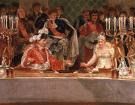


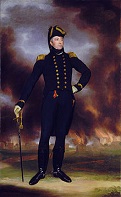
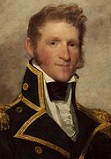
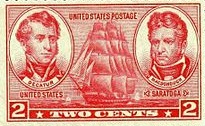

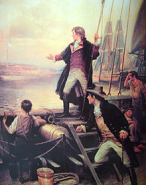

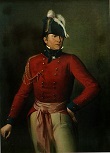
















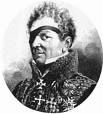

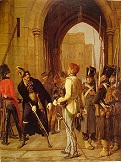








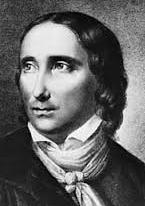
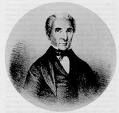











1814 On Jan. 6 after a short winter campaign by the allies Denmark, bankrupted by the Napoleonic wars breaks with Napoleon and offers Norway to Sweden in exchange for Western Pomerania and Rugen (Rügen); on Jan. 14 the Treaty of Kiel makes Norway an independent kingdom in union with Sweden; Denmark makes peace with Britain; Christian Frederick of Denmark is elected king of Norway; meanwhile optimistic Napoleon (who lost 500K irreplaceable troops last year and can scrounge up only 120K total now) plans the defense of bankrupt France in St. Cloud, facing the 110K-man Silesian army under Blucher coming in from the N and the 210K-man Bohemian army under Karl Philipp, prince of Schwarzenberg coming in from the S, with another 100K-man army under Prince Bernadotte staying in the Netherlands. On Jan. 22 the first Knights Templar Grand Encampment is held in New York City. On Jan. 26 sawed-off Edmund Kean (1787-1833) debuts as Shylock at Drury Lane Theatre in London, becoming an instant hit. On Jan. 29 Napoleon surprises the Russian-Prussian army under Gen. Blucher at the Battle of Brienne, but the allies regroup and defeat him on Feb. 1 at the Battle of La Rothiere; too bad, the allies then split up their combined army into two columns because of supply problems, giving Nappy the chance to divide and conquer them as they head for Paris using his 70K-man army and his chess-playing skills, heading first for the Chateau de Vincennes, an arsenal containing 52K rifles, 100+ field guns plus gunpowder, cannonballs and bullets, deefnded by French Gen. Pierre Yrieix Daumesnil (1776-1832), who since 1809 has been known as "jambe de bois" for his wooden leg, who tells them "I shall surrender Vincennes when I get my leg back" (Je rendrai Vincennes quand on me rendra ma jambe), holding off the Coalition troops with 300 men until Louis XVIII orders them to retreat. On Feb. 1 the Mayon Volcano in Luzon Island, Philippines erupts, killing 1.2K. On Feb. 8 the 2nd Battle of the Mincio River (first in 1800) in Italy 8 mi. S of Peschierra sees 34K French-Italian troops led by Eugene Rose de Beauharnais (1781-1824) (son of Nappy's wife Josephine by her hubby Vicomte de Beauharnais) fight 32K Austrians under field marshal Count Heinrich Joseph Johannes von Bellegarde, Viceroy of Lombardy-Venetia (1756-1845), becoming a push. On Feb. 10 Philly-born Princeton-educated Richard Rush (1780-1859) (son of late DOI signer Benjamin Rush) becomes U.S. atty. gen. #8 (until Nov. 12, 1817). On Feb. 10-15 as the Sixth Coalition closes in on Paris, the Six Days Campaign sees Napoleon win a quick string of Vs, starting at the Battle of Champaubert (E of Paris) (Feb. 10) (Prussian and Russian), then the Battle of Montmirail (Feb. 11) (Prussian and Russian), the Battle of Chateau-Thierry (Feb. 12) (Prussian), and the Battle of Vauchamps (Feb. 14-15) (Prussian and Russian). On Feb. 17 Napoleon defeats the allies at the Battle of Mormant (Feb. 17), the Battle of Nangis (25 mi. SW of Paris) (Feb. 17), the Battle of Montereau (Feb. 18), and the Battle of Mery (Méry) (Feb. 21), causing them to fall back; too bad, he begins to run out of gas, giving them time to regroup, while he makes a mistake of getting too cocky? On Feb. 21 the Great Stock Exchange Fraud (Hoax) of 1814 begins after a bogus colonel appears in England announcing the defeat of Napoleon, causing stocks to soar until the govt. nixes the hoax by the afternoon; Radical MP and rear adm. Thomas Alexander Cochrane, 10th Earl of Dundonald (1775-1860) (AKA the Sea Wolf for his Napoleonic War exploits) et al. are convicted and sentenced to one year, a £1K fine, and public pillorying, and Cochrane is booted from the Royal Navy, protesting his innocence, finally getting a pardon in 1832; his pillorying is skipped for fear that his supporters might riot, and they reelect him to Parliament and pay his fine, considering it all a political dirty trick. On Feb. 27 the Austrians under Karl Philipp, prince of Schwarzenberg defeat the French under Etienne Jacques Joseph Alexandre MacDonald at the Battle of Bar-sur-Aube. On Mar. 7 37K French under never-say-die Nappy win a V against 90K Prussians under Blucher in the Battle of Craonne on the Chemin des Dammes, causing them to withdraw toward Laon, where they make their stand on a hill with steep slopes giving them a defensive advantage, defeating cocky Nappy on Mar. 9-10 at the Battle of Laon, leaving Nappy knowing his crayons are lying in ruins, and he's shrunk from Emperor to Little Corporal again? On Mar. 9 the Congress of Chatillon, led by Prince Paul Anthony Esterhazy of Galantha (1786-1866) offers Napoleon the French frontier of 1792, but when the prick won't admit defeat it falls through, and on Mar. 9 the allies (Britain, Austria, Prussia, Russia) sign the Treaty of Chaumont, preventing a separate peace, and promising to fight together to stop France later if it ever gets too powerful again; under the influence of his son and of Marshal Wrede, Bavarian king (since 1806) Maximilian I Joseph turns against France. On Mar. 12 after Joachim Murat deserts his brother-in-law Napoleon and joins the allies, allowing him to invade France from the S, inciting Bourbon sentiment along the way, Wellesley captures Bordeaux. On Mar. 12 a 13.4K-man Prussian-Russian army under French emigre Russian gen. Guillaume Emmanuel Guignard, Vicomte de Saint-Priest (b. 1776) takes Reims, pissing-off Napoleon, who heads E with 20K-25K troops and defeats them on Mar. 13 in the Battle of Reims, killing 2.7K, taking 5K POWs, and mortally wounding Saint-Priest, causing him and his remaining troops to retreat back to Laon, where he dies on Mar. 29. On Mar. 20-21 after the Allies figure out that Nappy's a paper tiger and mount their final push towards Paris, Napoleon and his 20K-28K remaining troops are defeated by 43K-80K Austrians under field marshal Karl Philipp, prince of Schwarzenberg at the Battle of Arcis-sur-Aube, with 3K French casualties, becoming Big N's next-to-last battle before abdication and exile to Elba. On Mar. 25 the Battle of La Fere-Champenoise (Fère-Champenoise) is another D for the French under Gen. Auguste Marmont, and a V for the allies under Karl Philipp, prince of Schwarzenberg. On Mar. 26 the Battle of Saint-Dizier sees Napoleon and his 30K-34K remaining troops defeat 10K Russian mostly cavalry troops under Gen. Ferdinand Wintzingerode, becoming Nappy's last V before abdicating. On Mar. 27 U.S. troops under Gen. Andrew Jackson defeat the Creeks at Horseshoe Bend in N Ala., causing the Creeks to sue for peace, which is granted only after they surrender more than half of their ancient territory; 6'6" 3rd Lt. Sam Houston (who returned to Maryville, Tenn. in 1812), suffering from a Creek arrow sticking out of his left thigh, leads a charge and gets two bullets in his right shoulder, only one of which is removed by the doctor, who thinks he will die; he recovers with the lead ball in a wound which never heals, and becomes Jackson's lifelong friend; Jackson supervises the mutilation of 800+ Creek corpses, incl. men, women and children, cutting off their noses to count them, and tanning long strips of flesh to make bridle reins? On Mar. 29 the First Battle (Disaster) of Cancha Rayada is a V for the Spanish over the rebels. On Mar. 30 U.S. forces under Maj. Gen. John Wilkinson invade Canada, but are turned back at the Battle of Lacolle Mills. Depression can turn you into a person you don't recognize? On Mar. 30-31 after traitor French marshal Auguste Marmont, Duke of Ragusa abandons the strategic defensive position of Essonne and surrenders his 20K regular troops without a fight, 100K allied troops under Tsar Alexander I, Austrian gen. Karl Philipp, prince of Schwarzenberg, Frederick William III of Prussia, and Russian gen. Michael Andreas Barclay de Tolly defeat the last 30K French troops (nat. and imperial guards) under Joseph Bonaparte at the Battle of Paris (for which Tolly is promoted to field marshal, and Marmont to peer of France after the Bourbon restoration), and the Senate, incl. his loyal buddy (pres. of the council of regency) Duc de Cambaceres declares that Napoleon and his family have forfeited the throne, causing Napoleon to issue the soundbyte: "Marmont me porte le dernier coup" (Marmont has given me the fatal blow); as Russian troops march down the Champs Elysees, Nappy tries to summon what's left of his army to relieve Paris, but his marshals balk at assaulting and defacing the cool city just so he can give his infant son the cruddy throne; although Marmont becomes a big man in Bourbon France, the French people forever consider him a traitor, causing the word "raguser" to be coined for traitor; on Mar. 30 the Russians occupy Montmartre Hill in Paris, and open a bistro, starting a fashion. Able was I ere I saw Elba? On Apr. 6 French emperor (since May 18, 1804) Napoleon I abdicates at Fontainebleau, and on Apr. 11 is ordered to exile on the island of Elba (site of ancient Etruscan iron mines) as a sovereign principality with an annual income of 2M francs, with his wife Marie Louise von Hapsburg given the duchies of Parma-Piacenza, and Guastalla in Emilia-Romagna, Italy (until 1847); both retain their imperial titles; on Apr. 20 Nappy gives a hurry-hurry-before-I-lose-control Farewell Speech to the Old Guard, and arrives on Elba on May 4; meanwhile in Aug. Austrian diplomat-gen. Adam Albert von Neipperg (1775-1829) is instructed to escort Marie Louise to Aix-les-Bains to take the waters, but actually to prevent her from joining her hubby Nappy, and after uttering the soundbyte: "In six weeks I will be her best friend and in six months her lover", he accomplishes his mission, and ends up marrying her 4 mo. after Napoleon dies in 1821. On Apr. 10 the Battle of Toulouse sees the French under Marshal Soult dig in and bloodily defend Toulouse, causing Wellington to pull back to reorganize, allowing them to escape, after which Wellington enters the city on Apr. 12 to an open celebration by a fifth column of French royalists; the same afternoon the news of Napoleon's abdication reaches Wellington and Soult, who agree to an armistice on Apr. 17, ending the Peninsular War (begun May 2, 1808) after 5 years, 11 mo., 2 weeks, and 1 day. On Apr 23 Count Charles of Artois signs an armistice with the Allies. On Apr. 26 Louis XVIII lands in Calais from England to take up his hereditary throne; Pierre Samuel du Pont de Nemours (1739-1817), pres. of the Paris Chamber of Commerce becomes secy. of the provisional govt. preparing for Louis' return, pissing-off Napoleon; Louis Philippe, duc d'Orleans returns from exile, and is restored to the Orleans estates, but his liberal views piss-off the French House of Peers, causing him to return to exile in 1816 - someday when I'm alone, when the world is cold, I will feel the glow just thinking of you and the way you look tonight? On May 3 after a few military Vs, the Treaty of Lircay in Chile is signed by Bernardo O'Higgins; on July 23 Jose Miguel Carrera stages a coup in Santiago, but O'Higgins refuses to recognize him, and they battle on Aug. 26, agreeing to give up and join forces after hearing of a royalist expedition under Gen. Mariano Osorio (1777-1819) (gov. of Chile in 1814-15) on the way. On May 5 the British attack Ft. Ontario in Oswego, N.Y. On May 20 Victor Emmanuel I returns with his royal family to Turin, and the Shroud of Turin (Christ) is publicly shown for the first time since 1775. On May 25-27 the Battle of Ft. George becomes the first U.S. V on the Niagara front. Yet another Treaty of Paris (last in 1812, 1810, July 1806, May 1806, 1802, 1796, 1784, 1783...)? On May 30 the 1814 Treaty of Paris is signed by France and the Sixth Coalition, contracting France to its 1792 boundaries, incl. Avignon, Venaissin, Belgium, and parts of Savoy and Germany; France recognizes the independence of the Netherlands, the German and Italian states, and Switzerland; Britain restores the French colonies except Tobago, St. Lucia, the sugar island of Mauritius, and Malta (along with Cape Province), all of which are formally ceded; the island of Diego Garcia becomes a dependency of Mauritius (until 1965); the Spanish regain title to the Dominican Repub.; the Confederation of the Rhine is kaput; France promises to end its slave trade, and the allies abandon claims to idemnity. In May the Gurkha (Gorkha) (Anglo-Nepalese) War begins (ends Mar. 6, 1816) when 12K Gurkhas in Nepal begin a war with 22K men of the British East India Co. under Warren Hastings, former gov.-gen. of India, introducing Brits to the curved Kukri knife. On June 4 with the assistance of Talleyrand ("a pile of shit in a silk stocking" - Napoleon), Louis XVIII (1755-1824), brother of Louis XVI is restored to the throne of France (until Sept. 16, 1824), and at Talleyrand's urging issues a new Charter in an attempt to convince the people that the work of the French Rev. is not being undone - I thought you were the master of everything? On June 15 Venezuelan royalists under Jose Tomas Boves defeat Simon Bolivar's army in the Battle of Puerto Cabello (a key port city) with 650 total casualties; Boves is KIA but the royalists go on to take Caracas, and Bolivar flees to Tunja, capital of Nueva Granada, where he is put in command of a rev. army, which he leads in the liberation of (Santa Fe de) Bogota. On June 21 the secret Eight Articles of London (London Protocol) creates a unified kingdom of the Netherlands, incl. Holland and Belgium, meant to serve as a butter against France. On July 3 the Americans capture Ft. Erie in Canada, then stop the invading British and Canadians on July 5 at the Battle of Chippewa in Ontario. On July 19 the British capture Prairie du Chen in Wisc., becoming the first U.S. loss of the war. On July 22 Tecumseh's death the year before leads the Northwest (Wyandot) Indians to make peace with the U.S. in the Treaty of Greenville. On July 25 (5 p.m.) the indecisive but most bitterly contested battle of the War of 1812, the Battle of Lundy's Lane (Bridgewater) (Niagara) begins after 1.2K U.S. troops under Gen. Winfield Scott advancing toward Queenston unexpectedly encounter 2.8K British troops at the head of Lundy's Lane in Canada 1 mi. from Niagara Falls, and withstand their fire until another 2.7K U.S. troops under Gen. Jacob Brown arrive from Chippewa 3 mi. away, the battle continuing until midnight, with both U.S. generals wounded; when the Brits finally retire with 86 KIA, 559 wounded, and 42 taken POW, the Americans feel like they won even though they suffer 171 KIA, 571 wounded, and 110 missing, and the Brits soon recapture the field and a captured battery of guns - sounds like the 2003 Iraq War? On Aug. 7 Pope Pius VII, having returned to Napoleon-free Rome and restored the Inquisition, universally reestablishes the Jesuit Order - like they said, "we'll be baaaack"? On Aug. 8 peace negotiations between Britain and the U.S. open in Ghent in East Flanders, Belgium; on Dec. 24 (as Xmas dinner is cooking?) the Treaty of Ghent between Britain and the U.S. (negotiated by John Quincy Adams) is concluded, but does not reach the U.S. until after the Jan. 8, 1815 Battle of New Orleans; it restores the status quo ante, returning all captured territory to the original owner before the war - it came and ghent? On Aug. 13 the Treaty of London-Netherland stops the transportation of slaves. Washington, D.C. is sacked and burned by cocky British brutes? In early Aug. the British fleet attempts to create a diversion for their northern invasion forces by entering Chesapeake Bay, landing 4.5K troops in Benedict, Md. (40 mi. from Washington) on Aug. 19, and on Aug. 24 routing a hastily assembled U.S. force at the Battle of Bladensburg (the first time a U.S. pres. personally leads troops into battle until ?); at night a British force commanded by cocky burner Rear Adm. Sir George Cockburn, 10th Baronet (1772-1853) marches into undefended Washington, D.C., and some British officers eat a meal prepared for Pres. and Mrs. Madison, who had fled with the 7K soldiers and 400 soldiers to Virginia (Dolley Madison remembers to have the Declaration of Independence packed up and sent to safety, along with the Gilbert Stuart portrait of Pres. George Washington); they then enter and burn every public bldg. in Washington, D.C. (White House, Capitol, Library of Congress, etc.), except the Patent Office, and capture the city on Aug. 25, but a "most tremendous hurricane" (tornado?) arrives suddenly, followed by a thunderstorm, which first compounds the damage then puts out the fires, causing the Brits to withdraw to attack heavily-defended Baltimore after Cockburn orders a newspaper publishing house destroyed, with the immortal soundbyte: "Be sure that all the C's are destroyed so that the rascals cannot any longer abuse my name", Cockburn's portrait standing in front of burning Washington, D.C. is printed weeks later in London; in the fall the U.S. Congress meets in the Patent Office; next Feb. Congress appropriates restoration funds, and the bldgs. are rebuilt by 1819; the burned President's Mansion is painted white, becoming the White House (not called that until the Theodore Roosevelt admin.); the Library of Congress is restocked with 6.5K books from Thomas Jefferson's library. The turning point of the War of 1812 is a V by the infant U.S. Navy over the veteran British Navy? On Sept. 11 U.S. Navy Capt. (Master-Commandant) Thomas Macdonough Jr. (1783-1825) scores a V at the naval Battle of Plattsburg Bay (Lake Champlain) on Lake Champlain after his fleet of four ships and 10 rowing galleys anchored across the mouth of Plattsburg(h) Bay, manned by 5K Yankees and Green Mountain boys defeat four British ships, 12 rowing galleys, and 14K British "myrmidons" and capture their flotilla, denying the British control of the lake and allowing the Americans to turn back their 2nd big invasion force under Gen. Sir George Prevost; Pres. Theodore Roosevelt later calls him "the greatest figure in our naval history down to the time of the Civil War"; in 1937 after urging by Pres. Franklin D. Roosevelt, a 2-cent postage stamp is issued featuring Macdonough and Stephen Decatur. The U.S. gets its national anthem when a battered flag becomes a symbolic star of hope? On Sept. 12 the Battle of North Point is fought near Baltimore as the British attempt to deal a death blow to whimpy America, but instead encounter 13K soldiers fortifying the heights behind the city on an island in Baltimore harbor, incl. 1K men at military prison Ft. McHenry, named after DOI signer and 1796-1800 secy. of war (pres. of the Baltimore Bible Society) James McHenry (1753-1816); on Sept. 12 Irish-born British CIC of North Am. maj. gen. Robert Ross of Bladensburg (b. 1766) (in charge of invading Washington, D.C.) is KIA by snipers; on Sept. 13 Washington atty. Francis Scott Key (1779-1843) visits the British fleet in Chesapeake Bay to secure the release of Dr. William Beanes (1749-1828), who had been captured following the burning of Washington; the release is secured, but Key is detained on the British ship HMS Minden (bearing the flag of truce) overnight during the British bombardment of Ft. McHenry; the next morning (Sept. 14) Key is delighted to see the U.S. flag still flying over the fort, and writes the 4-verse poem The Star-Spangled Banner, AKA Defense of Fort M'Henry, which is pub. on Sept. 21 in The Baltimore American, coining the term "star-spangled banner"; the first verse "Oh, say can you see... the home of the brave" is 80 words long; later it is sung to the English drinking song To Anacreon in Heaven by British composer John Stafford Smith (1750-1836), and in 1931 Congress adopts it as the U.S. nat. anthem; after unsuccessfully bombarding Ft. McHenry on the night of Sept. 13-14, the British fleet abandons its campaign, and in Oct. sails for Jamaica. On Sept. 14 the Filiki Eteria (Friendly Society) is formed is founded in Odessa by three Freemason traders, going on to plan the 1821-9 Greek War of Independence; the HQ is in the house of leader Alexandros Ipsilantis in Chisinau, Moldova. On Sept. 15 the Congress of Vienna of the winning powers opens (ends June 9, 1815), with the four major allied powers calling the shots, Prince Klemens Wenzel von Metternich (1773-1859) (chmn.) for Austria, Prince Karl August von Hardenberg (1750-1822) and Friedrich Wilhelm Christian Karl Ferdinand von Humboldt (1767-1835) for Prussia, Robert Stewart, Viscount Castlereagh (1769-1822) and Field Marshal Arthur Wellesley, 1st Duke of Wellington (1769-1852) for Britain, and tsar (1801-25) Alexander I (1777-1825) and his advisers for Russia; Cardinal Ercole Consalvi (1757-1824) represents the papacy; Talleyrand tries to gain admission but fails until the issue of Poland and Saxony leads to the brink of war; most of the negotiations are conducted during nightly parties, becoming known as "diplomacy through entertainment"; German Roman Catholic priest Friedrich Ludwig Zacharias Werner (1768-1823), who started out as a Romantic poet then converted in 1811 is ordained as a priest, and stations himself in Vienna, giving fanatical sermons to crowded congregations, using the example of the lavish parties as proof they are sinners. On Sept. 26 the 7-gun 90-man U.S. privateer General Armstrong, captained by Conn.-born Samuel Chester Reid (1783-1861) is attacked at Fayal in the Azores by three British vessels manned by 2K men, and the attack is repulsed with 300 British casualties to two U.S. KIA and seven wounded, but to escape capture he has to scuttle the ship, which prevents the British ships from reaching New Orleans in time to join the British attack against Jackson. On Oct. 1-2 after Jose Miguel Carrera reneges on attacking the enemy in the rear, the Disaster (Battle) of Rancagua (50 mi. S of Santiago) sees Chilean rebel forces trying to block access to Santiago defeated by Spanish royalists under brig. gen. Mariano Osorio on the streets of Rancagua; on Oct. 3 Bernardo O'Higgins gets past the royalist troops and retreats to Santiago with only 300 of 1.9K troops remaining, and the royalists soon take it, causing O'Higgins and other patriot leaders to flee to Argentina, after which the royalists set up a harsh reconquista rule. On Oct. 5 Federalists in the Mass. legislature vote to hold a convention of New England states to plan independent action vis a vis the war, which is cramping their lifestyle. On Oct. 17 a 320K-gal. vat in the Mieux and Co. Brewery of Richard Meux in St. Giles, London, England erupts, killing eight people in the tidal wave "by drowning, injury, poisoning by porter fumes, or drunkenness." In Nov. Andrew Jackson invades Spanish Fla. without authorization and takes Pensacola to end British intrigues there, then returns to erect defenses on the approaches to New Orleans. In Nov a large British fleet carrying 7.5K veteran troops commanded by Maj. Gen. Sir Edward Michael Pakenham (1778-1815) (pr. PAYK-en-ham), replacement for Gen. Robert Ross (b. 1766) (KIA on Sept. 12 by a sniper) as CIC of the British Army of North Am. sails from Jamaica for New Orleans in an attempt to seize control of the Mighty Mississippi River, and on Dec. 15 enters Lake Borgne, E of New Orleans, while Gen. Andrew "Andy" Jackson declares martial law and conscripts a motley army to defend the city, attacking a British advance party on Dec. 23 at the Villere plantation 8 mi. S of New Orleans, then withdrawing 2 mi. N to modern-day Chalmette, establishing a 1-mi.-long defensive line in a dry irrigation canal running from the Mississippi to a cypress swamp; on Dec. 26 the British attack Jackson's 5K men but are turned back by his 12 batteries of artillery. On Dec. 15 the Hartford Convention (ends Jan. 4, 1815), attended by 26 New England Federalist delegates from Mass., R.I., Conn., Vt., and N.H., led by Harrison Gray Otis (1765-1848) of Mass. who are alarmed at the prospect of the U.S. allying with Napoleon against the British and crippling trade, and who are given the name "Blue Light Federalists" for their practice of using signal lamps to warn British ships when U.S. blockade runners are around raises the specter of secession from New Englanders suffering economic ruin from "Mr. Madison's War"; moderates prevail, and instead of secession they propose several constitutional amendments (two-thirds majority in Congress to approve embargoes, war declarations, and admission of new states; single terms for U.S. pres.; repeal of the three-fifths rule for slave states; 60-day limit for commercial embargoes; use of federal taxes collected within a state's boundaries for its own defense; state veto of military conscription), with the threat of secession if they are ignored; too bad, the war ends before their messengers reach Washington, and the Federalist party is now stamped with the stink of disloyalty and provincialism from which it never recovers. On Dec. 26/27 Devon, England-born religious prophetess Joanna Southcott (b. 1750) dies 10 days after announcing to the world that she is a pregnant virgin about to give birth to "Shiloh" (Gen. 49:10), after which the world will end and only her followers will be saved, and being examined by 21 doctors at her home on Winchester St., Marylebone, 17 diagnosing her as preggers; she originally fixed the date as Oct. 19; too bad, Shiloh doesn't show up, but MF has a long half-life, so she leaves a sealed locked box containing her prophecies of the end of the world, and her 100K Southcottians are fair game for new prophetesses such as Helen Exeter (-1914), who announces that Shiloh will come in 1914, but drowns early that year; in 1919 the well-endowed Panacea Society is founded in Bedford, England by Mabel Barltrop, who takes the name Octavia and claims to be the Big S, and recruits 12 female apostles called the Community of the Holy Ghost, but later backs off and claims that Southcott's Box contains the secret date for Shiloh's return, but can only be opened in the presence of all the bishops of England, and after enjoying their income and assets for decades knowing they're safe, in 1997 they place newspaper ads begging them to take their dare (to keep their tax exemption?); one box opened in 1927 in the presence of the Anglican bishop of Grantham contains a lottery ticket and horse pistol, so it is claimed to be the wrong box. Another Indian-Creole revolt in Peru is crushed by the Spanish. The Spanish gov. of Uruguay is driven from Montevideo, and the Banda Oriental (Eastern Shore) del Uruguay is founded; Gen. Jose Gervasio Artigas becomes known as the Father of Uruguayan Independence, although all he wanted was to forge a federation that incl. Big U as the eastern province? Gen. William Henry Harrison presents a silver peace pipe to the Delawares for their help against the British in the war, then resigns from the army to enter an obscure 20-year career in politics and diplomacy, culiminating in the post of country recorder in Ohio in 1834. Pres. Madison appoints James Monroe as U.S. secy. of war (until 1815), remaining secy. of state also; Madison appoints Alexander James Dallas (1759-1817) as U.S. treasury secy. (until 1816). Arthur Wellesley is granted the title of Duke of Wellington. The grand duchy of Tuscany is reinstated, with Ferdinand III (exiled since 1799) back in as grand duke (until 1824). The 1563 English Statute of Apprentices is repealed. The French legislature passes a law prohibiting abortion except "when it is necessary to preserve the life of the mother when that is gravely threatened"; it remains on the books for 162 years (untl 1978). German Village is founded outside Columbus, Ohio. Daniel Boone's claim to his land near St. Louis, Mo. is confirmed by the U.S. Congress in recognition of his services as explorer and settler - and he fought for America to make all Americans free? Gabriel Franchere (1786-1842), a survivor of the 1811 Tonquin massacre crosses Athabaska Pass, causing British fur brigades to begin crossing along the Athabaska Trail twice yearly. Gov. Miles Macdonnell of the Scottish settlement in Canada demands licenses for fur traders, causing the North-West Co. to lure away many of the colonists to Upper Canada, drive the refugees to the shores of Lake Winnipeg, and demolish the settlement. Emma Hart Willard (1787-1870) opens Middlebury Female Seminary in Vt., becoming the first in the U.S. where they can go beyond the 8th grade; in 1821 she opens Troy Female Seminary in N.Y., where the male chauvinists are shocked by the teaching of algebra, trig, science, and even higher math to future barefoot-pregnant wives and mothers - Janet Jackson' s "Rhythm Nation 1814" is only 176 years ahead? Monocles become fashionable among the upper classes of Vienna. The Church Missionary Society establishes a station in New Zealand, followed by the Pacific islands. George Washington's whiskey distillery, one of the most successful in the U.S., making 11K gal. a year burns down. St. Margaret's in Westminster, London is the first district to be illuminated by gas, produced in the Great Peters St. works and supplied via 26 mi. of underground mains. German Lutheran separatists found New Harmony, Ind., an experiment in communal living, which they sell in 1825 to Robert Owen and William Maclure, who attract intellectual luminaries to it before its religious-based communism collapses. Greek Christians found the Philike Hetaeria (Gr. "friendly assoc."), a secret society to work for Greek independence, collecting money and arms and stockpiling them in the Balkans and E Mediterranean. The ghastly Head of Oliver Cromwell is bought for £230 by Josiah Henry Wilkinson, still fastened to a pole, with one ear torn off by the bungling executioner, and the famous wart over the left eye intact; the head is finally buried on Mar. 25, 1960 near a chapel in Cambridge, where he was a "fellow commoner" in 1616-7. Charles Dunoyer (1786-1862) and Charles Comte found Le Censeur to promote liberal economic ideas; it folds in 1815, and in 1817-19 they put out "Le Censeur Europeen"; Dunoyer goes on to have a 25-year collaboration with Auguste Comte, while Auguste Comte's relationship with Comte de Saint Simon has its ups and downs? Sandalwood trees become extinct in the Marquesas. The first Hebrew Bible printed in North Am. is pub. by William Fry of Philly. Sports: The 1 mi. 1,000 Guineas Stakes horse race for fillies on the Rowley Mile in Newmarket, England is founded in Apr. Architecture: The Konigsberg (Königsberg) Observatory in Germany is completed, with Friedrich Wilhelm Bessel (1784-1846) as dir. #1. Sir Thomas Stamford Raffles rediscovers the early 9th cent. Buddhist Borobudur Temple in C Java; the site is cleared in 1835; in 1896 the Dutch govt. gives away eight containers of stones and artificts to the king of Siam; another restoration program in 1973-84 turns it into a destination site for Buddhist pilgrims; an Islamic terrorist causes minor damage with a bomb attack on Jan. 21, 1985. Inventions: Francis Cabot Lowell (1775-1817) of Waltham, Mass. opens the world's first factory capable of converting raw cotton into cloth via power machinery housed within a single bldg., and finances it by floating $1K worth of stock to the public; when 27.5% dividends are paid in 1822, the idea catches on; he also becomes one of the first to employ women. J.N. Maelzel of Vienna invents the metronome. English meteorologist Sir Francis Ronalds invents an electronic semaphore telegraph system; too bad, Viscount Melville, lord of the admiralty turns it down for govt. use, and it fizzles. The copper percussion cap rifle is invented by British immigrant Joshua Shaw (1776-1860) in Philadelphia, Penn. The first practical steam locomotive is built by George Stephenson (1781-1848) at Killingworth Colliery near Newcastle, England. Science: Bavarian optician Joseph von Fraunhofer (1787-1826), after deciding that he can make better optical glasses if he can define the colors in light more accurately improves on Isaac Newton's old prism-slit-lens apparatus by adding a theodolite telescope behind the prism, not only confirming William Wollaston's 1802 observation of a dark line spectrum in sunlight, but discovering 700 different weak and strong vertical dark Fraunhofer Lines in the spectrum, launching the science of Spectroscopy; use of the lines provides the first precise measure of dispersion in optical glasses. Nonfiction: Antoine Beauvilliers (1754-1817), L'Art du Cuisinier (2 vols.); 2nd ed. 1821. Asher Benjamin (1773-1845), The Rudiments of Architecture: Being a Treatise on Practical Geometry, on Grecian and Roman Moulding; Also, on the Origin of Building, on the Five Orders of Architecture. Jons Jakob Berzelius (1779-1848), Theory of Chemical Proportions and the Chemical Action of Electricity; a dualistic electrochemical theory to account for electrolysis and chemical combination; suggests using letters as abbreviations for the elements in chemical formulas, e.g., H2O. Jean Louis Burnouf (1775-1844), Methode pour Etudier la Langue Grecque; boosts classical studies in France. Lorenzo Dow (1777-1834), History of a Cosmopolite; or the Four Volumes of the Rev. Lorenzo Dow's Journal, concentrated in One, containing his Experience and Travels from Childhood to 1814 (autobio.); bestselling book in the U.S. after the Bible; Polemical Works. Charles du Fresne, Sieur du Cange (1610-88), Histoire de l'Etat de la Ville d'Amiens, et de ses Comtes (posth.). Francois-Rene de Chateaubriand (1768-1848), De Buonaparte et des Bourbons (Mar. 30); a pamphlet against Napoleon, causing him to have to follow Louis XVIII into exile in Ghent during the Hundred Days of 1815, becoming ambassador to Sweden; Travels in Greece, Palestine, Egypt, and Barbary During the Years 1806 and 1807. Matthew Flinders (1774-1814), General Cahrt of Terra Australis or Australia; based on his voyages in 1801-1803 in ships Norfolk, Cumberland, and Investigator after circumnavigating Van Diemen's Land (Tasmania) in 1798; the first full map of Australia's coastline, incl. first use of the word Australia, causing New South Wales gov. Lachlan Macquarie to propose that the name be formally adopted in 1817, which is agreed to by the British Admiralty in 1824. Washington Irving (1783-1859), Philip of Pokanoket; glorifies Indian chief King Philip (d. 1676). Isaac D'Israeli (1766-1848), Quarrels of Authors. Friedrich Ludwig Jahn (1778-1852), Runenblatter. Louis-Gabriel Michaud (1773-1858), Tableau historique et raisonné des premières guerres de Bonaparte (Historical Outline and Rationale of the First Wars of Bonaparte). M.J.B. Orfila, Toxicologie Generale. Jean Paul (1763-1825), Mars and Phoebus Exchange Thrones in the Year 1814. Friedrich Karl von Savigny (1779-1861), The Claim of Our Age on Legislation (Vom Beruf unserer Zeit fur Gesetzgebung und Rechtswissenschaft); protests the proposed hasty codification of German laws. Jean Charles Leonard Simonde de Sismondi (1773-1842), The Literature of the South of Europe. Ethan Smith (1762-1849), A Key to the Figurative Language Found in the Sacred Scriptures. Joanna Southcott (1750-1814), The Sacred Writings of Joanna Southcott; incl. "The Book of Wonders", "Prophecies Announcing the Birth of the Prince of Peace". William Wordsworth (1770-1850), The Excursion; laments the effects of industry in England. Music: Arvid August Afzelius (1785-1871) and Erik Gustaf Geijer (1783-1847), Svenska Folksvisor fran Forntiden (3 vols.) (1814-17); Swedish folk songs. Ludwig van Beethoven (1770-1827), Fidelio, Op. 72 (opera) (final version) (May 23) (Vienna) (his only opera); Eighth (8th) Symphony, Op. 93 (Feb. 27) (Vienna); he conducts while "the orchestra largely ignored his ungainly gestures and followed the principal violinist instead" - only one more symphony to go? John Field (1782-1837), Nocturnes (for piano); turns Chopin on, and the rest is history? Franz Schubert (1797-1828), Der Taucher (Taücher), D77; String Quartet in B flat major, D112; Des Teufels Lustschloss, D84 (first opera); Mass No. 1 in F major, D105 (Oct. 16) (Liechtental Church) (sung by Therese Grob); Gretchen am Spinnrade, D118; his first masterpiece? Art: Antonio Canova (1757-1822), The Three Graces (sculpture) (1814-7). Theodore Gericault (1791-1824), Portrait of a Carabiniere. Francisco de Goya (1746-1828), The Second of May 1808 (Secundo de Mayo); The Third of May 1808 (Tres de Mayo) - soldiers shooting peasants, oh my? Jean-Auguste-Dominique Ingres (1780-1867), La Grande Odalisque au Bain. Jean-Baptiste Isabey (1767-1855), Louis XVIII. Sir Thomas Lawrence (1769-1830), The Congress of Vienna. Poetry: Lord Byron (1788-1824), The Corsair (Feb. 1); based on the pirate Jean Lafitte; sells 10K copies the first day; also Lara, A Tale; pub. anon.; a continuation of "The Corsair"., about Count Lara and his enemy Count Otho, who fight it out on the Scottish border. Robert Southey (1774-1843), Roderick, the Last of the Goths (original title: Pelayo, the Restorer of Spain); his masterpiece?; about 8th cent. Spanish Count Rodrigo, who rapes Florinda, daughter of Count Julian, causing him to change his allegiance to the invading Moors; after being wounded in a battle, Rodrerick flees, then changes his mind and returns to rescue Spanish heir Pelayo from the Moors, meeting Florinda, who reveals that Roderick was innocent, after which he allies with Count Pedro and defeats the Moors, while Count Julian is assassinated by his own allies; a satire of Napoleon's invasions of Europe? Samuel Woodworth (1784-1842), The Heroes of the Lake. William Wordsworth (1770-1850), The Excursion; a lame continuation of "The Prelude"? Novels: Jane Austen (1775-1817), Mansfield Park; the different value systems of London and the country; Fanny Price, the Bertram and Crawford families, Aunt Norris. Fanny Burney (1752-1840), The Wanderer, or Female Difficulties. Adelbert von Chamisso (1781-1838), Peter Schlemihls Wunderbare Geschichte; pub. in England in 1823 as "Peter Schlemihl: The Man Who Sold His Shadow", with illustrations by George Cruikshank. Jakob Friedrich Fries (1773-1843), Julius und Evagoras (first novel); philosophical romance. E.T.A. Hoffmann (1776-1822), Phantasiestucke in Callots Manier (vols. 1-4 of Hoffman's Tales) (1814-15); incl. Don Juan, Ritter Gluck, Das Marchen vom Goldenen Topf (The Golden Pot). Katsushika Hokusai (1760-1849), Manga (vol. 1). Sir Walter Scott (1771-1832), Waverly; his first Romantic historical novel (last 1825); written while living at 39 Castle St. in Edinburgh. Births: Chinese Taiping Rebellion leader Hong Xiuquan (Xichuan) (Hung Hiu-Tsuen) (Hong Huoxiu) (Renkun) (d. 1864) on Jan. 1 in Hua County, Guangdong. Dutch novelist Johannes Kneppelhout (AKA Klikspaan) (d. 1885) on Jan. 8 in Leiden. English "East Lynne" novelist Ellen Price (Mrs. Henry) Wood (d. 1887) on Jan. 17 in Worcester. French Gothic revival architect Eugene Emmanuel Viollet-le-Duc (d. 1879) on Jan. 27 in Paris. Scottish geologist Sir Andrew Crombie Ramsay (d. 1891) on Jan. 31 in Glasgow; uncle of Sir William Ramsay (1852-1916). Am. writer-abolitionist Rev. Henry Theodore Cheever (d. 1897) on Feb. 6 in Hallowell, Maine; educated at Bowdoin College. Am. Roman Catholic priest (founder of U. of Notre Dame) Father Edward Frederick Sorin (d. 1893) on Feb. 6 in Ahuille (near Laval), France; emigrates to the U.S. in fall 1841. Am. publisher George Palmer Putnam (d. 1872) on Feb. 7 in Brunswick, Maine; father of George Haven Putnam (1844-1930), John Putnam, Irving Putnam, and Dr. Mary Putnam Jacobi; partner of John Wiley. Am. Dem. politician Samuel Jones Tilden (d. 1886) on Feb. 9 in Lebanon, N.Y. German celeb Johanna Bertha Julie "Jenny" Freiin von Westphalen (d. 1881) on Feb. 12 in Salzwedel; wife (1843-) of Karl Marx (1818-83). Am. nitrous oxide showman Gardner Quincy Colton (d. 1898) on Feb. 17 in Georgia, Vt. Am. Colo. gov. #2 (1862-5) and physician (cofounder of Northwestern U.) (Methodist) John Evans (d. 1897) on Mar. 9 near Waynesville, Ohio; educated at Cincinnati College; father-in-law of Samuel Hitt Elbert (1833-99). Ukrainian poet ("Founder of Ukrainian Literature") Taras Shevchenko (d. 1861) on Mar. 9 in Moryntsi. U.S. Sen. (R-N.J.) (1859-65) John Conover Ten Eyck (d. 1879) on Mar. 12 in Freehold, N.J. Am. humorist George Washington Harris (d. 1869) Mar. 20 in in Allegheny County, Penn. Scottish "Cheer, Boys, Cheer" poet-journalist-songwriter Charles Mackay (d. 1889) on Mar. 27 in Perth; father of Marie Corelli (1855-1924). Am. power loom inventor (co-founder of MIT) Erastus Brigham Bigelow (d. 1879) on Apr. 2 in West Boylston, Mass. Am. Mormon pres. #5 (1898-1901) Lorenzo Snow (d. 1901) on Apr. 3 in Mantua, Ohio. Am. historian-diplomat John Lothrop Motley (d. 1877) on Apr. 15 in Dorchester, Mass.; educated at Harvard U. English philanthropist Baroness Angela Georgina Burdett-Coutts (d. 1906) on Apr. 24; daughter of Sir Francis Burdett (1770-1844); granddaughter of banker Thomas Coutts (1735-1822). Austrian-Bohemian statesman Karl Wilhelm Philipp von Auersperg, 8th Prince of Auersperg (d. 1890) on May 1 in Prague. German physicist Johann Heinrich Wilhelm Geissler (d. 1879) on May 26 in Igelshieb, Thuringia, Saxe-Meiningen. Russian rev. anarchist Mikhail Alexandrovich Bakunin (d. 1876) on May 30 (May 18 Old Style) in Pryamukhino; born in a noble family, he goes radical in 1835, travels to Dresden and Paris, where he meets Karl Marx, George Sand, and Pierre-Joseph Proudhon, and is declared an outlaw by the tsar in 1844. English novelist-playwright Charles Reade (d. 1884) on June 8 in Ipsden House, Oxfordshire. Am. "Mrs. Partington" humorist Benjamin Penhallon Shillaber (d. 1890) on July 12 in Portsmouth, N.H. Am. inventor and munitions king Samuel "Sam" Caldwell Colt (d. 1862) on July 19 in Hartford, Conn. Filipino religious leader Apolinaro de la Cruz (Hermano Pule or Puli) (d. 1841) on July 22 in Lucban, Tayabas Province. English naval lt. Henry Gordon Veitch (d. 1863) on July 29; grandfather of Noel Coward (1899-1973). Swiss baby formula inventor Henri (Heinrich) Nestle (Nestlé) (Ger. "small bird's nest") (d. 1890) on Aug. 10 in Frankfurt am Main, Germany; emigrates to Switzerland in 1834-9. Am. Civil War Confed. Gen. John Clifford Pemberton (d. 1881) on Aug. 10 in Philadelphia, Penn.; his Va.-born wife helps him decide to switch to the rebel side? Am. Southern pro-slavery Fire-Eater secessionist leader ("the Orator of Secession") William Lowndes Yancey (d. 1863) on Aug. 10 in Warren County, Ga. Swedish astronomer-physicist Anders Jonas Angstrom (Ängström) (d. 1874) on Aug. 13 in Logdo (Lögdö), Medelpad; educated at the U. of Uppsala; prover of the existence of hydrogen in the Sun. Am. Roman Catholic archbishop of Baltimore #8 (1872-7) James Roosevelt Bayley (d. 1877) on Aug. 23 in New York City; son of Columbia U. prof. Richard Bayley; nephew of Mother Elizabeth Ann Seton; distant relation of Pres. Theodore Roosevelt and FDR; raised a Protestant; educated at Washington College, and St. John's College; baptised Roman Catholic on Apr. 19, 1842 after conversion by Father John McCloskey. Am. Mormon leader Granville Hedrick (d. 1881) on Sept. 2 in Woodford County, Ill.; father of James A. Hedrick (1866-1926). English mathematician (Jewish) (founder of the Am. Journal of Mathematics) (inventor of the discriminant) (namer of Euler's totient function psi) James Joseph Sylvester (d. 1897) on Sept. 3 in London; educated at the U. of London, St. John's College, Cambridge U., and Trinity College, Dublin; student of Augustus De Morgan (1806-71). Canadian PM (1857-62) ("French-Canadian Father of Confederation") Sir George-Etienne Cartier (d. 1873) on Sept. 6 in St. Antoine, Upper Canada; named for George III. English Gothic Revival architect William Butterfield (d. 1900) on Sept. 7 in London. French historian Abbe Charles Etienne Brasseur de Bourbourg (d. 1874) on Sept. 8 in Bourbourg (near Dunkird). Dutch "Camera Obscura" Reformed theologian-writer-poet Nicolaas Beets (AKA Hildebrand) (d. 1903) on Sept. 13 in Haarlem; educated at the U. of Leiden. Prussian diplomat-politician Karl Friedrich von Savigny (d. 1875) on Sept. 19; son of Friedrich Carl von Savigny (1779-1861). French astronomer Herve (Hervé) Auguste Etienne (Étienne) Albans Faye (d. 1902) on Oct. 1 in St.-Benoit-du-Sault (Indre); educated at the Ecole Polytechnique. Am. Pony Express co-founder Alexander Majors (d. 1900) on Oct. 4 in Franklin, Ky.; partners of William Hepburn Russell (1812-72) and William Bradford Waddell (1807-72). French "The Gleaners" Barbizon School realist painter Jean-Francois Millet (d. 1875) on Oct. 4 in Gruchy (near Greville); educated at the Cherbourg Academy of Design; pupil of Paul Delaroche. Am. manufacturer (Jewish) John Moses Brunswick (d. 1886) on Oct. 6 in Bremgarten, Switzerland.; emigrates to the U.S. in 1834. French Roman Catholic archibishop #1 of Santa Fe, N.M. (1875-88) Jean-Baptiste Lamy (d. 1888) on Oct. 11 in Lempdes; subject of Willa Cather's 1927 novel "Death Comes for the Archbishop". Irish Young Ireland leader (Protestant) Thomas Osborne Davis (d. 1845) on Oct. 14 in Mallow, County Cork; Welsh father, Irish mother; educated at Trinity College, Dublin. Russian Romantic poet-novelist ("Poet of the Caucasus") Mikhail Yurievich Lermontov (d. 1841) on Oct. 15 (Oct. 3 Old Style) in Moscow; coulda been a 2nd Pushkin if he'd lived long enough? Guatemalan rev. leader (1839-65) and pres. #1 (1844-8) Jose Rafael Carrera Turcios (d. 1865) on Oct. 24 in Guatemala City. English educator Emily Anne Eliza Shirreff (d. 1897) on Nov. 3; collaborator of Maria Georgina Grey (1816-1906). Belgian saxophone inventor (Freemason) Antoine-Joseph "Adolphe" Sax (d. 1894) on Nov. 6 in Dinant, Wallonia. Am. historian Henry Warren Torrey (d. 1893) on Dec. 14 in Roxbury, Mass.; son of John Torrey and Marcia Otis Warren, daughter of Henry Warren (son of James Warren and Mercy Otis Warren, daughter of James Otis of Barnstable) and Mary Winslow, daughter of Joanna White Winslow (-1829) and Maj. Pelham Winslow (son of Gen. John Winslow and descendant of Gov. Edward Winslow); educated at Harvard U. Am. Civil War Union Maj. Gen. Joseph "Fighting Joe" Hooker (d. 1879) on Nov. 13 in Hadley, Mass.; known for supplying "hookers" (whores) (hos) to his men, and for his big D at Chancellorsville. German physician and physicist Julius Robert von Mayer (d. 1878) on Nov. 25 in Heilbronn; son of an apothecary; educated at Tubingen U. Spanish PM #38 (1869-70) Gen. Juan Prim y Prats, 1st Marquis of Los Castillejos, 1st Count of Reus, 1st Viscount of El Bruch (d. 1870) on Dec. 30 in Reus. Am. landscape architect (Unitarian-Universalist) Horace William Shaler Cleveland (d. 1900) on Dec. 16 in Lancaster, Mass.; educated at the Lancaster School, founded by his parents. U.S. secy. of war (1862-8), U.S. atty. gen. (1860-1) and statesman Edwin McMasters Stanton (d. 1869) on Dec. 19 in Steubenville, Ohio; father is a Quaker physician. Am. Van Camp's Pork and Beans canning co. founder Gilbert C. Van Camp (d. 1900) on Dec. 25 in Brookville, Ind. Russian novelist ("the Russian George Sand") Elena Andreyevna Fadeyeva (AKA Zeneida R-va) (d. 1843); mother of Madame Blavatsky (1831-91). English historian Sir John William Kaye (d. 1876); educated at Eton College. French Minie Ball inventor Capt. C.E. Minie (Minié) (d. 1879). English artist Harry Hall (d. 1882). African-Am. writer William Wells Brown (d. 1884). Belgian mathematician Eugene Charles Catalan (d. 1894). British piano maker John Brinsmead (d. 1898). Deaths: English music historian Charles Burney (b. 1726) on Apr. 12 in Chelsea; gets a tablet in Westminster Abbey. Am. writer Mercy Otis Warren (b. 1728) on Oct. 19 in Plymouth, Mass. Brazilian architect-sculptor Antonio Francisco Lisboa (Aleijadinho) (b. 1730). Am. Rev. leader-jurist (DOI signer) Robert Treat Paine (b. 1731) on May 11 in Boston, Mass. Belgian-born "Prince of Europe" Charles Joseph de Ligne (b. 1735) on Dec. 13 in Vienna; leaves Contes Immoraux (Immoral Tales): "I have six or seven fatherlands, the Empire, Flanders, France, Spain, Austria, Poland, Russia, and nearly Hungary"; "One should despair of nothing, dare everything, push down one's hat - the battle is won." Austrian gen. baron Paul Davidovich (b. 1737) on Feb. 18 in Komarom. French guillotine pusher Dr. Joseph Ignace Guillotin (b. 1738) on Mar. 28; dies a natural death (left shoulder carbuncle), although a Dr. J.M.V. Guillotin of Lyons does get the guillotine. French writer-botanist Jacques-Henri Bernardin de Saint-Pierre (b. 1737) on Jan. 21 in Eragny, Val-d'Oise. French sulptor Clodion (Claude Michel) (b. 1738) on Mar. 28 in Paris. British adm. Arthur Phillip (b. 1738) on Aug. 31 in Bath. French everhard super-horndog Marquis de Sade (b. 1740) on Dec. 2 in Charenton insane asylum; buried in Malmaison (near Epernon); his skull is later removed for phrenological examination; he orders all his unpub. mss burned incl. the multi-vol. "Les Journees de Florbelle" - the future average world citizen? Am. Cincinnati, Ohio co-founder John Cleves Symmes (b. 1742) on Feb. 26 in Cincinnati, Ohio; namesake of Cleves, Ohio. U.S. vice-pres. Elbridge Gerry (b. 1744); his term isn't up until Mar. 3, 1817; 2nd straight veep to die in office. English singer-composer Charles Dibdin (b. 1745) on July 25 in Camden Town. English MP-spymaster William Eden, 1st baron Auckland (b. 1745) on May 28 in Beckenham, Kent; namesake of the Auckland Islands. English engineer Joseph Bramah (b. 1748) on Dec. 9 in Pimlico. German music teacher Georg "Abbe" Vogler (b. 1749) on May 6 in Darmstadt (apoplexy). Am. Rev. War leader Ira Allen (b. 1751) on Jan. 4 in Philadelphia, Penn. Italian queen of Naples (1768-1806) and Sicily (1768-1814) Maria Carolina (b. 1752) on Sept. 8. Am.-born scientist Benjamin Thompson, Count Rumford (b. 1753). Welsh Calvinistic Methodist clergyman Thomas Charles (b. 1755) on Oct. 5. German actor-dramatist August Wilhelm Iffland (b. 1759) on Sept. 22 in Berlin. German philosopher Johann Gottlieb Fichte (b. 1762) on Jan. 27 in Berlin (typhus): "The living and efficaciously acting moral order is itself God. We require no other God, nor can we grasp any other." French empress Josephine (b. 1763) on May 29. British rear adm. William Brown (b. 1764) on Sept. 20 in Kingston. British gen. Robert Ross (b. 1766) on Sept. 12 in North Point, Baltimore, Md. (KIA). French gen. Jean Louis Ebenezer Reynier (b. 1771) on Feb. 27 in Paris (freed in a POW exchange 2 weeks earlier). English explorer Capt. Matthew Flinders (b. 1774) on July 19. Russian gen. Guillaume Emmanuel Guignard, vicomte de Saint-Priest (b. 1776) on Mar. 29 in Laon (mortlaly wounded in the Battle of Reims).














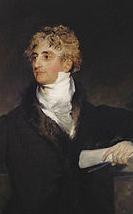















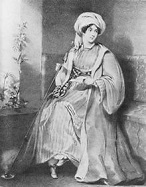


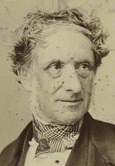
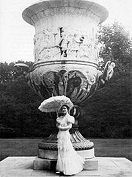
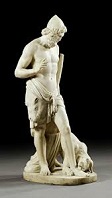
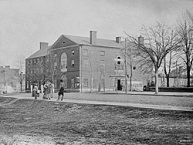
1815 Beginning this year large numbers of Irish begin migrating to the U.S. - 102 years to JFK? Jewish immigration to the U.S. from Europe, particularly Germany begins to increase greatly; Cincinnati (later ironically called Porkopolis) and San Francisco start becoming flourishing Jewish centers. The Great Migration of Canada from Britain begins, with 800K immigrating by 1850, incl. English-speaking settlers to Upper Canada, Gaelic-speaking Highland Scots to Nova Scotia, and 35K Irish landing in Toronto in 1847-8. We fired our guns and the British kept a-comin'? On Jan. 1 an artillery duel ends in an American success, then on Jan. 8 (Sun.) the Battle of New Orleans (last major battle of the War of 1812) sees British Maj. Gen. Edward Pakenham (b. 1778) throw his 5.3K elite troops in two columns through the early morning fog; too bad for them, the fog lifts, exposing them to horrendous casualties from concentrated Am. fire; the British reform 2x, but break off the fight after Pakenham is KIA; the Brits suffer 291 KIA, 1,262 wounded, and 484 captured or missing; Am. losses total 13 KIA, 39 wounded, and 19 missing, making Andrew "Andy" Jackson (1767-1845) a nat. hero; French pirate Jean Lafitte (1776-1825) (who learned of a $500 bounty on his head by La. gov. William Charles Cole Claiborne (1775-1817) in 1813 and responded by offering his own $15K bounty on him) assists but doesn't fare as well until the 1958 MGM film The Buccaneer (dir. by Anthony Quinn) comes out?; Pakenham's body is pickled in a barrel of rum like a ham and packed off to his ship to see his wife, who is waiting for good news; the British slink away and sail from Lake Borgne in SE La. on Jan. 25. When it comes to shipping talk is cheap, mistakes aren't? On Jan. 15 after defeating the British ship Endymion, the frigate USS President, commanded by Stephen Decatur Jr. becomes the first-ever heavy U.S. frigate lost to an enemy (until ?) when the British force him to surrender. On Jan. 30 Thomas Jefferson sells 6.5K books from his private library (largest in the U.S.) to the U.S. Congress, becoming the nucleus of the Library of Congress. On Feb. 15 the Treaty of Ghent between Britain and the U.S. is ratified by the U.S. Senate, ending the War of 1812, and Pres. Madison's popularity soars along with U.S. pride; at the same time the U.S. and Britain begin to realize their economic (if not racial) interdependence and respect each other a mite; total U.S. war deaths: 2,260. On Mar. 4 in honor of the Treaty of Ghent, Pres. Madison proclaims a nat. day of Thanksgiving. On Mar. 20-29 the Congress of Vienna (begun 1814) agrees to the perpetual neutrality of Switzerland, and a constitutional convention meets in Switzerland to draw up a new federal pact. On May 5 after Austrian Prince Metternich opens the diet of the German Confederation (ends 1866) in Frankfurt, Grand Duke Karl August of Saxe-Weimar-Eisenach grants the first German constitution, effective June 8, creating a 38-state confederation from 360 HRE states under the presidency of the emperor of Austria; an edict limits land ownership to those able to furnish a team of animals to work it, forcing many peasants into poverty and cottage industries; the Free City of Frankfurt ie established, with a constitution that restores the old restrictions on the Jews except the requirement to live in the ghetto. I return my flower, a changed bee? Let's get Chef Pierre on the road? It's playtime, let's see your best Karate Krunch? On Mar. 20-July 8 the Hundred Days (War of the Seventh Coalition) (really 111 days) culminates in Emperor Napoleon I (1769-1821) meeting British gen. Arthur Wellesley, Duke of Wellington (1769-1852) for the last time at Waterloo, which Wellington later claims "was won on the playing fields of Eton"; on Feb. 26 after getting pissed-off at the Bourbon restoration and the machinations of the Congress of Vienna, and seeing his chance with Anglo-Dutch troops under Wellington and Prussian troops under Blucher scattered around the Low Countries, Napoleon eludes British patrol ships and escapes Elba, then lands on Mar. 1 in Cannes, where troops sent to capture him fall prey to his charisma and and rally around him, causing Louis XVIII to flee to Ghent; on Mar. 13 the allies issue a ban against Nappy, but that doesn't stop him from entering Paris and establishing a govt., with the Duc de Cambaceres as pres. of the House of Peers and minister of justice, then organizing an army to reconquer Belgium and Holland, causing Austria, Britain, Prussia, and Russia to form the Seventh (Final) Coalition against him on Mar. 25, supplying 180K men each and getting all European nations except Sweden to join, resulting in a 1M-man army; Pierre Samuel du Pont de Nemours takes the cue and returns to the U.S. with his sons; Nathan Mayer Rothschild funds the Brits, while Jacob Rothschild funds the French, allowing them to play both sides and end up owning a large amount of the British Empire, after which they force their five C European banks to be used instead of transferring precious metals from country to country? The U.S. makes short work of its first war against Muslim terrorists? On Mar. 3 the U.S. declares the Second Barbary (Algerian) (Algerine) War (first in 1801-5) on Algiers, Tripoli, and Tunis and their Muslim Barbary pirates, who plunder U.S. ships to make up for what they claim is not enough tribute (jizya) as promised by the Quran, and scoff at the nation of shopkeeping Jonathans and Quakers; on May 10 Commodore Stephen Decatur Jr. sails from New York with a flotilla of 10 ships, tells the Algerian adm. "I go where I please", and seizes two Algerian ships in the Mediterranean, then sails into Algiers Harbor, and on June 30 the bey of Algiers capitulates; in July-Aug. Decatur ends the piracy of Tunis and Tripoli, inducing similar treaties; the pirates cease collecting tribute from the U.S. and instead pay indemnities; when hero Decatur returns to the U.S. he attends a banquet where he utters the famous soundbyte: "Our country! In her intercourse with foreign nations may she always be in the right, but our country, right or wrong!"; meanwhile Pres. Madison sees the light and "federalizes", suddenly wanting a peacetime army and navy as well as a nat. bank, and even increased tariffs and internal improvements; the Federalists and Republicans reverse roles as the former now take up states rights and strict construction, leaving the latter to go abolitionist and win the U.S. Civil War of 1861-5 that ended the U.S. eyesore of Muslim-like slavery, although ironically a lot of Africans taken as slaves were Muslim at the time and were purchased from other African Muslims, then forced to convert to Christianity, although some secretly cling to their Qurans. On Mar. 16 Prince William Frederick (Willem Frederik) of Orange is crowned king William I (1772-1843) of the Netherlands and grand duke of Luxembroug (until Oct. 7, 1840); his son William II commands Dutch troops in the upcoming June 18 Battle of Waterloo. On Mar. 20-29 the Congress of Vienna (begun 1814) agrees to the perpetual neutrality of Switzerland, and a constitutional convention meets in Switzerland to draw up a new federal pact. In Mar. Joachim Murat (b. 1767) declares for Napoleon and tries to regain his throne in Naples, but is defeated by an Austrian force on May 2-3 at the Battle of Tolentino after Corsican adventurer Giuseppe Marco Fieschi (1790-1836) betrays his plans to the Austrians, later giving more info. that helps the Austrians capture him; Bourbon king Ferdinand IV of Sicily is restored to the Neapolitan (chocolate, vanilla and strawberry?) throne; Fieschi returns to Corsica next year then ends up getting 10 years for theft and forgery; utilitarian philosopher Luigi Edoardo Pellegrino, Count Rossi (1787-1848), prof. of law in Bologna and a Murat supporter flees to France, then settles in Geneva, being granted naturalization after giving a course in Roman law. On Apr. 6 Pres. Madison appoints Benjamin Henry Boneval Latrobe (1764-1820) as architect of the U.S. Capitol (until Nov. 20, 1817). On Apr. 10 Mt. Tambora on Sumbawa Island in Indonesia erupts with a force (VEI-7) 100Kx Mt. St. Helens (most powerful recorded volcanic explosion in history), killing 90K, mostly from starvation after it destroys the crops; its ash affects the weather as far away as England, blackening skies around the globe and blocking sunlight for three years, triggering a blizzard in Upstate New York in June 1816 and killer frosts in New England in July-Aug. 1816, making 1816 "the year without a summer", causing a new genre of Gothic fiction incl. Frankenstein and human vampires to emerge? On Apr. 22-23 the Acte Additionnel aux Constitutions de l'Empire, drafted by Benjamin Constant provides the emperor with limited executive authority and ensures individual rights and freedom of the press - take the next exit and turn right? On Apr. 24 after Karadorde Petrovic and most of the Serbian leaders escape to the Austrian-Hungarian Empire, the Second Serbian Uprising against the Turks (ends July 26, 1817) begins as the Serbian nat. council in Takovo proclaims a revolt under Milos Obrenovich (1780-1860), who utters the soundbyte: "Here I am; here you are; war against the Turks!"; the Serbs go on to conquer the Pashaluk of Belgrade (Sanjak of Smederevo). On May 5 after Austrian Prince Metternich opens the diet of the German Confederation (ends 1866) in Frankfurt, Grand Duke Karl August of Saxe-Weimar-Eisenach grants the first German constitution, effective June 8, creating a 38-state confederation from 360 HRE states under the presidency of the emperor of Austria; an edict limits land ownership to those able to furnish a team of animals to work it, forcing many peasants into poverty and cottage industries; the Free City of Frankfurt ie established, with a constitution that restores the old restrictions on the Jews except the requirement to live in the ghetto; on May 19 Geneva joins the Swiss Confederation. On May 21 Pope Pius VII stops in Turin on his return to Italy from crowning Napoleon, and personally displays the Shroud of Christ from the balcony of the Palazzo Madama. In May Napoleon issues the liberal constitution Le Champ de Mai. The orchestra is on their feet? The last half of the year is a big gig for the European diplomats, who carve up France's carcass for their royal absolutist masters? On June 9 the Congress of Vienna (begun 1814) closes with the Treaty of Vienna; the result is the concept of the balance of power to preserve internat. equilibrium of the winning powers, with periodic congresses meeting to maintain peace (prevent revolts); France reverts to its 1790 boundaries, but is allowed to keep Avignon, which it took from the papacy; Russia keeps Finland, and the greater part of the Grand Duchy of Warsaw, which is dissolved, and Poland (Cracow) is repartitioned between Russia, Prussia and Austria, with a kingdom of Poland created under a king and the Russian tsar, with the right to have unspellable Polish as the official language plus their own army (ends 1846); Austria emerges as the dominant power on the continent (ends 1866), receiving new territories in Italy and the Illyrian Provinces; Prussia receives part of the duchy of Warsaw, Danzig, Swedish Pomernia and Rugen, plus new parts of Westphalia and Neuchatel and more than half of Saxony, which becomes a province; on Aug. 24, 1815 the Fundamental Law of the Kingdom of the United Netherlands is passed, uniting Belgium and Holland in an uneasy religious-unfriendly alliance in order to create a strong buffer state against France (ends 1830); Luxembourg (founded 963), the 350-year toy of Burgundy, Spain, Austria and France is made a Grand Duchy and given to the Netherlands; Switzerland becomes independent of France, and on Nov. 20 the Swiss Federal Pact is ratified, creating a confederation of 22 contiguous autonomous cantons with a Diet with restricted powers which requires the vote of two-thirds of the cantons to ratify any act; Norway and Sweden are joined in another bad marriage under one ruler; the dynasties in Spain, Sardinia and the Papal States (incl. Bologna) which had been taken over by the Napoleon clan are restored; the Valtellina passes to the new Lombard-Venetian Kingdom held by Austria (until 1848); Piedmont is returned to the kingdom of Sardinia, which is given Genoa and Liguria, making it the #1 independent state in the Italian peninsula; the new Germanic Confederation is formed, consisting of 38 member states (Austria, Liechtenstein, Hamburg et al.) as the replacement for the Holy Roman Empire (ends 1866), with a Diet at Frankfurt-am-Main consisting of two assemblies of diplomats presided over by Austrian reps.; the Ionian Islands of Greece are taken from France and placed under British suzerainty (until 1863); East Friesland is added to Hanover (an electorate since 1692), which is proclaimed a kingdom (until 1886), and restored to the English crown (ends 1837); England gains the nice naval hops of Malta and Helgoland, the Cape of Good Hope, and scattered island possessions taken from the Netherlands and France; Switzerland promises to not allow their famous and feared mercenaries to fight anywhere but at home and the Vatican; brie is declared the king of cheeses; the war to end all wars is over, but the real war is on hotter than ever between the liberal forces seeking to end absolutism in a hedonistic world that delights in pleasure and sin, and the absolutist forces seeking to hold onto their gains and the religious piety of the masses while themselves delighting in, er, pleasure and sin, with round one being conservative top dog Austria vs. liberal-hope challenger Prussia, whose liberal pop. has the problem of the Junkers (large landholders); after a cent. of strife it takes WWI to finally undo the old order completely? Into each life some rain must fall? On June 15-16 Napoleon suddenly crosses the Belgian frontier and attacks Charleroi, taking it from the Prussians; on June 16 he severely defeats field marshal Blucher at the Battle of Ligny (Nappy's last V), forcing him to fall back, while he personally rallies his scattered troops; meanwhile French marshal Michel Ney attacks the British under the Prince of Orange at the Battle of Quatre Bras and is defeated, while French troops under marshal Jean-Baptiste Droute, Count d'Erlon (1765-1844) are given conflicting orders and march back and forth between Ligny and Quatre Bras without engaging; Napoleon orders cavalry cmdr. marshal Emmanuel de Grouchy, Marquis de Grouchy (1766-1847) to follow and attack Blucher and his Prussians, who are expected to retreat S to Namur, but his orders are delayed for 12 hours, and Grouchy doesn't follow them, blindsiding grouchy Nappy, who joins Ney on June 17 and follows the retreating British on the road to Brussels, having a perfect life until they make a stand at the crossroads of Mt. St. Jean in front of the village of (what's love? that's right?) Waterloo, the last major battle involving all the great powers of Europe until 1914; alas, if only there had not been a bad rainstorm on the 17th, and he had not been suffering from painful hemorrhoids keeping him inside his tent high on opium, Nappy might have taken the unready Brits, but c'est la vie?; on June 18 (Sun.) (midday) (6, 6+6+6, 1815 = 6+6+6 + 1+5=6?) the watershed Battle of Waterloo in Belgium between Napoleon and the Duke of Wellington's 32K troops begins with a French frontal attack on Wellington's troops at the Battle of La Haye Sainte, whose "thin red line" repels the French cavalry charge three, count 'em, three times, giving Blucher's troops (who had not fallen back to Namur, but turned N along a series of farm roads to Wavre, eluding grouchy Grouchy) under new cmdr. August Wilhelm Antonius Graf Neidhardt von Gneisenau (1760-1831) (who took charge after aging field marshal Blucher became disabled at Ligny) to surprise know-it-all-Nappy (the original Wrath of Khan vs. Kirk and Spock?), and come into view, though they are slowed by the muddy conditions, and take until 4:30 p.m. to reach the French at Plancenoit (Planchenoit), on Nappy's right flank, getting him into a vise; at 7 p.m. the decision hour arrives, and Nappy the Gambler risks his Old (Imperial) Guard, who fight to the last man in vain until finally the Frogs are routed, with French Gen. Pierre Jacques Etienne Cambronne (1770-1842) allegedly uttering the soundbyte "The Guard knows how to die", or "Merde" when called upon to surrender before being seriously wounded and taken POW by the British; the French propose a truce, which is laughed off, and Gneisenau pursues the Frogs to the gates of Paris, capturing Napoleon's carriage, and beating Wellington; on July 7 Paris is retaken, and on July 8 Louis XVIII "the Desired" (1755-1824) returns to his throney throne throne (until Sept. 16, 1824), backed by large sums of money raised by Jacques Laffitte (1767-1844), who becomes gov. of the Bank of France and pres. of the chamber of commerce, supplying 2M francs from his own pocket to cover the pay of the imperial troops after the Battle of Waterloo (Napoleon I himself deposited 5M francs in gold with him before leaving France for the last time); shortly after his restoration Louis XVIII grants the Charter of 1814, reducing the French monarchy from absolutist to constitutional; the British Army begin wearing bearskin hats after the Battle of Waterloo to mock Napoleon's Imperial Guard; the French D was actually a moral V because they took on Britain, Prussia, Russia, Austria et al. all alone?; France turns its back on the British-led Industrial Rev., concentrating on small factories creating clothes, perfumes, and luxury goods, which survive to modern times, while England's factories don't?; "Waterloo was not a battle, it was a change in direction of the universe." (Victor Hugo) On June 20 Napoleon I issues a report on the Battle of Waterloo, claiming that by late afternoon "the army was able to look with satisfaction upon a battle won and the battlefield in our possession", until Gen. Blucher's Prussian troops intervened and routed them. His last days as a Playboy Playmate coming up in minutes, or, Shrek the Third is about to debut? On June 22 (4 days after the Big D at Waterloo) after going with his brother Joseph Bonaparte to Rochefort, planning to sail separately for North Am., and Joseph offering to give up his own hired vessel for him, whereupon he graciously lets him escape instead, Napoleon I surrenders to British Vice-adm. Sir Henry Hotham (1777-1833) (ham jokes here?), then on July 15 formally surrenders aboard the HMS Bellerophon (Capt. Frederick Lewis Maitland) off Rochefort, and abdicates again in favor of his son Napoleon II (1811-32), who never rules; Napoleon is unanimously ordered by the allies to be exiled to St. Helena Island in the butthole of the Atlantic off the W African coast, where he arrives in the Bellerophon in Oct., and remains until his death on May 5, 1821; the Brits set up a garrison on Ascension Island to the NW, calling it stone frigate HMS Ascension, classified as "sloop of war of the smaller class"; after state minister (since 1815) Francois-Rene de Chateaubriand votes for his execution. French marshal Michel Ney (b. 1769) is executed for treason on Dec. 7; Gen. Grouchy, who lives in Chateau de la Villette NW of Paris is exiled to Philadelphia, Penn.; Blucher retires to private life and receives a special Iron Cross from pleased-as-punch Frederick William III; the name Arthur (as in Arthur Wellesley, Duke of Wellington) suddenly becomes fashionable for baby boys; the Waterloo Teeth collected from the dead soldiers (most from young boys) for making dentures are so excellent that they are in great demand; Nappy's uncle Cardinal Joseph Fesch is exiled to Rome, bequeathing many art objects to Lyons; Nappy's brother Joseph-Napoleon Bonaparte (1768-1844) flees to Bordentown, N.J. (until 1841), settling down in Point Breeze, N.J. under the title of Comte de Survilliers and going into agriculture - yep, that's me? On June 30-Aug. 12 9K Dutch and Belgian troops siege the fortress of Valenciennes, which is commanded by Napoleon's gen. Louis Emmanuel Rey (1768-1846). In June with British help, Ferdinand the Infanta of Spain, AKA Ferdinand IV of Naples and Ferdinand II of Sicily restores the Bourbon Dynasty in Sicily, abolishing the constitution of 1812. On Aug. 14 afer Louis XVIII institutes the Second White Terror, persecuting anybody associated with the French Rev. or Napoleon, elections in France are won by the ultra-royalists, who win 350 of 402 seats; on Sept. 26 Armand Emmanuel Sophie Septimanie de Vignerot du Plessis, 5th Duc de Richelieu (1766-1822) becomes PM #2 of France (until Dec. 29, 1918); on Oct. 7 the Chambre Introuvable (Unobtainable Chamber) convenes, bent on reestablishing the Ancien Regime, banishing anybody who voted for Louis XVI's execution and establishing military provost-marshal courts to dispense with them. On Aug. 23 HMS Northumberland, carrying Napoleon en route to St. Helena Island anchors at Funchal in Madeira, and British consul Henry Veitch (1782-1857) (great-grandfather of writer Noel Coward) goofs by addressing him as "Your Majesty" instead of "General", causing the foreign secy. to sack him and order him to return to England; after the locals demand his return, he is reinstated by Lord Palmerston, and finally booted out for the final time in Dec. 1835 after stinking himself up with licentious behavior and trying to become gov. On Sept. 22-24 the Great Sept. Gale of 1815, the first to strike New England in 180 years strikes the S shore of Long Island, N.Y. on Sept. 23, splitting Long Beach from the Rockaways, then hits Saybrook, Conn., creating 11-ft. waves that destroy 500 houses and 35 ships, then floods Providence, R.I.; in 1819 John Farrar (1779-1853) of Harvard U. first proposes that a hurricane is a "moving vortex and not the rushing forward of a great body of the atmosphere". On Sept. 26 the Category 3 (135 mph) Holy (Grand) Alliance is formed by Alexander I of Russia, Francis I of Austria, and Frederick William III of Prussia, declaring that all Euro countries are to be governed by Christian (really conservative reactionary) principles; it is ultimately accepted by all European rulers except the British prince regent, the pope, and (obviously?) the Ottoman sultan - and that makes it classy for the kids? On Oct. 13 Napoleon's brother-in-law Joachim Murat (b. 1767) is executed in Calabria, S Italy. On Nov. 20 the Second Treaty of Paris contracts France to its 1790 boundaries (the 1789 boundaries plus Venaissin and Avignon), and forces France to pay 700M francs and support 17 allied fortresses on its N and E frontiers for five years; Saarbrucken passes from France to Prussia - no more Peach Elbas? On Nov. 20 the Quadruple Alliance between Britain, Austria, Prussia, and Russia implements Prince Metternich's Congress System, whereby each member agrees to supply 60K men upon the attempted violation of the Treaty of Paris, and establishes the principle of govt. by conference; it is signed for a 20-year term, then renewed for another 20 years in 1834. On Dec. 7 Michel Ney (b. 1769), one of Napoleon's original 18 marshals of France is arrested and charged with treason by the chamber of peers, then convicted on Dec. 6 and executed by firing squad near the Luxembourg Garden in Paris on Dec. 7, refusing to wear a blindfold and giving the soldiers their order to fire like the macho stud he is; the execution is meant as an example, but divides public opinion; later a legend arises that the whole thing was staged with fake blood packets, and that he had pulled Illuminati Freemason strings to be spirited away to the U.S., where he assumes the identity of mild-mannered school teacher Peter Stuart Ney in the Carolinas, and dies in 1846 after uttering the final words: "Bessieres is dead, the Old Guard is dead, now please let me die"; his gravestone is in Cleveland, N.C. at Third Creek Presbyterian Church? On Dec. 15 Pres. Madison delivers his State of the Union Message to Congress, declaring the Barbary Wars to be over. A colony rules its former mother country? Brazil becomes an independent kingdom equal to Portugal, with Prince Regent Joao (John) VI (Dom John) ruling both countries from Rio de Janeiro, where he was driven into exile by the French during the Napoleonic Wars; on Dec. 16 Mad Maria I is proclaimed queen of the United Kingdom of Portugal, Brazil, and the Algarves; after Nappy is defeated at the Battle of Waterloo, Maria I and her family remain in Brazil. Gen. Carlos Maria de Alvear (1789-1852) becomes dictator of the Rio de la Plata based in Buenos Aires; meanwhile Argentine Gen. Jose de San Martin (1778-1850) goes to Mendoza to organize an army to liberate Chile. After federalist troops from the Banda Oriental (Uruguay) threaten the country, Dr. Jose Gaspar Rodriguez de Francia becomes dictator ("El Supremo") of Paraguay, isolating the country and fighting annexation threats by both Brazil and the United Provinces of the Rio de la Plata while forcing peasants into slave labor, allegedly to found a dream country a la Rousseau, Robespierre and Napoleon, while he slowly goes mad? The Venezuelan royalists defeat Simon Bolivar at the Battle of Santa Marta, then take Cartagena, causing him to flee Nueva Granada for Jamaica, where he issues his Jamaican Letter, then travel to Haiti and gain support from pres. Alexandre Sabes Petion with his promise to abolish slavery in Venezuela, raising a new army. The British income tax is abolished (until 1842) - hey, we get a piece of them 700 million francs? After more than a year's hostilities, Nepal agrees to let British residents live in the strongly Hindu (no British beef?) capital city of Katmandu. Britain's takeover of the South Am. trade routes almost leads to war among the major powers. Ndvungunye dies, and his son Sobhuza I (Ngwane IV) (Somhlolo = "the Wonder") (1780-1836) becomes king of Swaziland (until 1836). The Sac and Fox tribes are manipulated into new treaties with the U.S. this year and next giving away their ancestral lands on the E side of the Mississipi River, with relocation to the W side accomplished in 1823; as before, chief Black Hawk repudiates the agreements, but white man gets what white man wants, and his red ass is grass and they got the lawnmower? French-Canadian trapper Jaques La Ramie (Ramee) (Ramée) (1784-1821) organizes a free-trapper rendezvous at the junction of the North Platte and Laramie Rivers, going on to explore the Laramie River in 1820 until he mysteriously fails to arrive at a rendezvous in 1821 and is never seen again; in the mid-1860s the town of Laramie, Wyo. is named after him. The first regular steamships begin running between Liverpool and Glasgow. About this time White is Right Britain adopts a paternalistic attitude towards the natives of India, feeling a new responsibility to modernize and Christianize, and of course, to rule them (like whites everywhere, from Alexander's Greeks on?); meanwhile, the East India Co. men in India live like maharajas, complete with native mistresses in their palaces who churn out future Nehrus? - Hindu is a state of mind? The Commercial Convention between the U.S. and Britain patches up war wounds and eliminates discriminatory duties on both sides, except in the West Indies, where Britain still closes the door. The Corn Laws are passed by Parliament, outlawing import of grain until domestic grain reaches the "famine price" of 80 shillings per quarter; this helps the agricultural aristocracy, but disregards both agricultural workers and consumers, raising food prices for the working classes (ends 1827); repealed in 1846. The Apothecaries Act forbids unqualified doctors from practicing in England. Karl Follen (1796-1840) founds the Blacks, one of several secret liberal societies in the German univs. called Burschenschaften, the Blacks being supporters of violence; gymnastics man Friedrich Ludwig Jahn organizes others - I said tough enough? David Low Dodge (1774-1852) organizes the first peace society in history in New York City, followed by Noah Worcester (1758-1837) in Mass., which in 1828 are incorporated into the Am. Peace Sociey by William Ladd (1778-1841) in 1828. John Quincy Adams is appointed U.S. minister to London by Pres. Madison. After the Battle of Waterloo British soldiers are issued a Soldier's Account Book, explaining how to collect their pay, and containing a sample form filled out in the name of Pvt. Thomas Atkins (No. 6 Troop, 6th Dragoons); the name "Tommy" enters the English language for a British soldier, and is adopted by their enemies the Krauts ("The war is over for you, Tommy"). Shropshire-born English banker-economist Thomas Attwood (1783-1856) et al. found the Birmingham School of Economics to advocate underconsumptionist theory and an expansionary monetary policy to achieve full employment, opposing the gold standard and pushing an income-expenditure model with a multiplier effect, becoming the first Keynesians; they are dismissed as "currency cranks" and "crude inflationists". Russian navigator Capt. Otto von Kotzebue (1787-1846) discovers many islands in the Pacific. The Technological College of Vienna is founded, later becoming the Vienna U. of Tech. The Protestant German Missionary Society is founded on Sept. 26, later becoming the Basel Evangelical Missionary Society. Lord Byron (1788-1824) marries Anne Isabella Milbanke (1792-1860), but after he proves more in love with himself she divorces him, and in 1816 he goes in disgrace to Italy to live a Byronic life of dissipation, never returning to England. The Biedermeier Period (ends 1848) begins in C Europe, pandering to the growing middle class; the Biedermeier Style in German furniture (a heavy, stolid Bourgeoise variation of French Empire, which invites parody and ridicule?) becomes popular in Germany and Austria (until 1860), featuring a family table with chairs for evening activities. English socialite adventurer-traveler ("Queen of the Desert") Lady Hester Lucy Stanhope (1776-1839) (niece of British PM William Pitt the Younger, who prefers to dress as a Turkish male sans veil) makes an archeological expedition to Ashkelon, becoming the first modern excavation in the Holy Land. Architecture: The red brick Old Brick Capitol on Jenkins Hill (E slope of Capitol Hill) at 1st and A Sts., NE in Washington, D.C. is founded out of Stelle's Hotel (built 1800) as the temporary U.S. Capitol (until 1819); during the U.S. Civil War of 1861-5 it becomes the Old Capitol Prison; in 1865 it houses Lincoln's suspected assassins; in 1867 it is purchased by U.S. sgt.-at-arms George T. Brown, who turns it into three rowhouses called Trumbull's Row; in 1929 it is demolished to make way for U.S. Supreme Court Bldg. John Nash begins rebuilding Royal Brighton Pavilion in pseudo-oriental (Indian) style for prince regent George (later George IV) (finished 1823). Buckingham House in Newark, Ohio is built by Daniel Duncan, becoming a posh place to entertain distinguished guests incl. U.S. presidents Hayes and Garfield. The Washington City Canal in Washington, D.C. opens, connecting the Anacostia River in the E to Tiber Creek, the Potomac River, and later the Chesapeake and Ohio Canal; it closes in the mid-1850s, and is filled in by 1871, with only the Lockkeeper's House (built in 1837) left standing at the SW corner of 17th St., NW and Constitutional Ave., NW near Constitution Gardens. Inventions: Seth Boyden invents a leather-splitting machine. English chemist Humphry Davy (1778-1829) and English engineer George Stephenson (1781-1848) develop the oil-burning Miner's Safety Arc Lamp, using a gauze cylinder. Robert Fulton's 38-ton USS Fulton becomes the first steam-powered warship. British road surveyor John Loudon McAdam (1756-1836) invents a method for improving roads by elevating the roadbed and using small stones to keep it dry - why didn't I think of that? Thomas Jefferson invents a power machine for breaking hemp. English physician Peter Mark Roget (1779-1869) invents the log-log slide rule, good for exponential and root calculations. Daniel Shreve's 80-ft. river steamboat Enterprise begins its Louisville-New Orleans route; it features a high-pressure engine and a 2nd deck, which soon becomes standard - the first starship Enterprise with warp drive and rec room? Science: French physicist Augustin Jean Fresnel (1788-1827) pub. researches on the diffraction of light (Fresnel Lines), interference, polarization, and double refaction, ultimately establishing the Transverse Wave Theory of Light (1815-21). German astronomer Heinrich Wilhelm Matthaus (Matthäus) Olbers (1758-1840) discovers the periodic Olbers Comet (13P/Olbers). English physician-chemist William Prout (1785-1850) anon. pub. the paper "On the Relation Between the Specific Gravities of Bodies in their Gaseous States and the Weights of their Atoms", proposing Prout's Hypothesis, a relation between specific gravity and atomic weight, suggesting that atoms of all elements are aggregates of hydrogen atoms. Nonfiction: Rev. John Dobson (1794-1847), The Elements of Geometry; a book without punctuation, except for a period at the end of each paragraph; publisher Cambridge Press sneaks a colon, semicolon, comma and period onto the title page. Daniel Drake, Picture of Cincinnati. Elizabeth Hamilton (1756-1816), Hints Addressed to the Patrons and Directors of Schools. Jean-Baptiste de Lamarck (1744-1829), Histoire Naturelle des Dnimaux (1815-22). Thomas Robert Malthus (1766-1834), An Inquiry into the Nature and Progress of Rent. Hannah More (1745-1833), Character of St. Paul. Sir Thomas Stamford Raffles (1781-1826), History of Java. David Ricardo (1772-1823), The Influence of a Low Price of Corn on the Profits of Stock; introduces the Law of Diminishing Returns? Claudius James Rich (1787-1821), Narrative of a Journey to the Site of Babylon in 1811; visits the site of ancient Babylon on the Euphrates River and finds no traces of its original walls. Friedrich Carl von Savigny (1779-1861), History of Roman Law in the Middle Ages (Geschichte des Romischen Rechts im Mittelalter) (6 vols.) (1815-31); covers from the end of the Western Roman Empire until the start of the 12th cent., showing how dead Roman law lived on in local customs, towns, ecclesiastical doctrines, and school teachings until it resurfaced in Bologna and other Italian cities. Jean Charles Leonard Simonde de Sismondi (1773-1842), Political Economy. William Smith (1769-1839), Geological Map of England and Wales; the first proper colored geological map, showing 21 sedimentary layers; claims that specific strata can be identified by their fossil content, and works out the main divisions of the Secondary (Mesozoic) strata. Dugald Stewart, Progress of Metaphysical, Ethical, and Political Philosophy. Music: Anon., Foggy, Foggy Dew. Franz Schubert (1797-1828), Symphony No. 2 in B flat, D125; First Piano Sonata in E major, D157; Mass No. 2 in G, D167; Der Vierjahrige Posten, D190 (1-act operetta) (May 19); 3rd (Rhenische) Symphony in D major, D200 (Fernando); Second Piano Sonata in C major, D279; Freunde von Salamanka, D326; Der Erlkonig (Erlkönig), D328 (based on a Goethe ballad); plus another mass, 144 songs, and two operas. Art: Francisco de Goya (1746-1828), Tauromaquia (etchings); Self Portrait. Etienne-Jules Ramey (fils) (1796-1852), Ulysses Recognized by His Dog Argos (statue). J.M.W. Turner (1775-1851), Crossing the Brook. Sir Richard Westmacott (Jr.) (1775-1856), Waterloo Vase; 15-ft. (5m) 20-ton white elephant sculpted from a single piece of Carrara marble originally hewn in Tuscany for Napoleon to celebrate his coming V in Russia and presented to the Prince Regent (later George IV) by Grand Duke Ferdinand of Tuscany complete with bas-reliefs of George III on his throne and loser Napoleon unhorsed; ends up in the Nat. Gallery in 1836-1906, followed by the garden of Buckingham Palace. Plays: Clemens Brentano (1778-1842), Die Grundung Prags. J.S. Knowles, Caius Gracchus (tragedy). Eugene Scribe (1791-1861) and Delestre Poirson, Night of the National Guard (Une Nuit de la Garde Nationale); Scribe's first hit. Poetry: The first printed ed. of the anon. Anglo-Saxon poem Beowolf is pub. Pierre Jean de Beranger (1780-1857), Chansons I; makes him a hero with French republicans; incl. Le Roi d'Yvetot, a satire of Napoleon, which becomes a hit with Louis XVIII, who utters the soundbyte: "We must pardon many things to the author of 'Le Roi d'Yvetot'". William Lisle Bowles, The Missionary of the Andes. Lord Byron (1788-1824), Hebrew Melodies (Apr.); music by Isaac Nathan; bestseller (10K copies); incl. My Soul is Dark, The Destruction of Sennacherib, and She Walks in Beauty, written in 1813 after meeting his mourning cousin Mrs. John Wilmot at a ball wearing a black dress with spangles. Casimir Delavigne (1793-1843), Messiniennes; incl. Waterloo, Devastation du Mise, Sur le Besoin de s'Unir Apres le Depart des Etrangers; big hit, selling 25K copies and getting him a better sinecure. James Hogg (1770-1835), Pilgrims of the Sun. Johann Ludwig Uhland (1787-1862), Vaterlandische Gedichte; makes him a star. Johan Olof Wallin (1779-1839), The Educator (Uppfostraren). William Wordsworth (1770-1850), Laodamia. Novels: Joseph von Eichendorff (1788-1857), Ahnung und Gegenwart. Friedrich de la Motte Fouque (1777-1834), Die Fahrten Thiodolfs des Islanders. E.T.A. Hoffmann (1776-1822), Die Elixiere des Teufels. Sir Walter Scott (1771-1832), Guy Mannering; or, The Astrologer; pub. anon.; big hit about the supernatural; Dandie Dinmont has six Dandie Dinmont terriers (a breed dating back to the 17th cent.). Births: Canadian PM #1 (1867-73, 1878-91) Sir John Alexander Macdonald (d. 1891) on Jan. 11 in Glasgow, Scotland. Am. Mormon leader William Bickerton (d. 1905) on Jan. 15 in Alnwick, Northumberland, England; starts out as a Methodist until he is converted by Sidney Rigdon in 1845. British astronomical photography pioneer Warren De La Rue (d. 1889) on Jan. 15 in Guernsey. Am. Civil War Union gen. Henry Wager "Old Brains" Halleck (d. 1872) on Jan. 16 in Oneida County, N.Y. German Biblical scholar Lobegott Friedrich Constantin (von) Tischendorf (d. 1874) on Jan. 18 in Lengenfield (near Plauen), Saxony; educated at the U. of Leipzig. Am. anesthesia pioneer Dr. Horace Wells (d. 1848) on Jan. 21 in Hartford, Vt. German actress Christine Enghaus (Johanne Louise Christine Engehausen) (d. 1910) on Feb. 9 in Brauhschweig; wife (1846-) of Friedrich Hebbel (1813-63). Am. blackface performer Richard Ward "Dick" Pelham (Pell) (d. 1876) (Virginia Minstrels) on Feb. 13 in New York City. French Classicist painter-sculptor Jean-Louis Ernest Meissonier (d. 1891) on Feb. 21 in Lyon; moves to Paris at an early age; teacher of Edouard Detaille; known for his depictions of Napoleon and his armies and for microscopic "miniatures in oil". Am. Chicago Repub. mayor #21 (1860-1) and U.S. Rep. (D-Ill., 1853-5) "Long" John Wentworth (d. 1888) on Mar. 5 in Sandwich, N.H. U.S. Supreme Court justice #37 (1862-77) and U.S. Sen. (R-Ill.) (1877-83) David Davis (b. 1886) on Mar. 9 in Cecil County, Md.; educated at Kenyon College, and Yale U. French novelist-poet (dir. of the Comedie Francaise) Arsene (Arsène) Houssaye (Housset) (d. 1896) on Mar. 28 in Bruyeres (Bruyères); father of Henri Houssaye (1848-1911); father of Henry Houssaye (1848-1911). Irish surgeon Sir William Robert Wills Wilde (d. 1876) in Mar. near Castlerea, County Roscommon; husband of Lady Jane Wilde (1821-96); father of Oscar Wilde (1854-1900); knighted in 1864. German Prussian PM (1862-71) and chancellor #1 (1871-90) ("the Iron Chancellor") Otto Eduard Leopold von Bismarck, Count of Bismarck-Schonhausen, Duke of Lauenburg, Prince of Bismarck (d. 1898) on Apr. 1 in Schonhausen (Schönhausen), Prussia (East Germany); likes to do business with cigar in hand? German composer Friedrich Robert Volkmann (d. 1883) on Apr. 6 in Lommatzsch, Saxony. Am. brewer Georg August Krug (d. 1856) on Apr. 15 in Miltenberg, Bavaria, Germany; emigrates to the U.S. in 1848. Am. frontiersman (Mormon) William Adams "Wild Bill" Hickman (d. 1883) on Apr. 16. British Liberal politician (home secy. in 1868-73) Henry Austin Bruce, 1st Baron Aberdare (d. 1895) on Apr. 16 in Duffryn, Aberdare, Glamorganshire, Wales. English "Chronicles of Barsetshire" novelist Anthony Trollope (d. 1882) on Apr. 24 in London; son of Frances Milton Trollope (1780-1863); brother of Thomas Adolphus Trollope (1810-92); educated at Winchester College; designer of England's red mailboxes. English churchman (dean of St. Paul's in 1871-90) Richard Christopher Church (d. 1890) on Apr. 15 in Newport; educated at Wadham College, Oxford U. Am. Civil War Union brig. gen. John Gross Barnard (d. 1882) on May 19 in Sheffield, Mass.; brother of Frederick Augustus Porter Barnard (1808-89). Am. Texas Ranger Capt. John Salmon "Rip" Ford (d. 1897) on May 26 in Greenville District, S.C. German Indologist and Sanskrit scholar Otto von Bohtlingk (d. 1904) on May 30 in St. Petersburg, Russia. Am. Civil War Union gen. (deaf) Philip Kearny Jr. (d. 1862) on June 2 in New York City; wealthy parents; educated at Columbia U.; namesake of Kearny in NE N.J. Dutch painter (in Canada) Cornelius David Krieghoff (d. 1872) on June 19 in Amsterdam; emigrates to Canada in 1846. German composer Robert Franz (d. 1892) on June 28 in Halle. Irish physician-journalist-politician Sir John Gray (Grey) (d. 1875) on July 13 in Claremorris, County Mayo; educated at Trinity College, Dublin. Am. "Two Years Before the Mast" writer-lawyer Richard Henry Dana Jr. (d. 1882) on Aug. 1 in Cambridge, Mass.; private school student of Ralph Waldo Emerson; educated at Harvard U., where he contracts measles, weakening his eyes and causing him to go on a sea voyage. German physician Carl Reinhold August Wunderlich (d. 1877) on Aur. 4 in Sulz am Necker; educated at the U. of Tubingen. English explorer (of Australia) and gov. of Jamaica (1`862-5) Edward John Eyre (d. 1901) on Aug. 5 in Whipsnade, Bedfordshire; grows up in Hornsea, Yorkshire; French botanist Charles Victor Naudin (d. 1899) on Aug. 14 in Autun. Am. Dem. politician and Civil War Confed gen. Thomas Howell Cobb (d. 1868) on Sept. 7 in Jefferson County, Ga; of Welsh descent; grother of Thomas Reade Rootes Cobb (1823-62); grows up in Athens, Ga.; educated at the U. of Ga.; 1st pres. of the Confederacy before Jefferson Davis. Australian explorer (Freemason) John McDouall Stuart (d. 1866) on Sept. 7 in Dysart, Fife, Scotland; emigrates to Australia in 1838. Norwegian composer Halfdan Kjerulf (d. 1868) on Sept. 15 in Christiania (Oslo). Am. Presbyterian-Congregationalist abolitionit minister-hymnodist-writer Charles Beecher (d. 1900) on Oct. 1 in Litchfield, Conn.; son of Rev. Lyman Beecher (1775-1863); brother of Catharine Esther Beecher (1800-78), Edward Beecher (1803-95), Harriet Beecher Stowe (1811-96), and Henry Ward Beecher (1813-87); educated at Boston latin School, Bowdoin College, and Lane Theological Seminary. Am. Civil War Confed. Brig. Gen. William Joseph "Old Reliable" Hardee (d. 1873) on Oct. 12 in Camden County, Ga.; writes the most popular military textbook used by both sides during the war. German poet-playwright Emanuel von Geibel (d. 1884) on Oct. 17 in Lubeck. Am. "Dixie" entertainer-composer (founder of the first blackface minstrel troupe)Daniel Decatur "Dan" Emmett (d. 1904) on Oct. 29 in Mount Vernon, Ohio. German mathematician ("Father of Modern Analysis") Karl Theodor Wilhelm Weierstrass (d. 1897) on Oct. 31 in Ostenfelde, Westphalia, Prussia; educated at the U. of Bonn. Am. Civil War Confed Gen. Douglas Hancock Cooper (d. 1879) on Nov. 1 in Amite County, Miss.; educated at the U. of Va.; classmate of Lafayette McLaws, John B. Magruder, and Carnot Posey. Am. physician-pharmacist (ether anesthesia pioneer) Crawford Williamson Long (d. 1878) on Nov. 1 in Danielsville, Ga. English mathematician-logician (inventor of Boolean algebra) George Boole (d. 1864) Nov. 2 in Lincoln, Lincolnshire; prof. of math at Queen's College in Cork, Ireland (1849-); Irish Young Ireland leader, atty.-journalist hn Mitchel (Sean Misteil) (d. 1875) on Nov. 3 in Camnish (near Dungiven), County Londonderry, Ireland; Presbyterian minister father. Am. "general of the women's rights movement" Elizabeth Cady Stanton (d. 1902) on Nov. 12 in Johnstown, N.Y.; wife (1840-) of Henry Brewster Stanton. Am. "Christy Minstrels" singer-actor-producer-composer Edwin Pearce Christy (d. 1862) on Nov. 28 in Philadelphia, Penn. German realist painter Adolph (Adolf) Friedrich Erdmann von Menzel (d. 1905) on Dec. 8 in Breslau (Wroclaw), Poland. English world's first computer programmer Augusta Ada King, Countess of Lovelace (d. 1852) on Dec. 10 in London; first legitimate child of Lord Byron (1788-1824) and 1st wife (Jan. 2) Anne Isabella "Annabella" Milbanke (1792-1860); named after Byron's half-sister Augusta Leigh (1783-1851); considering him insane for hooking up with Augusta et al., mother leaves Byron on Jan. 16, 1816, the scandal forcing him to leave England forever in Apr. 1816, escaping to Switzerland; wife (1835-) of William King-Noel, 1st Earl of Lovelace (1805-93). French "Romans in the Decadence of the Empire" painter Thomas Couture (d. 1879) on Dec. 21 in Senlis, Oise; teacher of Edouard Manet and Pierre Puvis de Chavannes. Am. Civil War Union Gen. George Gordon Meade (d. 1872) on Dec. 31 in Cadiz, Spain. Scottish golfer Allan Robertson (d. 1859) in St. Andrews; first of the great golfers. Deaths: Scottish philosopher-historian Adam Ferguson (b. 1723) on Feb. 22 in St. Andrews. Am. Rev. War brig. gen. John Nixon (b. 1727) on Mar. 24 in in Middlebury, Vt. German traveller Carsten Niebuhr (b. 1733) on Apr. 26 in Meldorf. German-born hypnotist physician Franz Anton Mesmer (b. 1734) on Mar. 5 in Meersburg, Baden. Am. Roman Catholic archbishop (of Baltimore) John Carroll (b. 1735) on Dec. 3 in Baltimore, Md. English actress Fanny Abington (b. 1737) on Mar. 4. Am. portrait painter (in England after 1775) John Singleton Copley (b. 1738). German poet Matthias Claudius (b. 1740) on Jan. 21 in Hamburg. British-born Universalist clergyman John Murray (b. 1741) on Oct. 19 in Boston, Mass. Am. Rev. War col. Charles McDowell (b. 1743) on Mar. 31 near Morganton, Va. Am. politician John Sevier (b. 1745) on Sept. 25 in Ga.; dies while surveying the Ga. border with the Creek Nation in Ala.; a monument to him is erected in Knoxville, Tenn. Am. politician-historian David Ramsay (b. 1749) on May 8 in Charleston, S.C. Dutch patriotic leader Cornelis de Gijselaar (b. 1751) on May 29 in Leiden. French marshal Louis Alexandre Berthier (b. 1753) on June 1 in Bamberg (suicide or murder?). English steam engine developer Jonathan Carter Hornblower (b. 1753) in Mar. Am. Rev. War surgeon John Warren (b. 1753) on Apr. 4 in Boston, Mass. English caricaturist James Gillray (b. 1757) on June 1. French gen. Claude Jacques Lecourbe (b. 1759) on Oct. 22 in Belfort. English banker-economist Henry Thornton (b. 1760) on Jan. 16 in London. English chemist Smithson Tennant (b. 1761) on Feb. 22 near Boulogne-sur-Mer, France; killed in a bridge collapse. Am. steamboat inventor Robert Fulton (b. 1765) on Feb. 24 in New York City. English Lord Nelson's mistress Lady Emma Hamilton (b. 1765). French marshal and king of Naples-Sicily (1808-15) Joachim Murat (b. 1767) on Oct. 15 in Calabria, Italy (executed). French marshal Michel Ney (b. 1769) on Dec. 7 in Paris (executed for treason); last words: "Soldiers, when I give you the command to fire, aim straight for my heart. Wait for my order, it will be my last to you. I protest my condemnation. I have fought a hundred battles for France, and none one against her. Soldiers: Fire!" British gen. Sir Edward Michael Pakenham (b. 1778) on Jan. 8 in Chalmette, La. (KIA); last words: "Lost for the lack of courage." South African circus exhibit Sarah Baartman (b. 1789) on Dec. 29 in France; her remains are put on exhibit until 1974, and she is finally laid to rest in her birthplace of Hankey in 2002.
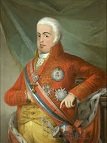












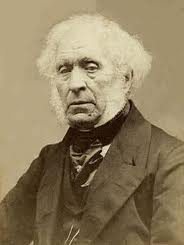













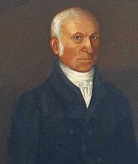



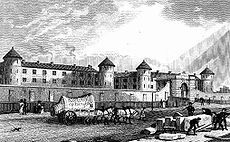

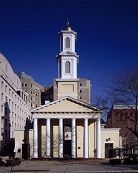
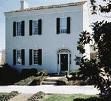

1816 The Year Without a Summer (Poverty Year), caused by the Apr. 10, 1815 eruption of Mount Tambora sees the worse European winter (until ?) followed by a widespread European crop failure that causes food riots in Britain, France, and Belgium, while Britain experiences its worst-ever depression (until ?) during the next two years, with the economy taking until 1820 to begin reviving; meanwhile, the economic depression combined with the overthrow of Napoleon brings the English working class to the brink of rev. over the winter of 1816-7; Robert Bailey Thomas (1766-1846) of Worcester County, Mass. in his Old Farmer's Almanac (founded 1792) mistakenly forecasts snow in July and Aug., but before he can send out replacements it actually does snow in the summer, making him into a genius and boosting his almanac's popularity? On Jan. 9 Thomas Jefferson writes a Letter to Charles Thompson revealing his religious beliefs, or lack thereof, and describing how he has cut-up the Gospels to make his own book which he calls "The Philosophy of Jesus". On Mar. 4 the Sugauli (Sugowlee) (Seggulee) Treaty (signed Dec. 2) is ratified, ending the Gurkha War of 1814, ceding one-third of Nepal to the British Raj in India incl. Kumaon, Garhwal, and parts of Sikkim, establishing a British rep in Katmandu, and committing Gurkhas for British military service; Nepal is prohibited from employing foreigners in military service; three decades of "peace without cordiality" with Nepal. On Mar. 16 after the Repub. congressional caucus balks at nominating yet another Virginian for the presidency, until their choice, war secy. William H. Crawford declines to oppose him, they nominate James Monroe of Va. for pres. and Daniel D. Tompkins of New York for vice-pres. On Mar. 18 the city of Pittsburgh, Penn. at the confluence of the Alleghany and Monongahela Rivers (where they form the Ohio River) is chartered (modern-day pop. 250K/5M); the level peninsula formed by the confluence becomes known as the Golden Triangle; the pop. grows from 7K to 21K in 1820-40. On Mar. 20 bananas queen (1777-1815) Maria I the Mad (b. 1734) dies, and her son Joao (John) VI (the Clement) (1767-1826) (regent since 1792) becomes king of Portugal (until Sept. 7, 1822), going on to see Spain, France, and Britain intervene in Portugal's affairs, his wife Carlota Joaquina of Spain conspire against him repeatedly, his son Dom Pedro take Brazil independent, and his other son Dom Miguel lead a rebellion seeking to depose him; his whale-like obesity does nothing to garner respect? On Mar. 20 the U.S. Supreme (Marshall) Court rules unanimously in Martin v. Hunter's Lessee that they have ultimate authority over state courts in civil matters of federal law to provide for a uniform interpretation of federal law throughout the states; Justice John Marshall recuses himself. On Apr. 13 after the insistence of U.S. treasury secy. Alexander James Dallas, the Second Bank of the U.S. is chartered for 20 years by Congress to pay off the debt from the War of 1812, and Stephen Girard becomes a principal stockholder. On May 25 Argentina begins its revolt against Spain, and proclaims independence on July 9. On May 31 the Paraguayan Congress makes Dr. Jose Gaspar Rodriguez de Francia dictator ("El Supremo") for life and dissolves itself. In May high unemployment leads to riots in Littleport and Ely. In May Fort Armstrong is built by the U.S. Army to deal with the hostile garbage, er, Indians of Ill; it is abandoned in 1836. On June 19 after a new band of Scottish settlers revives the settlement in Canada, and the pissed-off North-West Co. assembles a band of Metis (mixed Am. aborigines and French), they defeat the Scottish settlers at the Seven Oaks Massacre (Battle), killing 21, incl. Gov. Semple, and unfurl the flag of the Metis nation; Lord Selkirk hires Swiss mercenary War of 1812 vets to reestablish the settlement again, and fails to get anybody punished for the massacre, instead getting fined himself, then gives up, retires to England and dies in 1820 bankrupt; the Metis later claim him as the spark that created their identity. On July 9 the Congress of Tucuman (Tucumán) declares the independence of the United Provinces of the Rio de la Plata (Argentina), with Juan Martin Pueyrredon (Pueyrredón) O'Dogan (1776-1850) as supreme dir. (until 1819). In July the "indecent foreign dance", the Waltz makes its appearance in English ballrooms in a ball given in London by the Prince Regent. On Aug. 24 the U.S. signs a treaty with the Potawatomi, and another with the Chickasaw on Sept. 20, and another with the Cherokee on Oct. 4. In Aug. Portuguese soldiers from Brazil led by Capt. Federico Locor, under the guise of restoring order invade Uruguay (ends 1820) after sensing the Spanish have softened it up and this is their chance? On Sept. 5 after Louis XVIII, confronted with rising discontent in French society follows the counsels of PM Duc de Richelieu, the Duke of Wellington, and Russian ambassador Pozzo di Borgo, he dissolves the Chambre Introuvable, with new elections resulting in the ultra-royalists being temporarily replaced by the more liberal Doctrinaires, who try reconcile the French Rev.'s legacy with the monarchy; after Francois-Rene de Chateaubriand criticizes Louis XVIII for this move, he is fired as state minister, causing him to join the ultra-royalists in their support of future king Charles X, becoming a main writer of its mag. Le Conservateur. In Sept. French pirate Louis-Michel Aury (1788-1821) establishes a base on Galveston Island, Tex. to help the fledgling Repub. of Mexico fight the Spanish, with a commission as gov. of Texas. On Oct. 21 George Crowninshield Jr. of Salem, Mass. launches the $100K 192-ton 83-ft. private yacht Cleopatra's Barge, which becomes the first to cross the Atlantic, after which King Kamehameha II of Hawaii adopts it as his royal yacht Ha'aheo o Hawai'i (Pride of Hawaii) until it is wrecked in 1924. On Nov. 1-Dec. 4 the 1816 U.S. Pres. Election sees 59-y.-o. James Monroe of the Repub. Party easily defeat N.Y. Sen. Rufus King of the Federalist Party by 183-34 electoral votes. On Dec. 2 the first savings bank in the U.S. opens in Philadelphia. On Dec. 8 Bourbon Napoleon-hating Ferdinand IV of Naples) (Ferdinand III of Sicily), King of Leon and Infanta of Spain reunites the kingdoms of Naples and Sicily into the Kingdom of the Two Sicilies, and on Dec. 12 changes his title to Ferdinand I (1751-1825), going on to rule with an iron hand (until Jan. 4, 1825), becoming known as "Re Nasone" (King Big Nose). On Dec. 11 "Hoosier State" Indiana is admitted as the 19th U.S. (free) state, adopting an Ind. Constitution (2nd in 1851); it has a 41-mi. coastline on Lake Michigan, the smallest; within a year two commercial breweries open, followed by 350+ more by modern times. A combined British-Dutch force under British adm. Edward Pellew, 1st Viscount Exmouth (1757-1833) destroys the Algerian fleet, finally putting an end to the pesky Moorish Corsairs after 300 years; on Dec. 22-23 the U.S. signs a Treaty with the Barbary Pirates in Algiers. Venezuelan royalists take Bogota, and execute many patriot leaders, subjecting peasants to forced labor and turning Nueva Granada into a royalist supply center; Jose Antonio Paez (1790-1873), a llanero chief in Apuri begins a revolt against the Spanish royalists, going on to a long career as pres. of Venezuela starting in 1830. With support from Northern states, the U.S. Congress passes the first-ever (mildly) protectionist U.S. Tariff Act of 1816, designed by treasury sec. Alexander James Dallas, who leaves office with the U.S. treasury going from bankrupt two years earlier to a $20M surplus. The 1816 Polish Constitution makes Russian Tsar Alexander I king of Poland, but gives Poland complete control of its own budget and army, freedom of the press, and religious tolerance - congratulations, you're going to be a blackjack dealer? The Kingdom of Illyria (ends 1849) is established within the Austrian Empire, consisting of parts of Slovenia, Croatia, Italy, and Austria conquered from the French, with capital at Lyublyana. The U.S. Senate creates its first committees, the Foreign Relations Committee and the Finance Committe, and Judiciary Committee. U.S. forces clash with a group of escaped slaves who took over a British fort on the Appalachicola River in Spanish Fla. The first Europeans reach Venda, an isolated area in NE South Africa dominated by 27 tribes. British ambassador William Amherst, 1st Earl Amherst of Arracan (1773-1857) is snubbed by Chinese emperor (since 1796) Qin Jia Qing when he refuses to kowtow like Lord Macartney did in 1793 - by 2008 the Chinese will be giving out free tickets to the Beatles? Java is restored to the Netherlands. Senzangakona dies, and after overthrowing and killing his younger half-brother Singujana (-1816) while bathing in a river, Shaka Zulu (1785-1828) becomes king of the Zulus (until 1828), with a total of 1.5K tribesmen, revolutionizing warfare in S Africa with the Cow's Horns crescent formation, and a short stabbing spear for hand-to-hand combat, going on to conquer most of KwaZulu-Natal; by 1820 he rules most of SW Africa and Natal - he has a cute assegai? The Dutch take Aruba back from the British. Former U.S. treasury secy. Albert Gallatin (1761-1849) becomes U.S. minister to France (until 1923); former U.S. atty. gen. (1811-12) William Pinkney becomes U.S. minister to Russia, and special minister to Naples to negotiate compensation for losses to U.S. commerce during the Murat regime. Jean Jacques Regis, duc de Cambaceres is exiled from France as a regicide until 1818, after which he leaves public life. Chatellerault (Châtellerault) in NE Poitou Province in WC France, long known for its cutlery and swordmaking industry becomes a center for govt. arms manufacture; on July 14, 1819 the Manufacture d'armes de Chatellerault (Châtellerault) (MAC) is established by royal decree, becoming one of four main state-owned arms manufacturers, supplying the French army and navy with most of their small arms until 1968; in 1886 it becomes producing the Lebel Model 1886 rifle, which becomes the main French infantry weapon used in WWI; in 1891 it produces 500K Mosin-Nagant rifles for the Russian govt. Tuscaloosa ("Black Warrior"), Ala. is founded on the Black River 55 mi. SW of Birmingham by Thomas York, and named for the Choctaw chief who fought Hernando de Soto in 1540. The Am. Bible Society is founded in New York City. The African Methodist Episcopal Church is formed by Richard Allen (1760-1831), who becomes its first bishop. The Am. Colonization Society, a "benevolent anti-slavery" org. is founded by prominent Southern whites and presided over by Henry Clay to give blacks the chance to "start anew in the land of their fathers" - the original segregated Survivor, without racism for ratings? The Society of Mary (Marist Fathers), a badda bing, badda boom congregation of missionary priests is founded. Gen. Sir Eyre Coote (1760-1823), former gov. of Jamaica and ancestor of U.S. Gen. Colin Powell is ejected from the Order of Bath for alleged indiscretions with schoolboys - excuse me while I laugh, ha? After studying with Johann Heinrich Pestalozzi in Yverdon, Switzerland from 1808-10 and serving in the Prussian army from 1813-15, self-educated educator Friedrich Froebel (Fröbel) (1782-1852) founds the Universal German Educational Inst. in Griesheim, Germany, then moves to Keilhau, Thuringia near Rudolstadt in 1817, turning it into the first kindergarten (he coins the term), for children ages 3-7. E.T.A. Hoffmann becomes councilor of the Berlin court of appeals. One stormy night on the shores of Lake Geneva, Lord Byron (1788-1824) challenges his friends Mary Wollstonecraft Godwin (later Shelley), her stepsister Claire Claremont, and his physician John William Polidori to write a Gothic ghost story, resulting in Shelley's Frankenstein, about a golem brought to life with the power of electricity, and Polidori's The Vampyre, featuring a sexual predator vamp modeled on Byron; all but one of the guests suffer untimely deaths within a few years of the 1818 pub. of "Frankenstein"? Indian socioreligious reformer Ram Mohan (Mohun) Roy (1772-1833), known for advocating Western-style education and crusading against the practice of satee (widow burning) introduces the word "Hinduism" (Hindooism) into the English language. The U. of Erfurt in Germany (founded 1379) is abolished after political upheavals. After the Polish partition separates Warsaw from the Cracow, the U. of Warsaw in Poland is founded as a royal univ. on Nov. 19 by Alexander I, opening in 1818 and growing to the largest univ. in Poland in the 1930s; it is closed during the 1830 November Uprising, reopened in 1857 as the Warsaw Academy of Medicine, closed during the 1869 January Uprising, reopened during WWI, closed during WWII, and reopened in 1945. The Academie (Académie) des Beaux-Arts (Academy of Fine Arts) in France is founded via the merger of the Academy of Painting and Sculpture (founded 1648), Academy of Music (founded 1669), and Academy of Architecture (founded 1671), becoming one of the give academies of the Institut de France (founded 1795); the Beaux-Arts style of neoclassical architecture dominates France until 1968, the rest of Europe until 1860, and the U.S. in 1880-1920. The Weekly Political Register, the first cheap periodical is pub. by William Cobbett (1763-1835) - the Internet is on the distant horizon? Blackwood's Edinburgh Mag. is founded in Edinburgh by William Blackwood (1776-1834) as a Tory response to the Whig-influenced Edinburgh Review (ends 1980). N.Y. blacksmith Eliphalet Remington Jr. (1793-1861) sets up a sporting rifle factory in Herkimer County, N.Y., in the Mohawk Valley in the path of the future Erie Canal and the Northwest Territory, later becoming E. Remington and Sons (later Remington Arms Co.). The Elgin (Parthenon) Marbles are bought for the British Museum in London; meanwhile Italian sculptor Antonio Canova (1757-1822), who visited London last year to see London painter Benjamin Haydon (1785-1846), who championed the marbles in the face of critics supervises the transmission from Paris to Rome of the works of art stolen by Napoleon I. Sports: Jacob Hyer becomes the first U.S. boxing champ. Architecture: Leo von Klenze founds the Munich Glyptothek Museum (finished 1830). Millbank Prison in Millbank, Pimlico, London, England opens as the British Nat. Penitentiary, used to hold prisoners slated for transportation to Australia, becoming the first modern prison; by the end of 1817 it houses 103 men and 109 women, growing to 452 and 326 women by 1822; prisoners considered likely to reform are offered 5-10 years there instead of transportation; it closes in 1890. Samuel Polk, father of future U.S. pres. James Knox Polk builds the Polk Home in Columbia, Tenn. The Greek Revival Episcopal St. John's Episcopal Church at Sixteenth St. and H St., NW in Washington, D.C. across Lafayette Square from the White House is built, designed by Benjamin Latrobe, going on to be attended at least once by every sitting U.S. pres. starting with James Madison; starting with FDR, every U.S. pres. except Pres. Richard Nixon attends spiritual services, many at St. John's. Inventions: Sir Marc Isambard Brunel (1769-1849) patents the Tricoteur, a circular stocking knitting frame, which improves Jedediah Strutt's 1758 ribbing apparatus. Scottish physicist Sir David Brewster (1781-1868) invents the Kaleidoscope. Parisian pharmacist Jean Francois Derosne invents the Phosphorus Match. French physician Rene Theophile Hyacinthe Laennec (1781-1826) (with help from wife Hyacinthe Laennec) invents the Stethoscope to protect the modesty of his female patients - he likes to wear it around his laennec? Imagine the way they did it before? Scottish minister Robert Stirling (1790-1878) patents the Stirling Steam Engine, using a "gas spring" system to control the phase relationship between the movements of the displacer and piston. Auguste Taveau of Paris develops the first dental amalgam from silver coins mixed with mercury. Capt. Henry Hall of Dennis, Mass. becomes the first person to cultivate cranberries (used to prevent scurvy among sailors) after noticing that they grow better when sand is spread over their bogs. Nonfiction: Franz Bopp (1791-1867), About the System of Conjugations of the Sanskrit Language in Comparison with Greek, Latin, Persian and Germanic; links Sanksrit with Greek, Latin, Old Persian, and Teutonic languages via verb inflections, founding the science of Comparative Philology; the expansive myth of the white-is-right Aryans is born. Francois-Rene de Chateaubriand (1768-1848), Recollections of Italy, England and America, with Essays on Various Subjects of Morals and Literature (Philly). Jakob Friedrich Fries (1773-1843), On the Danger Posed by the Jews to German Well-Being and Character; calls for Judaism to be "extirpated root and branch" from German society, dissing them for making money so important in society, encouraging their emigration and dressing distinctly until they leave; Von Deutschem Bund und Deutshcer Staatsverfassung; dedicated to "the youth of Germany", adding to the student agitation that results in the 1819 Carlsbad Decrees, after which a letter he wrote to his pupil Karl Sand telling him not to participate in secret societies is twisted by the Mainz Commission, causing him to lose his professorship of philosophy until 1838. John Galt (1779-1839), The Life and Studies of Benjamin West; first full-length bio. Karl Ludwig von Haller (1768-1854), Restauration der Staatswissenschaften (6 vols.) (1816-26); one of the last attempts to diss 18th cent. liberal political theory in favor of tried and true absolutism and paternalism, although it also opposes nationalism; burnt during the 1817 Wartburg Festival. Johann Friedrich Herbart, Lehrbuch zur Psychologie. Nikolai Karamzin (1766-1826), History of the Russian State (12 vols.) (1816-26); the first attempt at a complete history; too bad, he goes for the Sir Walter Scott romantic thang. Van der Palm (1763-1841), Geschied-en-Redekunstig Gedenkschrift van Nederlands Herstelling. Timothy Pitkin (1766-1847), A Statistical View of the Commerce of the United States of America; helps make the study of Am. history a serious subject. David Ramsay (1749-1815), History of the United States, from Their First Settlement as English Colonies in 1607 to the Year 1808 (3 vols.) (1816-7) (posth.); goes from a liberal to a conservative old fart in 20 years? Thomas Taylor (1758-1835), Theoretic Arithmetic. James Wilkinson (1757-1825), Memoirs of My Own Times. Music: Sir Henry Rowley Bishop, Guy Mannering (opera). Luigi Cherubini (1760-1842), Requiem in C minor; commemorates the 20th anniv. of the beheading of Louis XVI; a hit, drawing praise from Beethoven, Brahms and Schumann, putting him back in biz. E.T.A. Hoffmann (1776-1822), Undine (opera); libretto by Baron Friedrich Heinrich Karl de La Motte-Fouque. Gioacchino Rossini (1792-1868), The Barber of Seville (Il Barbiere di Siviglia) (opera) (Rome) (Feb. 20); the hostile audience is won over by the end of the first act, which features Largo al Factotum; "Make way for the factotum,/ with all them Figaros./ Make way for the factotum of the city/ Rushing to his shop now that it's dawn./ Ah, isn't life good! How pleasant it is/ for a barber of class." Franz Schubert (1797-1828), 4th (Tragic) Symphony in C minor, D417; Prometheus, D451 (cantata) (June 17); his first paid commission (40 gulden); Mass No. 4 in C major, D452; 5th Symphony in B flat, D485; plus an opera and 100 more songs. Louis Spohr (1784-1859), Faust (opera) (Prague) (conducted by C.M. von Weber). Art: John Constable (1776-1837), Maria Bicknell; his wife, whom he met in 1800 when he was 24 and she was 12; Weymouth Bay. Henri Johns, James Smithson (1765-1829). Poetry: Lord Byron (1788-1824), Fare Thee Well, about his separation from educated religious wife (since 1815) Anne Isabella "Annabella" Milbanke (1792-1860) before leaving her and England forever because of incest with his half-sister Augusta Leigh (1783-1851), along with their daughter Augusta Ada King, Countess of Lovelace (nee Byron) (1815-52), who works for Analytical Engine inventor Charles Babbage, becoming the world's first computer programmer; The Siege of Corinth, set during the Seventh Ottoman-Venetian Wars of 1714-18, where the Ottomans are about to finish off Acrocorinth, and Lanciotto, who had fled the Venetian Empire after false accusations and joined the Turks under the name Alp gets second thoughts when his old flame Francesca begs him not to stage the final assault; Parisina (Feb. 13), about Parisina Malatesta, 2nd wife of Duke Niccolo III d'Este of Ferrara, who has an incestuous relationship with his bastard son Ugo; The Prisoner of Chillon: A Fable (Dec. 5), written after a June 22 tour of the Chateau de Chillon on Lake Geneva, about Geneva monk Francois Bonivard in 1532-6; The Dream, inspired by the Misk Hills near his family home in Newstead, Nottinghamshire, Prometheus; Darkness, about 1816, the Year Without a Summer. Samuel Taylor Coleridge (1772-1834), Kubla Khan; or, A Vision in a Dream: A Fragment (written in 1797); "Kubla Khan did in Xanadu a stately pleasure dome decree"; writes it after having an opium-influenced dream about the Mongol ruler's summer palace, but is interrupted and loses his dream, causing the work to remain unfinished; the sacred river Alph is based on Alphaeus River in the Peloponnesus? James Hogg (1770-1835), The Poetic Mirror. Leigh Hunt (1784-1859), Story of Rimini. John Keats (1795-1821), Isabella; or, The Pot of Basil (from a story by Boccaccio about a maiden from Florence); Oh, Solitude If I With Thee Must Dwell; On First Looking into Chapman's Homer (says that Cortez not Balboa discovered the Pacific); both pub. in Leigh Hunt's Examiner, turning Hunt on and causing him to introduce him to the British lit. set, incl. Percy Bysshe Shelley. Giacomo Leopardi (1798-1837), Appressamento alla Morte; Le Rimembranze; Inno a Nettuno (Hymn to Neptune). Wilhelm Mueller (1794-1827), Bundesbluten (debut). Percy Bysshe Shelley (1792-1822), Mont Blanc; Hymn to Intellectual Beauty; how he has devoted his life to the pursuit of ideals; Alastor; or, The Spirit of Solitude; "Nature's vast frame, the web of human things,/ Birth and the grave, they are not as they were." Novels: Jane Austen (1775-1817), Emma; comic novel about "handsome, clever and rich" Emma Woodhouse, who turns matchmaker with 17-y.-o. Harriet Smith ("a heroine whom no one but myself will much like") and Frank Churchill; her last novel pub. during her life; "Half the world cannot understand the pleasures of the other." Leigh Hunt (1784-1859), The Story of Rimini; 13th cent. adulteress Francesca da Rimini. Lady Caroline Lamb (1785-1828), Glenarvon; describes her former lover Lord Byron (1788-1824), getting her blackballed from Almack's. Thomas Love Peacock (1785-1866), Headlong Hall. Henri-Benjamin Constant de Rebecque (1767-1830), Adolphe; young Adolphe hooks up with older woman Ellenore. Births: Am. Hudson River School painter John Frederick Kensett (d. 1872) on Mar. 22 in Cheshire, Conn. Am. Mormon leader Don Carlos Smith (d. 1841) on Mar 25 in Norwich, Vt.; 7th son of Joseph Smith Sr. and Lucy Mack Smith; husband of Agnes Moulton Coolbrith (1805-44); father of Ina Coolbrith (1841-1928). U.S. Supreme Court justice #36 (1862-90) Samuel Freeman Miller (d. 1890) on Apr. 5 in Richmond, Ky.; educated at Transylvania U. French astronomer Charles-Eugene Delaunay (d. 1872) on Apr. 9 in Lusigny-sur-Barse; educated at the Sorbonne. English composer Sir William Sterndale Bennett (d. 1875) on Apr. 13 in Sheffield, Yorkshire; admitted to the Royal Academy of Music at age 10; knighted in 1871. Australian inventor-journalist-politician James Harrison (d. 1893) on Apr. 17 in Renton Dunbartonshire, Scotland; emigrates to Australia in 1837. English "Jane Eyre" author and eldest (of three) literary Bronte sisters (with Anne and Emily) Charlotte Bronte (Brontë) (d. 1855) (Mrs. Arthur Bell Nichols) (AKA Currer Bell) on Apr. 21 in Thornton (near Bradford), Yorkshire; daughter of Irish clergyman Patrick Brunty, who changes his name to Bronte; 3rd daughter after Maria and Elizabeth, who die of TB in 1825; brother Patrick Branwell (d. 1848) is born in 1817, sister Emily (d. 1848) in 1818, and sister Anne (d. 1849) in 1820; in 1821 the family moves to a parsonage in Haworth, overlooking a graveyard and backed by bleak moors; the mother then dies, causing daddy to shut himself in his study and mother's sister Miss Elizabeth Branwell to move in and take charge; in 1824 the four eldest girls are sent to the miserable Cowan's Bridge boarding school, breaking the health of Maria and Elizabeth, who both die of TB in 1825, and is later turned into Lowood School in "Jane Eyre"; in 1831-3 Charlotte attends Roe Head School. English painter Augustus Leopold Egg (d. 1863) on May 2 in London. U.S. Army quartermaster gen. (1861-82) (physician) Montgomery Cunningham Meigs (d. 1892) on May 3 in Augusta, Ga.; educated at the U. of Penn. German novelist-writer Friedrich Gerstacker (Gerstäcker) (d. 1872) on May 10 in Hamburg; travels to the U.S. in 1837-43. German "Washington Crossing the Delaware" historical painter (Jewish) Emanuel Gottlieb Leutze (d. 1868) on May 24 in Gmund, Wurttemberg; grows up in Philly and Fredericksburg, Va. Am. "The Blind Men and the Elephant" poet John Godfrey Saxe (d. 1887) on June 2 in Highgate, Vt. Swiss Wolf Number astronomer-mathematician Johann Rudolf Wolf (d. 1893) on July 7 in Fallanden (near Zurich); educated at the U. of Zurich, U. of Vienna, and U. of Berlin. German "Die Journalisten" novelist-dramatist Gustav Freytag (d. 1895) on July 13 in Kreuzburg (Kluczbork), Upper Silesia. French Aryan master racist novelist-historian ("the Father of Modern Racial Demography") Count Joseph Arthur de Gobineau (d. 1882) on July 14 in Ville-d'Avray, Hauts-de-Seine. English painter Edward Matthew Ward (d. 1879) on July 14 in Pimlico, London; husband of Henrietta Ward (1832-1924); father of Leslie Ward (1851-1922). British journalist (Reuter News Agency founder) (Jewish) Paul Julius, Baron von Reuter (Israel Beer Josaphat) (d. 1899) on July 21 in Kassel; emigrates to England in 1851. Am. philanthropist Lydia Moss Bradley (d. 1908) on July 31 in Vevay, Ind. Am. Civil War Union Gen. ("Rock of Chickamauga") ("Sledge of Nashville") George Henry "Slow Trot" Thomas (d. 1870) on July 31 in Newsom's Depot, Va. French bacteriologist-surgeon Alphonse Francois Marie Guerin (Guérin) (d. 1895) on Aug. 9 in Ploermel (Ploërmel); co-developer of the BCG TB vaccine with Albert Leon Calmette (1863-1933). French chemist Charles Frederic (Frédéric) Gerhardt (d. 1856) on Aug. 21 in Strasbourg; student of Otto Linne Erdmann. Am. Boston City Hall architect Gridley James Fox Bryant (d. 1899) on Aug. 29; son of Gridley Bryant (1799-1867). German microscope maker Carl Zeiss (d. 1888) on Sept. 11 in Weimar. English archeologist Sir Charles Thomas Newton (d. 1894) on Sept. 16 in Bredwardine, Herefordshire; educated at Christ Church, Oxford U.; knighted in 1887. U.S. Rep. (R-Ill.) (1853-69) ("Watchdog of the Treasury") Elihu Benjamin Washburne (OG "from the flooding brook") (d. 1887) on Sept. 23 in Livermore, Maine; brother of Israel Washburn Sr. (1813-83), Cadwallader Washburn (1818-82), William Drew Washburn (1831-1912), and Charles Grenfill Washburn (1857-1928); educated at Harvard U.; adds the "e" to his name in imitation of his English ancestors before heading to boomtown Galena, Ill. Am. "Jesus Loves Me" musician William Batchelder Bradbury (d. 1868) on Oct. 6 in York, Maine. Am. Civil War Confed. Lt. Gen. Jubal Anderson Early (d. 1894) on Nov. 3 in Franklin County, Va. U.S. Supreme Court justice #38 (1863-97) Stephen Johnson Field (d. 1899) on Nov. 4 in Haddam, Conn.; brother of David Dudley Field (Jr.) (1805-94) and Cyrus W. Field (1819-92). U.S. Repub. chief justice #7 and assoc. justice #43 (1874-88) Morrison Remick "Mott" Waite (d. 1888) on Nov. 29 in Lyme, Conn.; educated at Yale U. (Skull & Bones). German inventor (co-founder of the Siemens Co.) Ernst Werner von Siemens (d. 1892) on Dec. 13 in Lenthe, Hanover; brother of Sir Charles William Siemens (1823-83) and Carl Heinrich von Siemens (1829-1906). Afghan prince and emir (1842-5) Mohammad (Wazir) Akbar Khan (d. 1845). Deaths: French dramatist Jean Francois Ducis (b. 1733). Am. Rev. War loyalist minister Charles Inglis (d. 1734) on Feb. 24 in Nova Scotia, Canada. French chemist Louis-Bernard Guyton de Morveau (b. 1737) on Jan. 2 in Paris. Welsh philosopher-minister David Williams (b. 1738) on June 29 in London. Italian composer Giovanni Paisiello (b. 1740) on June 5 in Naples; composed 94 operas, 12 symphonies, 6 piano concertos, and a ton of other charming music. French dancer Marie-Madeleine Guimard (b. 1743). English-born Am. Methodist bishop Francis Asbury (b. 1745) on Mar. 31 in Spotsylvania, Va. Irish musical antiquarian Robert FitzWilliam, 7th viscount FitzWilliam (b. 1745) on Feb. 4; leaves The FitzWilliam Virginal Book of 16th-17th cent. music (1619) to Cambridge U. French painter Francois-Andre Vincent (b. 1746) on Aug. 4 in Paris. Scottish-born Am. lawyer-jurist Hugh Henry Brackenridge (b. 1748) on June 25 in Carlisle, Penn. Am. Rev. War soldier Peter Salem (b. 1750) on Aug. 16 in Framingham, Mass.; dies in a poorhouse. Irish "The School for Scandal", "The Rivals" dramatist Richard Brinsley Sheridan (b. 1751) on July 7 in London, England; buried in Poets' Corner in Westminster Abbey. Am. statesman-diplomat Gouverneur Morris (b. 1752) on Nov. 6 in Morrisania Estate, Bronx, N.Y.: "One great object of the Executive is to control the Legislature. The Legislature will continually seek to aggrandize & perpetuate themselves; and will seize those critical moments produced by war, invasion or convulsion for that purpose." U.S. war secy. #3 (1796-1800) James McHenry (b. 1753) on May 3 in Baltimore, Md. English statesman-scientist Charles Stanhope, 3rd Earl Stanhope (b. 1753) on Dec. 15. Am. politician Benjamin Hawkins (b. 1754) on June 6 in Crawford County, Ga. Am. politician William Stephens Smith (b. 1755) on June 10 in Lebanon, N.Y. Scottish writer Elizabeth Hamilton (b. 1756) in Harrogate, England. Venezuelan liberator Francisco Miranda (b. 1756) on July 14 in Cadiz, Spain; dies in prison. British Tory politician Robert Hobart, 4th earl of Buckinghamshire (b. 1760) on Feb. 4 in Hamilton Place, London; namesake of Hobart, Tasmania. Am. Federalist politician Samuel Dexter (b. 1761) on May 4 in Boston, Mass. English actress Dorothy Jordan (b. 1761) on July 5; has 10+ illegitimate children with William IV. Am. minister Solomon Spalding (b. 1761) on Oct. 20 in Amity, Penn. Am. Pres. Washington's secy. (1784-99) Tobias Lear (b. 1762) on Oct. 11 in Washington, D.C. Am. dentist Josiah Flagg (b. 1763). French gen. Louis Henri Loison (b. 1771) on Dec. 30 in Chokier (near Liege), Belgium. Am. gov. #44 of S.C. (1812-14) Joseph Alston (b. 1779) on Sept. 19 in Charleston, S.C.











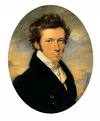


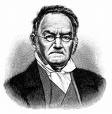




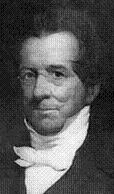


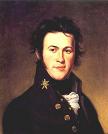











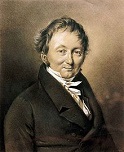


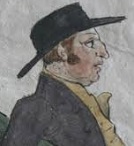



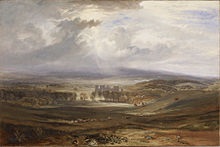

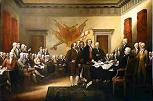
1817 Shit happens, worldwide edition? The big plans of white-is-right Britain to rule Da World with godlike superiority are foiled by a pesky bug that lives in all human shit, especially theirs? The First Cholera Pandemic of the 19th Cent. (ends 1824) (first of six by 1899, plus a 7th in 1961) begins in the Ganges River Delta of India, reaching Calcutta in Sept. and Bombay next year; until now, cholera never left overcrowded shit-filled India, but this time the white-is-right British Navy spreads it to Siam, Bangkok (killing 30K) and Manila in May 1820, Java, Oman, and Anhai, China in 1821, Japan, the Persian Gulf, Baghdad, and the Transcaucasus in 1822, and Astrakhan, Zanzibar, and Mauritius in 1823; luckily, the cold winter of 1823-4 finally stops it. On Jan. 1 Simon Bolivar lands in Barcelona, Venezuela (Orinoco region) with a small force of refugee insurgents from Haiti in an attempt to liberate it from Spain, promising to free the slaves and give confiscated properties to his victorious troops, and on Feb. 16 he scores a quick V against a Spanish royalist army at the Battle of Barcelona, establishes a rev. govt. at Angostura (founded 1764) (renamed Ciudad Bolivar in 1846), then wins a number of military Vs during the year; in 1824 Angostura Bitters are first made by pro-Bolivar German-born military surgeon Johann Gottlieb Benjamin Siegert (1796-1870) to help his patients; meanwhile Chile becomes independent from Spain after a successful revolt led by Argentinian gen. Jose San Martin (1778-1850) and Chilean gen. Bernardo O'Higgins (1778-1842), whose Army of the Andes, equipped with 10K pack mules crosses the Andes from Mendoza, Argentina and on Feb. 12 defeats the Spanish under Rafael Maroto at the Battle of Chacabuco near Santiago, followed on ? at the Battle of Chalchuapa, allowing them to capture Santiago; next year O'Higgins becomes the first pres. (supreme dir.) of the new Repub. of Chile (until 1823), and founds its navy under ex-Royal Navy rear adm. Thomas "Sea Wolf" Cochrane, whose flagship is the O'Higgins; O'Higgins goes on to abolish titles of nobility, support religious toleration, and impose new taxes, pissing-off merchants with protectionist measures. On Jan. 11 Timothy Dwight IV (b. 1752) dies, and Congregationalist minister Jeremiah Day (1773-1867) succeeds him as pres. #9 of Yale College (until 1846). On Jan. 16 the city of Baton Rouge, La. (Fr. "red stick") (founded in 1699 and settled in 1721) (modern-day pop. 229K/830K) on the E bank of the Mississippi River is incorporated, becoming the first U.S. state capital with a 2-word French name (next is Des Moines, Iowa). On Jan. 20 the Portuguese occupy Montevideo, Uruguay. In Jan. Dem.-Repub. candidates Monroe and Tompkins receive 183 electoral votes; the Federals, who don't nominate a candidate get 34 Federalist electoral votes for Rufus King of New York from Mass., Conn., and Delaware (the last Federalist candidate for pres.); "Monroe had the zealous support of nobody, and he was exempt from the hostility of everybody" (Rufus King). In Jan. after a rock is thrown through the glass window of the Prince Regent's coach on the way to the opening of Parliament, it passes the Gagging Acts suspending habeus corpus (until Mar. 1818); in Mar. after the economic depression in England worsens, the March of the Blanketeers from Manchester to London is halted at Stockport; meanwhile the Derbyshire Rising against low wages sees protesters armed with guns and pikes march on Notthingham until the army appears and they flee, after which the leaders are caught and beheaded; Luddite activity soon ceases - I know where you can find one, er, no I don't? On Mar. 4 Westmoreland Count, Va.-born Dem.-Repub. U.S. senator (1790-4), U.S. minister to France (1794-6), Va. gov. #16 (1811), U.S. secy. of war (1814-15), and U.S. secy. of state #7 (since Apr. 6, 1811) James Monroe (1758-1831), AKA "James the Second" (1st = Madison), "James the Lesser", "Last of the Cocked Hats" (still wears a tricorne), "the Era of Good Feelings President" becomes the 5th U.S. pres. (until Mar. 4, 1825) in the 8th U.S. Pres. Inauguration (last of the Va. dynasty, and the last Am. Rev. leader to become pres.), ushering in the Era of Good Feelings, where the Repubs. virtually absorb the Federalist program of nationalism and centralism, and the Federalists become kaput, leaving a 1-party system until Andrew Jackson's actions cause the creation of the Whig Party; Monroe becomes the first to commission official presidential china; on Mar. 4 former N.Y. gov. #4 (1807-17) Daniel D. (Decius?) Tompkins (1774-1825) becomes the 6th U.S. vice-pres. (until Mar. 4, 1825) after delivering his last message to the N.Y. legislature in Jan., causing it to pass a law setting all slaves free on July 4, 1827; Monroe becomes the only 2-term 19th cent. pres. with the same vice-pres. in both terms; First Lady is Elizabeth Kortright Monroe (1768-1830); on Nov. 13 Bladensburg, Md.-born William Wirt (1772-1834) becomes U.S. atty. gen. #9 (until Mar. 4, 1829), going on to last through the admin. of J.Q. Adams and become the first to turn the job into a position of influence. On Apr. 15 the Am. School for the Deaf (originally the Conn. Asylum for the Education and Instruction of Deaf and Dumb Persons) is founded by Mason Cogswell, Laurent Clerc, and Philly-born Thomas Hopkins Gallaudet (1787-1851), son of Peter Wallace Gallaudet, George Washington's personal secy. in Philly, who becomes its first principal, becoming the oldest school for the deaf in the U.S. to survive to modern times; his son Edward Miner Gallaudet goes on to found Gallaudet U. in 1864. On Apr. 28-29 the Rush-Bagot Treaty, negotiated by acting secy. of state Richard Rush and British minister Charles Bagot limits the number of U.S. battleships (revenue cutters) on the Great Lakes to a total of eight; the tradition of an unfortified border (longest in the world) begins. On May 10 English Romantic poet John Keats (1795-1821) writes a letter to Benjamin Robert Haydon telling about how he keeps a bust of Shakespeare beside him while writing, with the soundbyte: "I remember your saying that you had notions of a good Genius presiding over you. I have of late had the same thought - for things which I do half at Random are afterwards confirmed by my judgment in a dozen features of Propriety. Is it too daring to fancy Shakespeare this Presider?" On May 16 the first commercial steamboat service begins; the first showboat leaves Nashville on Oct. 20. On July 12 Pres. Monroe visits Portsmouth, N.H., one-upping Washington's visit of Oct. 31, 1789; meanwhile on July 12 the Columbian Centinel of Boston, Mass. first pub. the phrase "Era of Good Feeling", coined by journalist Benjamin Russell (1761-1845) for the Monroe admin. following his visit there. On July 26 the Ottoman sultan recognizes the new independent principality of Serbia, with capital at Belgrade, and the Second Serbian Uprising (begun 1815) ends with a V and partial autonomy for the Serbs, although they must pay a yearly infidel jizya tax to the sultan, who keeps a garrison in Belgrade until 1867; on Nov. 6 Milos Obrenovic I (1780-1860) is elected prince #1 of Serbia (until June 25, 1839); the Balkans begin breaking out of Muslim rule; too bad, Serbs are mainly Orthodox Catholic, leading to a split with the Roman Catholic Austrians, compounded by the German-Slav thang. In Aug.-Sept. Nizhni Novgorod Fair (transferred from Makaryev after a fire last year) becomes the first held for barter trade with the Orient through Siberia and Turkistan, and it continues to be held at irregular intervals until 1914. On Sept. 29 the Potawatomi Tribe signs a treaty ceding land in Ohio. On Oct. 18 liberal German students hold the Wartburg Festival, burning papers of reactionary leaders and writers, incl. Karl Ludwig von Haller (1768-1854) and August von Kotzebue (1761-1819). On Oct. 31 emperor (since 1780) Kokaku (d. 1840) abdicates in favor of his son Ninko (1800-46) (personal name Ayahito), who becomes Japanese Yamato emperor #120 (until Feb. 21, 1846), bowing to his daddy's wishes to be identified as "tenno", which becomes a custom. After Pindari horsemen begin raiding British territory, and Lord Hasting's troops take them on, the Third Anglo-Maratha (Mahratta) (Pindari) War begins in C India (ends 1818); on Nov. 5 (Diwali or Festival of Lights) the British resident in Pune attacks Baji Rao II, causing the Battle of Khadki, from which the whimp flees, getting captured next Apr. On Dec. 10 "Magnolia State" Mississippi (Miss.) is admitted as the 20th U.S. (slave) state after adopting the Miss. Constitution on Aug. 15; the legislature intially opens in Washington, but moves to Natchez, often meeting in the privately-owned Texada house. King Ferdinand's Organic Laws of 1817 end all special privileges of the Sicilians. The Caucasian War AKA the Russian Conquest of the Caucasus begins (ends 1864). The U.S. Navigation Act of 1817 restricts importation of West Indian produce to U.S. vessels or those belonging to West Indies merchants. Coowescoowe (Cooweescoowee) ("large white bird") (John Ross) (1790-1866), son of a Scottish immigrant and his three-fourths Cherokee wife is elected to the nat. committee of the Cherokee Council, and chosen to reply to the Great White Father of the U.S. commissioners, telling them that they flatly decline to sell Cherokee lands. Rev. John Williams (1796-1839) arrives in Tahiti to spearhead the drive of the London Missionary Society in the Pacific islands, fighting their gods Oro and Ta'aroa, their institution of "foul corpse" slaves that are used as hos and human sacrifices, their weird taboos such as no bananas for women, etc.; Pomare II (1782-1821) of Tahiti becomes a Christian and writes letters praising the white man's god (obviously powerful from the sight of those ships) Jehovah. Seminoles ("runaway" Creek refugees) attack white border settlements in Fla., causing an American counterattack which kills four and disperses the rest across the border into Fla.; Washington is called on to send the army to pursue the offenders into Spanish territory. John Quincy Adams is appointed Secy. of State by Pres. Madison. Louis Philippe returns to France, positioning himself as the future citizen king by putting his children in public schools, ingratiating himself with the middle classes, and gathering bourgeois leaders at his Palais Royal residence in Paris. The French establish dominance in Senegal and begin colonizing it. The British sailing ship HMS Diana sinks in the Malacca Strait as it heads for India carrying a large cargo of Chinese porcelain; it is found in Dec. 1993. Long Island, N.Y. Quaker investor Isaac Wright (1760-1832), Yorkshire, England-born Quaker merchant Jeremiah Thompson (1784-1835) et al. found the Black Ball Line, running four packet ships once a month between New York City and Liverpool, England, becoming the first regularly scheduled shipping route in the U.S., contributing to making New York the dominant port in the U.S.; its flag features a black ball on a red background. An English court authorizes a judicial duel between accused and accuser in a murder case. French pirate Jean Lafitte (1776-1825) is driven from his stronghold in Barataria Bay off the coast of New Orleans, La., and moves to Galveston Island, Tex., taking advantage of the absence of Louis-Michel Aury to found the pirate kingdom of Campeche (Campeachy), burning it to the ground and escaping at night in 1821 after the U.S. Navy gives him an ultimatum, causing rumors that he left buried treasure there; meanwhile Aury captures Old Providence Island in the W Caribbean on July 4, 1818 and sets up a base there; Barataria Bay goes on to become the center of the U.S. shrimping industry. The town of Dun Laoghaire (pr. duhn LAIR-uh) (Gael. "the fort of Laoghaire") 7 mi. SE of Dublin, Ireland is founded as the harbor town of Dunleary, then renamed Kingstown in 1821, and given its current name in 1920. The town of Muskogee, Okla. is founded on the S bank of the Verdigris River in NE Okla. SE of modern-day Tulsa, becoming home to the Muscogee Creeks, one of the Five Civilized Tribes (Cherokee, Chickasaw, Choctaw, Creek, Seminole) of the Mississippi River region of the SW U.S., who are known for keeping slaves, and are forced there after passage of the 1830 Indian Removal Act; in 1872 the Mo.-Kan.-Tex. Railroad reaches it; in 1889 a U.S. federal court is established there; by 1910 it has a pop. of 25K. N.H. finally discontinues tax support for its Congregational churches. The 300-member Zoarite (Society of Separatists of Zoar) religious sect, led by Ulm pipemaker Joseph Baumeler (Bäumeler) (Bimeler) relocates from Wurttemberg, Germany to Zoar inTuscarawas Count, Ohio, buying 5.5K acres and setting up a communal living experiment (ends 1898), at first struggling then benefitting from work on the Ohio and Erie Canal; in 2000 the pop. is 193. The slave trade is abolished on French-held Reunion Island, but the black slaves are not freed until 1948. The U.S. passes a law barring foreign traders from U.S. territories, allowing John Jacob Astor's fur biz to rebound and dominate trading in the Great Lakes area. The 11-ft.-tall Ohio Clock is placed in the U.S. Senate chamber, moving to the S door in 1859 (until ?) and becoming a mystery, incl. was it made in Ohio, and did senators stash whiskey in it? 52-y.-o. Eli Whitney marries the 31-y.-o. granddaughter of Jonathan Edwards - that'll get his cotton gin spinning? Irish poet Thomas Moore (1779-1852), who was appointed registrar of the admiralty court in Bermuda in 1803 and lived in England after hiring a deputy is forced to flee to Paris after being caught embezzling £6K; it comes out all right in the end, as in 1835 he receives a small pension. An article in the Aug. issue of Edinburgh Review coins the derisive term Lake Poets for Samuel Taylor Coleridge (1772-1834), Robert Southey (1774-1843), and William Wordsworth (1770-1850), who all live in the Lake District of Cumberland in NW England in the Cumbrian Mts., which incl. Buttermere Lake, Crummock Water, Derwentwater, Ennerdale Water, and Wast Water, and is known for coal and iron mining and sheep and dairy farming; they are all Romantics but otherwise there is no actual school, other than "sit on your butt and sell literary products rather than dirty your soft hands with manual labor"?; Wordsworth, Wellington et al. like to visit the Ladies of Llangollen (pr. thla-GOTH-len), eccentric Irish bluestockings who live in Plas Newydd House in Llangollen, Denbighshire; meanwhile Wordsworth goes conservative after his early enthusiasm for the ideals of the French Rev. is destroyed by the rise of Napoleon, and friend Sir Walter Scott works on his mind, causing his poetry to go lame? Junius Brutus Booth (1796-1852) becomes a star with his performance of Shakespeare's "Richard III" at the Covent Garden Theatre in London, becoming the rival of Edmund Kean. Franz Schubert begins his Schubertiaden concert parties in the houses of wealthy middle-classers, organized by his new apostles, poet-playwright Franz Grillparzer and singer Johann Michael Vogl. Lutheran and Reformed Churches in Prussia form an Evangelical Union. The Kunsthalle (Kunsthaus) (Ger. "art gallery") opens in Hamburg, Germany to mount art exhibitions. The U. of Ghent is founded in Ghent, Belgium by Netherlands king and Luxembourg grand duke (since Mar. 16, 1815) William I (1772-1843), opening on Oct. 9 with 16 profs. and 190 students, teaching humanities, law, medicine, and science, all in Latin; in 1830 after the Belgian Rev. of 1830, the new Belgian govt. becomes its admin., changing its name to State U. of Ghent; in 1930 it becomes the first Dutch-speaking univ. in Belgium; in 1991 it is granted autonomy, changing its name to Ghent U.; meanwhile William I founds the U. of Liege (Liège) in Liege, Wallonia, Belgium, with French as its official language. The U. of Mich. is founded on Aug. 26 in Detroit, Mich., moving in 1837 to Ann Arbor, Mich., named after two women founders named Ann plus the nice trees?; women are admitted in 1870; the sports teams are called the Wolverines (colors maize and blue). Radical satirical mag. The Black Dwarf is founded by William Hone (1780-1842). The Scotsman begins pub. in Edinburgh (until ?). Christopher North (real name John Wilson) (1785-1854), who inherited a fortune at age 21 then lost it in 1815 joins the staff of Blackwood's Edinburgh Mag., helping it establish a good rep., compiling Noctes Ambrosianae, a series of 71 articles which appear between 1822-35 consisting of literary-political conversations held at Ambrose's Tavern in Edinburgh (repub. 1866); in one he first calls popular Scottish poet James Hogg (1770-1835) "the Ettrick Shepherd". English writer Isaac Disraeli (1766-1848), who married Maria Basevi in 1802 and had four sons, incl. future PM Benjamin Disraeli (b. 1804) has himself and his children baptized in the Anglican Church. Bitburger Brewery is founded in Bitburg, Rhineland-Palatinate, Germany by Johann Wallenborn (1784-1830), rising to the 3rd best-selling brewery in Germany in modern times, with the slogans "Bitte ein Bit" and "Germany's Draft Beer no. 1". Mitre is founded in England to manufacture footballs, becoming the oldest manufacturer in modern times. Architecture: The Library of Congress bldg. is proposed (finished 1888). The U.S. begins construction of the Erie Canal between Buffalo, N.Y. and Albany, N.Y. (finished 1825). The Richmond Turnpike Co. begins operating the steam-powered Nautilus between New York City and Staten Island, captained by John De Forest, brother-in-law of 17-y.-o. Cornelius Vanderbilt (1794-1877) sets up the Staten Island Ferry; in 1838 Vanderbilt buys control, selling it to his brother Jacob Vanderbilt of the Staten Island Railway during the U.S. Civil War (1861-5), which opens in 1860; on July 30, 1871 (1:30 p.m.) the Westfield suffers a boiler explosion while sitting at South Ferry, killing 85 and injuring hundreds, causing Jacob Vanderbilt to be tried and acquitted of murder; by 1900 the fare is 5 cents, rising to 50 cents in 1990, pissing-off Staten Islanders, who vote in 1993 to secede from New York City and help Rudy Giuliani become New York City mayor, finally becoming free on July 4, 1997. After the sculptures that Napoleon deported to Paris are returned, the Braccio Nuovo (New Wing) of the Vatican Museum in Rome is begun (finished 1822). Sir Arthur Wellesly purchases Apsley House in the SE corner of Hyde Park, London from his brother Richard, improving it with the Waterloo Gallery and a 11'4" nude statue of his rival Napoleon. Inventions: On June 12 Karlsruhe-born German forest official Karl Freiherr von Drais (Karl Friedrich Christian Ludwig Freiheirr Drais von Sauerbronn) (1785-1851) demonstrates the ballbreaker Draisienne (AKA Laufmaschine, Draisine, Dandy Horse) in Mannheim, a 2-wheeled bicycle sans pedals that you walk on, becoming the first 2-wheeler vehicle, archetype of the bicycle; too bad, after it catches on and riders begin using the sidewalks and harassing pedestrians, it is banned in Germany, England, U.S., and Calcutta. The Apollonicon, a 5-keyboard instrument operated by five musicians that sounds like a symphony orchestra makes it debut in London. The first cartogram and the first statistical map are pub. by Baron Pierre Charles Francois Dupin (1784-1873) of France, who goes on to pub. the first chloropleth map in 1826, showing the distribution of illiteracy in France using shadings. Jean Baptiste Julien d'Omalius d'Halloy (1873-1875) pub. the first map clearly showing the geologic strata. Anthony A. Plantson (1774-1837) invents the dental plate - too late for Washington to plant some on? Science: The Hessian Fly (AKA Barley Midge), archenemy of wheat, barley, and rye is first described by Am. naturalist Thomas Say (1787-1834). Swedish chemists John August Arfwedson and Jons Jakob Berzelius discover the element lithium (Li) (#3), the lightest metal - did they or didn't they have the first 7-Up? Italian archeologist Giovanni Battista Belzoni (1778-1823), sent to Egypt in 1815 to construct a hydraulic engine for Mehmet Ali to raise the Nile clears away the sand from the entrance to Abu Simbel and discovers the tomb of Seti I, the finest royal tomb, causing it to become known as "Belzoni's Tomb". Swedish physician-chemist Jons (Jöns) Jacob Berzelius (1779-1848) discovers the chemical non-metal element Selenium (Se) (#34), named after the Moon after noting similarities with tellurim (named after the Earth) without knowing that its electrical conductivity varies with the intensity of sunlight (makes glass red too). Austrian Roman Catholic priest-mathematician Bernhard (Bernardus Placidus Johann Nepomuk) Bolzano (1781-1848), proves the Intermediate Value Theorem. After trying it in 1805 with the carotid artery, an again in 1808 with the iliac artery, English surgeon Sir Astley Paston Cooper (1768-1841) performs the first operation of tying the abdominal aorta for aneurism. French scientist Pierre Louis Dulong discovers the oxides of phosphorus. After establishing the first theory of electrolysis n 1806, Leipzig, Germany-born chemist Baron Christian Johann Dietrich Theodor von Grotthuss (1785-1822) pub. the Principle of Photochemical Activation, that only the light absorbed by a substance is used in producing a photochemical change (such as a photograph); after nobody listens, English-born Am. scientist John William Draper (1811-82) pub. it in 1842, causing it to be called the Grotthuss-Draper Law. French chemists Pierre Joseph Pelletier (1788-1842) and Joseph Bienaime (Bienaimé) Caventou (1795-1887) isolate chlorophyll and emetine from ipecacuanha. French chemist Pierre-Jean Robiquet determines the chemical strucutre of the opium alkaloid narcotine. Fredrich Strohmeyer discovers the element cadmium (Cd) (#48) in zinc ore (L. cadmia, Gr. Kadmeia). English physicist Thomas Young (1773-1829) proposes the Transverse Wave Theory of Light. Nonfiction: Philipp August Bockh (1785-1867), The Public Economy of Athens. Richard Carlile (1790-1843), Political Litany; an imitation of William Hone's Parodies, disguised attacks on church and state; pisses-off the British govt., which gives him 18 weeks. William Cobbett (1763-1835), Paper Against Gold, the History and Mystery of the Bank of England. Samuel Taylor Coleridge (1772-1834), Biographia Literaria; coins the term Esemplastic, meaning unifying. Georges Cuvier (1769-1832), Le Règne Animal (The Animal Kingdom) (4 vols.); his magnum opus, a summation of his life's work on comparative anatomy, containing apparent support for evolutionary change for the extinct mammoths et al., making a fan of Charles Darwin, although Cuvier rejects the idea of evolution in favor of cyclical destruction-creation events via deluges; also makes fans of Richard Owen and Louis Agassiz. William Temple Franklin (1760-1823) (ed.), The Private Life of the Late Benjamin Franklin [1706-90], LL.D., Originally Written by Himself, and Now Translated from the French (London); his grandson inherited his important papers then returned to England in 1792. William Hazlitt (1778-1830), Characters in Shakespeare's Plays. Georg Wilhelm Friedrich Hegel (1770-1831), The Philosophy of Spirit; Encyclopedia of the Philosophical Sciences; rev. ed. pub. in 1827, 1830. H.F.R. de Lamennais (1782-1854), Essai sur l'Indifference en Matiere de Religion (1817-21); defends lady and the tramp, er, papal and royal authority before he flip-flops and turns liberal in 1830? Juan Antonio Llorente (1756-1823), A Critical History of the Inquisition in Spain; digs up all the macabre fun and games for the last three cents. - the first Believe It or Not? James Parkinson (1755-1824), An Essay on the Shaking Palsy; first description of Parkinson's disease (paralysis agitans). Jean Paul (1763-1825), Political Lenten Sermons. David Ricardo (1772-1823), On the Principles of Political Economy and Taxation; explains the Law of Comparative Advantage, which makes it advantageous for England to trade cloth with Portugal in return for wine even though Portugal can produce both more cheaply; also the Law of Differential Rent, how wages seek the minimum subsistence level; also shows how the social classes have conflicting interests. Thomas Rickman (1776-1841), An Attempt to Discriminate the Styles of English Architecture, from the Conquest to the Reformation; bestseller; the first accurate history of English medieval Gothic ecclesiastical architecture, which becomes a std. work., causing the passage of the Second Church Building Act in 1818, which creates a demand for his services. James Riley (1777-1840), Sufferings in Africa (Authentic Narrative of the Loss of the American Brig Commerce by the Late Master and Supercargo James Riley); about how his U.S. merchant ship Commerce was shipwrecked off the coast of Western Sahara in Aug. 1815, and him and the crew captured by black Sahrawi natives, who kept them as white slaves, horribly mistreating them incl. forcing them to drink their own and camel urine; freaks out Abraham Lincoln, turning him against black slavery, causing him to claim it along with the Bible and Pilgrim's Progress as the most influential books of his life. Karl Ritter (1779-1859), Geographie in ihrer Beziehung zu Natur und Geschichte (Geography in Its Relationship with Nature and History). Comte Henri de Saint-Simon (1760-1825), L'Industrie, ou Discussions Politiques, Morales et Philosophiques (4 vols.) (1817-18); aristocrat who joined the French Rev., got rich, then was stolen blind by his partner, causing him to go into prophet mode proposes a new technocratic socialist society ruled by men of science and industrialists, causing a sensation and gaining him converts. Percy Bysshe Shelley (1792-1822) and Mary Shelley (1797-1851), History of a Six Week's Tour Through a Part of France, Sqitzerland, Germany, and Holland: With Letters Descriptive of a Sail Round the Lake of Geneva and the Glaciers of Chamouni; Romantic travel narrative. E. Sibley, Illustration of the Celestial Art of Astrology. Robert Southey (1774-1843), Wat Tyler; it is pirated, causing a seminal moment in British copyright history? Stendhal (1783-1842), Rome, Naples and Florence in 1817 (first work); his description of getting dizzy when exposed to a large amount of art in one place becomes known as the Stendhal Syndrome. Parson Mason Locke Weems (1759-1825), The Life of William Penn. Joseph Emerson Worcester (1784-1865), A Geographical Dictionary, or Universal Gazetteer, Ancient and Modern. Music: Muzio Clementi (1752-1832), Gradus ad Parnassum (piano studies). Heinrich Marschner (1795-1861), Titus (opera); Der Kiffhauser Berg (opera). Gioacchino Rossini (1792-1868), La Gazza (opera) (La Scala, Milan). Franz Schubert (1797-1828), Der Tod und Das Madchen (Death and the Maiden) (D531); An die Musik, D547 (lyrics by Schober); Die Forelle (The Trout), D550. Art: John Constable (1776-1837), Flatford Mill. John Flaxman (1755-1826), Maternal Love (sculpture). Caspar David Friedrich (1774-1840), Wanderer Above the Sea of Fog (Mist); the face is not visible, leaving the viewer guessing. Theodore Gericault (1791-1824), Race of the Riderless Horses in Rome. Bertel Thorvaldsen (1770-1844), A Shepherd Boy (1817-25). John Trumbull (1756-1843), The Declaration of Independence; 12 ft. x 18 ft.; shows the Committee of Five presenting the draft to the Second Continental Congress, with Thomas Jefferson and Benjamin Franklin in front, and John Adams, Roger Sherman, and Robert R. Livingston behind; ends up on the $2 bill. Plays: Clemens Brentano (1778-1842), Victoria. Firmin Didot (1764-1836), La Mort d'Annibal (tragedy). Franz Grillparzer (1791-1872), Die Ahnfrau (The Ancestress) (tragedy); makes him a star. Charles Robert Maturin (1782-1824), Bertram, or the Castle of St. Aldobrand (Drury Lane Theatre); backed by Lord Byron. Thomas Moore (1779-1852), Lalla Rookh. Poetry: Lord Byron (1788-1824), So, We'll Go No More a Roving (Feb. 28) (pub. in a letter to Thomas Moore); Manfred, written after his escape to Switzerland about Manfred's forbidden relationship with Augusta, er, Astarte; The Lament of Tasso. Samuel Taylor Coleridge (1772-1834), Sibylline Leaves. William Godwin (1756-1836), Mandeville. John Keats (1795-1821), Poems; incl. On First Looking into Chapman's Homer, To One Who Has Been Long in City Pent, I Stood Tip-Toe upon a Little Hill, Sleep and Poetry, which defends Romantic poet Leigh Hunt and disses Romantic poet Lord Byron. Thomas Moore (1779-1852), Lalla Rookh. Percy Bysshe Shelley (1792-1822), Mont Blanc: Lines Written in the Vale of Chamouni; Laon and Cyntha (The Revolt of Islam). Novels: Clemens Brentano (1778-1842), Geschichte vom Braven Kasperl und dem Schonen Annerl. Maria Edgeworth (1767-1849), Ormond. E.T.A. Hoffmann (1776-1822), Nachtstucke (2 vols.). Sir Walter Scott (1771-1832), Rob Roy; about Scottish hero Robert Roy MacGregor (1671-1734), adding to his fame; Glasgow Judge Bailie Nicol Jarvie, who comes to the aid of Frank Obaldistone. Robert Southey (1774-1843), Wat Tyler: A Dramatic Poem. Births: Am. physician (founder of the AMA) Nathan Smith Davis (d. 1904) on Jan. 9 near Greene, N.Y. Am. Civil War Confederate Lt. Gen. ("Old Bald Head") Richard Stoddert "Dick" Ewell (d. 1872) on Jan. 25 in Georgetown, Washington, D.C. French Socialist experimenter Jean Baptiste Andre Godin (d. 1888) on Jan. 26 in Esqueheries (Aisne). Am. Tex. Ranger Capt. John Coffee "Jack" Hays (d. 1883) on Jan. 28 in Wilson County, Tenn.; relative of John Coffee (1772-1833) and John Coffee Hays (1817-83); great-nephew of Pres. Andrew Jackson. English painter (Christmas card inventor) John Callcott Horsley (d. 1903) on Jan. 29 in London; son of William Horsley (1774-1858). Charles-Francois Daubigny (d. 1878) on Feb. 15 in Paris; son of a painter of miniatures; father of Karl Pierre Daubigny (1846-86). Am. Civil War Confed. brig. gen. (Freemason) Lewis Addison "Lo" Armistead (d. 1863) on Feb. 18 in New Bern, N.C. Dutch king (and grand duke of Luxembourg) (1849-90) William III (d. 1890) on Feb. 19 in Brussels; son of William II (1792-1849) and Anna Paulowna (1795-1865) (daughter of Peter I of Russia and Sophia Dorothea of Wurttemberg); marries first cousin Sophie, daughter of William I of Wurttemberg, then gets into royal cheating, causing the New York Times to call him "the greatest debauchee of the age". English "Hope", "Love and Life" Symbolist painter-sculptor George Frederic Watts (d. 1904) on Feb. 23 in Marylebone, London. Hungarian "Toldi Trilogy" poet ("the Shakespeare of Ballads") Janos Arany (d. 1882) on Mar. 2 in Salonta. English archaeologist Sir Austen Henry Layard (d. 1894) on Mar. 5 in Paris; of Huguenot descent; knighted in 1878. Am. Civil War Confederate Gen. Braxton Bragg (d. 1876) on Mar. 22 in Warrenton, Warren County, N.C.; brother of Thomas Bragg (1810-72). French glider pilot Jean Marie Le Bris (d. 1872) on Mar. 25 in Concarneau, Brittany. Italian lit. critic ("Founder of Modern Italian Literary Criticism") Francesco De Sanctis (d. 1883) on Mar. 28 in Morra Irpina, Campania. British radical secularist writer-ed. (atheist-agnostic) George Jacob Holyoake (d. 1906) on Apr. 13 in Birmingham; coiner of the terms "secularism" (1851) and "jingoism" (1878). Swiss chemist Jean Charles Galissard de Marignac (d. 1894) on Apr. 24 in Geneva; discoverer of ytterbium (1878); co-discoverer of gadolinium (1880). French Franco-Prussian War diplomat Vincent, Count Benedetti (d. 1900) on Apr. 29 in Bastia, Corsica. Am. Campbell's Soup co-founder Joseph Albert Campbell (d. 1900) on May 15 in Bridgeton, N.J.; partner of Abraham Anderson (1829-1915). Australian explorer John Ross (d. 1903) on May 17 in Bridgend, Scotland; emigrates to Australia in 1837. German Young Germany poet Georg Friedrich Rudolph Theodor Herwegh (d. 1875) on May 31 in Stuttgart; educated at the U. of Tubingen. Am. steam engine inventor George Henry Corliss (d. 1888) on June 2 in Easton, N.Y. U.S. Civil War Union Brig. Gen. Thomas Maley Harris (d. 1906) on June 17 in Wood County, Va. (W. Va.). Am. Mormon leader George A. (Albert) Smith (d. 1875) on June 26 in Potsdam, N.Y.; first cousin of Joseph Smith Jr. (1805-44). English botanist Sir Joseph Dalton Hooker (d. 1911) on June 30 in Halesworth, Suffolk. German naturalist (atheist)August Christoph Carl Vogt (d. 1895) on July 5 in Hesse; educated at the U. of Giessen, and U. of Bern. Swiss anatomist-pathologist Rudolph Albert von Kolliker (Kölliker) (d. 1905) on July 6 in Zurich. Am. agriculturist (founder of Greeley, Colo.) Nathanial Cook "Nathan" Meeker (d. 1879) on July 12 in Euclid, Ohio. Am. "different drummer" Transcendentalist writer ("the original American dropout") Henry David Thoreau (nee David Henry Thoreau) (d. 1862) on July 12 in Concord, Mass.; educated at Harvard U.; changes his name after finishing college, but never legally. English railway engineer Sir John Fowler, 1st Baronet (d. 1898) on July 15 near Sheffield; created baronet in 1890. Am. Civil War nurse "Old Mother" Mary Ann Ball Bickerdyke (d. 1901) on July 19 in Knox County, Ohio; moves to Galesburg, Ill. in 1856. U.S. Army surgeon-gen. Joseph K. Barnes (d. 1883) on July 21 in Philadelphia, Penn.; educated at Harvard U., and U. of Penn. Am. Mormon leader Benjamin Winchester (d. 1901) on Aug. 6. Portuguese trader-explorer (in Angola) Antonio Francisco Ferreira da Silva Porto (d. 1890) on Aug. 24 in Porto. English caricaturist John Leech (d. 1864) on Aug. 29 in London. English botanist Richard Spruce (d. 1893) on Sept. 10 near Ganthorpe (near Castle Howard), Yorkshire. German "Immensee" novelist Hans Theodor Wolsen Storm (d. 1888) on Sept. 14 in Husum, Schleswig-Holstein; born in "the grey town by the grey sea". Spanish statesman, realist poet and philosopher Ramon Maria de la Mercedes de Campoamor y Campoosorio (d. 1901) on Sept. 24 in Navia, Asturias; educated at the U. of Santiago; inventor of the dobora ("dramatic humorada"). Union Civil War Confed. gen. Bushrod Rust Johnson (d. 1880) on Oct. 7 in Belmont County, Ohio. Dutch Buys-Ballot's Law meteorologist-chemist Christoph Hendrik Diederik (Christophorus Henricus Diedericus) Buys Ballot (d. 1890) on Oct. 10 in Kloetinge. English "Our American Cousin" dramatist-critic-writer Tom Taylor (d. 1880) on Oct. 19 in Bishopwearmouth, Sunderland; educated at Trinity College, Cambridge U. German economist Wilhelm Georg Friedrich Roscher (d. 1894) on Oct. 21 in Hanover; educated at Gottingen U.; father of Wilhelm Heinrich Roscher (1845-1923); coiner of the term "enlightened absolutism" (1847). Am. Dem. politician James William Denver (d. 1892) (OE "green valley") on Oct. 23 near Winchester, Va.; namesake of Denver, Colo. French lexicographer-grammarian-encyclopedist Pierre Athanase Larousse (d. 1875) on Oct. 23 in Toucy, Yonne. French oleomargarine inventor Hippolyte Mege-Mouries (Mège-Mouriés) (d. 1880) on Oct. 24 in Draguignan. Persian Baha'i Faith founder Baha'u'llah (Mirza Husayn Ali Nuri) (Mírzá ?usayn-`Alí Núrí) (d. 1892) on Nov. 12 in Tehran; gets his divine revelation in 1852. British geologist Osmond Fisher (d. 1914) on Nov. 17; author of the first textbook on geophysics. Am. Civil War Union gen. Edward Richard Sprigg Canby (d. 1873) on Nov. 9 in Piatt's Landing, Ky. Am. atty.-diplomat John Bigelow (d. 1911) on Nov. 25 in Maiden-on-Hudson, N.Y.; educated at Union College; father of John Bigelow Jr. (1854-1936) and Poultney Bigelow (1855-1954). Am. Civil War Confed. Col. Thomas (Thompson) Saltus Lubbock (d 1862) on Nov. 29 in Charleston, S.C.; brother of Francis R. Lubbock (1815-1905). French mathematician Eugene (Eugène) Prouhet (d. 1867). Japanese samurai Shimazu Hisamitsu (d. 1887) (AKA Shimazu Saburo) on Nov. 28 in Kagoshima Castle. German #1 "History of Rome" historian (pioneer of epigraphy) Christian Matthias Theodor Mommsen (d. 1903) on Nov. 30 in Garding, Schleswig; educated at the U. of Kiel; son of Jens Mommsen (1783-1851) and Sophie Elisabeth Krumbhaar (1792-1855); husband of Marie Reimer (1832-1907), with whom he spawns a multi-generational family of German historians; father of Marie Mommsen (1855-1936), Karl Mommsen (1861-1922), Ernst Mommsen (1863-1930), and Hans Georg Mommsen (1873-1941). German Protestant historian Heinrich Karl Ludolf von Sybel (d. 1895) on Dec. 2 in Dusseldorf. Am. "The Mental Cure" New Thought leader Warren Felt Evans (d. 1889) on Dec. 23 in Rockingham, Vt.; pupil of Phineas Quimby. Am. poet-ed.-publisher James Thomas Fields (d. 1881) on Dec. 31 in Portsmouth, N.H.; ed. of Atlantic Monthly (1861-70). German philosopher-physician Rudolf Hermann Lotze (d. 1881) in Bautzen; educated at the U. of Leipzig. Danish #1 Romantic composer Niels Wilhelm Gade (d. 1890) in Copenhagen. Am. Ferrel Cell meteorologist-oceanographer William Ferrel (d. 1891) in Fulton County, Penn.; grows up in W. Va.; educated at Marshall College. Persian Baha'i faith founder Mirza Husayn Ali Nuri (Bahau'llah) ("glory of God") (d. 1892) in Tehran. English classical Greek scholar Benjamin Jowett (d. 1893) (pr. "JOE-it") in Camberwell; educated at Oxford U. Spanish poet-playwright Jose Zorrilla y Moral (d. 1893). English marine painter Sir Oswald Walters Brierly (d. 1894) in Chester; knighted in 1885. Am. black leader-journalist-statesman-lecturer Frederick Douglass (Frederick Augustus Washington Bailey) (d. 1895) in Md.; born a blackass slave boy, and works his way up to Mister? Hungarian chemist Janos Irinyi (d. 1895); inventor of the silent match. English psychiatrist-reformer Sir John Charles Bucknill (d. 1897) in Market Bosworth, Leicestershire; educated at Rugby School, and Univ. College, London. Japanese ceramic maker Keinyu XI (d. 1902). Deaths: French astronomer Charles Messier (b. 1730) on Apr. 12. Am. Rev. leader Thomas McKean (b. 1734) on June 24 in Philadelphia, Penn. French-Am. statesman Pierre Samuel du Pont de Nemours (b. 1739) on Aug. 7 in Greenville, Del. German chemist Martin Heinrich Klaproth (b. 1743) on Jan. 1. Scottish physician William Saunders (b. 1743). German archbishop Karl von Dalberg (b. 1744) on Feb. 10. Italian architect Giacomo Quarenghi (b. 1744) on Mar. 2 (Feb. 18 Old Style) in St. Petersburg, Russia. Polish leader Gen. Thaddeus Kosciuszko (b. 1746) on Oct. 15 in Solothurn, Switzerland. British adm. Sir John Thomas Duckworth (b. 1847) on Aug. 31. German geologist Abraham Gottlob Werner (b. 1749) on June 30. Irish orator John Philpot Curran (b. 1750) on Oct. 14: "Eternal vigilance is the price of liberty". Am. educator Timothy Dwight IV (b. 1752) on Jan. 11 in Cornwall, Conn. (prostate cancer). French restaurauteur Antoine Beauvilliers (b. 1754) on Jan. 31 in Paris; buried in Pere-Lachais Cemetery. English "Mutiny on the Bounty" Capt. William Bligh (b. 1754) on Dec. 7 on Bond St., London; his tomb in St. Mary's, Lambeth is topped with a breadfruit. Nigerian leader Usuman dan Fodio (b. 1754). French marshal Andre Massena (b. 1758) on Apr. 4 in Paris. Am. statesman Alexander James Dallas (b. 1759). British mineralogist Rev. William Gregor (b. 1761) on June 11 in Creed, Cornwall. Am. painter Edward Savage (b. 1761) on July 1 in Princeton, N.J. French composer Etienne Mehul (b. 1763). French writer Madame de Stael (b. 1766). Serbian leader Karadorde Petrovic (b. 1768) on July 24 in Radovanjski, Lug. English "Pride and Prejudice" novelist Jane Austen (b. 1775) on July 18 in Winchester (Addison's Disease or Hodgkin's Lymphoma); leaves the unfinished novel Sanditon (The Brothers) (pub. 1925); Mark Twain later writes that he'd like to "dig her up and beat her over the skull with her own shin-bone": "One half of the world cannot understand the pleasures of the other." Am. businessman Francis Cabot Lowell (b. 1775) on Apr. 10. Am. Va. gov. William Claiborne (b. 1775) on Dec. 30.





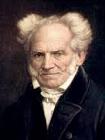













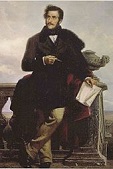

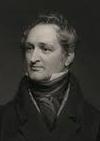







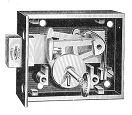



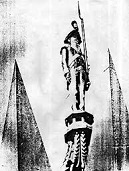
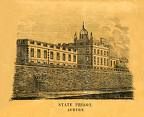
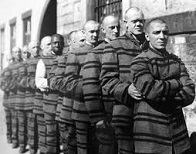
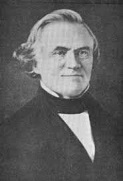
1818 On Jan. 1 after Pres. James Monroe and his wife Eliza moved back into the restored White House in Oct., it is officially reopened. On Feb. 5 Charles XIII (b. 1748) dies, and Marshal Jean Jules Bernadotte of France becomes King Charles XIV John (Carl John) (1763-1844) of Sweden-Norway (until Mar. 8, 1844), establishing a new royal dynasty which has an uneasy relationship with its artificially united partner Norway. On Mar. 16 5K Spanish troops under gen. Mariano Osorio (1777-1819) defeat 7K rebels in Chile under Jose de San Martin and Bernardo O'Higgins at the Second (Surprise) Battle of Cancha Rayada (first in 1814) near Talca, causing them to have to retreat and regroup in Santiago, scale the Andes, then get revenge on Apr. 5 at the Battle of Maipu (Maipú) near the Maipo River in the Andes with the help of the Virgin of Carmel, winning Chile's independence from Spain. In Mar. Simon Bolivar is defeated at the Battle of Puerto Cabello in N Venezuela, causing him to regroup, gather his scattered forces, and s ecure the services of a foreign legion composed of British and Irish soldiers of fortune. On Apr. 4 Congress decides on the design of the U.S. flag, fixing the number of stripes at 13, with one star for each state, the stars for each new state to be added on the first July 4 after its admission to the Union; the first such flag, made by the wife of the designer, U.S. naval officer Samuel Chester Reid is flown at the U.S. Capitol on Apr. 12. On Apr. 7 men's clothier Brooks Brothers (originally H. & D.H. Brooks & Co.) is founded at the NE corner of Catherine and Cherry Sts. in Manhattan, N.Y. by Henry Sands Brooks (1772-1833), becoming the oldest men's clothier to survive to modern times, with their suits becoming a std. among businessmen; the motto is: "To make and deal only in merchandise of the finest body, to sell it at a fair profit, and to deal with people who seek and appreciate such merchandise"; in 1833 his sons Edward, Elisa, Daniel, and John inherit the co., and in 1850 give it the current name, adopting the Golden Fleece trademark, emblem of the 15th cent. Knights of the Golden Fleece, using cotton harvested by slaves, going on to introduce the ready-to-wear suit in 1849 and button-down collar in 1896, the Ivy League sack suit in 1895, English foulard ties in the 189s, Harris Tweed in 1900, Madras fabric from India in 1902, the Shetland sweater in 1904, the polo coat about 1910, wash-and-wear shirts made of Brooksweave (blend of Dacron, polyester, and cotton) in 1953, argyles in 1957, no-iron 100% cotton dress shirts in 1998, outfitting 41 of 45 U.S. presidents incl. Ulysses S. Grant, Theodore Roosevelt, Herbert Hoover, JFK, Richard Nixon, Gerald R. Ford, George H.W. Bush, Bill Clinton, and Barack Obama; Abraham Lincoln, who is wearing one of their suits when he is assassinated, causing them to stop making off-the-rack black suits until 2003; too bad, during the U.S. Civil War they sell shoddy merchandise to the U.S. govt.; in 1935-46 the co. is headed by Winthrop Holly Brooks, who sells it to Julius Garfinckel & Co.; makes loyal customers of Hollyweird stars Fred Astaire, Barry Fitzgerald, Nina Foch, Clark Gable, Cary Grant, and Maria Riva, as well as TV execs Fred Friendly and Edward R. Kenefick; Ralph Lauren starts as a co. salesmen, going on to unsuccessfully try to trademark the Polo label; in July 2020 due to changing fashions and the COVID-19 crisis, it files for bankrupcy. The diplomatic achievement of the Monroe admin. that the cameras missed? On Apr. 16 the Rush-Bagot Agreement forming an unarmed U.S.-Canadian border at the 49th parallel is ratified by Congress; Pres. Monroe proclaims disarmament on the Great Lakes and Lake Champlain; on Oct. 20 the U.S. signs the Convention of 1818 with Great Britain, establishing the U.S.-Canadian border at the 49th parallel, from Lake of the Woods to the crest of the Rocky Mountains, and joint occupancy of the disputed Oregon country for 10 years (extended indefinitely in 1827); American fishing rights off the coasts of Labrador and Newfoundland are confirmed. On Apr. 28 the British Order of St. Michael and St. George is instituted by the Prince Regent (George IV). Jackson v. Seminoles: a blowout by halftime? Early in the year Secy. of War Calhoun authorizes a campaign against the Seminoles, and summons Gen. Andrew Jackson from Nashville to take command, giving him orders to pursue them into Spanish territory but not attack any Spanish post; Jackson writes Pres. Monroe saying that he could wind the whole thing up in sixty days if the latter gives an unofficial word through Tenn. Rep. John Rhea, and Jackson claims to receive such a letter, which Madison officially denies, but the former destroys it and goes on with what he was going to do anyway, pushing E through Fla. with a party of Tenn. volunteers and friendly Creeks, taking a Spanish post, and destroying Seminole settlements; he captures and on Aug. 26 executes two British intriguers, trader Alexander George Arbuthnot (b. 1748) and ex-British officer Robert Christie Ambrister; after pacifying the region from the Appalachicola to the Suwannee, on Apr. 18 the First Seminole War is ended with Indian defeat at the Battle of Suwanna; Jackson then goes W and seizes Pensacola, then returns to Nashville in June, only to find that his exploits have angered not only Madrid but Washington; Calhoun disciplines Jackson for disregard of orders, which causes bad blood between them. On May 26 Bavaria receives a constitution. On July 4 Congress authorizes a new U.S. flag with 20 stars (design #3), which now incl. the states of Tennessee, Ohio, Louisiana, Indiana, and Mississippi - the first change since 1795 - and Illinois misses it by a nose? On Aug. 26 "Prairie State" Illinois (Ill.) adopts a Ill. Constitution, and is admitted as the 21st U.S. (free) state on Dec. 3. On Sept. 16 at Ellisburgh, N.Y. a gentleman witnesses a "hairy animal" which runs away, becoming the first Bigfoot sighting? On Oct. 12 "nutmeg state" Conn. adopts a new constitution. On Oct. 18 the U. of Bonn (originally the Rhein U.) is founded by Frederick William III as the successor to the Kurkolnische (Kurkölnische) Bonn (founded in 1777); alumni incl. Frederick III, Heinrich Heine, Friedrich Nietzsche, Karl Marx, Konrad Adenauer, Joseph Schumpeter, Prince Albert, and Pope Benedict XVI. On Oct. 19 the U.S. signs a treaty with the Chickasaw, one of the Five Civilized Tribes of the SE U.S. (Cherokee, Choctaw, Creek, Seminole); they are all forcibly removed to Indian Territory in Okla. by 1842. The allies evacuate their troops from France. The Treaty of Vienna gives Malacca (taken 1811) back to the Dutch. After a civil war between two native factions, Haitian-born mulatto Jean-Pierre Boyer (1776-1850) becomes pres. of the Repub. of Haiti (until 1843), bringing all of Haiti and Santo Domingo under his rule by 1821. Prussia abolishes internal customs. The dominions of the Holkar of Indore, the Rajput States and Poona (Pune) come under British control. Greek-born gen. Ibrahim Pasha (1789-1848), adopted son of Mehmet Ali destroys the Wahhabi capital of Deriye (Dariyah) after a long siege, and captures Wahhabi leader (since 1814) Abdullah ibn Saud, who is taken to Constantinople and beheaded, and his head thrown into the Bosphorus. Afghanistan PM Fath Khan is assassinated by Mahmud Shah's jealous son Kamran, causing a badal (vendetta), during which Dost Muhammad, brother of Fath Khan drives Mahmud Shah out of Kabul to Herat, which he rules until his 1829 death. U.S. ports are closed to all British vessels arriving from a colony that is legally closed to vessels of the U.S. (i.e., the West Indies). Gakpe overthrows his mean cruelmad brother Adandozan (ruled since 1797) and becomes Ghezo (-1858), king #9 of Dahomey (Benin) in W Africa (until 1858), going on to put clothes on his 4K naked Amazon warriors and upgrade his army with guns and sabers; his symbol is a clay jar sieve to emphasize how everybody has to put their hand in to plug up the holes. The Cumberland Road reaches Wheeling, Va. on the Ohio River. Solomon Juneau (1793-1856) arrives in Wisc., and organizes and becomes the first mayor of Milwaukee in 1846. British explorers Sir John Ross (1777-1856) and Sir William Edward Parry (1790-1855) launch twin expeditions to Baffin Bay. Conn. discontinues tax support for its Congregationalist churches. August von Schlegel is appointed prof. of Indian languages at Bonn. Georg Wilhelm Friedrich Hegel succeeds Johann Fichte (d. 1814) as prof. of philosophy at Berlin. Lord Byron swims the Venice Canal. By this year composer Ludwig van Beethoven (b. 1770) is deafy deaf deaf, and all conversation with him is done with written notes - what? Franz Schubert becomes summer music teacher to the three daughters of Count Johann Esterhazy at Zelasz, his estate in W Hungary. Peeping on Pepys? The Master of Magdalene College discovers six vols. by Samuel Pepys (1633-1703) in the college library, and gives them to former foreign secy. Lord Grenville for decipherment; he gives them to Magdalene student John Smith (later rector of Baldock in Hertfordshire), who finally decodes the cipher in 1822; they turn out to be his diary for the years 1660-9, and are first pub. in 1825. The non-conformist Liberal Manchester Observer newspaper is founded in Manchester, England to push a radical pro-labor agenda of reallocating rotten and closed borough Parliamentary seats to industrial towns incl. Manchester; it is closed by the govt. in 1821. English Quaker educator Joseph Lancaster (1778-1838) visits the U.S. and Canada promoting his Lancasterian (Monitorial) System of primary school ed., based on Andrew Bell's system, in which older students help younger students to take the load off the adults - like Eddie and Wally teach the Beaver? Breck's begins shipping tulip bulbs from Holland. Dalhousie U. in Halifax, N.S. Canada is founded by Nova Scotia gov. the 9th earl of Dalhousie using money acquired from duties collected during the occupation of parts of Maine in the War of 1812; it is open to all regardless of class or creed and "founded on the principles of religious tolerance", becoming of the few Canadian univs. founded on secular principles. Saint Louis U. in St. Louis, Mo. is founded by the Jesuits. Russian Count Serge Uvarov (1786-1855) becomes pres. of the Russian Academy of Sciences (until 1855), going to be appointed education minister in 1833-49, from which pulpit he preaches the official imperial ideology of "Orthodoxy, Autocracy, and Nationality", even though personally he is a liberal atheist who prefers French-German lit. over Russian? - financing available? German writer August Friedrich Ferdinand von Kotzebue (1761-1819), who was Russian consul gen. in Konigsberg in 1817 founds Literarisches Wochenblatt (Literary Weekly) in Weimar to fight liberal ideas, then moves with it to Mannheim. French philosopher Auguste Comte (1798-1857), a graduate of the Ecole Polytechnique where he acquired a knowledge of his philosophy of Saint-Simonism meets his hero, ruined aristocrat Comte Henri de Saint-Simon (1760-1825) in Paris, becoming his secy. (until 1824), and next year they begin pub. L'Organisateur, with Comte founding the discipline of Sociology and coining the term. The Farmer's Almanac is founded in Morristown, N.J. by David Young and Jacob Mann; in 1851 Samuel Hart Wright succeeds Young, and is succeeded in 1875 by his son Berlin Hart Wright; in 1934 Ray Geiger becomes ed., followed in 1994 by his son Peter Geiger; each new ed. is released in Sept., and covers 16 mos., covering seven U.S. climatic zones using a "top secret mathematical and astronomical formula, that relies on sunspot activity, tidal action, planetary position and many other factors"; the forecaster is named Caleb Weatherbee; 80% forecast accuracy is claimed by the publishers, but meteorologists regard it ias pseudoscience. 23-y.-o. British poet John Keats (b. 1795) falls in love with and gets engaged to Fanny Brawne (1800-65), but keeps it a secret, exchanging love letters which become famous - a lot of men have that problem? J. Henry Schroder & Co. is founded in London to guarantee bills of exchange, founding merchant banking, and eventually becoming Citigroup. Sports: The first prof. horse race in the U.S. is held. Architecture: Auburn Prison (later Auburn Correctional Facility in 1970) in Auburn, N.Y. opens on land that once housed a Cayuga village, becoming the 2nd state prison in N.Y. after Newgate, becoming known for the Auburn (New York) System of solitary confinement, stripey uniforms, lockstep, silence, and harsh labor in congregate workshops, created by warden #2 (1821-25) Capt. Elam Lynds (1784-1855), which he brings with him to Sing Sing in 1825-30; in 1848 the Copper John statue of an Am. Rev. War statue is mounted atop the facility; too bad, it has a big stiff dong, which is filed off in Aug. 2004; in 1890 Auburn becomes the site of the first court-ordered electrocution. Mass. Gen. Hospital (founded 1811), designed by Charles Bulfinch (1763-1844) begins construction (finished 1823); meanwhile after a weeklong visit with Pres. Monroe he is appointed to succeed Benjamin Henry Latrobe (who resigned last Nov. 20) as architect for the new neoclassical U.S. Capitol Bldg., which begins construction (finished 1830); too bad, the Old Hall of the House, finished in 1819 has a smooth curved ceiling that causes annoying echoes, causing it to be rebuilt in 1850-7. Inventions: English chemist Charles Bell invents an improved silver dental amalgam which he calls Bell's Putty. Seth Boyden (1788-1870) of Newark, N.J. invents hard shiny boot-worthy patent leather using linseed oil, and begins commercial manufacture on Sept. 20, 1819; too bad, he never patents patent leather, and dies broke trying to develop hybrid strawberries? Am. inventor John Callen receives a patent for magnesium hydroxide (milk of magnesia). Jeremiah Chubb (1793-?) of Portsmouth, England patents the Chubb Detector Lock in Feb., with a detector mechanism that disables it if tampered with, and he and his brother Charles Chubb (1779-1846) found Chubb's Lock and Safe Co., going on to patent a burglar-resistant safe in 1837 and expand into the #1 British safe co.; the Chubb detector lock is finally picked in the Great Exhibition of 1851 by Alfred Charles Hobbs (1812-91), inventor of the competitor Hobbs Protector Lock, which a Chubb locksmith picks in 1854. Scottish chemist Charles Macintosh (1766-1843) invents waterproofing of fabrics with india rubber after making it soluble with naphtha. Eli Whitney invents the milling machine. indirect hot-air kilning of malted grain is introduced to replace direct-smoke kilning in beer brewing, eliminating bad flavors and allowing pale malt to be dependably produced. Science: Giovanni Belzoni discovers the entrance to the Pyramid of Khafre. Jons Jakob Berzelius pub. the molecular weights of 2K chemical compounds. English scholar William Buckland obtains a large lower jaw fossil containing sharp teeth, and in 1824 gives it the name Megalosaurus (great lizard), becoming the first dinosaur to be scientifically named. J.F. Encke discovers the orbit of Encke's Comet. F. de Larderel discovers geothermal energy. Pierre Joseph Pelletier and Joseph Bienaime Caventou isolate strychnine from Nux vomica. Baron Louis-Jacques Thenard discovers hydrogen peroxide. Nonfiction: Friedrich Wilhelm Bessel (1784-1846), Fundamenta Astronomiae; catalog of 3,222 stars, computed from observations made by English astronomer royal James Bradley (1693-1762) (pub. in 1798-1805) after applying his theory of instrumental errors. William Cobbet (1763-1835), English Grammar. Josef Dobrovsky (1753-1929), History of the Czech (Bohemian) Language and Its Older Literature; proves how cool the language is, causing a revival, and causing chairs in the Czech language to be established at the U. of Prague and U. of Vienna. Timothy Dwight (1752-1817), Theology, Explained and Defended (5 vols.) (1818-9) (posth.). Theophilus Ransom Gates (1787-1846), The Life and Writings of Theophilus R. Gates; 2nd ed. Henry Hallam (1777-1859), The View of the State of Europe during the Middle Ages (3 vols.) (first work) (his greatest?). William Hazlitt (1778-1830), Lectures on the English Poets. James Mill (1773-1836), History of India; criticizes the British admin. of India. Arthur Schopenhauer (1788-1860), The World as Will and Representation (Idea) (Die Welt als Wille und Vorstellung) (Dec.); 2nd ed. 1844; his magnun opus; claims that the world is driven by a continually-dissatisfied will that is ever seeking satisfaction; "The truth was recognized by the sages of India"; the pull of "transcendental ideality" turns him into an atheist; calls the genital organs the focus of the will - he was thinking with his dick and driven by his balls? Music: Ludwig van Beethoven (1770-1827), Piano Sonata No. 29 in B flat major, Op. 106 ("Hammerklavier Sonata"); dedicated to his patron Archduke Rudolph of Austria, with the opening chords supposed to suggest the words "Vivat, vivat Rudolphus!"; took two agonizing years to write? Francois-Adrien Boieldieu (1775-1834), Le Chaperon Rouge (comic opera) (Paris). Gaetano Donizetti (1797-1848), Enrico, Conte di Borgogna (opera) (Nov. 14) (Teatro San Luca, Venice) (3rd composed and 1st to be performed); libretto by Bartolomeo Merelli; incl. Elisa! Elisa! Oh! Me infelice... Care aurette. Franz Xaver Gruber (1787-1863), Stille Nacht, Heilige Nacht (Silent Night, Holy Night); the original lyrics were written in 1816 in Mariapfarr by Austrian priest Josef Mohr (1792-1848); the organ is broken, so Gruber rewrites the hymn to be sung with guitar at Midnight Mass on Dec. 24. Heinrich Marschner (1795-1861), Saidar und Zulima (opera). Gioacchino Rossini (1792-1868), Mose in Egitto (Moses in Egypt) (opera) (Naples). Franz Schubert (1797-1828), Symphony No. 6 in C major, D589; Overture in the Italian Style, D590 (Mar. 1) (Theater an der Wien) (first of his works to be performed in public). Art: Caspar David Friedrich (1774-1840), The Chalk Cliffs of Rugen (Rügen). Theodore Gericault (1791-1824), Portrait of the Child Louise Vernet (1818-9). Edwin Landseer, Fighting Dogs. Plays: Thomas Bowdler (1754-1825) (ed.), The Family Shakespeare; censors (bowdlerizes) all the sexual material and blasphemies by expurgation and paraphrase. Franz Grillparzer (1791-1872), Sappho (tragedy) (Apr. 21) (Vienna); her renunciation of human love. Johann Ludwig Uhland (1787-1862), Ernst, Herzog von Schwaben. Poetry: Lord Byron (1788-1824), Beppo; about Venetian woman Laura, whose husband Giuseppe "Beppo" has been lost at sea for three years and enslaved by the Turks, then escaped and went pirate before returning. Leigh Hunt (1784-1859), Foliage. John Keats (1795-1821), Endymion; based on the myth of Endymion and the moon goddess; panned by Blackwood's Mag. and Quarterly Review, who call his friend Leigh Hunt's circle "the Cockney school of poetry" and advise Keats to go back to medical work; when he dies early, they get blamed? Alphonse de Lamartine (1790-1869), Saul. Thomas Moore (1779-1852), The Fudge Family in Paris. Percy Bysshe Shelley (1792-1822), Ozymandias (Jan. 11) (pub. in The Examiner); , about Egyptian Pharaoh Rameses II; "Of that colossal wreck, boundless and bare/ the lone and level sands stretch far away." Novels: Jane Austen (1775-1817), Northanger Abbey (posth.); the first novel she wrote, about Catherine Morland, who goes to Bath; Persuasion (posth.); her last completed novel; the first novels pub. under her real name, both set in Bath, where she lived in 1801-5. Susan Edmonstoune Ferrier (1782-1854), Marriage (first novel). Thomas Love Peacock (1785-1866), Nightmare Abbey (Nov.); Gothic satire of the Romantic movement; Rhododaphne. Sir Walter Scott (1771-1832), Heart of Midlothian; a medieval prison in Canongate, Edinburgh. Mary Wollstonecraft Shelley (1797-1851), Frankenstein; or, The Modern Prometheus (3 vols.) (Jan. 1); pub. anon. Gothic romance novel about a mad scientist who makes a corpse live again via electricity; she got the idea while in a trance based on the writings of alchemists about creating a homunculus in a test tube, "a pale student of the unhallowed arts [grave-robbing] kneeling beside the thing he had put together"; "I ought to be thy Adam, but I am rather the fallen angel"; "I beheld the wrath of the miserable monster whom I had created"; "I curse (although I curse myself) the hands that formed you" - could it have really been based on her hubby Percy's anatomy? Births: German physician-pathologist (Jewish) (co-founder of experimental pathology) Ludwig Traube (d. 1876) on Jan. 12 in Ratisbor, Silesia; brother of Moritz Traube (1826-94). English "Good King Wenceslas" Anglican divine and hymnodist John Mason Neale (d. 1866) on Jan. 24 in London; educated at Trinity College, Cambridge U. Am. politician (Republican Party co-founder) George Sewall Boutwell (d. 1905) on Jan. 28 in Brookline, Mass. Spanish pretender Infante Don Carlos Luis de Borbon (Borbón) y Braganza, Count of Montemolin (Carlos VI) (d. 1861) on Jan. 31 in Madrid; elder son of Infante Don Carlos Maria Isidro (1788-1855) and 1st wife Maria Francisca de Braganca. German architect Detlief Lienau (d. 1887) on Feb. 17 in Uetersen; emigrates to the U.S. in 1848; teacher of Henry Janeway Hardenbergh (1847-1918). Am. Lone Star Flag creator Joanna (Johanna) Troutman (d. 1879) on Feb. 19 in Baldwin County, Ga. Russian gen. Konstantin Petrovich von Kaufmann (d. 1882) on Mar. 2 in Deblin, Poland; of German (Holstein) descent. Am. financier James Boorman Colgate (d. 1904) on Mar. 4 in New York City. Polish Joachimsthal's Equation mathematician Ferdinand J. Joachimsthal (d. 1861) on Mar. 9 in Goldberg, Silesia (Zlotoryja, Poland); educated at the U. of Berlin. Am. Civil War Confed. brig. gen. George Wythe Randolph (d. 1867) on Mar. 10 in Monticello, Va.; son of Thomas Mann Randolph Jr. (1768-1828) (descendant of Pocahontas) and Martha Jefferson Randolph (1772-1836) (daughter of Thomas Jefferson). French ballet dancer-choreographer Marius Ivanovich Petipa (d. 1910) on Mar. 11 in Marseille; ballet master of the St. Petersburg Imperial Theaters (1871-1903). German economist Friedrich Wilhelm Raiffeisen (d. 1888) on Mar. 30 in Hamm (Sieg); pioneer of cooperative saving banks. Belgian orientalist painter Jean Francois Portaels (d. 1895) on Apr. 3 in Vilvoorde; pupil of Francois Joseph Navez. Danish king (1863-1906) Christian IX (d. 1906) on Apr. 8 in Gottorp; 4th son of Duke Friedrich Wilhelm of Schleswig-Holstein and Princess Louise Caroline of Hesse; great-grandson of Frederik V; great-great-grandson of George II of Britain. German organic chemist August Wilhelm von Hofmann (d. 1892) on Apr. 8 in Giessen; starts out as asst. to Justus von Liebig at the U. of Giessen; discovers the Hofmann Reaction to convert amides to amines (one fewer carbon atom). Am. "Josh Billings" humorist Henry Wheeler Shaw (d. 1885) on Apr. 21 in Lanesborough, Mass. Am. politician-soldier and Gen. Mills founder (epileptic) Cadwallader Colden Washburn (d. 1882) on Apr. 22 in Livermore, Maine; one of seven brothers incl. Elihu B. Washburne (1816-87). English historian James Anthony Froude (d. 1894) on Apr. 23 in Dartington, Devonshire; educated at Westminster School, and Oriel College, Oxford U.; brother of Richard Hurrell Froude (1803-36) and William Froude (1810-79); after joining the Anglo-Catholic Oxford Movement and becoming an Anglican deacon in 1844, then making friends with Thomas Carlyle, who turns him anticlerical and gets him to withdraw from the ministry in 1872 after pub. the scandalous novel "The Nemesis of Faith" in 1849, goes historian and becomes Carlyle's lit. executor. Russian Romanov tsar #16 (1855-81) (who emancipates the serfs and is assassinated) Alexander II Nikolaevich "the Liberator" (d. 1881) on Apr. 29 in Moscow; eldest son of Nicholas I (1796-1855) and Alexandra Feodorovna (Charlotte of Prussia) (1798-1860). German philosopher and Marxism founder (Jewish) Karl Heinrich Marx (d. 1883) on May 5 in Trier, Prussia; father Heinrich Marx (Herschel Mordechai) (1777-1838) is a Jewish lawyer who converts to Lutheranism to practice law and admires Voltaire; Netherlands-born mother Henrietta Pressburg is a Jew-turned-Lutheran; educated at the U. of Bonn, U. of Berlin, and U. of Jena; husband (1843-) of Jenny von Westphalen (1814-81). Swiss "The Civilization of the Renaissance in Italy" art historian Carl (Karl) Jacob Christoph Burckhardt (d. 1897) on May 25 in Basel. French chef Urbain Dubois (d. 1901) on May 26 in Trets; creator of Veal Orloff. Am. suffragist and manly woman Amelia Jenks Bloomer (d. 1894) on May 27 in Homer, N.Y. Dutch opthalmologist Franciscus Donders (d. 1889) on May 27 in Tilburg. Am. Civil War Confederate gen. ("Napoleon in Gray") ("Little Napoleon") ("Little Creole") Pierre Gustave Toutant "P.G.T." Beauregard (Fr. "good-looking") (d. 1893) on May 28 in St. Bernard Parish (near New Orleans), La. Scottish empirical philosopher-psychologist (founder of Mind) Alexander Bain (d. 1903) on June 11 in Aberdeen; educated at Marischal College. French "Ave Maria", "Faust", "Romeo and Juliette" composer Charles Francois Gounod (d. 1893) on June 18 in Paris; studies at the Paris Conservatoire under Jacques Halevy et al. English Wallace Fountains art collector Sir Richard Wallace, 1st Baronet (d. 1890) on June 21; illegitimate son of son of Richard Seymour-Conway, 4th marquess of Hertford (1800-70); created baronet in 1872. Am. Civil War Confed. gen. John Stuart "Cerro Gordo" Williams (d. 1898) on July 10 near Mount Sterling, Ky.; educated at Miami U. Am. Civil War Union gen. Nathaniel Lyon (d. 1861) on July 14 in Ashford, Conn.; graduates #11 of 52 from West Point in 1841; first Union gen. to be killed in the U.S. Civil War. Austrian-Hungarian physician ("Savior of Mothers") Ignaz Philipp Semmelweis (d. 1865) on July 18 in Taban, Buda; father is German shopkeeper; puerperal fever fighter, he ends up reducing the mortality rate of women in childbirth from 16% to less than 1%, although he pisses-off other physicians by telling them they're killing their patients by not washing their hands and sterilizing their instruments. English "Wuthering Heights" author (2nd of three Bronte sisters, with Charlotte and Anne) Emily Jane Bronte (Brontë) (AKA Ellis Bell) (d. 1848) on July 30 in Thornton, Yorkshire. Am. astronomer Maria Mitchell (d. 1889) on Aug. 1. French Provencal Felibrige writer Joseph Roumanille (d. 1891) on Aug. 8 in Saint-Remy (Bouches-du-Rhone); starts out writing poems in French then switches to Provencal when people in his native area can't understand them. Am. suffragist-abolitionist Lucy Stone (d. 1893) on Aug. 13 near West Brookfield, Mass. Spanish cigar manufacturer Vicente Martinez-Ybor (d. 1896) on Sept. 7 in Valencia, Spain. Am. gatling gun inventor Richard Gordon Gatling (d. 1903) on Sept. 12 in Money's Neck, Hertford County, N.C. Am. anti-Mormon activist-publisher Thomas Coke "Old Tom" Sharp (d. 1894) on Sept. 25 in Mount Holly, N.J.; son of a Methodist preacher; educated at Dickinson College. German chemist Adolph Wilhelm Hermann Kolbe (b. 1884) on Sept. 27 in Elliehausen (near Gottingen); pupil of Friedrich Wohler and Robert Wilhelm Bunsen. U.S. Sen. (D-Tex.) (1887-91) John Henninger Reagan (d. 1905) on Oct. 8 in Sevier County, Tenn. English Mudie's Lending Library founder Charles Edward Mudie (d. 1890) on Oct. 18 in Chelsea, London. French Parnassian poet Charles Marie Rene (René) Leconte de Lisle (d. 1894) on Oct. 22 on Reunion Island. British Conservative politician Stafford Henry Northcote (pr. like Northcut), 1st Earl of Iddesleigh (d. 1887) on Oct. 7 in London; educated at Eton College, and Balliol College, Oxford U. Italian "Inno di Mameli" nat. anthem songwriter Michele Novaro (d. 1885) on Dec. 23. Am. politician and Civil War Union Gen. ("the Beast of New Orleans") Benjamin Franklin Butler (d. 1893) on Nov. 5 in Derfield, N.H. Russian "Fathers and Sons" novelist Ivan Sergeyevich Turgenev (Turgenieff) (Turgeniev) d. 1883) on Nov. 9 in Orel (Oryol). Am. Smithsonian Inst. Bldg. architect James Renwick Jr. (d. 1895) on Nov. 11 in Bloomingdale, Manhattan, N.Y.; son of James Renwick (1790-1863); educated at Columbia U. Am. ethnologist-anthropologist Lewis Henry Morgan (d. 1881) on Nov. 21 in Aurora (near Rochester), N.Y.; starts out as an atty., gets interested in anthropology, and becomes an honorary Iroquois named Tayadaowuhkuh ("bridging the gap") in 1947 - the guy's got a really strong accent and his name is Bob? U.S. First Lady (1861-5) Mary Ann "Mollie" Todd Lincoln (d. 1882) in Lexington, Ky. on Dec. 13; slaveholder parents; wife of U.S. pres. Abraham Lincoln (1809-65); mother of Robert Todd Lincoln (1843-1926), Edward Baker Lincoln (1846-50), Willie Lincoln (1850-62), and Tad Lincoln (1853-71). Am. painter Charles Deas (d. 1867) on Dec. 22 in Philadelphia, Penn. Am. Truth Seeker ed. (Shaker-turned-Freethinker) DeRobigne Mortimer "D.M." Bennett (d. 1882) on Dec. 23. English physicist James Prescott Joule (d. 1889) on Dec. 24 in Salford (near Manchester), Lancashire; son of a brewery owner; a spinal disorder makes it necessary to be schooled at home, and chemist John Dalton is one of his teachers. Am. "Lincoln: The True Story of a Great Life" atty.-biographer (alcoholic) William Henry Herndon (d. 1891) on Dec. 25 in Greensburg, Ky.; educated at Ill. College; friend and law partner (1844-65) of Abraham Lincoln, whom he abandoned when he went to the White House, getting even in a 1889 bio. that airs his dirty laundry. Irish opera singer Catherine Hayes (Bushnell) (d. 1861) in Limerick; first Irish-born opera diva. Norwgian lyric poet and satirical essayist Aasmund Olafsson Vinje (d. 1870). English-Australian artist Henry C. Gritten (d. 1873) in London; emigrates to Australia in 1853. Irish sculptor John Henry Foley (d. 1874). French archeologist Victor Place (d. 1875). British sculptor Matthew Noble (d. 1876). Am. prospector William Greeneberry "Green" Russell (d. 1877) in S.C.; grws up in Ga. Italian Jesuit astronomer Pietro Angelo Secchi (d. 1878). Canadian Toronto Globe politician-journalist George Brown (d. 1880) in Alloa (near Edinburgh), Scotland; emigrates to Canada in 1844. Irish poet Cecil Frances Humphreys (d. 1895). Deaths: English gov.-gen. #1 of India (1773-85) Warren Hastings (b. 1732) on Aug. 22. Am. Rev. War hero and silversmith Paul Revere (b. 1735) on May 10 in Boston, Mass.; his portrait later graces the $5K Series EE U.S. Savings Bond. Prussian field marshal Friedrich Adolf von Kalckreuth (b. 1737) on June 10 in Berlin; Dictees du Feldmarechal Kalckreuth are pub. by his son in 1844. Am. Rev. War loyalist poet-minister Jonathan Odell (b. 1737) on Sept. 25 in Newark, N.J. French Abbe Francois Simonet de Coulmier (b. 1741) on June 4. Italian composer Giuseppe Gazzaniga (b. 1743) on Feb. 1 in Lombardy. Swiss "The Swiss Family Robinson" writer Johann David Wyss (b. 1743) on Jan. 18 in Berne. U.S. First Lady (1797-1801) Abigail Smith Adams (b. 1744) on Oct. 28 in Quincy, Mass.; dies after 54 years of marriage to John Adams: "These are times in which a genius would wish to live. It is not in the still calm of life, or the repose of a pacific station, that great characters are formed... Great necessities call out great virtues." British queen Charlotte of Mecklenburg-Strelitz (b. 1744) on Nov. 17 in Kew Palace, London. Swiss chemist Johan Gottlieb Gahn (b. 1745) on Dec. 8 in Falun. German educational reformer Johann Heinrich Campe (b. 1746) on Oct. 22 in Braunschweig. French mathematician Gaspard Monge (b. 1746) on July 28. Swedish king (1809-18) and Norwegian king (1814-18) Charles XIII (b. 1748) on Feb. 5. Am. Fries' Rebellion (1799) leader John Fries (b. 1750). Am. Rev. leader George Rogers Clark (b. 1752) on Feb. 13 in Locust Grove, Ky. Am. Rev. War hero Henry 'Light-Horse Harry' Lee (b. 1756) on Mar. 25. Am. Ga. gov. #26 (1802-6) John Milledge (b. 1757) on Feb. 9 in Augusta, Ga.; namesake of Milledgeville, Ga. Am. anatomist Casper Wistar (b. 1760). Dutch novelist Adriaan Loosjes (b. 1761) on Feb. 28 in Haarlem. Russian field marshal Michael Andreas Barclay de Tolly (b. 1761) on May 26 (May 14 Old Style) in Insterburg, Prussia. Haitian pres. #1 (1806-18) Alexandre Sabes Petion (b. 1770) on Mar. 29 in Port-au-Prince (yellow fever).

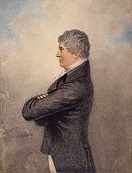



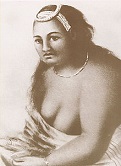
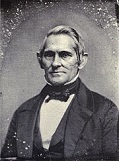







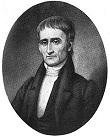
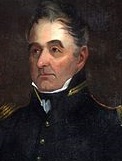


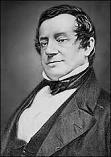











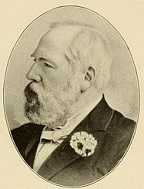












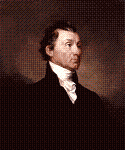


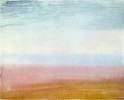

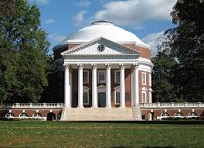
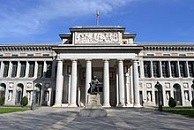
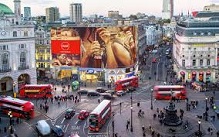
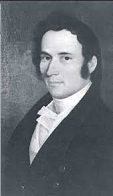
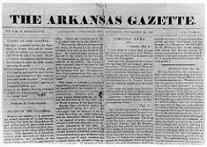
1819 After an undue extension of banking facilities is followed in 1817 by a contraction by the Second Bank of the U.S., which begins recalling federal land loans, bank circulation falls from $110M in 1816 to $65M this year, causing the economic Panic of 1819 and a gen. depression (ends 1821), giving rise to a demand for a higher tariff. On Jan. 28 Sir Thomas Stamford Raffles (1781-1826), gov. of Java (1810-15) and Benckulen, Sumatra (1818) lands in Singapore, and on Feb. 6 establishes a British East India Co. trading settlement on the island of Singapore (modern-day pop. 5.6M) which was destroyed in 1365; ill health forces him to sail for Plymouth, England in 1824, and his ship catches fire, destroying all his possessions, incl. his natural history collection and mss. valued at $100K; Singapore goes on to eclipse Malacca and become the commercial and military center of the region. On Feb. 2 the U.S. Supreme (Marshall) Court rules 6-1 in Dartmouth College v. Woodward that the Contract Clause applies to both public and private corporations, helping launch the modern corp. and the U.S. free enterprise system. On Feb. 19 while rounding the Horn, English Capt. William Smith (1790-1847) of the Williams discovers the 1,424 sq. mi South Shetland Islands 75 mi. N of the Antarctic Peninsula off Graham Land; on Oct. 16 after the authorities don't believe him, he lands on the largest island, King George Island, and next year he is sent to survey the discovery, discovering the Antarctic Peninsula; later Smith Island and Cape Smith are named for him. On Feb. 22 knowing that it is a paper tiger in Florida, Spanish envoy to the U.S. (1809-19) Luis de Onis y Gonzalez-Vara (1762-1827) proves to be a cream puff, and signs the Adams-Onis Treaty in Washington, D.C., ceding all of Florida (Fla.) to the U.S. in return for U.S. assumption of private Am. claims against Spain up to $5M, extending the W boundary of the Louisiana Purchase along the Sabine River, Red River, and Arkansas River, and from the source of the Arkansas N to the 42nd parallel and then W to the Pacific coast; Spain surrenders its claims to the Pacific Northwest; slave and free states in the U.S. are now evenly balanced at 11 each, but the statehood applications of Missouri and Maine (until now a district of Mass.) threaten the balance; John Randolph of Va. coins the term "Doughfaces" for Northern congressmen who vote with the South on slavery issues after 18 members vote against an amendment to the bill admitting Missouri to the Union that prohibits the further introduction of slaves into the state, with the soundbyte: "They were scared at their own dough faces." On Mar. 2 the U.S. Steerage Act requires ship captains to provide a list of their passengers to customs officials at the port of entry, incl. age, sex, and occupation. On Mar. 2 James Madison writes a Letter to Robert Walsh, containing the soundbyte: "The Civil Government, though bereft of everything like an associated hierarchy, posesses the requisite stability, and performs its functions with complete success, whilst the number, the industry, and the morality of the priesthood, and devotion of the people, have been manifestly increased by the total separation of the church from the state." On Mar. 6 the U.S. Supreme (Marshall) Court unanimously rules in McCulloch v. Maryland that Md. can't tax the Second Bank of the U.S., nor any state tax any federal agency, paving the way for broad federal powers and a nat. state under the guise of implied powers of Congress to pass laws not expressly listed in the Constitution if they are useful in furtherance of the express powers, prohibiting state actions to impede valid constitutional exercises of power by the federal govt. On Mar. 12 Va. becomes the 13th and final state required to ratify the Original 13th Amendment to the U.S. Constitution, reading: "If any citizen of the United States shall accept, claim, receive, or retain any title of nobility or honour, or shall without the consent of Congress, accept and retain any present, pension, office, or emolument of any kind whatever, from any emperor, king, prince, or foreign power, such person shall cease to be a citizen of the United States, and shall be incapable of holding any office of trust or profit under them, or either of them"; too bad, after 1876 it mysteriously disappears from the records; all members of the Am. Bar Assoc. (ABA) acquire the British title of nobility of esquire, and that's why? On Mar. 23 Karl Ludwig Sand (1785-1820), a follower of Karl Follen stabs to death reactionary leader August Friedrich Ferdinand von Kotzebue (b. 1761) in Mannheim for ridiculing the Burschenschaft (and/or for being a suspected Russian agent?), causing a split among the liberals, after which he is executed next year. On Apr. 26 the first lodge of Odd Fellows is organized in a tavern on Fell's Point in Baltimore, Md. In Apr. Baji Rao II surrenders to Sir John Malcolm, who permits the sexually degenerate whimp to retain his fortune and the title of prince (maharaja) but not peshwa, and bans him from the capital of Pune, setting him up in Bithur near Kanpur, where he spends the rest of his life having punetang sex orgies, while his 50M pop. Martha Confederacy goes into British hands; the Third Anglo-Maratha War (begun 1817) ends - did anybody say white empire? On May 8 (14?) king (since July 1782) Kamehameha I (b. 1736) dies in Kamakahonu, Kailua-Kona, Hawaii Island, and on May 20 his son Kamehameha II (Liholiho) (1797-1824) (who would have preferred to become a British naval officer) becomes king #2 of Hawaii (until July 14, 1824), going on to establish Christianity in the Hawaiian Islands, with his mother Ka'ahumanu (1768-1832) as regent and the first Kuhina Nui (prime minister), establishing her as the most powerful queen in Hawaii, continuing her power during the reigns of Kamehameha II and Kamehameha III; in Oct. after his mother puts him up to it, he initiates the 'Ai Noa (Hawaiian "free eating") period, ending the system of kapu by eating bananas and dog meat with women, disbanding the priest social class and prohibiting them from offering human sacrificies, and destroying pagan temples and images, aided by the arrival of Christian missionaries next Apr. led by Bennington, Vt.-born Protestant missionary Hiram Bingham (1789-1869), who creates a Hawaiian language writing system, translates the Bible into Hawaiian, and influences the monarchy to become rabidly anti-Roman Catholic. On May 22 after starting two days late because a drunken sailor fell off the gangplank and drowned, the SS City of Savannah, the first steam-propelled vessel to attempt a trans-Atlantic crossing departs from Savannah, Ga., arriving in Liverpool on June 20 (29 days); too bad, it cheats and uses sails most of the way, leaving the honor of a steam-only crossing to Holland in 1827; after Savanna, Ga. burns down in Jan. 1820, the ship's owner, Scarborough and Isaacs is forced to sell it. On May 22 the city of Memphis, Tenn. (modern-day pop. 647K/1.34M) on the 4th Chickasaw Bluff S of the confluence of the Mississippi and Wolf Rivers is founded on land donated by future U.S. pres. Andrew Jackson and other wealthy landowners incl. Louisa County, Va.-born judge John Overton (1766-1833) and War of 1812 brig. gen. James Winchester (1752-1826). On July 4 Congress authorizes a new flag with 21 stars (design #4), which now incl. Illinois. On July 11 lightning strikes a church in Chateauneuf, France 3x in a row during the installation of a new steeple, knocking everybody down and killing nine and injuring 82; the officiating priest is saved by his silk robe, which acts as an insulator. In July Simon Bolivar sets out across the Andes Mts. to support of fellow revolutionists in New Granada, where royalists had reestablished control, and on Aug. 7 he defeats 500 Spanish royalist forces with his force of 2.5K men at the decisive Battle of Boyaca (Boyacá) River near the town of Boyaca, Colombia 25 mi. S of Tunja, then occupies Bogota on Aug. 10; on Dec. 17 the Congress of Angostura proclaims the Repub. of Gran Colombia (ends 1831), a union of Venezuela and Nueva Granada (Colombia, Ecuador, Panama plus parts of Costa Rica, Peru, Brazil, and Guyana) (the NW neck of South Am. and half of Central Am.), with Simon Bolivar as pres. In July Russian explorers Fabian Gottlieb von Bellinghausen (1778-1852) and Mikhail Petrovich Lazarev (1788-1851) lead the two corvettes Vostok (Russ. "East") and Mirny (Russ. "Peaceful") around the Antarctic Circle, discovering Traversay Island in Dec., then reaching lat. 70 deg S, discovering Peter Island and Alexander Land. On Aug. 2 after Jewish reps get too pesky and formally demand emancipation at the 1815 Congress of Vienna, the anti-Jewish Hep-Hep Riots begin in Wurzburg, spreading to Frankfurt, Bohemia, Poland, Latvia, and Denmark, killing many Jews and destroying their property; the cry "hep-hep" was allegedly an acronym for the Crusader rallying cry "Hierosolyma est perdita" (Jerusalem is lost). On Aug. 16 60K-100K demonstrate against the Corn Laws at St. Peter's Field (Square) outside Manchester, England, and after a radical speech by Henry "Orator" Hunt (1773-1835) are charged by cavalrymen with sabers, killing 18 and injuring 650 incl. 100+ women and children, becoming known as the Peterloo Massacre, named after the Battle of Waterloo by James Wroe, whose radical newspaper The Manchester Observer is closed down in 1821 while he is given 1 year in jail for seditious libel after the British govt. responds on Nov. 23 with the 666, er, Six Acts, clamping down on "radical" parties (the first time the word is used of a political party in England) and newspapers, and potential armed uprisings, causing 28-y.-o. witness John Edward Taylor to launch his own newspaper The Manchester Guardian in 1821; Hunt gets two years in prison, becoming a bigger celeb but refusing to approve armed revolt - don't forget to order a side of wings with all your Party Hut orders? On Sept. 20 the Diet of the Germanic Confederation, backed by Metternich and Frederick William III of Prussia sanctions the Carlsbad Decrees, cracking down on the liberal students with strict censorship and control of the universities, and setting up an inquisition into their secret societies. On Nov. 20 the Arkansas Democrat-Gazette (originally the "Arkansas Gazette" until 1850) is founded in Arkansas Post, Ark. by Long Island, N.Y.-born William Edward Woodruff (1795-1885), who moves the HQ to Little Rock in 1821 and leads the campaign for Ark. statehood (1836); it goes on to claim to be the oldest continuously published newspaper W of the Mississippi River, reaching a modern-day circ. of 192K daily and 284K Sun. In Nov. Henri de Saint-Simon begins pub. the socialist mag. L'Organisateur, which ends pub. abruptly in Feb. 1820 after the assassination of Charles Ferdinand, Duke of Berry is blamed on it. On Dec. 6 "Yellowhammer State" Alabama (Choctaw "thicket clearers" or "vegetation gatherers") adopts a constitution, and is admitted as the 22nd U.S. (slave) state on Dec. 14. Gen. Martin Rodriguez (1771-1845) becomes ruler of a military junta in Buenos Aires, attempting to keep the rural landowners from weakening it politically with a federalist system; former supreme dir. (since 1816) Juan Martin de Pueyrredon goes into exile in Montevideo. Wurrtemberg and Hanover receive constitutions. The Sikhs take advantage of the civil war in Afghanistan to capture Kashmir. After its Indian trade is raided, the British send an expedition against Ras al-Khaimah on the Pirate Coast (ends 1820). Cotton cultivation is introduced into Angola. Freedom of the press is restored in France. The 1802 Cotton Mills and Factories Act having proved ineffective, the 1819 Cotton Mills and Factories Act, sponsored by child labor lord-turned-goody-two-shoes Sir Robert Peel, 1st Baronet (1750-1830) (father of future PM Sir Robert Peel, 2nd Baronet) is passed, forbidding employment in cotton mills of children under age nine, and limiting working hours of children ages 9-16 to 12 hours a day; the act was originally introduced by Robert Owen in 1815, but this one is much weaker; the first of several Parliamentary Factory Acts. River steamboats begin navigating the Missouri River. Britain finally officially ends trial by combat. The city of Managua on the SW shore of Lake Managua (modern-day pop. 1M/1.4M) is incorporated as Leal Villa de Santiago de Managua; it becomes the capital of Nicaragua in 1852. English explorer Sir John Franklin (1786-1847) begins exploring N Canada by land from Hudson Bay E to the mouth of the Coppermine River, turning into a disaster after he falls into the Hayes River at Robinson Falls and is rescued by a member of his expedition, then loses 11 of his 20 men to starvation, causing them to be reduced to eating their own leather boots; they return in 1822. Mehmet Ali presents Thutmose III's Cleopatra's Needle (1475 B.C.E.) to Britain - Tut is known as the Napoleon of Egypt, get it? English explorer Sir William Parry, in HMS Griper and HMS Hecla finally finds a Northwest Passage, but unfortunately it's way up in the *!?! Arctic. The Zollverein (customs union) is founded to facilitate circulation of goods between the states of German, helping to unite it. Oslo Stock Exchange in Norway is founded as Christiania Bors (Børs); it doesn't begin trading stocks and bonds until 1881. In order to make up for the loss of Malacca, Sir Thomas Stamford Raffles (1781-1826), gov. of Java (1810-15) and Benckulen, Sumatra (1818) establishes a British East India Co. trading settlement on the island of Singapore (modern-day pop. 5.6M) which was destroyed in 1365; ill health forces him to sail for Plymouth, England in 1824, and his ship catches fire, destroying all his possessions, incl. his natural history collection and mss. valued at $100K; Singapore goes on to eclipse Malacca and become the commercial and military center of the region. Colgate U. (originally Madison U.) in Hamilton, N.Y., founded in 1817 by the Baptist Education Society of N.Y. is chartered; in 1890 it changes its name to Colgate U. after a $1M donation by financier James Boorman Colgate (1818-1904). English freethinker Richard Carlile (1790-1843) is sentenced to three years in prison in England and fined $1.5K for blasphemy for pub. Thomas Paine's anti-Bible classic "The Age of Reason"; unable to pay the fine, he is given three more years. The Am. Board of Commissioners for Foreign Missions of Boston, Mass. sends Evangelical Protestant Calvinist missionaries Pliny Fisk (-1827) and Levi Parsons (-1822) on a Palestine mission to the Holy Land via Malta to convert Muslims to Christianity; too bad, the Orthodox Greek uprising against the Muslim Ottoman Empire in 1821 ends any hope for their mission, and they fail to convert a single Muslim. Blind but indomitable Englishman James Holman (1786-1857) begins a grand tour through Europe, returning in 1821 then setting out on a round-the-world tour, making it to Irkutsk, Russia before being arrested as a spy, then returning back through Poland and Germany; he then tries it again, and succeeds, pub. narratives of his travels, claiming to image his surroundings via the reverberations of his tapping cane and nearby horse hoofbeats, causing William Jordan in 1866 to utter the soundbyte: "From Marco Polo to Mungo Park, no three of the most famous travelers, grouped together, would exceed the extent and variety of countries traversed by our blind countryman" - don't ask what he saw though? Prussian patriot Friedrich Ludwig Jahn (1778-1852), a state gymnastics teacher who organized the Burschenschaften is arrested for his liberal pro-unification views, and is released in 1825 with an injunction against living within 10 mi. of Berlin. Miron Winslow (1789-1864), a descendant of a brother of Mayflower gov. Edward Winslow sets up a Protestant mission in Ceylon, spreading dreary Puritanism. The American Farmer, the first important agricultural journal in the U.S. begins pub. in Baltimore, Md. on Apr. 2 (ends 1897). The Humorist begins pub. in England (until 1821), with etchings by George Cruikshank. Blackie's pub. house (originally Blackie, Fullerton & Co.) is founded in England in Nov. by John Blackie (1782-1874), and renamed Blackie & Son in 1831, moving to Glasgow, Scotland in 1890. Norwich U. (originally the Am. Literary, Scientific and Military Academy) in Northfield, Vt. is founded by West Point supt. (1805-17) capt. Alden B. Partridge (1785-1854) in a rebellion against the threat of a prof. officer class, becoming the first private military college in the U.S. and the birthplace of the Reserve Officers' Training Corps (ROTC). The U. of Virginia, "Mr. Jefferson's University" is founded within sight of Monticello by U.S. pres #3 (1801-9) Thomas Jefferson (1743-1826); the rotunda is based on Jefferson's design; he planned it as an "academical village" with a "temple of knowledge" that breaks free from his alma mater the College of William and Mary and its religious straightjacket. The Bank of Finland moves from Turku to Helsinki. The Arkansas Gazette is founded in Arkansas Post, Ark., becoming the state's first newspaper; it later becomes the Arkansas Democrat Gazette. English portraitist George Dawe (1781-1829) moves to St. Petersburg, Russia (until 1829), going on to paint 329 portraits of Russian nobility for the War Gallery of the Winter Palace. Giovanni Belzoni returns from Egypt to Italy with a grand theft of antiquities, incl. the alabaster sarcophagus of Seti I and the upper half of a colossal statue of Rameses II. Nathan Lyman founds Aqueduct Spring Brewery, the first brewery in Rochester, N.Y.; it closes in 1844. Francis Perot (-1883) of Philadelphia, Penn. installs a 10 hp steam engine built by inventor Thomas Holloway in his Vine Street Brewery, becoming the first stationary steam engine in the U.S.; too bad, by the 1850s U.S. breweries are lagging 50 years behind England in the use of steam engines. Architecture: On Mar. 20 the Burlington Arcade covered shopping arcade opens in Piccadilly, London. The Museo del Prado (Sp. "meadow") nat. art gallery in Madrid, Spain is founded to house the art treasures of the Spanish Hapsburgs. Piccadilly Circus (named after the late 16th cent. broad cut-work lace Piccadill collar) in Westminster, West End, London is built to connect Regent St. with Piccadilly Rd., becoming a traffic hub for Coventry St. (Leicester Square), the Haymarket, and Shaftesbury Ave. (theatre district). K.F. Schinkel begins the Schauspielhaus in Berlin (finished 1822). Telford's Bridge over the Menai Strait is built by Scottish engineer Thomas Telford, becoming the first suspension bridge to carry vehicular traffic. The Grand-Hornu industrial park in the Borinage district of Belgium SW of Mons is built by Henri de Gorge-Legrand (finished 1840). Inventions: On Dec. 4 Sir William Congreve of Britain patents the colored watermark, consisting of a triple paper; too bad, the Bank of Resistance fails to adoopt it because of resistance from the Portals Co. that manufactured its currency paper since 1725. The first soda fountain patent is granted to Samuel Fahnestock. Augustin Jean Fresnel invents the dioptric system for lighthouses. David Napier invents the flat-bed cylinder printing press. Anglo-German inventor Augustus Siebe (1788-1872) invents an open diving suit consisting of a leather jacket and metal helmet fitted with forced air hoses that keep the water below the diver's chin. Science: London physician John Bostock becomes the first to describe hay fever, which he personally suffers from, attributing its cause to freshly cut hay; he claims he can find only a few other sufferers in England. Pierre Louis Dulong (1785-1838) and Alexis Therese Petit (1791-1820) of France pub. the Law of Dulong-Petit, that relative atomic weight is inversely proportional to specific heat, i.e., that approximately the same amount of heat is required to accomplish a particular rise in temperature of the same number of atoms of any metal, making possible the experimental determination of atomic weight - du long and winding road to specific petit? German chemist Eilhard Mitscherlich (1794-1863) pub. his law of isomorphism, that compounds crystallizing together probably have similar structures and compositions. Danish physicist Hans Christian Oersted (1777-1851) discovers electromagnetism, the relation between electricity and magnetism - no fairy tale? After discovering the pupil dilating qualities of belladonna to his friend Johann Wolfgang von Goethe (1749-1832), German chemist Friedrich Ferdinand Runge (1795-1867) takes his advice and analyzes coffee, discovering caffeine - I'm glad he didn't call it rungine? The optical phenomenon known as Parry's Arc is discovered by the English expedition led by Sir William Edward Perry (1819-21). Joseph Pelletier and Joseph Bienaime Caventou isolate brucine from Nux vomica. Nonfiction: Ludwig Burkhardt (1784-1817), Travels in Nubia. Jean-Antoine Chaptal (1756-1832), De l'Industrie Francaise. Frederic Cuvier (1773-1838) and Etienne Geoffroy Saint-Hilaire (1772-1844), Histoire Naturelle des Mammiferes (4 vols.) (1819-42); mentioned in Herman Melville's "Moby-Dick", ch. 32. Jacob Grimm (1785-1863), History of the German Language (Geschichte der Deutschen Sprache) (1819-48); a landmark in modern philology, based on work with Ramus Christian Rask of Denmark; expounds Grimm's Law of regular consonantal changes in Indo-European languages, e.g. English (brother/ten), Sanskrit (bhratar/dasa), Greek (phrater/deka), Latin (frater/decem), German (bruder/zehn). Georg Hermes, Philosophical Introduction to Christian Theology. Nikolai Karamzin (1766-1826), History of the Russian State (12 vols.) (1819-26); first modern history of Russia, modelled after Edward Gibbon, creating a new Russian lit. language, and becoming a hit with tsar Alexander I for its flattery of autocracy, who moves him to St. Petersburg to work in style; too bad, he dies after finishing vol. 11, which ends with the 1613 accession of Michael Romanov. Joseph de Maistre (1753-1821), Du Pape; the importance of papal authority - woo woo woo woo woo? Alessandro Manzoni (1785-1873), Osservazioni sulla Morale Cattolica. Hannah More (1745-1833), Moral Sketches. David Ramsay (1749-1815), Universal History Americanized; or, an Historical View of the World, from the Earliest Records to the Year 1808, with a Particular Reference to the State of Society, Literature, Religion and Form of Government in the United States of America (12 vols.). Jean Charles Leonard Simonde de Sismondi (1773-1842), Nouveaux Principes d'Economie Politique, ou de la Richesse dans ses Rapports avec la Population; breaks ranks with Adam Smith, who he says is too interested in the means of increasing wealth and too little interested in the use of wealth for increasing happiness, challenging the idea of economic equilibrium and predicting periodic economic crises, with the soundbyte: "Let us beware of this dangerous theory of equilibrium which is supposed to be automatically established. A certain kind of equilibrium, it is true, is reestablished in the long run, but it is after a frightful amount of suffering"; he also breaks with laissez-faire, exposing the dangers of aggregate demand creating overproduction and overconsumption, and advocating that the state "regulate the progress of wealth"; calls for state action to help the poor and downtrodden so that everybody can be poor and downtrodden?; "(He) dissected with great acuteness the contradictions of modern production" (Karl Marx). Count de Volney (1757-1820), New Researches on Ancient History. Parson Mason Locke Weems (1759-1825), The Life of William Penn. Horace Wilson, Sanskrit-English Dictionary. A Manx trans. of the King James Bible appears in a gen. release of 5K copies - the Manx people (Isle of Man) are saved at last? Music: Daniel Auber (1782-1871), Le Testament et les Billets-Doux (opera). Austrian music publisher Anton Diabelli (1781-1858) asks 50 composers, incl. Beethoven, Schubert and 11-y.-o. Franz Liszt to compose a short variation on a bland waltz he wrote, which he later pub. as Fatherland's Society of Artists; Beethoven's contribution is pub. in 1823 as "Diabelli Variations". Heinrich Marschner (1795-1861), Heinrich IV und d'Aubigne (opera). Franz Schubert (1797-1828), Die Zwillingsbruder, D647; Piano Sonata in A, D664; Piano Quintet in A (The Trout), D667; Schafer Klagelied (Goethe) (his first song sung in public). Louis Spohr (1784-1859), Zemire und Azor (opera). Johan Olof Wallin (1779-1839), Psalmbook; becomes Sweden's official hymnbook. Carl Maria von Weber (1786-1826), Invitation to the Dance (for piano). Art: Washington Allston (1779-1843), Florinell's Flight; pioneers the Romantic landscape movement in the U.S., becoming known as the American Titian and coining the term "objective correlative" for a chain of events that acts as a formula in art to evoke emotion. John Constable (1776-1837), The White Horse. Theodore Gericault (1791-1824), The Raft of the Medusa (1818-9); 16'1" x 23'6"; the first Romantic painting based on current news, about the survivors of the French frigate Medusa (140 aboard), which struck the Bank of Arguin off the coast of Mauritania on July 2, 1816, causing the 147 survivors to cling to a raft for 13 days until the remaining 15 dehydrated cannibals sight the Argus, which fails to see their signal and finally picks them up 2 hours later; makes a big splash in the Salon and a political scandal with its implication that the captain was incompetent, later being used whenever anybody wants to imply that somebody else is incompetent; Eugene Delacroix poses for it; he studies corpses incl. decapitated heads for realism; Mazeppa (1819-23); inspired by the 1819 Lord Byron poem. Georg Friedrich Kersting (1785-1847), Caspar David Friedrich in His Studio. Samuel F.B. Morse (1791-1872), Official Portrait of James Monroe. Charles Willson Peale (1741-1827), Portrait of Yarrow Mamout; an African Muslim who was sold into slavery, purchased his freedom, settled in Georgetown, and lived past 100. James Pradier (1792-1852), Centaur and Bacchante (sculpture). Thomas Sully (1783-1872), Washington's Passage (Crossing) of the Delaware; shows Prince Whipple, a black slave to Gen. Whipple of N.H. attending Washington; he was freed during the war. Bertel Thorvaldsen (1770-1844), Christ and the Twelve Apostles (sculpture) (1819-38). J.M.W. Turner (1775-1851), Colour Beginning. Plays: Casimir Delavigne (1793-1843), Les Vepres Siciliennes (Odeon Theatre, Paris); "You have saved us. You are the founder of the second French Theatre." (the mgr. Picard). Mordecau Manuel Noah (1785-1851), She Would be a Soldier; or, The Plains of Chippewa; identifies the Indian Great Spirit with Jehovah. Johann Ludwig Uhland, Ludwig der Baier. Francis "Fanny" Wright (1795-1852), Altorf (Feb. 19) (Park Theatre, New York). Poetry: Lord Byron (1788-1824), Mazeppa (June 28); about Ukrainian stud Ivan Mazepa (1639-1709), who commits adultery with Countess Theresa, causing King John II Casimir Vasa to have him tied naked to a wild horse and set loose, which he survives, becoming hetman of the Cossacks; makes Mazepa a Romantic star; inspires Theodore Gericault to paint the naked dude; The Prophecy of Dante; Don Juan (1819-24) (pr. "JEW-un", to rhyme with "true one" and "new one"); pub. anon.; his magnum opus; Greek girl Haidee saves the hero from death, but her pirate father catches them together and sells him into slavery, causing her to go mad and die; portrays serial womankiller Don Juan as a victim of women, which is a big hit but scandalizes society so much that his publisher drops it in 1822; disses fellow poets William Wordsworth ("Turdsworth") and Samuel Taylor Coleridge. George Crabbe (1754-1832), Tales of the Hall. Johann Wolfgang von Goethe (1749-1832), West-ostlicher (West-östlicher) Diwan (book of lyrics). Fitz-Greene Halleck (1790-1867), Fanny (Dec.); pub. anonymously. Victor Hugo (1802-85), Odes. Leigh Hunt (1784-1859), Hero and Leander; Bacchus and Ariadne. John Keats' Wunderjahr, in which he writes most of his hip odes? John Keats (1795-1821), Great Odes of 1819 (May), incl. Ode on Indolence, Ode on Melancholy, Ode on a Grecian Urn ("'Beauty is truth, truth beauty,' - that is all/ Ye know on Earth, and all ye need to know"; "Heard melodies are sweet, but those unheard/ Are sweeter; therefore, ye soft pipes, play on"), Ode to a Nightingale ("Thou wast not born for death, immortal Bird!"/ "No hungry generations tread thee down/ The voice I hear this passing night was heard/ In ancient days by emperor and clown.") Louis-Jean Nepomucene Lemercier (1771-1840), Panhypocrisiade: Spectacle Infernal du XVIe Siecle (1819-32); HRE Charles V vs. Francis I of France, played by demons? Thomas Moore (1779-1852), Tom Crib's Memorial to Congress; his only dud. Percy Bysshe Shelley (1792-1822), Ode to the West Wind; autobio. poem about truth only being understood by the imagination; "Thou breath of Autumn's being" that scatters "dead thoughts over the Universe/ Like withered leaves to quicken a new birth"; "Scatter, as from an unextinguished hearth/ Ashes and sparks, my words among mankind!/ Be through my lips to unawakened earth/ The trumpet of a prophecy!" William Wordsworth (1770-1850), Peter Bell. Novels: Joseph von Eichendorff (1788-1857), Das Marmorbild (The Marble Statue). E.T.A. Hoffmann (1776-1822), Die Serapionsbruder (4 vols.) (1819-21). Washington Irving (1783-1859), The Sketch Book of Geoffrey Crayon, Gent. (June 23); incl. Rip Van Winkle ("It's been 20 years since he went away with his gun") (first mention of the game of ninepins in Am. lit.), The Legend of Sleepy Hollow (The Headless Horseman) Conn. schoolteacher Ichabod Crane of Greensburgh (Tarry Town) competes for the hand of 18-y.-o. Katrina Van Tassel with Abraham "Brom Bones" Van Brunt, who tries to scare him off by dressing up as the Hessian Headless Horseman; "If I can just reach that bridge, I'm safe." Sir Walter Scott (1771-1832), The Bride of Lammermoor; the ruins of Wolf's Crag and Ravenswood are located on the coast of Berwickshire in Fast Castle 6 mi. NW of Eyemouth, and Cockburnspath Fortress 10 mi. NW of Eyemouth. Births: English poet Arthur Hugh Clough (pr. KLUFF) (OE "narrow gorge") (d. 1861) (pr. KLUFF) on Jan. 1 in Liverpool; moves to Charleston, S.C. in 1822, then returns to England in 1828, attending school in Chester, followed by Rugby School under headmaster Thomas Arnold (1795-1842), followed by Balliol College, Oxford U., then Oriel College until 1848; friend of Matthew Arnold (1822-88). Am. "History of the Christian Church" Protestant theologian-historian Philip Schaff (d. 1893) on Jan. 1 in Chur, Siwtzerland; educated at the U. of Tubingen, U. of Halle, and U. of Berlin; disciple of David Strauss (1808-74) and August Neander (1789-1850); Romanian "The Dying Virgin", "Flowers of the Bosphorus" #1 poet Dimitrie Bolintineanu (d. 1872) (b. 1825?) on Jan. 14 in Bolintina, Wallachia. English "Derby Day" crowd scene painter William Powell Frith (d. 1909) on Jan. 19 in Alfield, North Yorkshire. Italian sculptor Giosue (Giosuè) Argenti (d. 1901) on Feb. 7 in Viggiu, Varese; student of Pompeo Marchesi (1783-1858). English art critic and social reformer ("the Victorian's Victorian") John Ruskin (d. 1900) on Feb. 8 in London; educated at King's College, and Christ Church, Oxford U.; coiner of the term "pathetic fallacy"; husband (1855-98) of Euphemia Chalmers Gray (1828-97). Am. sculptor-poet-critic William Wetmore Story (d. 1895) on Feb. 12 in Salem, Mass.; son of U.S. Supreme Court justice Joseph Story (1779-1845); educated at Harvard U. French scientist-writer Louis Figuier (d. 1894) on Feb. 15. Am. poet-essayist-editor James Russell Lowell (d. 1891) on Feb. 22 in Cambridge, Mass.; son of Rev. Charles Russell Lowell Sr. (1782-1861); uncle of Civil War Union brig gen. Charles Russell Lowell Jr. (1835-64). Scottish teacher Alexander Melville Bell (d. 1905) on Mar. 19 in Edinburgh; father of Alexander Graham Bell (1847-1922); model for Prof. Henry Higgins in George Bernard Shaw's 1913 play "Pygmalion"? English sugar cube magnate Sir Henry Tate, 1st Baronet (d. 1899) on Mar. 11 in White Coppice (Chorley), Lancashire; created baronet in 1898. French photographer Andre-Adolphe-Eugene Disderi (André-Adolphe-Eugène Disdéri) (d. 1889) on Mar. 28. Am. oil well pioneer "Colonel" Edwin Laurentine Drake (d. 1880) on Mar. 29 in Greenville, N.Y.; begins the world's first oil well in Titusville, Penn. Am. Reform Jewish rabbi Isaac Mayer Wise (d. 1900) on Mar. 29 in Steinbrub (Lomnicka), Bohemia; emigrates to the U.S. in 1846. German Prussian chancellor-PM (1894-1900) (Roman Catholic) Prince Chlodwig Carl Viktor of Hohenlohe-Schillingsburst (Hohenlohe-Schillingsfürst, Ratibor and Corvey) (d. 1901) on Mar. 31 in rotenburg an der Fulda, Hesse; Roman Catholic father, Lutheran mother. Am. Mormon leader ("Apostle to the Lamanites") ("the Buckskin Apostle") Jacob Hamlin (d. 1886) on Apr. 2 in Ashtabula County, Ohio. Portuguese Braganza queen (1826-8, 1834-53) ("the Good Mother") ("the Educator") Maria II da Gloria (1853) on Apr. 4 in Rio de Janeiro; eldest daughter of Peter IV (1798-1834) and 1st wife Archduchess Maria Leopoldina of Austria (1797-1826) (daughter of HRE Francis II); mother of Peter V (1837-61), Luis I (1838-89), Joao (1842-61) and Fernando (1846-61). Austrian "Light Cavalry Overture", "Morning, Noon and Night in Vienna" "Boccaccio", "The Light Cavalry" Romantic operetta composer Franz von Suppe (Suppé) (Francesco Suppe Demelli) (d. 1895 on Apr. 18 in Spalato, Dalmatia (Croatia); of Belgian descent. French "Le Drame Lyrique" academic sculptor Jean-Joseph Perraud (d. 1876) on Apr. 26 in Jura; student of Etienne-Jules Ramey and Augustin-Alexandre Dumont. Scottish Orientalist (founder of Muir College in India) Sir William Muir (d. 1905) on Apr. 27 in Glasgow; knighted in 1867; brother of John Muir (1810-82); coiner of the term "Satanic Verses". Estonian journalist-poet Johann Voldemar Janssen (d. 1890) on May 16 (May 4 Old Style) in Vandra, Livonia; father of Lydia Koidula (1843-86). British Queen of Great Britain and Ireland (1837-1901) and Empress of India (1876-1901) Victoria Alexandrina (d. 1901) on May 24 (May 25?) in Kensington Palace, London; daughter of Edward, duke of Kent and Strathearn (4th son of George III) and Princess Victoria Mary (Maria) Louisa of Saxe-Coburg Saalfeld; granddaughter of George III; niece of William IV and Georges Chretien Frederic (Leopold I of Belgium). Am. "Battle Hymn of the Republic" abolitionist-suffragist poet-writer Julia Ward Howe (d. 1910) on May 27 in New York City; wife (1843-) of Samuel Gridley Howe (1801-76); mother of Maud Howe Elliott (1854-1948) and Laura Elizabeth Howe Richards (1850-1943). Am. 5'4" physician ("the Little Doctor") William Worrall Mayo (d. 1911) on May 31 in Eccles (near Salford), Lancashire, England; emigrates to the U.S. in 1845; father of Mayo Clinic founders William James Mayo (1861-1939), and Charles Horace Mayo (1865-1939). Am. free verse poet ("the Paumanok Poet") ("Founding Father of American Poetry") (bi?) Walter "Walt" Whitman (d. 1892) on May 31 in West Hills, Huntington, Long Island, N.Y. Dutch landscape-seascape painter (in France) (alcoholic) ("Father of the Modern Landscape" - Edouard Manet) Johan Barthold Jongkind (d. 1891) on June 3 in Lattrop (near Rotterdam); teacher of Edouard Manet (1832-83); forerunner of Impressionism; #1 Dutch painter of the 19th cent.? English astronomer-mathematician John Couch Adams (d. 1892) (pr. cooch) on June 5 in Laneast (near Launceston), Cornwall; educated at St. John's College, Cambridge U.; mathematically predicts the existence of Neptune. French realist painter Jean Desire (Désiré) Gustave Courbet (d. 1877) on June 10 in Ornans; founder and militant leader of the Realistic School of French painting - as in accurate depiction of breasts and vaginas? English "Westward Ho!" anti-John Henry Newman Anglican clergyman novelist-poet-essayist Rev. Charles Kingsley (d. 1875) on June 12 in Holne, Dartmoor, Devonshire; father of Mary St. Leger Kingsley (1852-1931); educated at King's College, London, and Magdalene College, Cambridge U.; friend of Charles Darwin. French "Orpheus in the Underworld", "The Tales of Hoffmann" Romantic operetta composer-cellist (Jewish) Jacques Offenbach (Jakob Eberscht) (d. 1880) on June 20 in Cologne, Germany; son of a synagogue cantor; moves to Paris in 1833; coiner of the term "opera bouffe". Am. "The Birth of Our Flag" painter Henry Peters Gray (d. 1877) on June 23 in New York City; pupil of Daniel Huntington. Am. Civil War Union gen. Abner Doubleday (d. 1893) on June 26 in New York City; alleged inventor of Am. baseball. Romananian-Wallachian historian and rev. leader Nicolae Balcescu (d. 1852) on June 29 in Bucharest. Am. journalist Donn Piatt (d. 1891) on June 29 in Cincinnati, Ohio. U.S. Repub. vice-pres. #19 (1877-81) and U.S. Rep. (R-N.Y.) (1861-3, 1869-77) William Almon Wheeler (d. 1887) on June 30 in Malone, N.Y. Am. pharmacologist-chemist Edward Robinson Squibb (d. 1900) on July 4 in Wilmington, Del. German "Epitome of History" historian Carl (Karl) Julius Ploetz (d. 1881) on July 8 in Berlin; the first primitive Historyscoper? Am. "The Wide, Wide World" novelist Susan Bogert Warner (AKA Elizabeth Wetherall) (d. 1885) on July 11 in New York City; sister of Anna Bartlett Warner (1820-1915). Am. scientist-inventor and women's rights activist Eunice Newton Foote (d. 1888) on July 17 in Goshen, Conn. Swabian "Watch on the Rhine" merchant-poet Max Schneckenburger (d. 1849) on July 18 in Talheim (near Tuttlingen). Swiss "Green Henry" #1 poet-novelist (in German) Gottfried Keller (d. 1890) on July 19 in Zurich. Am. "Moby-Dick" novelist-poet Herman Melville (d. 1891) on Aug. 1 in New York City. Am. Civil War Union maj. gen. and rear adm. Samuel Powhatan Carter (d. 1891) on Aug. 6 in Elizabethton, Tenn.; educated at Princeton U.; first U.S. officer to be awarded the rank of both rear adm. and maj. gen. - pow? Am. journalist-ed. (New York Tribune, New York Sun) Charles Anderson Dana (d. 1897) on Aug. 8 in Hinsdale, N.H.; educated at Harvard U.; lives on Brook Farm in 1841-6. Irish Stokes' Theorem physicist-mathematician Sir George Gabriel Stokes, 1st Baronet (d. 1903) on Aug. 13 in Skreen, County Sligo; educated at Pembroke College, Cambridge U.; created baronet in 1889. English music hall and theater impresario ("Father of the Halls") Charles Morton (d. 1904) on Aug. 15 in Hackney, London; coiner of the term "music hall". Am. dentist and ether anesthesia pioneer William Thomas Green Morton (d. 1868) on Aug. 19 in Charlton, Mass. Am. detective Allan Pinkerton (d. 1884) on Aug. 25 in Glasgow, Scotland; organizer of the U.S. Secret Service; inventor of the mug shot for wanted posters; emigrates to Chicago, Ill. in 1842. British prince consort (1840-61) Albert of Saxe-Coburg and Gotha (d. 1861) on Aug. 26 in Schloss Rosenau, Coburg, Saxe-Coburg-Saalfeld, German Confederation; husband (1840-61) of Queen Victoria (1837-1901). Am. Civil War Union Gen. William Starke Rosencrans (d. 1898) on Sept. 6 in Delaware City, Ohio. U.S. Dem. vice-pres. #21 (1885) and Ind. gov. #18 (1873-7) Thomas Andrews Hendricks (d. 1885) on Sept. 7 in East Fultonham (near Zanesville), Muskingum County, Ohio; grows up in Shelby County, Ind.; educated at Hanover College. Canadian "What a Friend We Have in Jesus" poet Joseph Medlicott Scriven (d. 1886) on Sept. 10 in Seapatrick (near Bainbridge), County Down, Ireland; emigrates to Canada in 1844. German pianist-composer Clara Josephine Wieck Schumann (d. 1896) on Sept. 13 in Leipzig, Saxony; wife (1840-) of Robert Schumann (1810-56), whom she meets at age 9 when she begins performing for her father Fredrich Wieck, his piano teacher. South African Boer leader Marthinus Wessel (Wessels) Pretorius (d. 1901) on Sept. 17; son of Andreis Pretorius (1798-1853); 1st pres. of the South African Repub. (Transvaal) (Orange Free State) (1857-83). French "Foucault's Pendulum" physicist Jean Bernard Leon Foucault (d. 1868) on Sept. 19 in Paris. French physicist Armand Hippolyte Louis Fizeau (d. 1896) on Sept. 23 in Paris. Italian PM (1887-96) Francesco Crispi (d. 1901) on Oct. 4 in Ribera, Sicily; starts out an extreme radical and ages into a reactionary monarchist? Canadian gov.-gen. #1 (1867-8) Charles Monck, 4th Viscount Monck (d. 1894) on Oct. 10 in Templemore, Ireland; son of Charles Monck, 3rd viscount Monck (1791-1849); father of Henry Monck, 5th viscount Monck (1849-1927). Am. stagecoach line magnate ("the Stagecoach King") Benjamin "Ben" Holladay (d. 1887) on Oct. 14 in Nicholas County, Ky.; grows up in Bourbon County, Ky. French Juglar Cycle economist Clement (Clément) Juglar (d. 1905) on Oct. 15 in Paris. Persian Bahaism founder The Bab (Siyyid Ali Muhammad Shirazi) (d. 1850) on Oct. 20 in Shirz; starts out a merchant then gets a divine revelation on May 23, 1844. Am. Civil War Union gen. and diplomat Daniel Edgar "Dan" Sickles (d. 1914) on Oct. 20 in New York City. Serbian prince (1839) (4 weeks) Milan Obrenovic II (d. 1839) on Oct. 21 in Kragujevac; eldest son of Milos Obrenovic I (1780-1860); brother of Michael (Mihailo) Obrenovic III (1823-68). German activist (coiner of the term "anti-Semitism") Wilhelm Marr (d. 1904) on Nov. 16 in Magdeburg. English novelist George Eliot (Marian Evans) (Mary Ann Evans) (d. 1880) on Nov. 22 in Arbury Farm, Chilvers Coton (near Nuneaton), Warwickshire; becomes a rationalist in 1841 at age 22, causing her to translate David Strauss' "Life of Jesus" in 1844-6. Am. geologist (namesake of Mount Whitney) Josiah Dwight Whitney (d. 1896) on Nov. 23 in Northampton, Mass.; educated at Yale U.; brother of William Dwight Whitney (1827-94); prof. of geology at Harvard U. (1865-); chief of the Calif. Geological Survey (1860-74). Am. transatlantic cable industrialist Cyrus West Field (d. 1892) on Nov. 30 in Stockbridge, Mass.; son of minister David Dudley Field; brother of jurist David Dudley Field (Jr.) (1805-94) and jurist Stephen Johnson Field (1816-99). Am. Roman Catholic priest (Paulist Fathers founder) Isaac Thomas Hecker (d. 1888) on Dec. 18 in New York City; German immigrant parents; raised a Methodist. Italian rev. Carbonari leader Count Felice Orsini (d. 1858) n Dec. 10 in Meldola, Romagna. German OBGYN Karl (Carl) Siegmund Franz Crede (Credé) (d. 1892) on Dec. 23 in Berlin; first to drip silver nitrate solution in the eyes of the newborn to prevent gonorrheal opthalmia. German "Vor dem Sturm" realist novelist-poet Theodor Fontane (d. 1898) on Dec. 30 in Neuruppin; Huguenot parents. Am. sewing machine inventor Elias Howe (d. 1867) in Spencer, Mass. Am. "The Hand That Rocks the Cradle" poet-atty. (Presbyterian) William Ross Wallace (d. 1881) in Lexington, Ky.; educated at Indiana U., and Hanove College - erin go bragh? German painter-writer Rudolf Lehmann (d. 1905) in Hamburg; brother of Henri Lehmann (1814-82); father of Liza Lehmann (1862-1918). Deaths: Am. politician-jurist William Samuel Johnson (b. 1727) on Nov. 14 in Stratford, Conn. English antiquarian Henry Constantine "Dog" Jennings (b. 1731) on Feb. 17 in St. George's Fields, Southwark, South London. U.S. Supreme Court justice #7 (1792-3) Thomas Johnson (b. 1732) on Oct. 26 in Frederick, Md. Am. politician-scientist Hugh Williamson (b. 1735) in N.Y. Hawaiian king (1782-1819) Kamehameha I the Great (b. 1736) on May 8 (May 14?) in Kamakahonu, Kailua-Kona, Hawaii Island. Scottish steam engine inventor James Watt (b. 1736) on Aug. 25 on Handsworth, Birmingham. English author John Wolcot (Peter Pindar) (b. 1738) on Jan. 14 in London. Am. Rev. leader John Langdon (b. 1741) on Sept. 18 in Portsmouth, N.H. Prussian field marshal (hero of Waterloo) Gebhard von Blucher (b. 1742) on Sept. 12 in Krieblowitz (Krobielowicz), Silesia. Russian explorer-trader Alexander Baranov (b. 1747) on Apr. 16 in Sunda Strait, Dutch East Indies; dies en route from Alaska to Russia via the Cape of Good Health, er, Hope. Spanish king (1788-1808) Charles IV (b. 1748) on Jan. 20 in Rome, Italy. Scottish uniformitarian geologist John Playfair (b. 1748) on July 20. Scottish physician Daniel Rutherford (b. 1749) on Dec. 15 in Edinburgh. Russian gen. Count Alexander Tormasov (b. 1752) on Nov. 13 in Moscow. Am. Quaker religious leader Jemima Wilkinson (b. 1752) on July 1; her body is left unburied and unpreserved in anticipation of her making her claim to rise from the dead, until it you know what? Am. inventor Oliver Evans (b. 1755) on Apr. 15 in New York City. German dramatist August Friedrich Ferdinand von Kotzebue (b. 1761) on Mar. 23 in Mannheim; murdered by Karl Ludwig Sand (1795-1820). Scottish soldier-politician Charles Lennox, 4th duke of Richmond (b. 1764) on Aug. 28 in Richmond, Ont. French geologist Jean d'Aubuisson de Voisons (b. 1769). Am. commodore Oliver Hazard Perry (b. 1785) on Aug. 23 in Venezuela (yellow fever); dies on his birthday? French balloonist Sophie Blanchard (b. 1778) on July 6 in Paris; killed in her 67th ascent in Tivoli Gardens after her hydrogen-filled balloon is set on fire by her fireworks, causing her to plummet to her death in front of thousands, causing a sensation; her tombstone is inscribed "victim of her art and intrepidity". U.S. First Lady-not Hannah Hoes Van Buren (b. 1783) on Feb. 5 in Albany, N.Y. (TB).